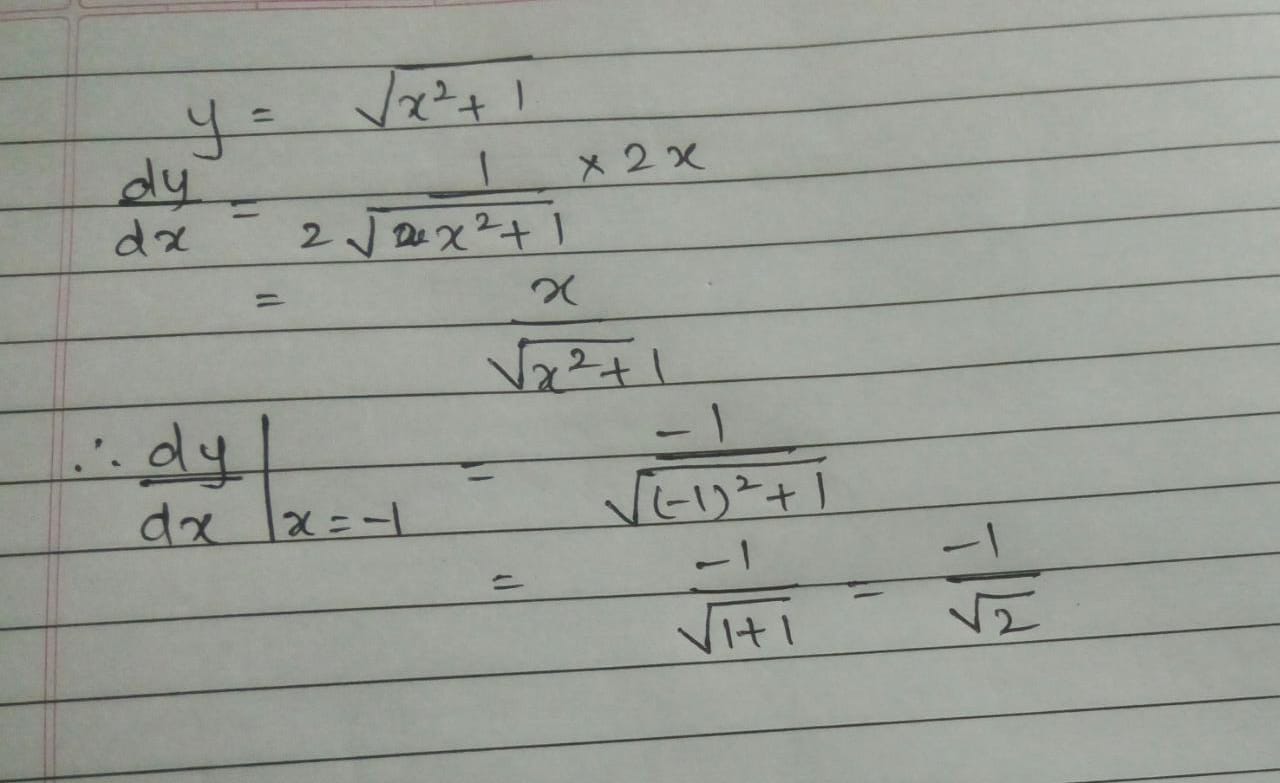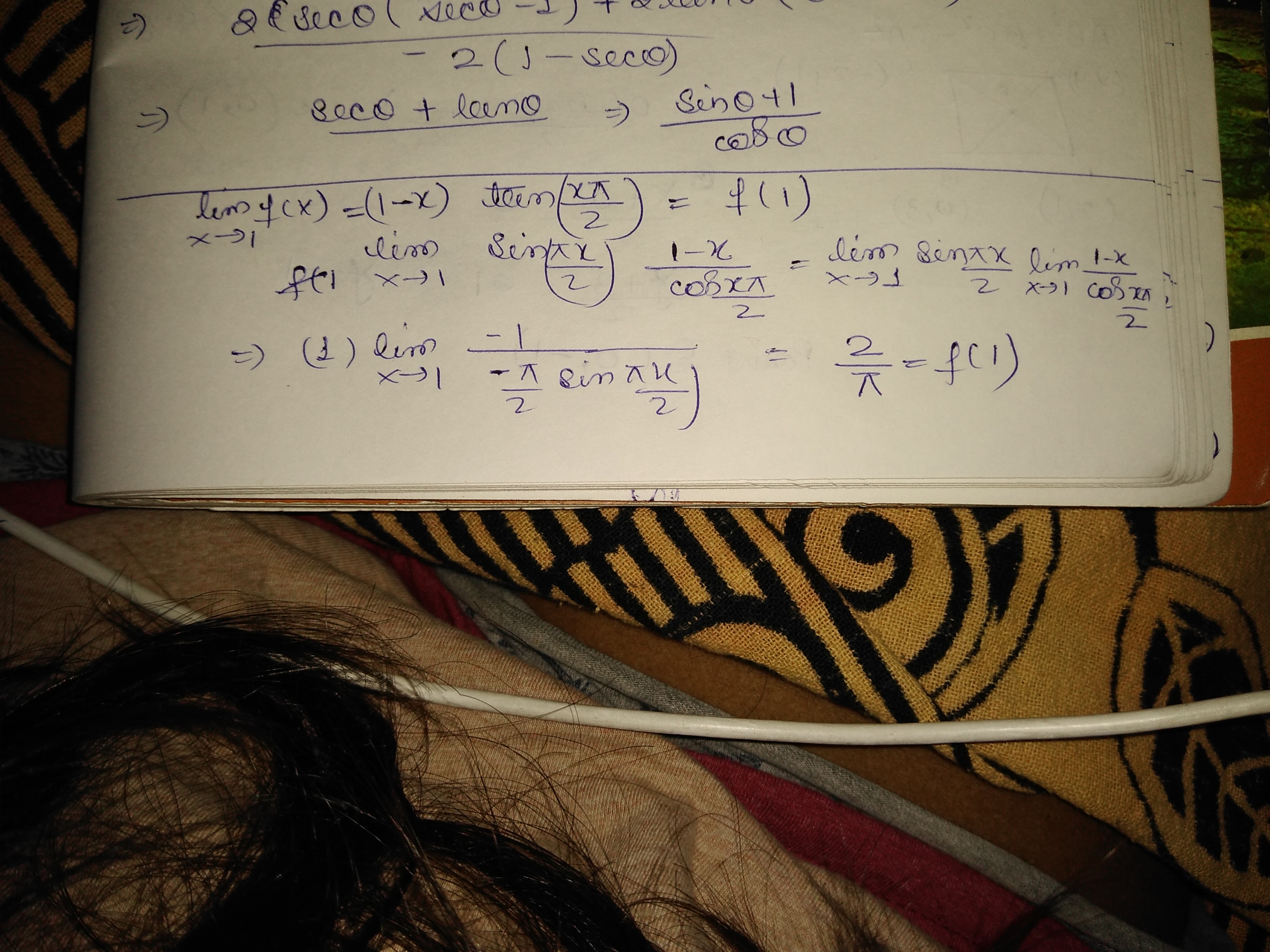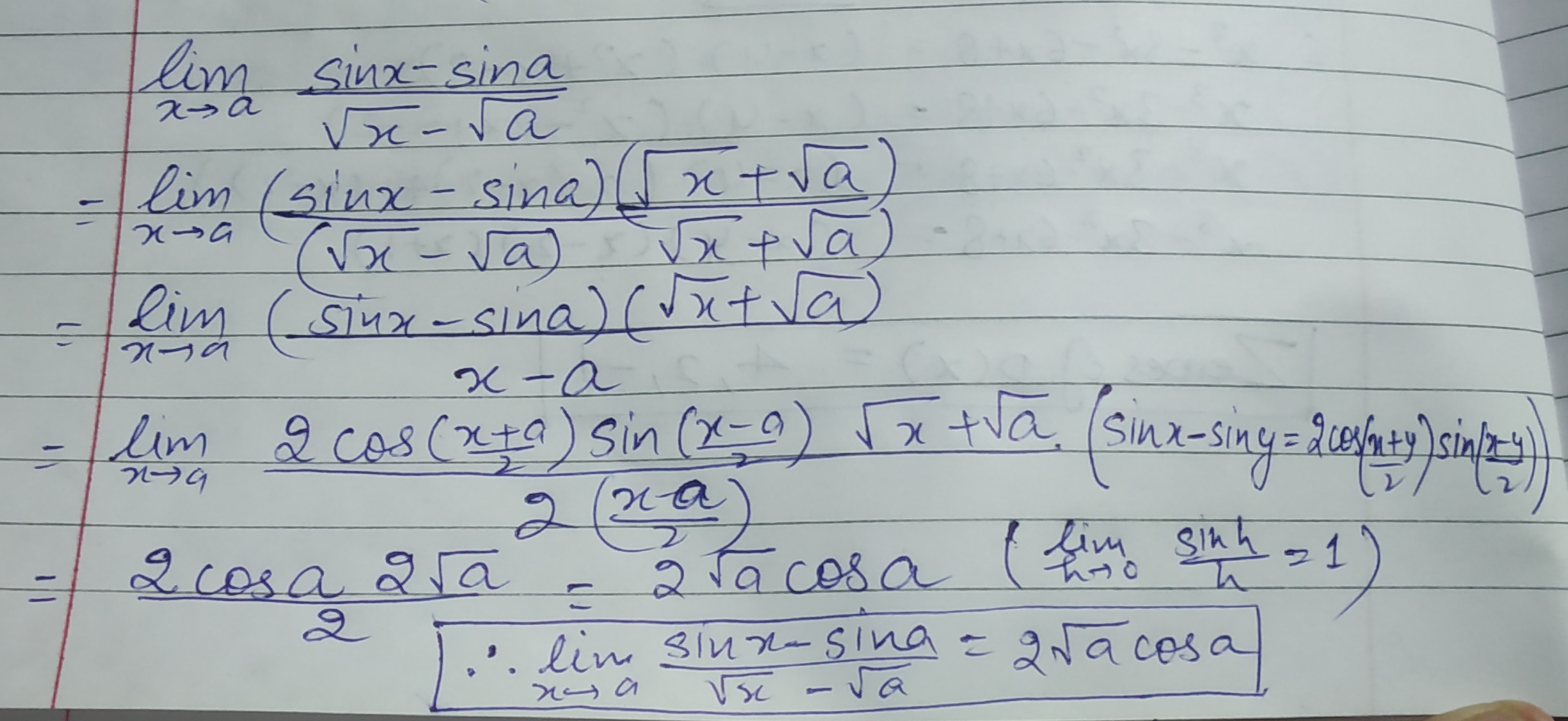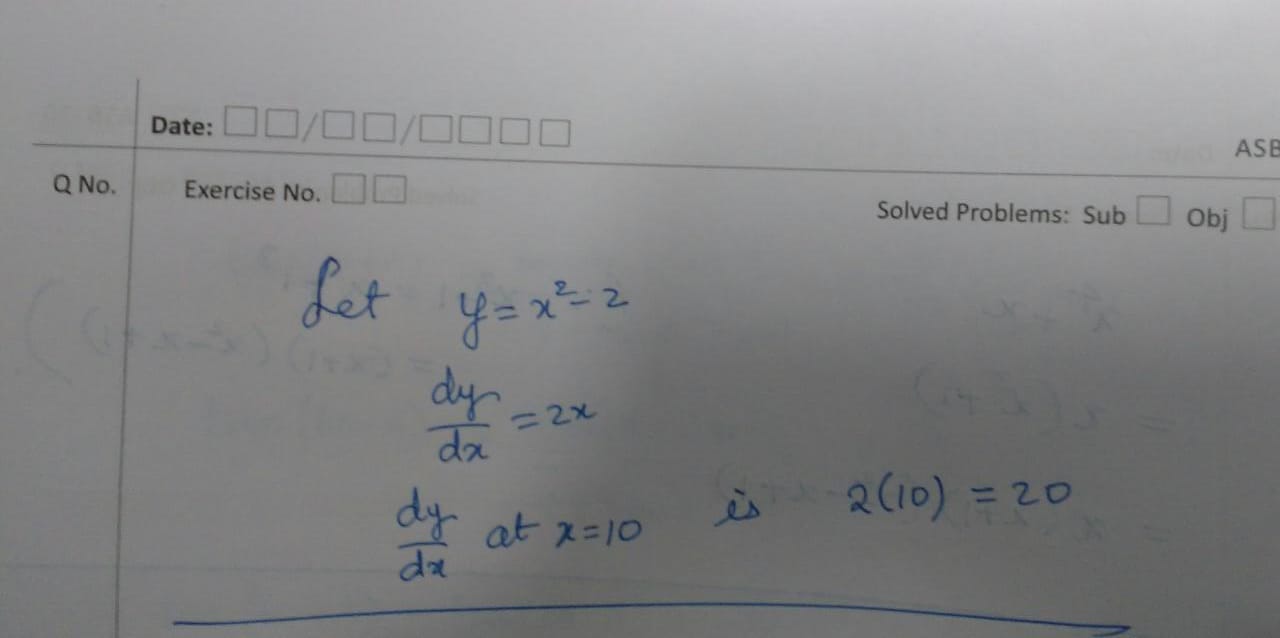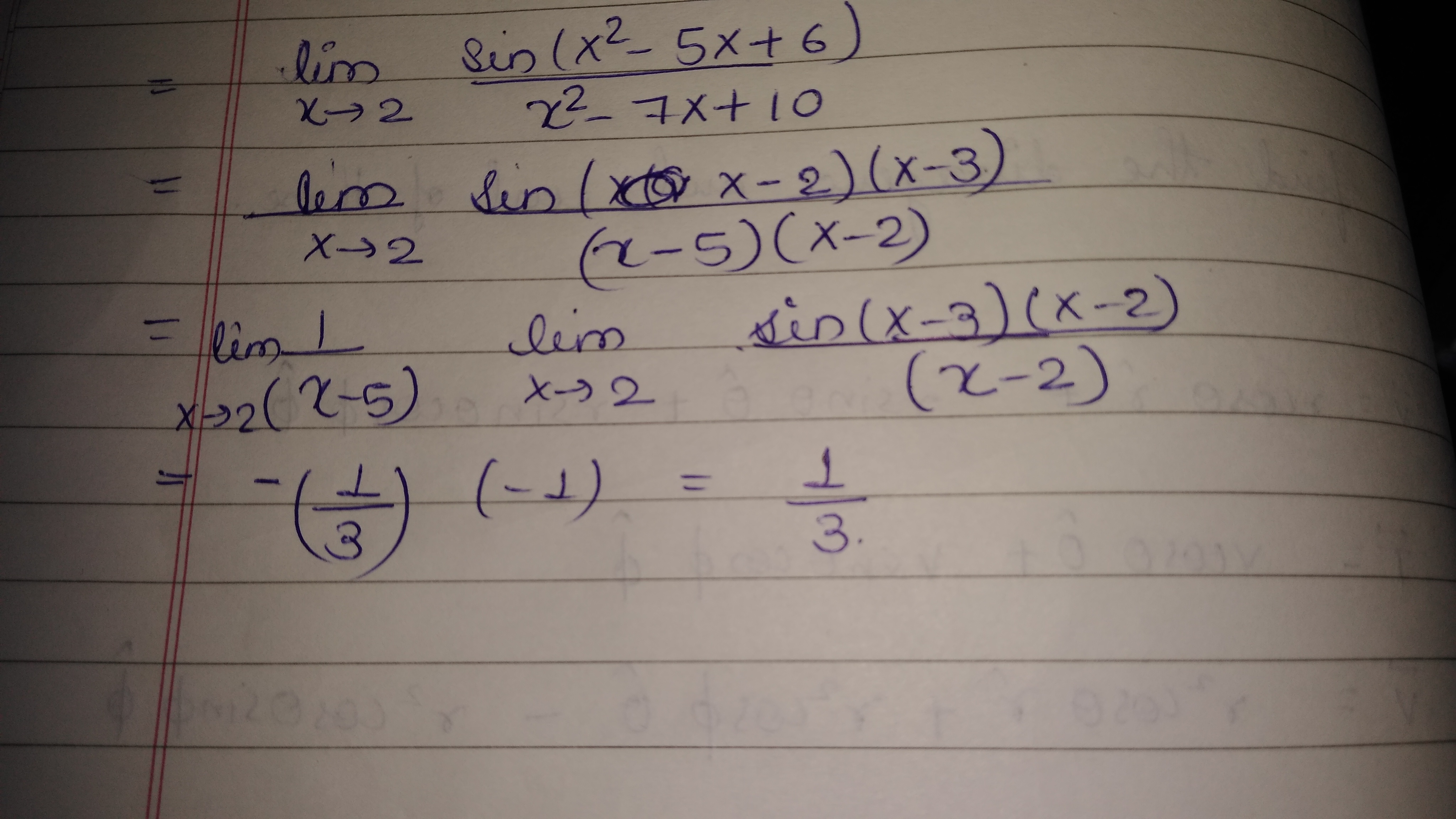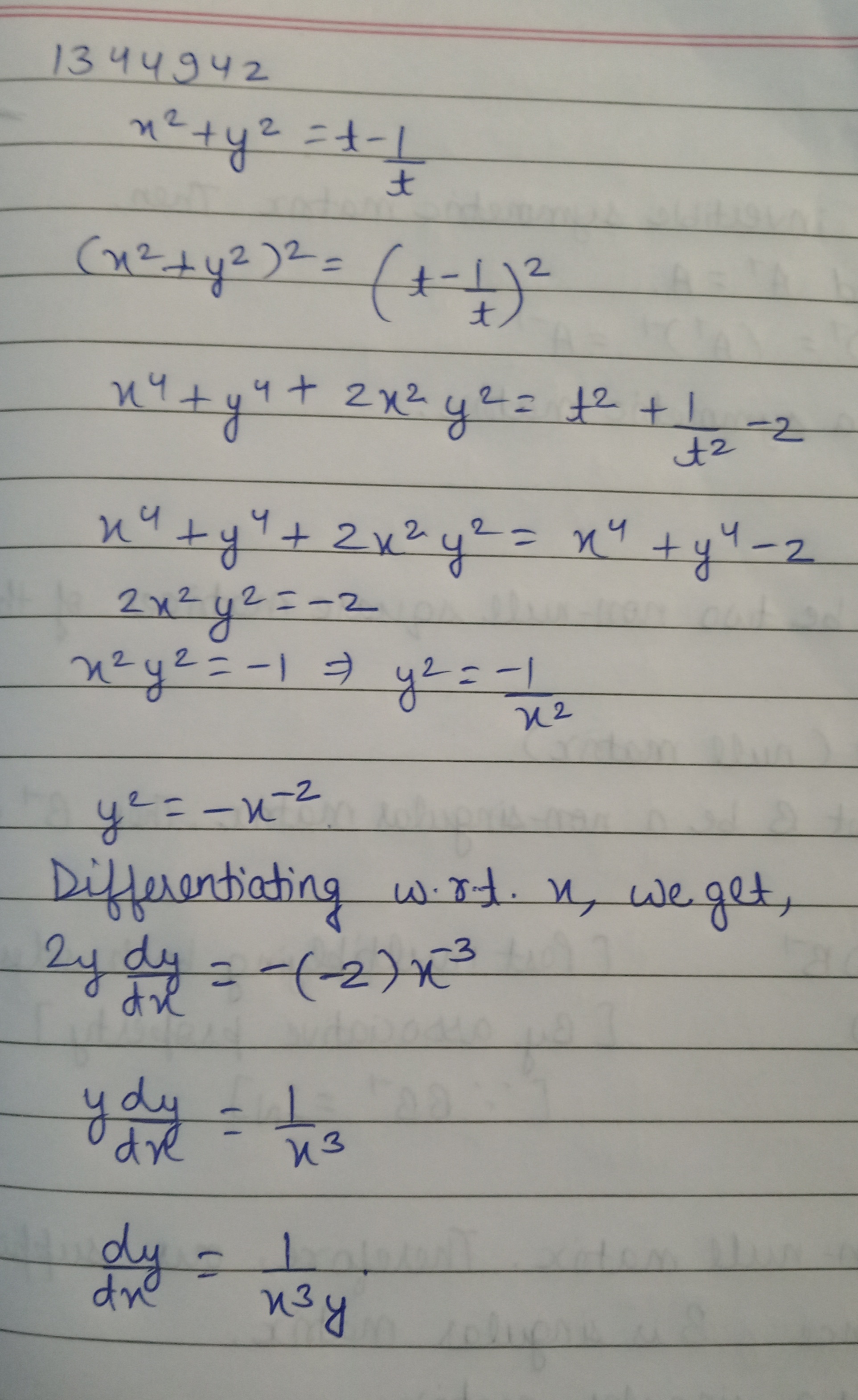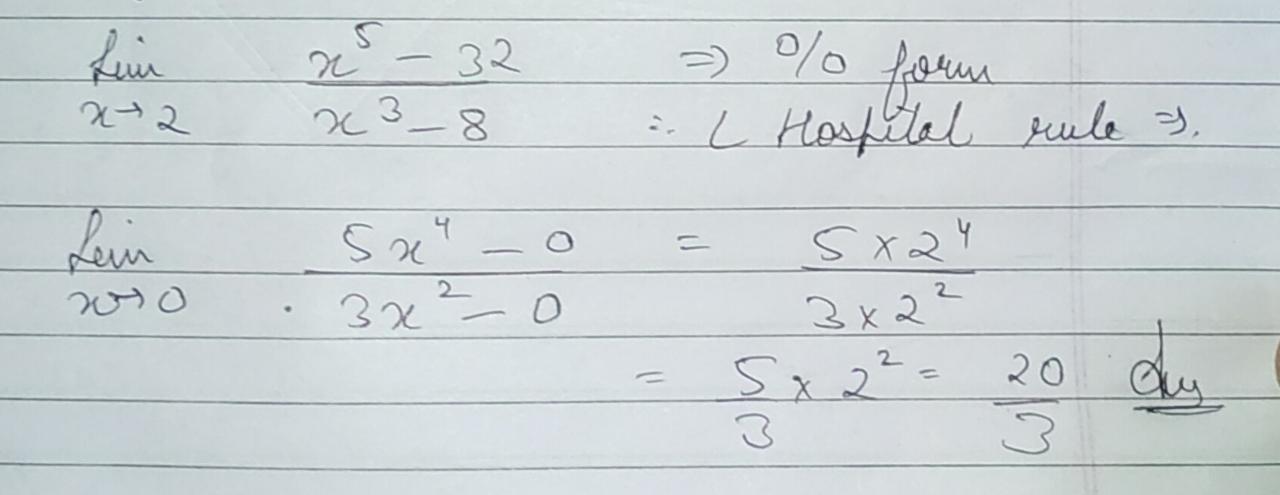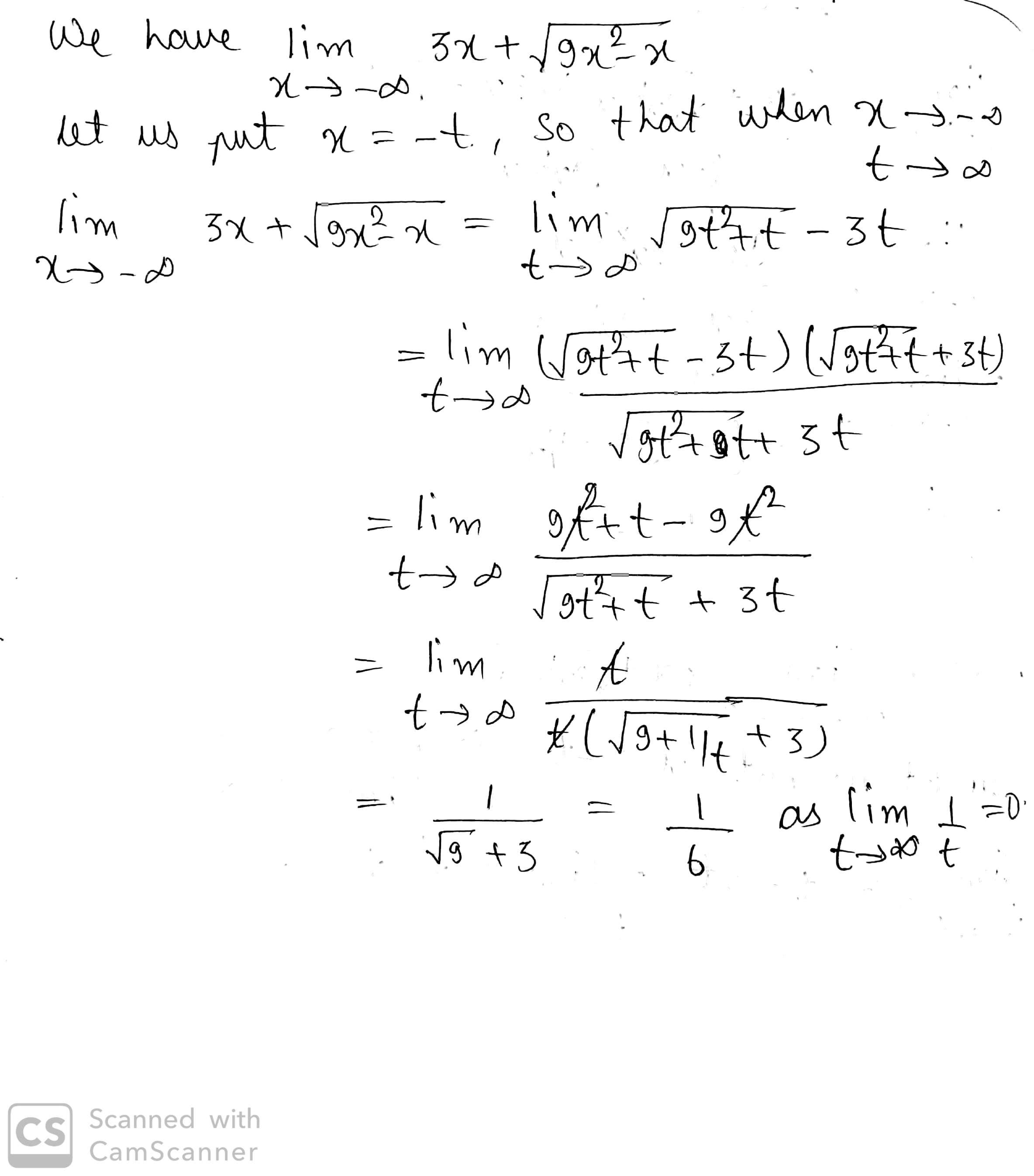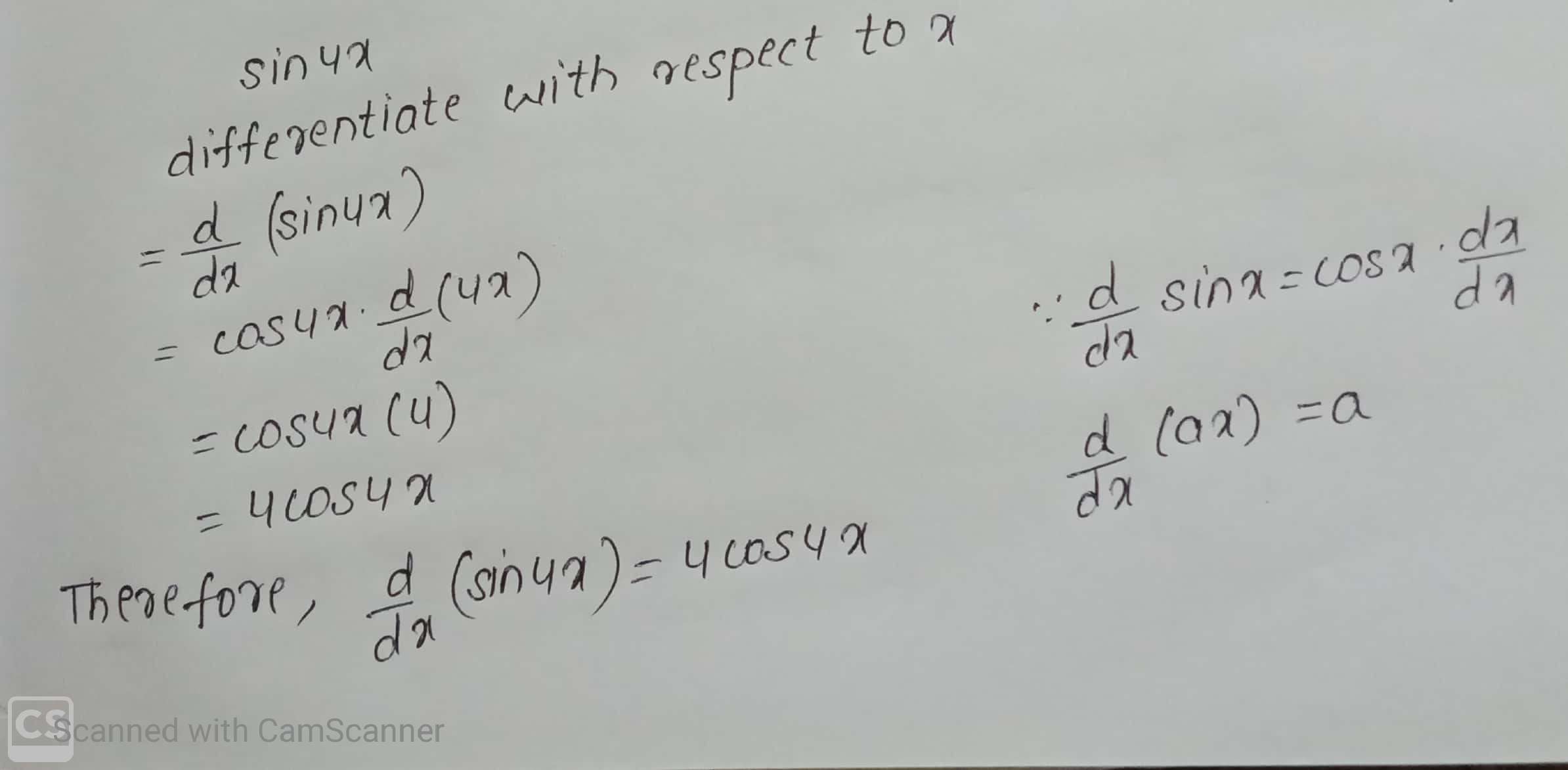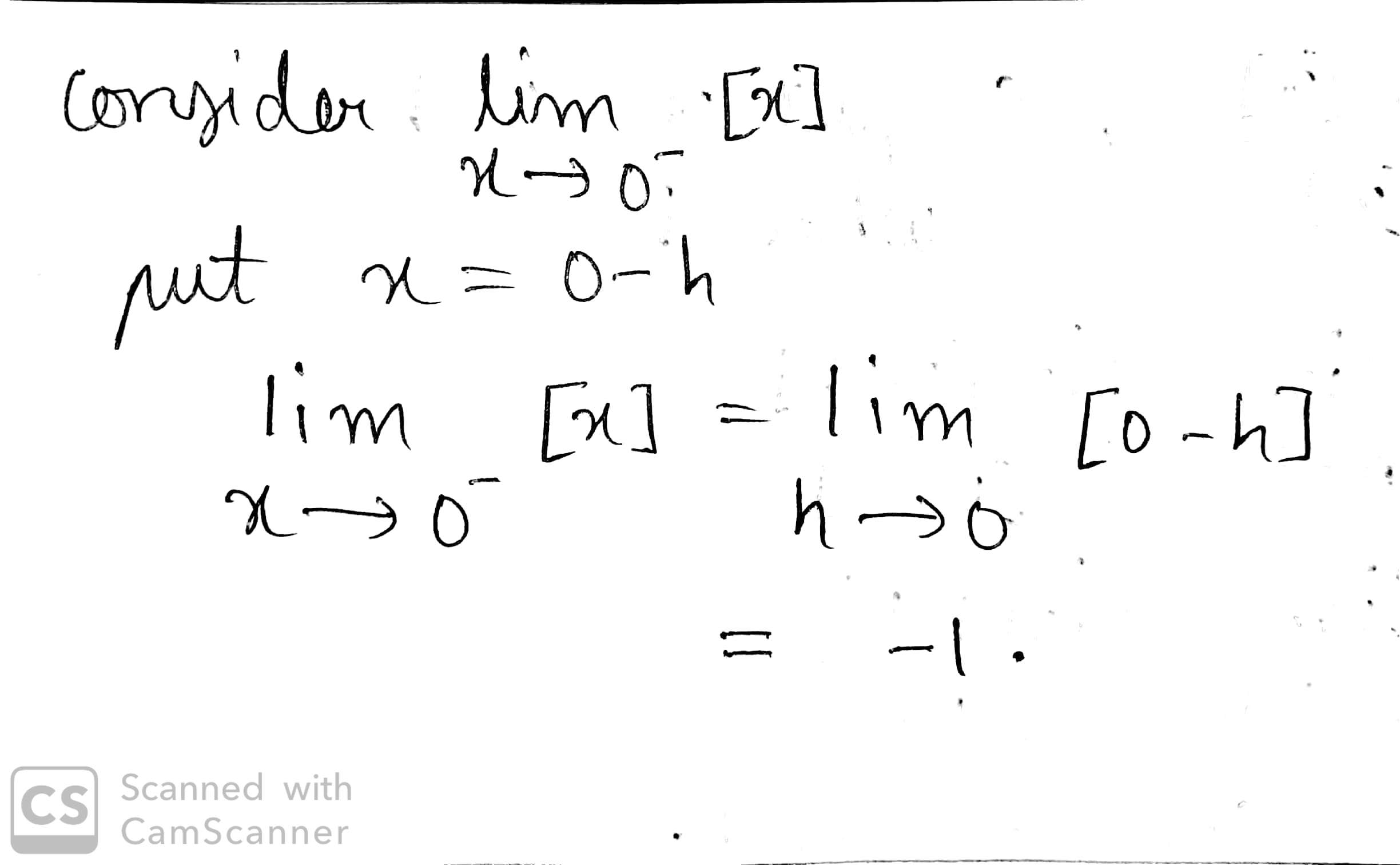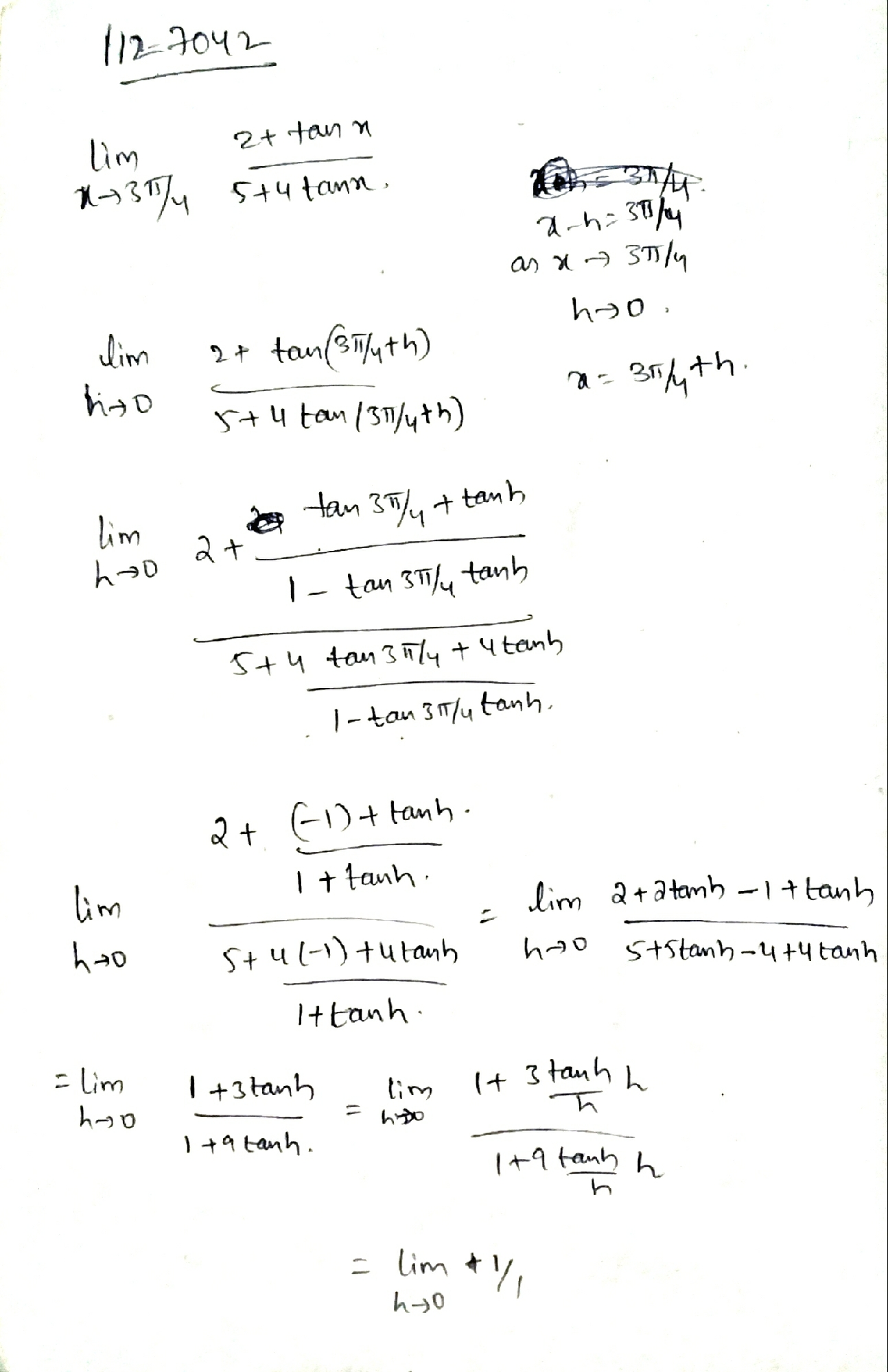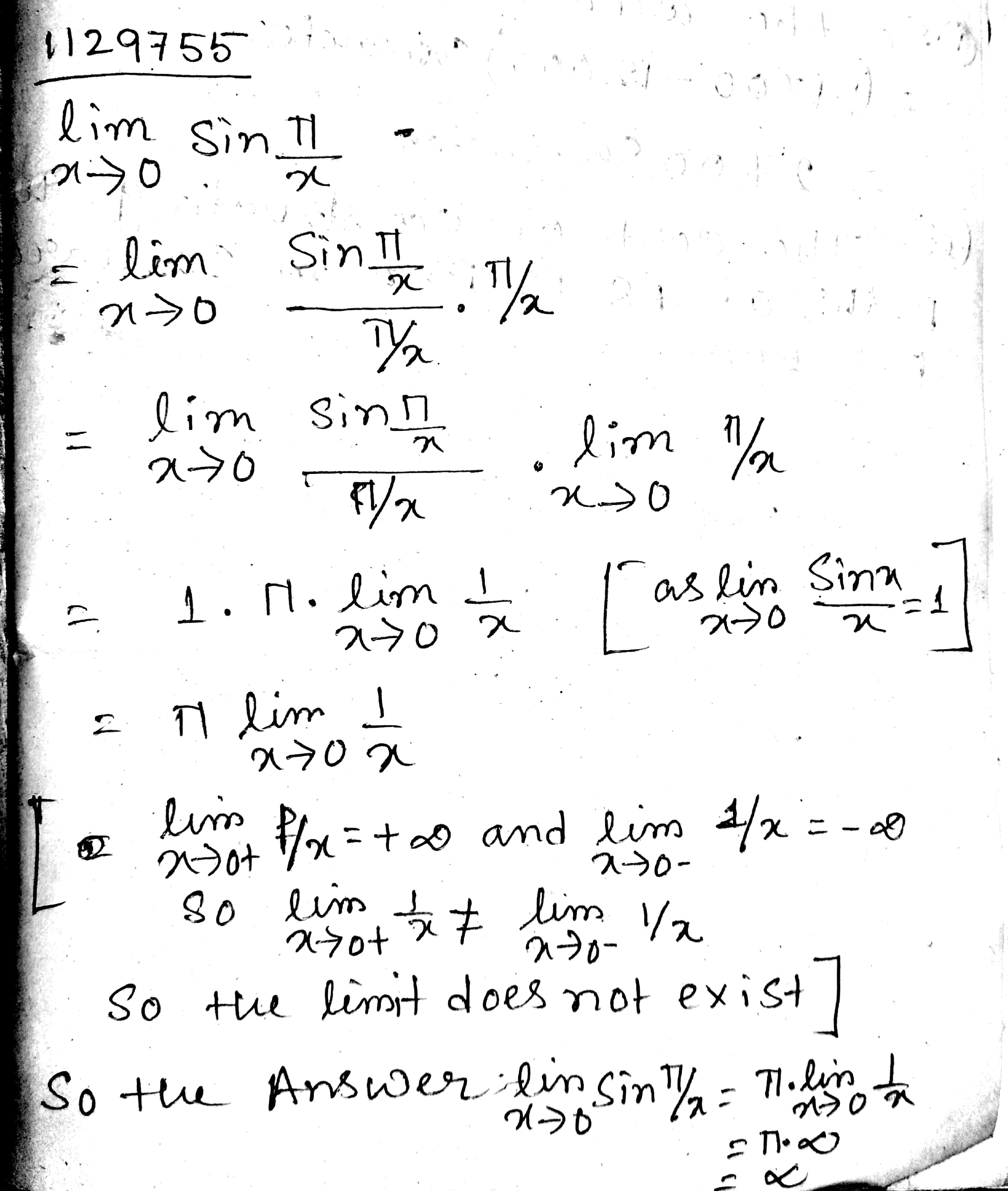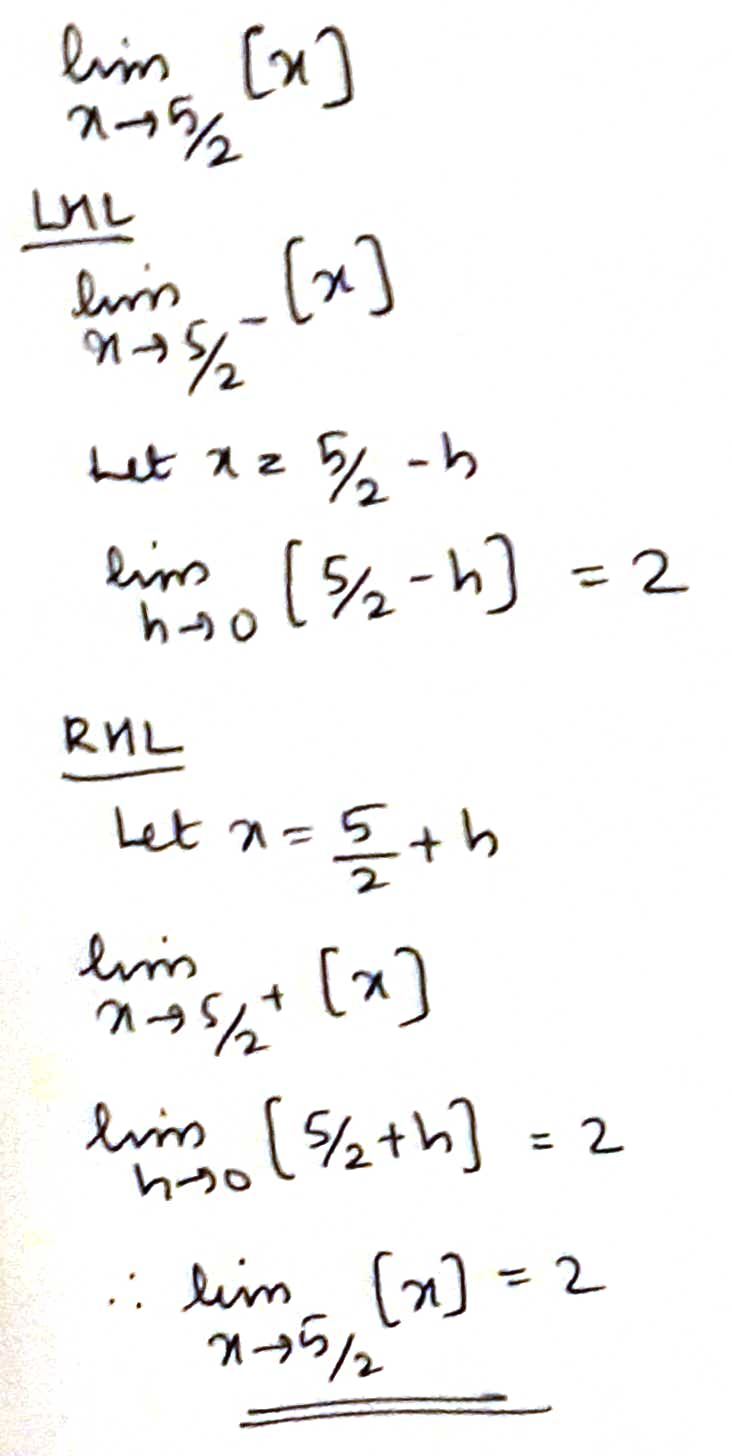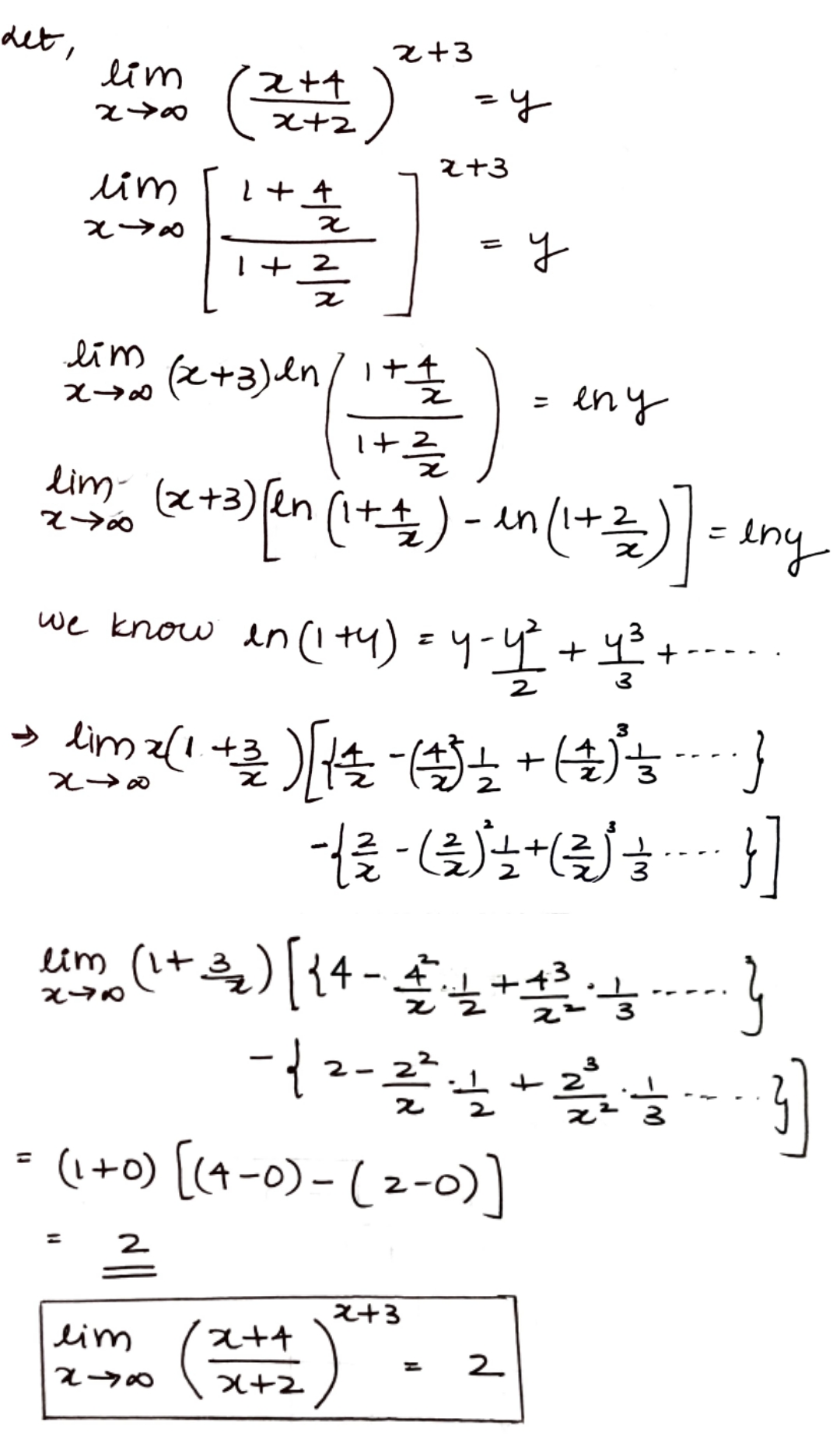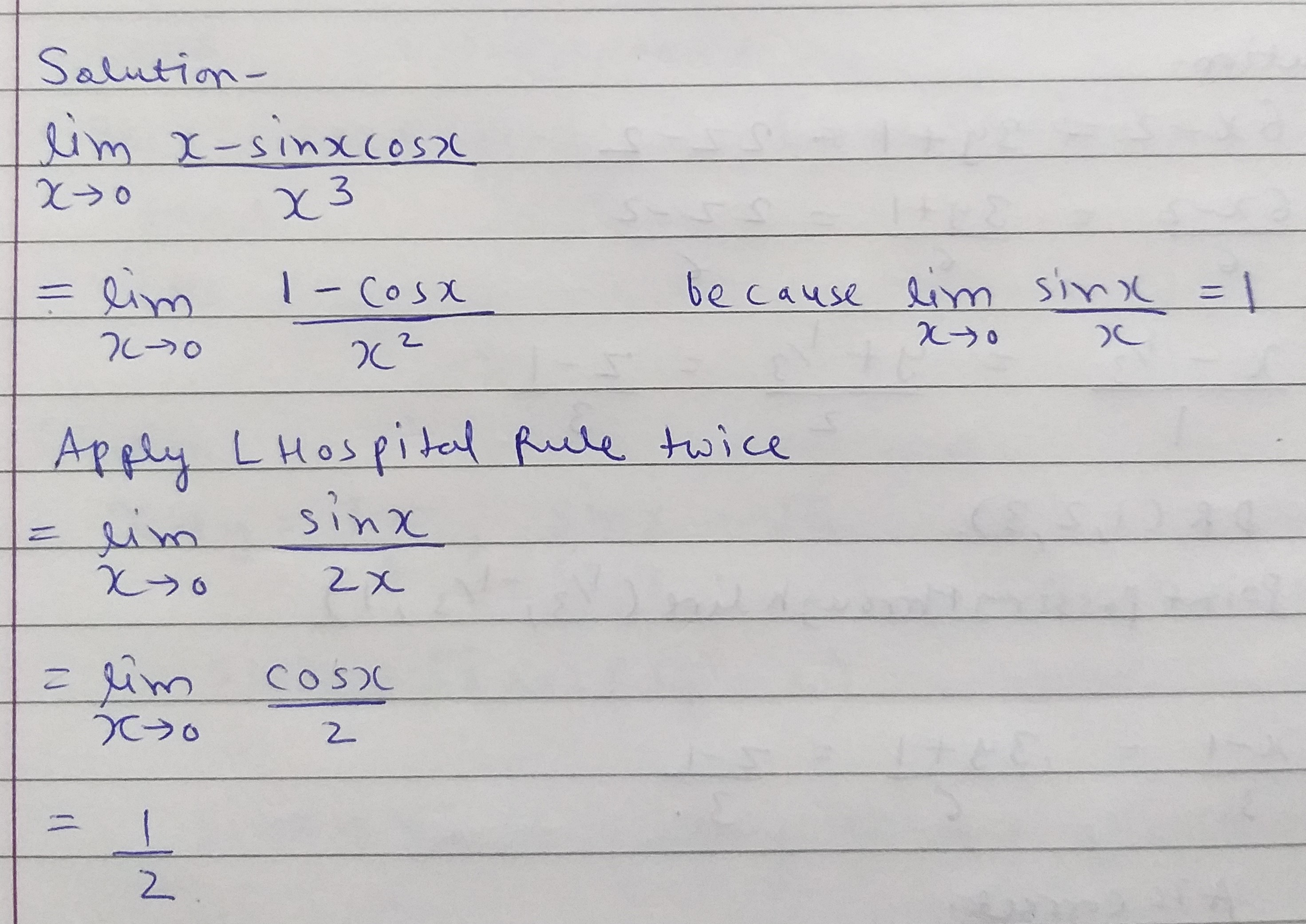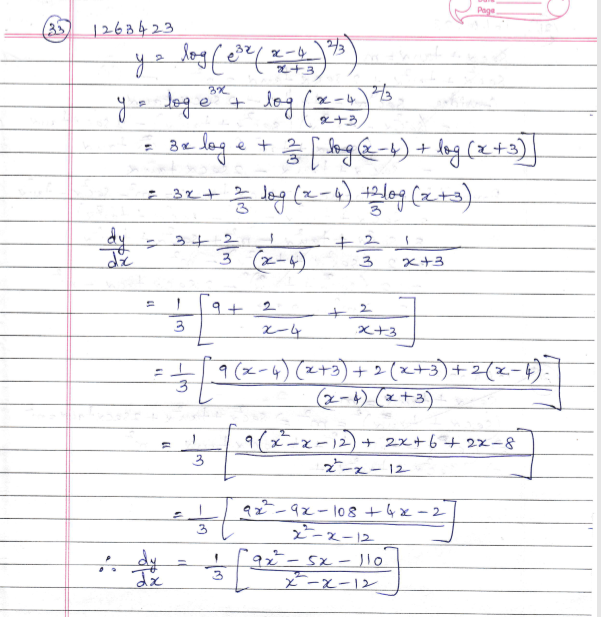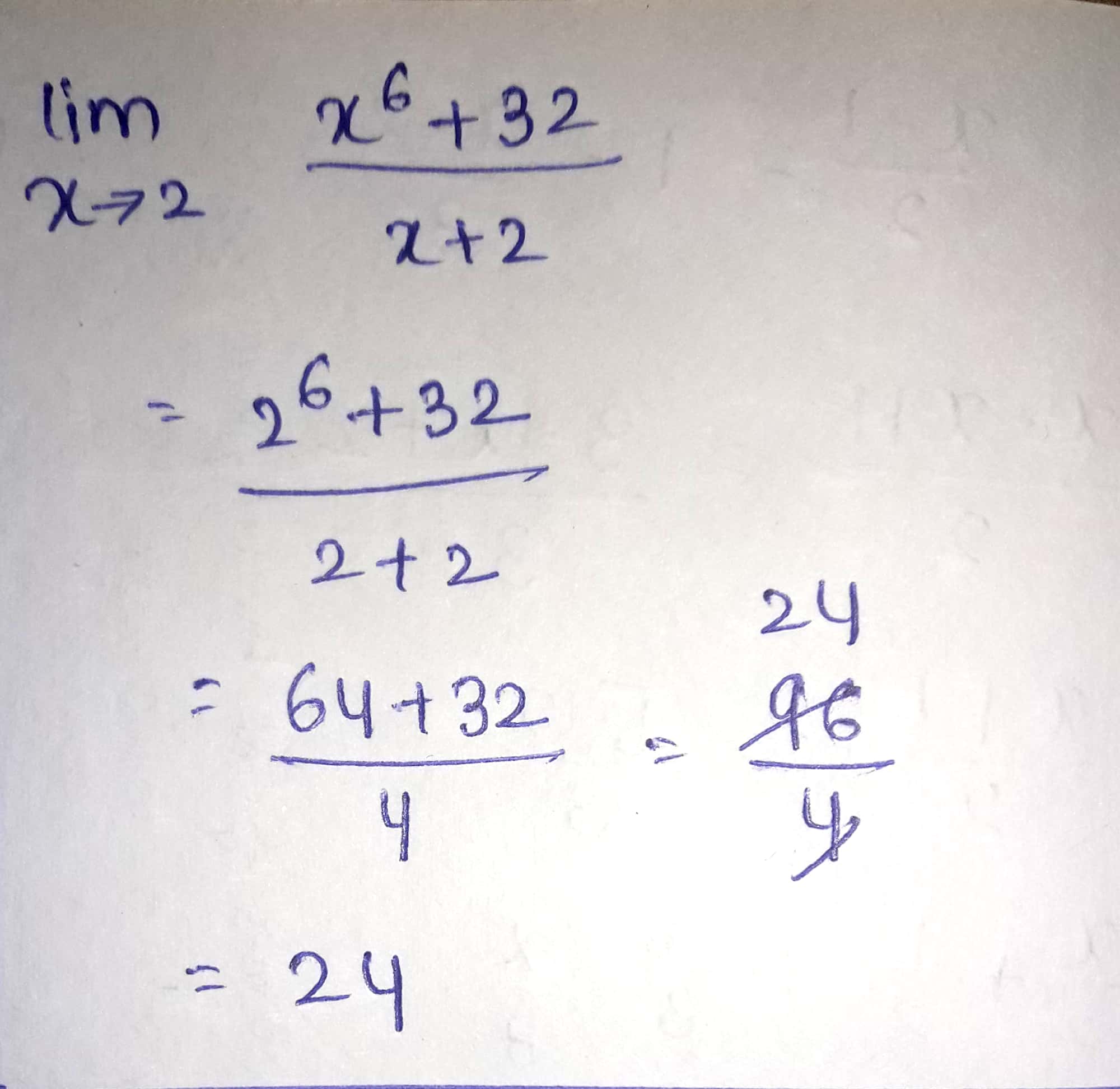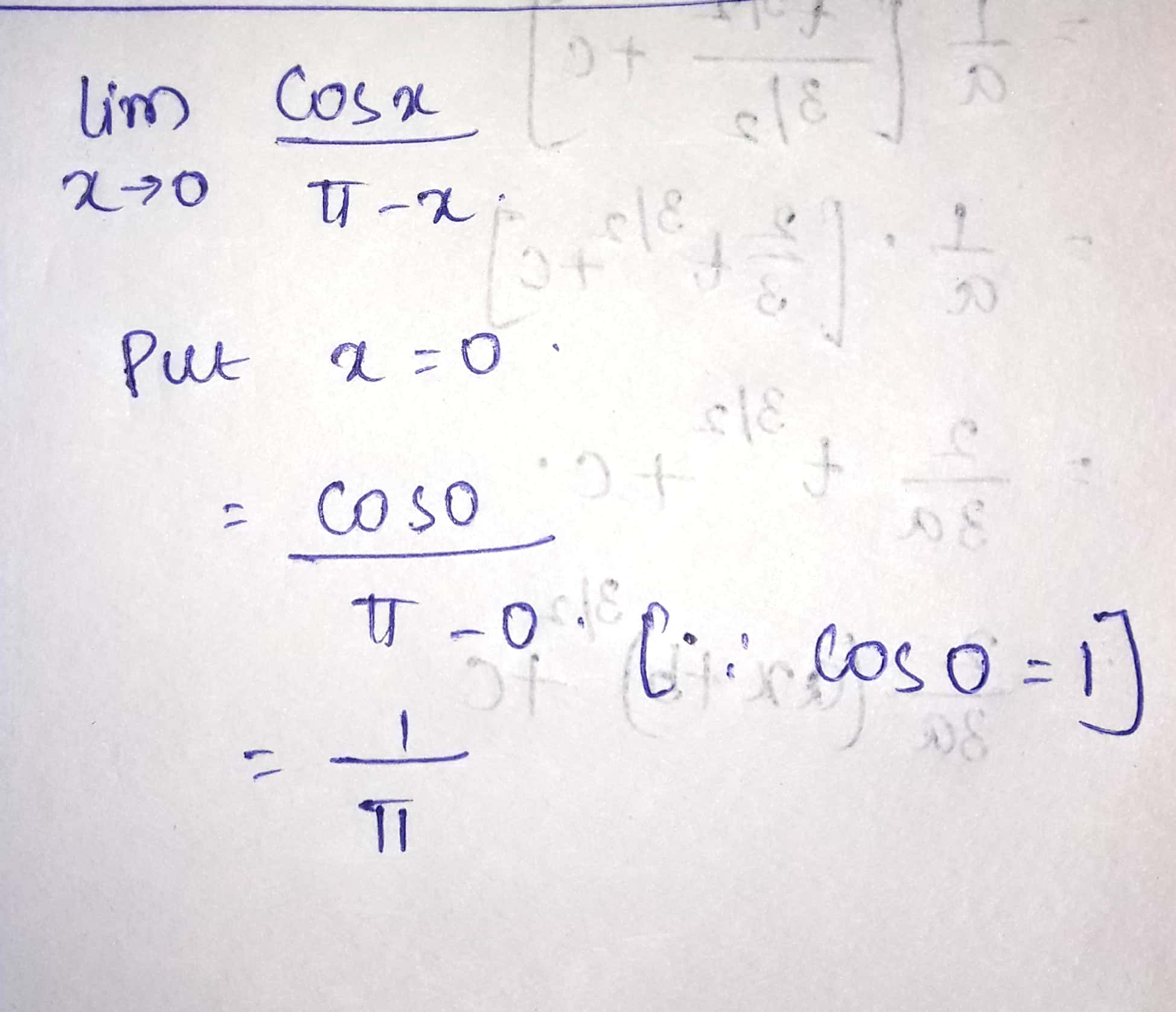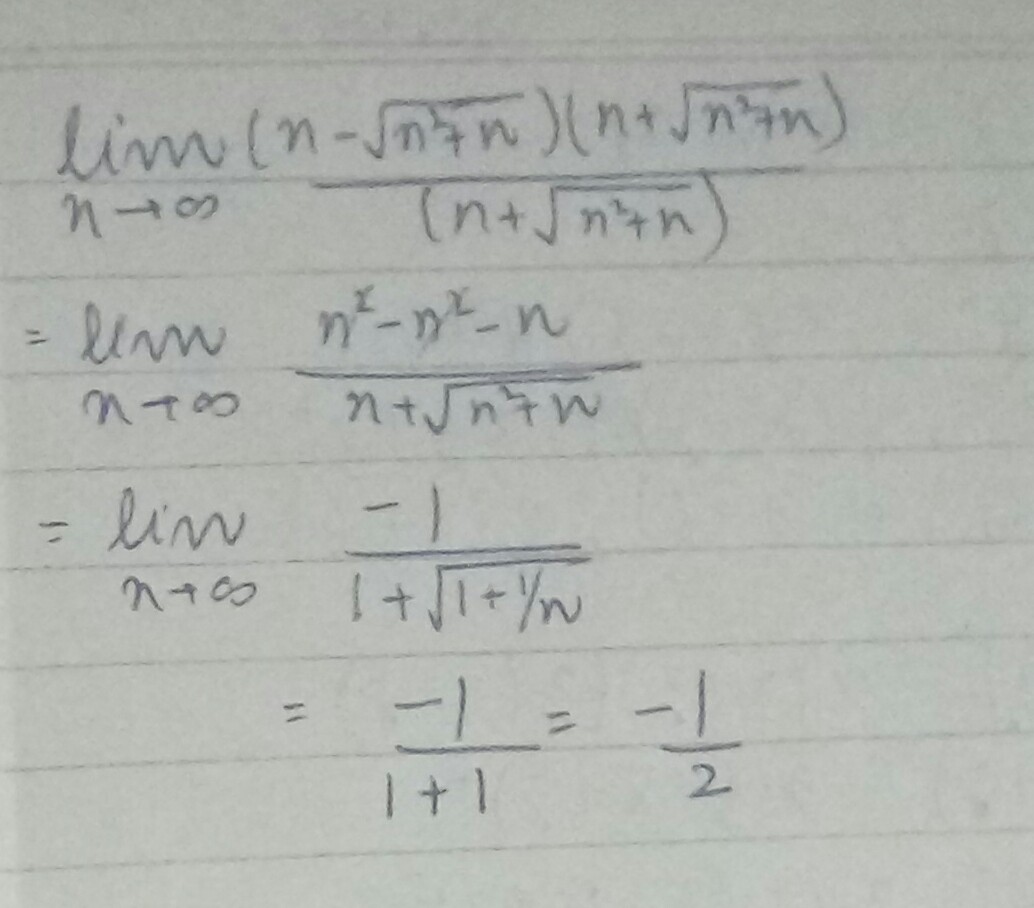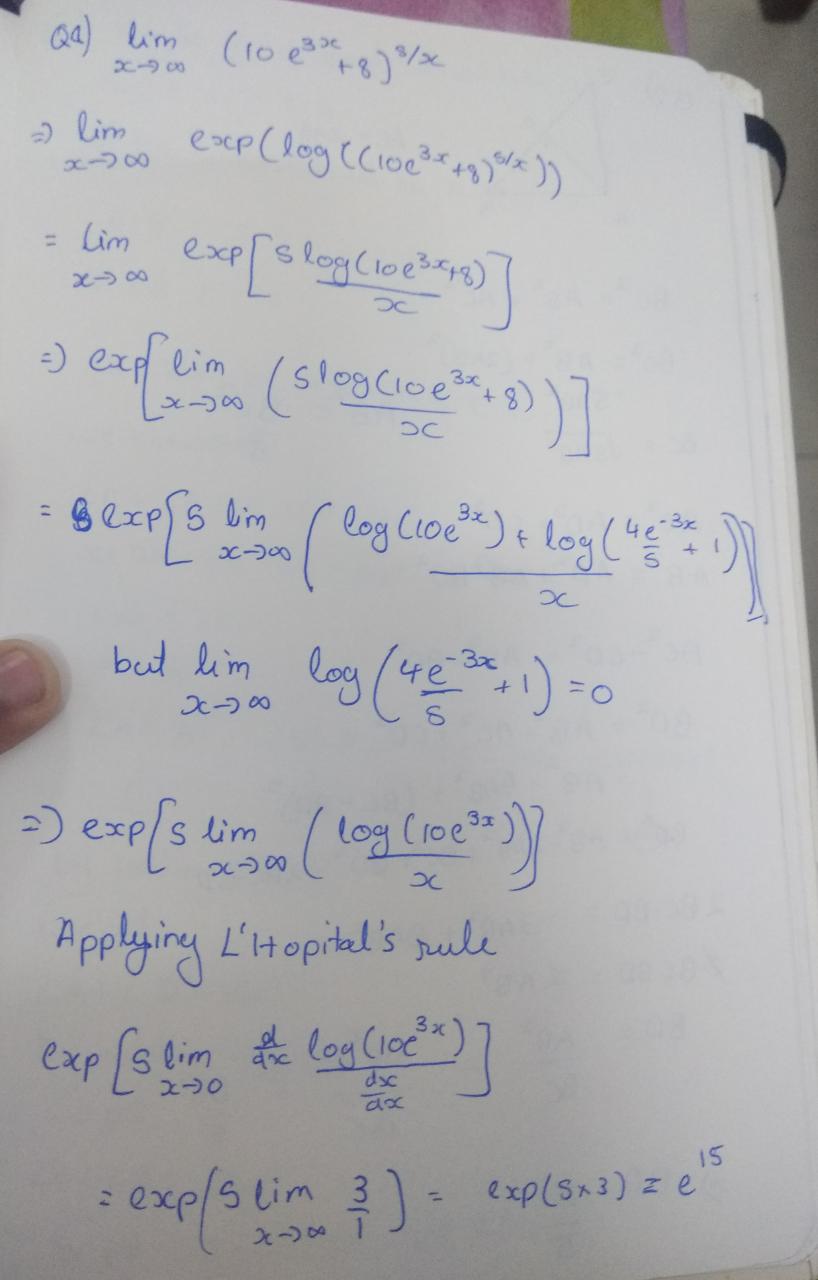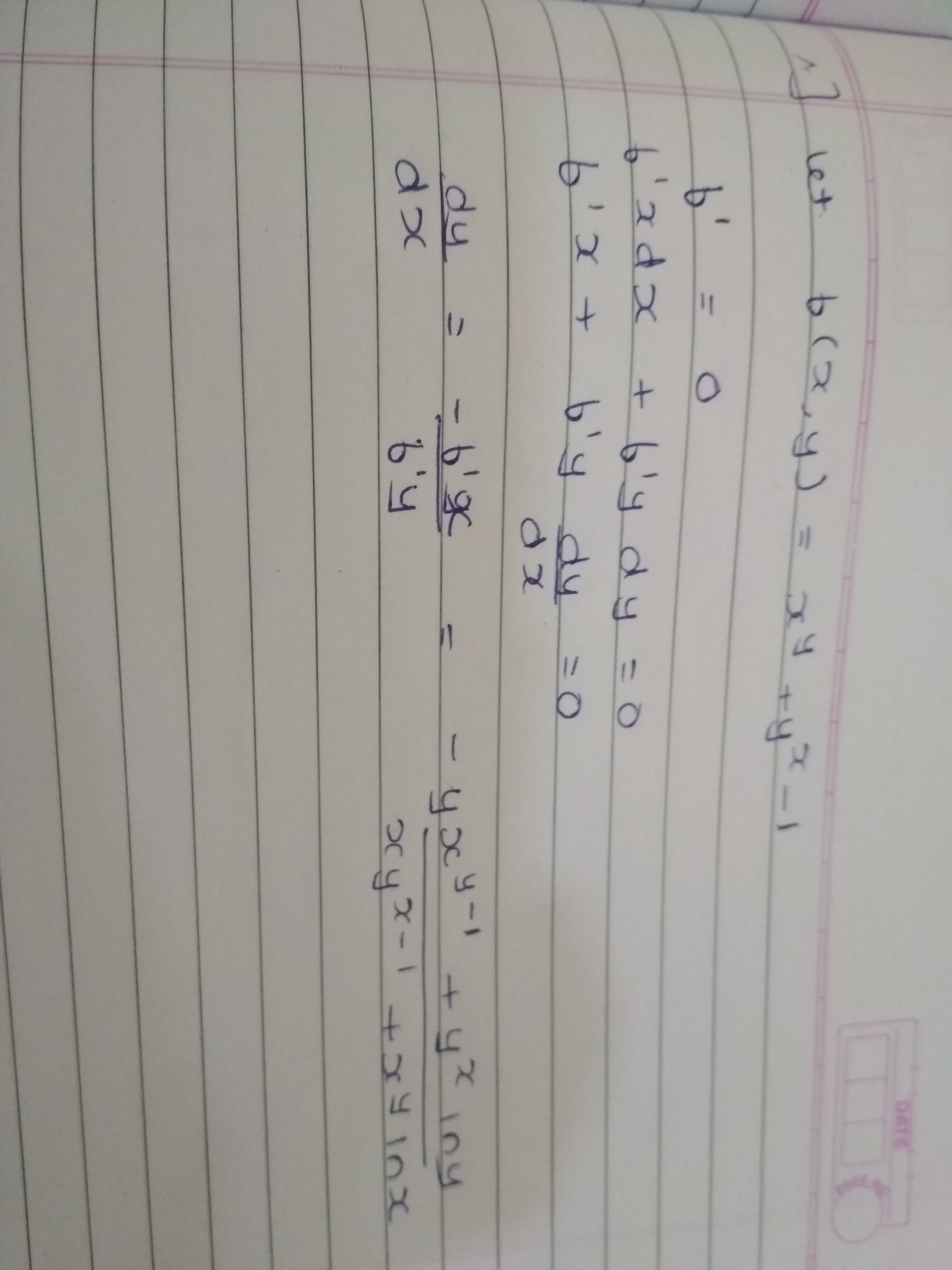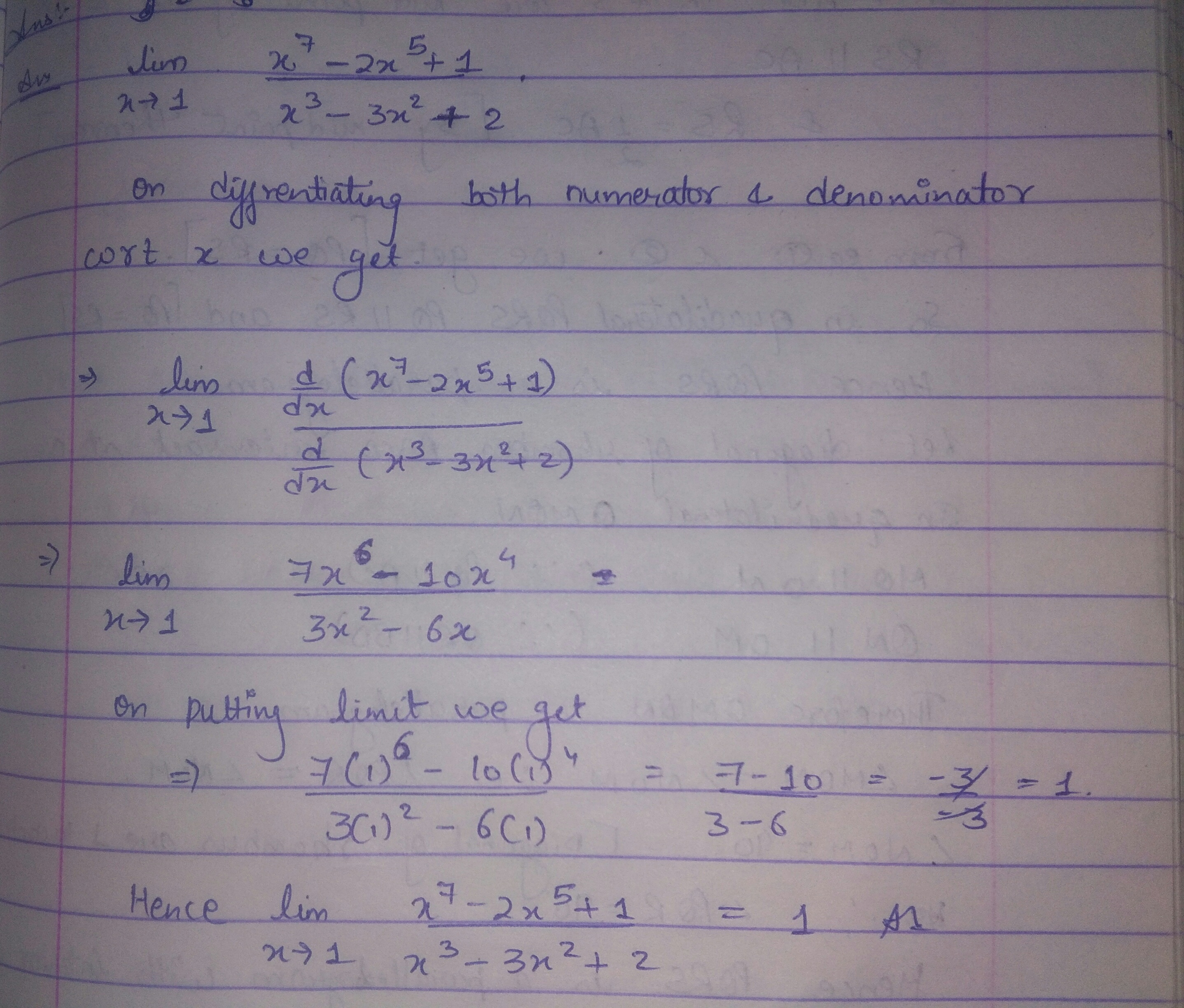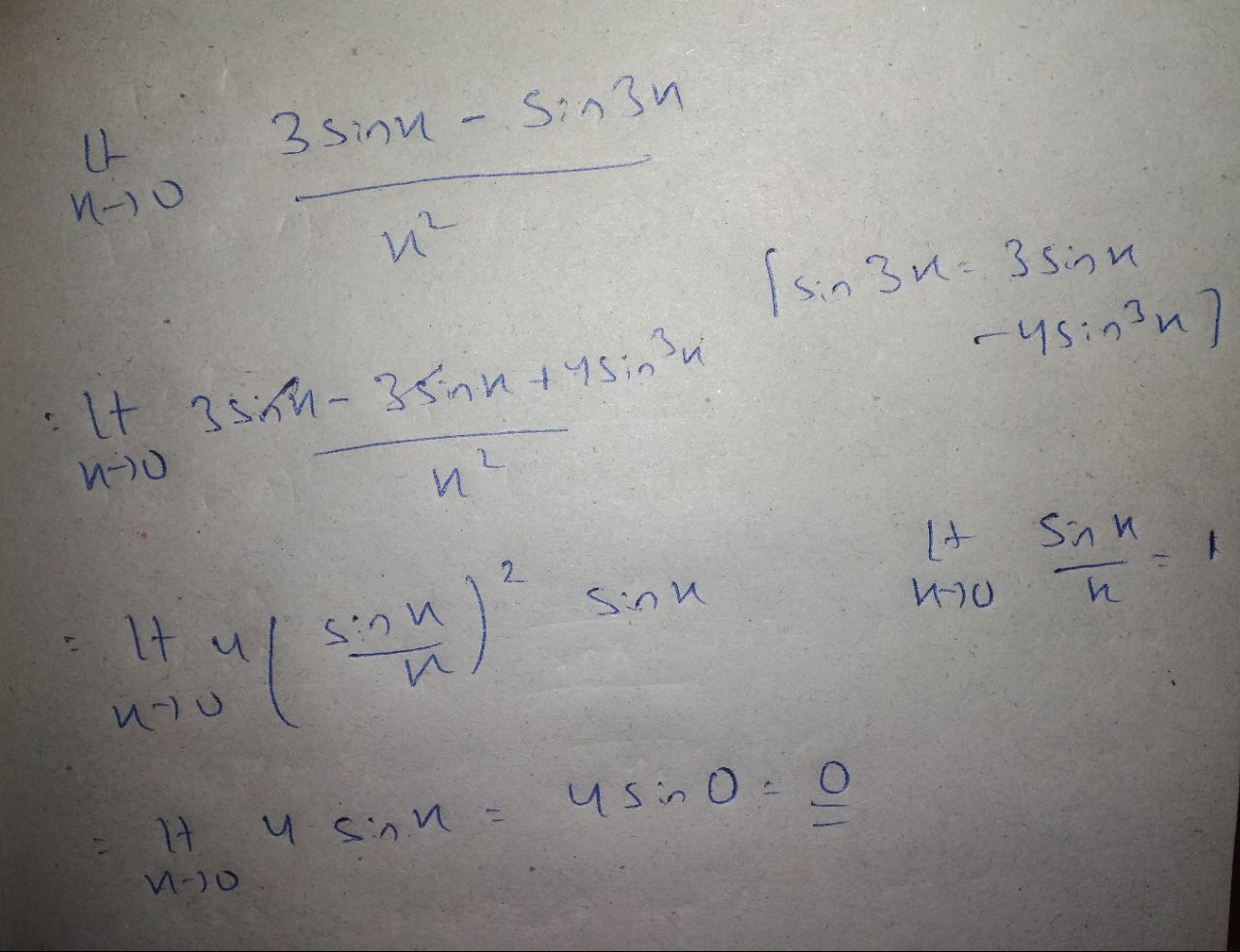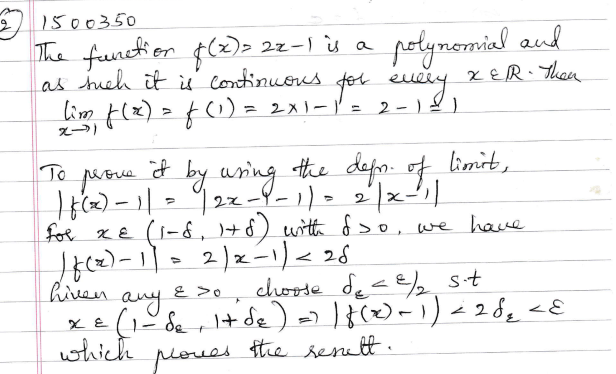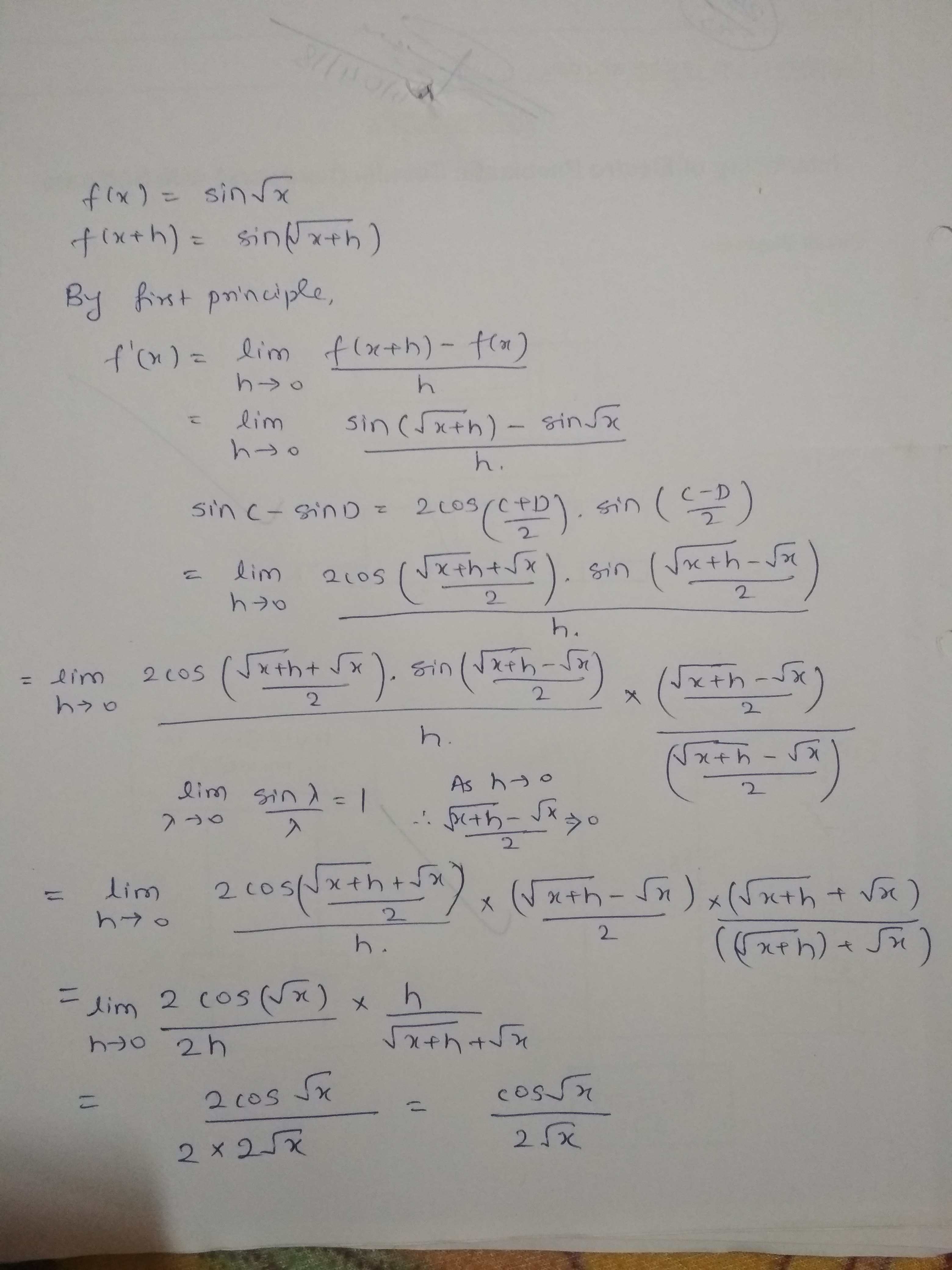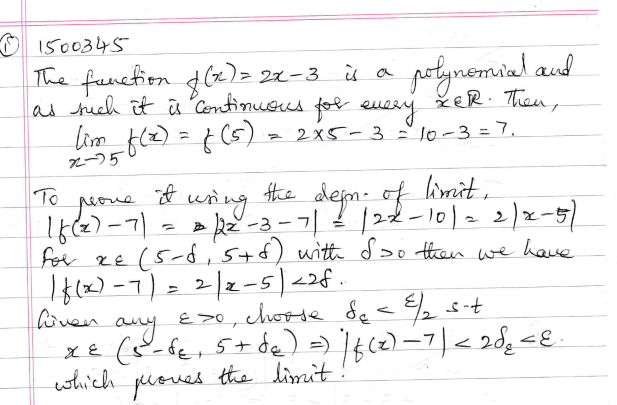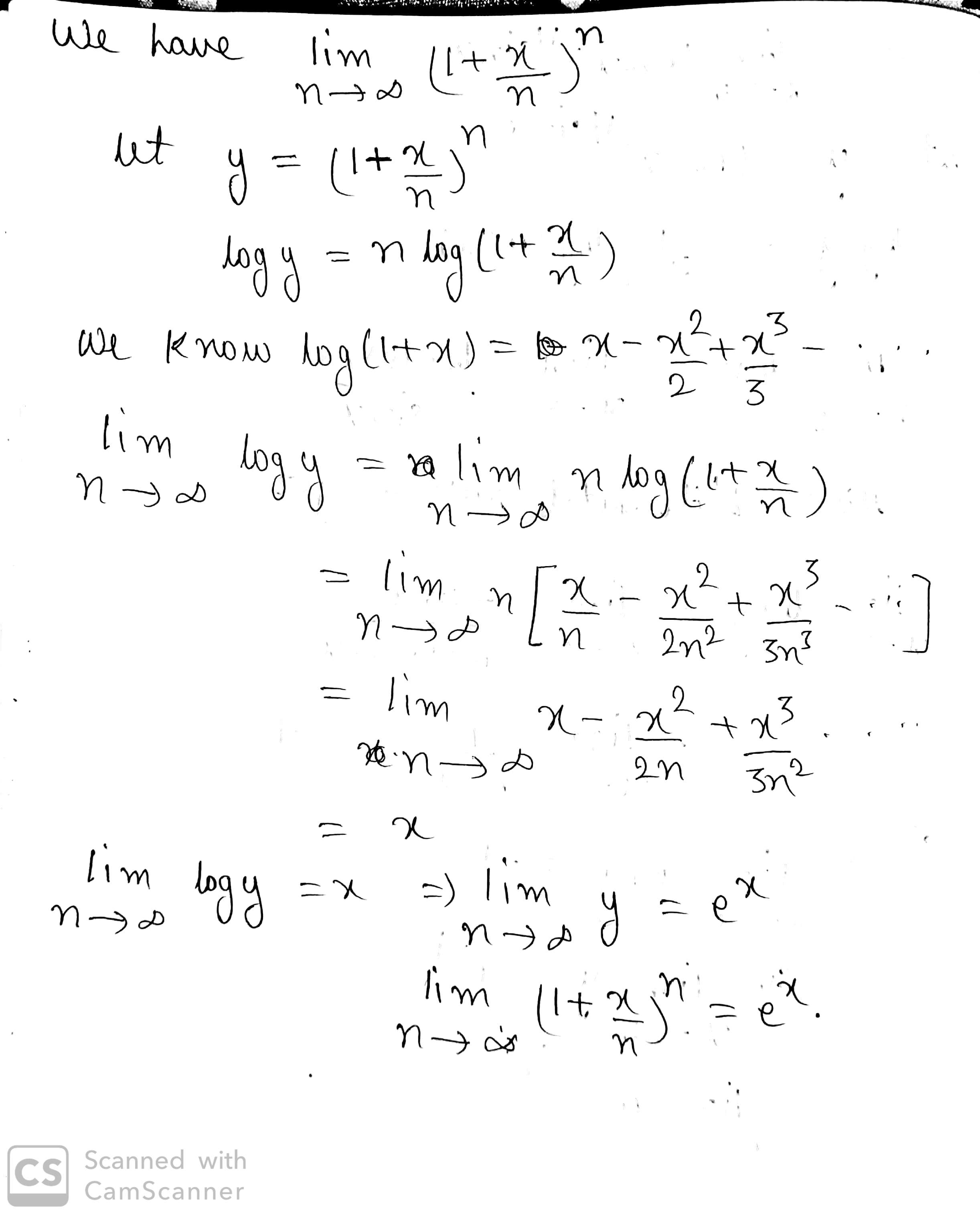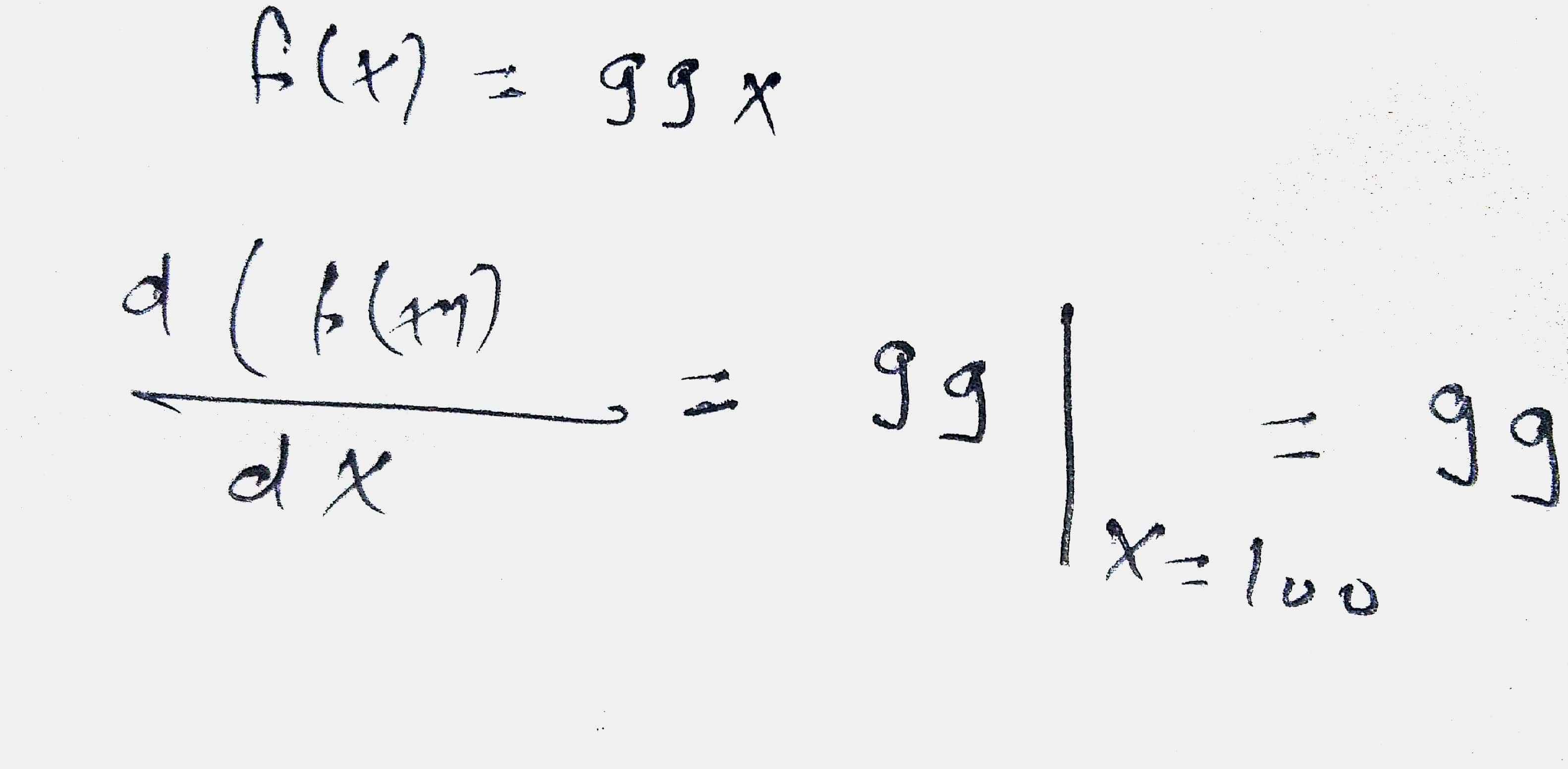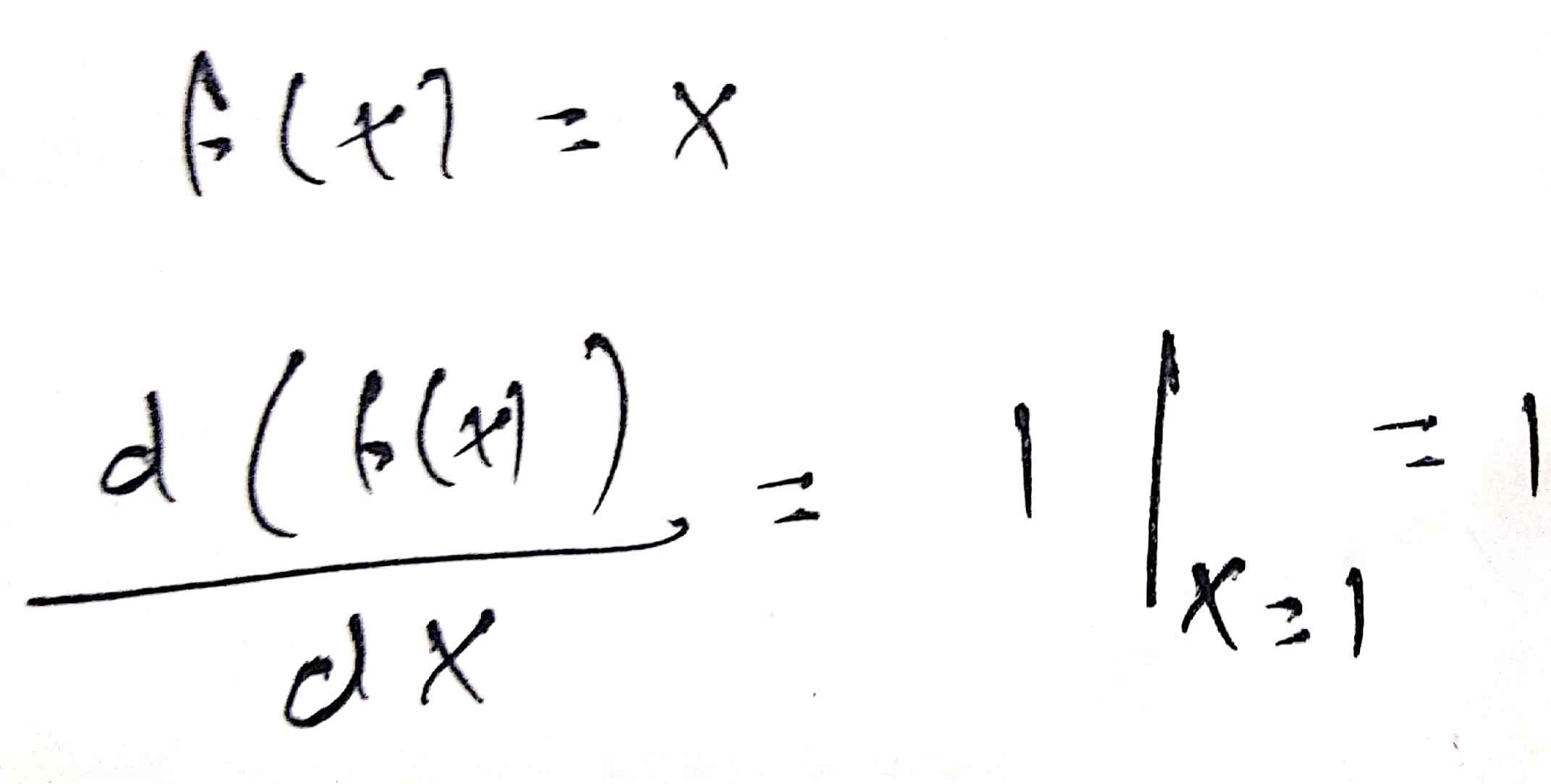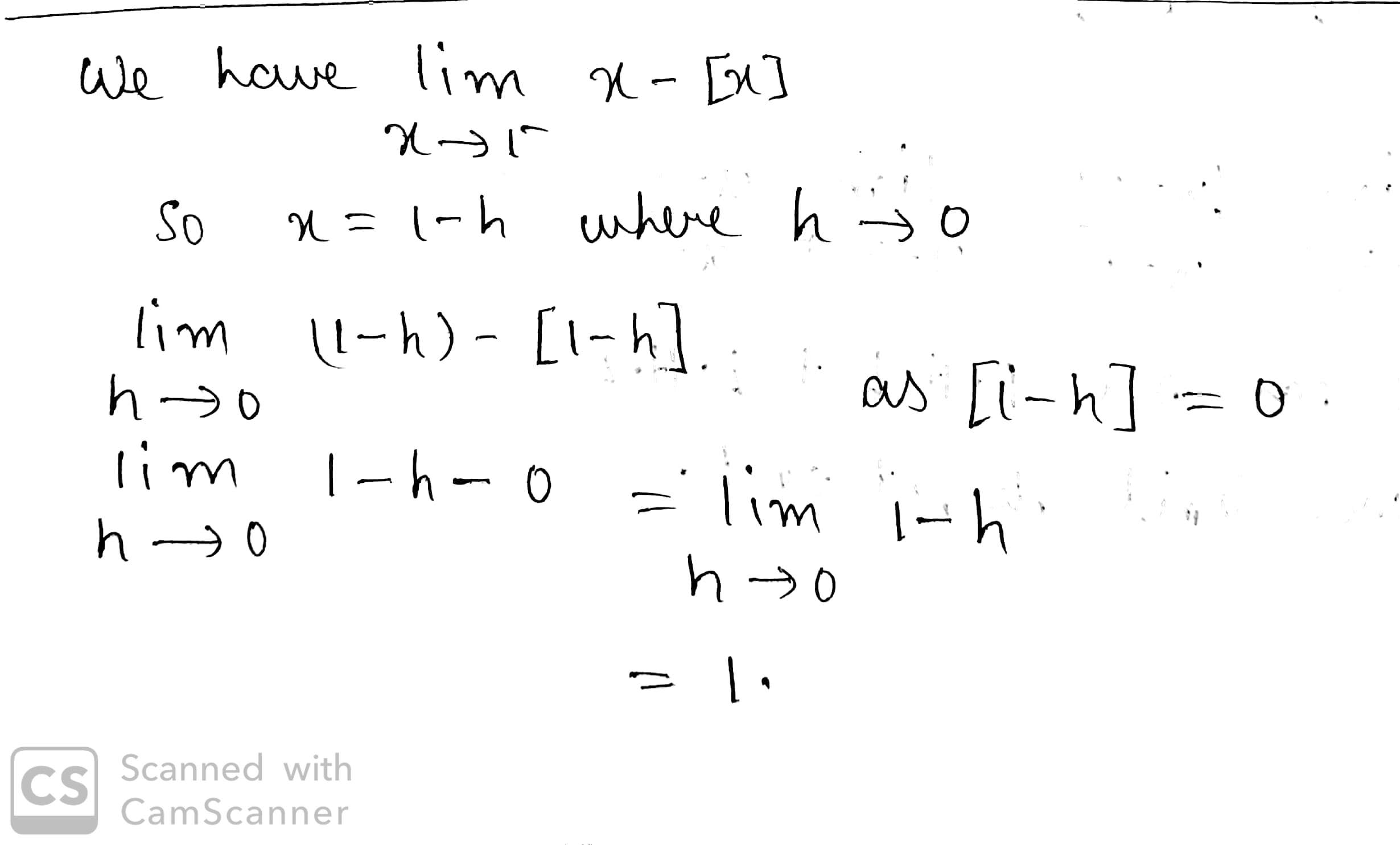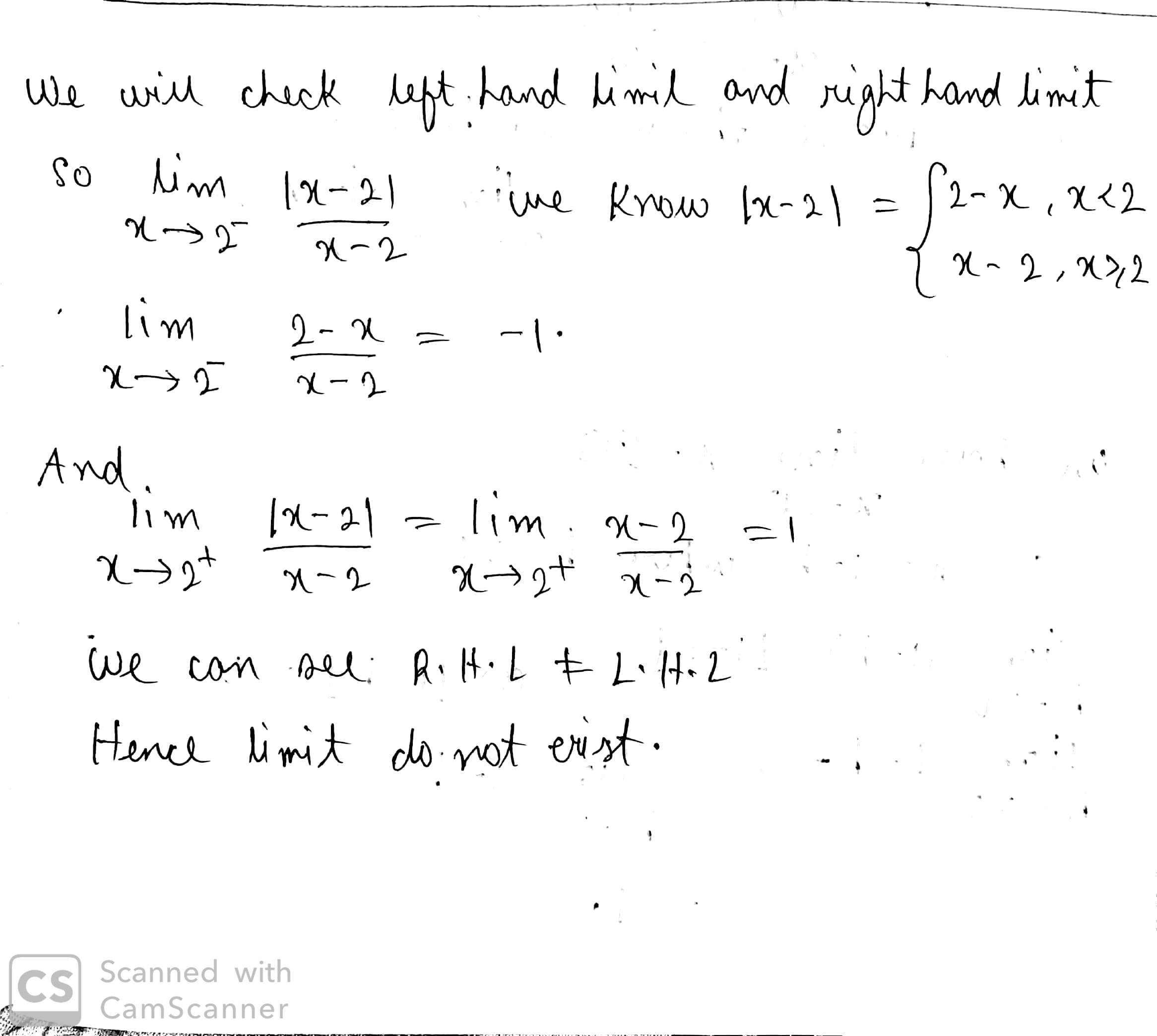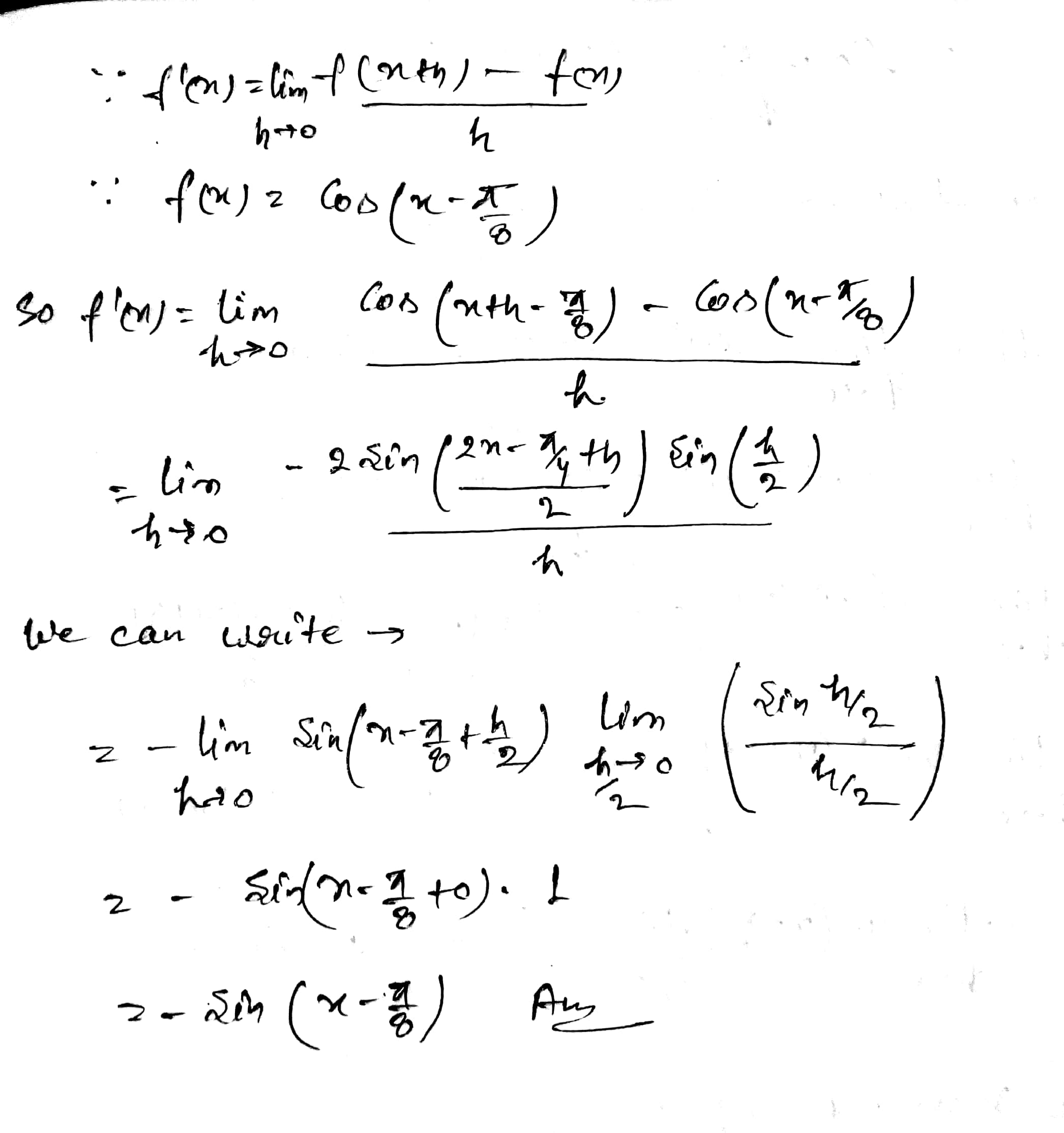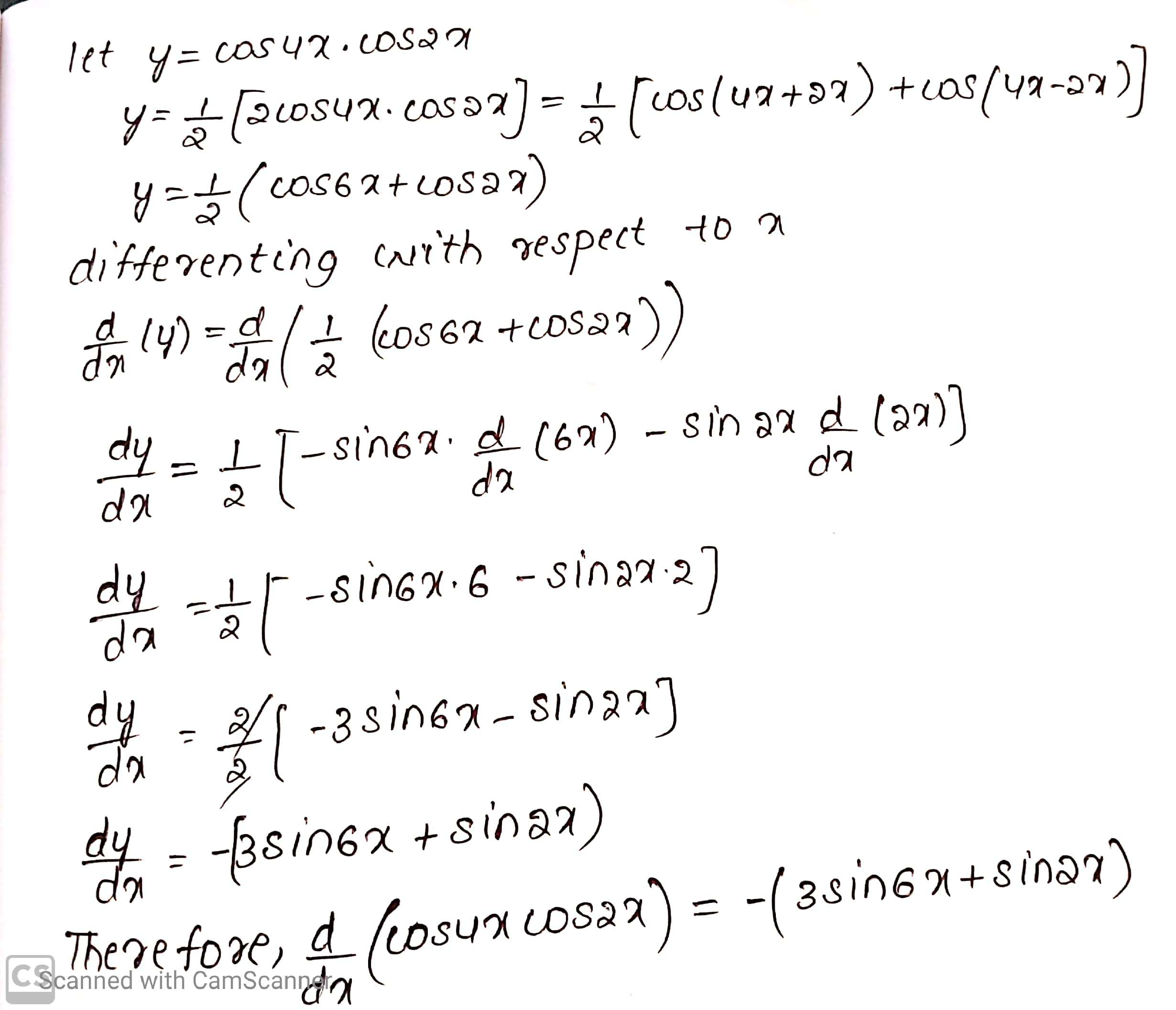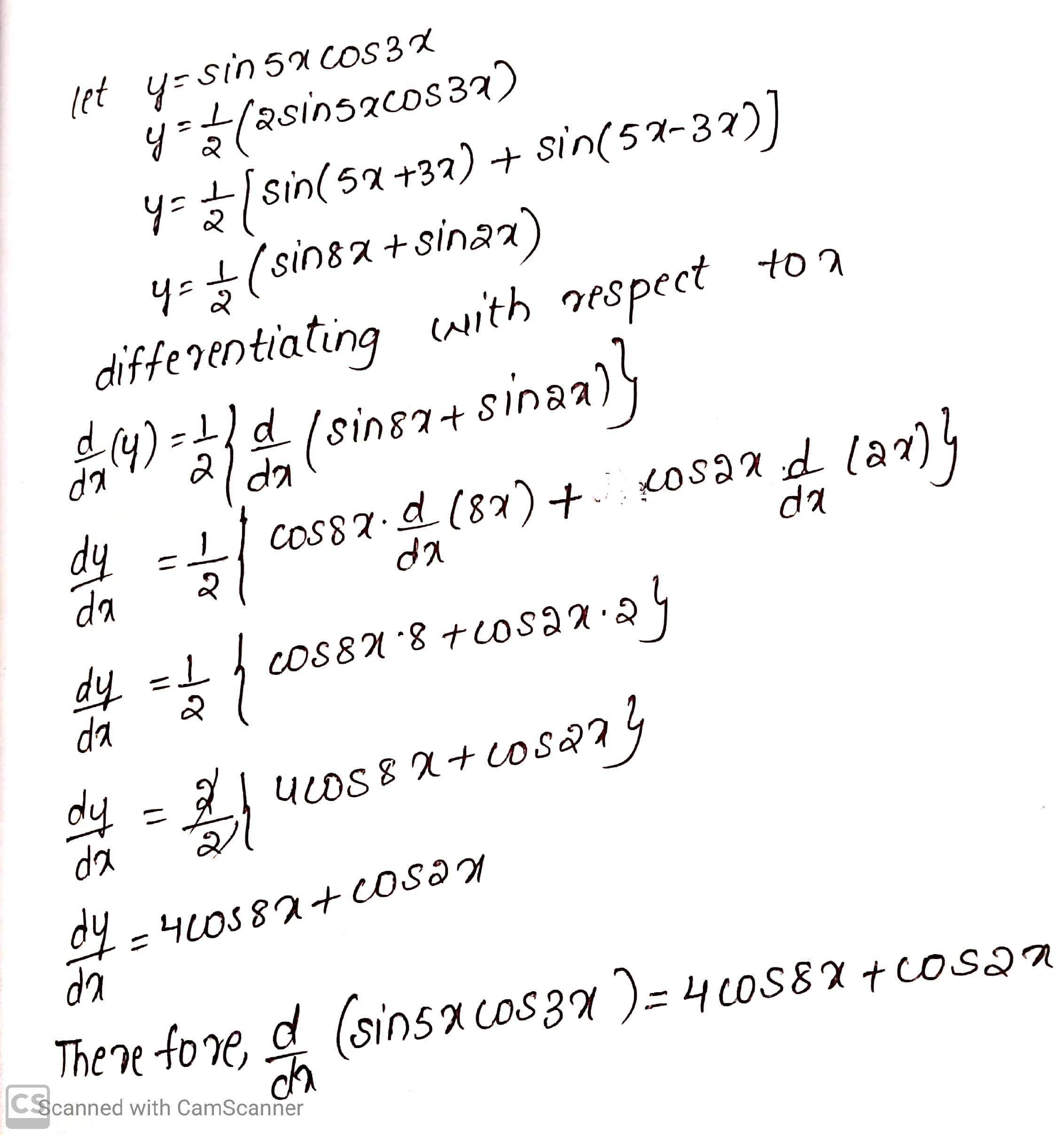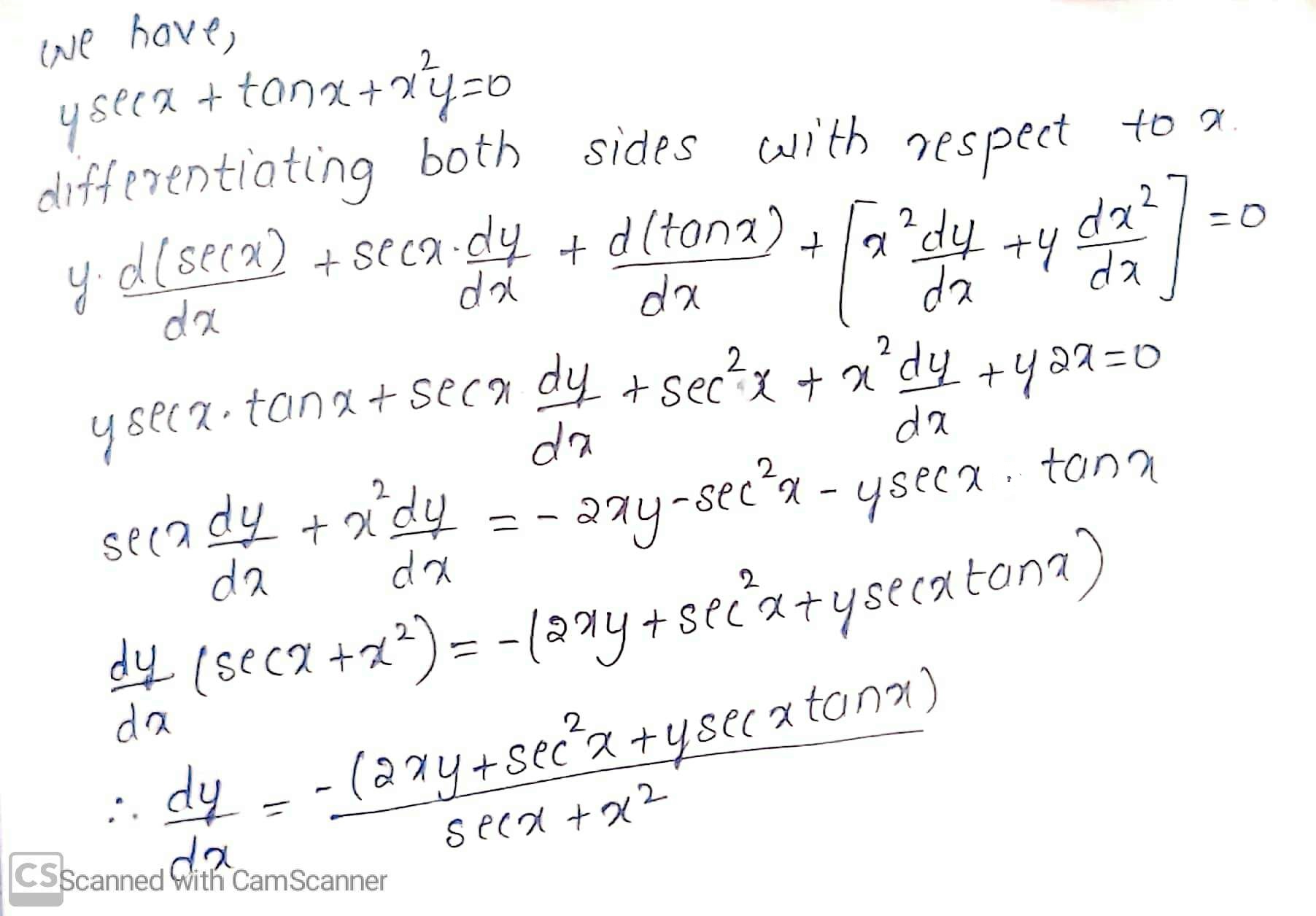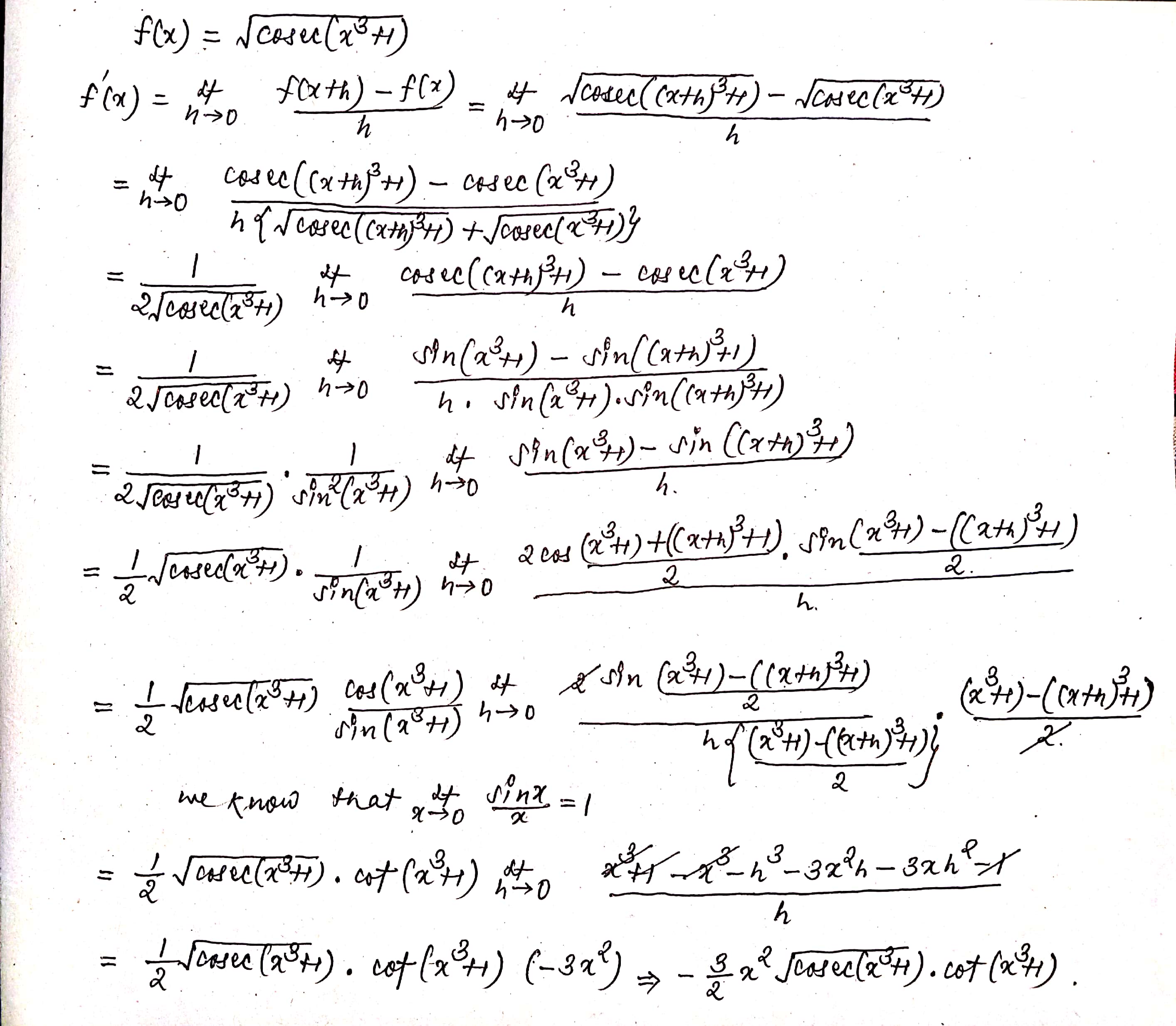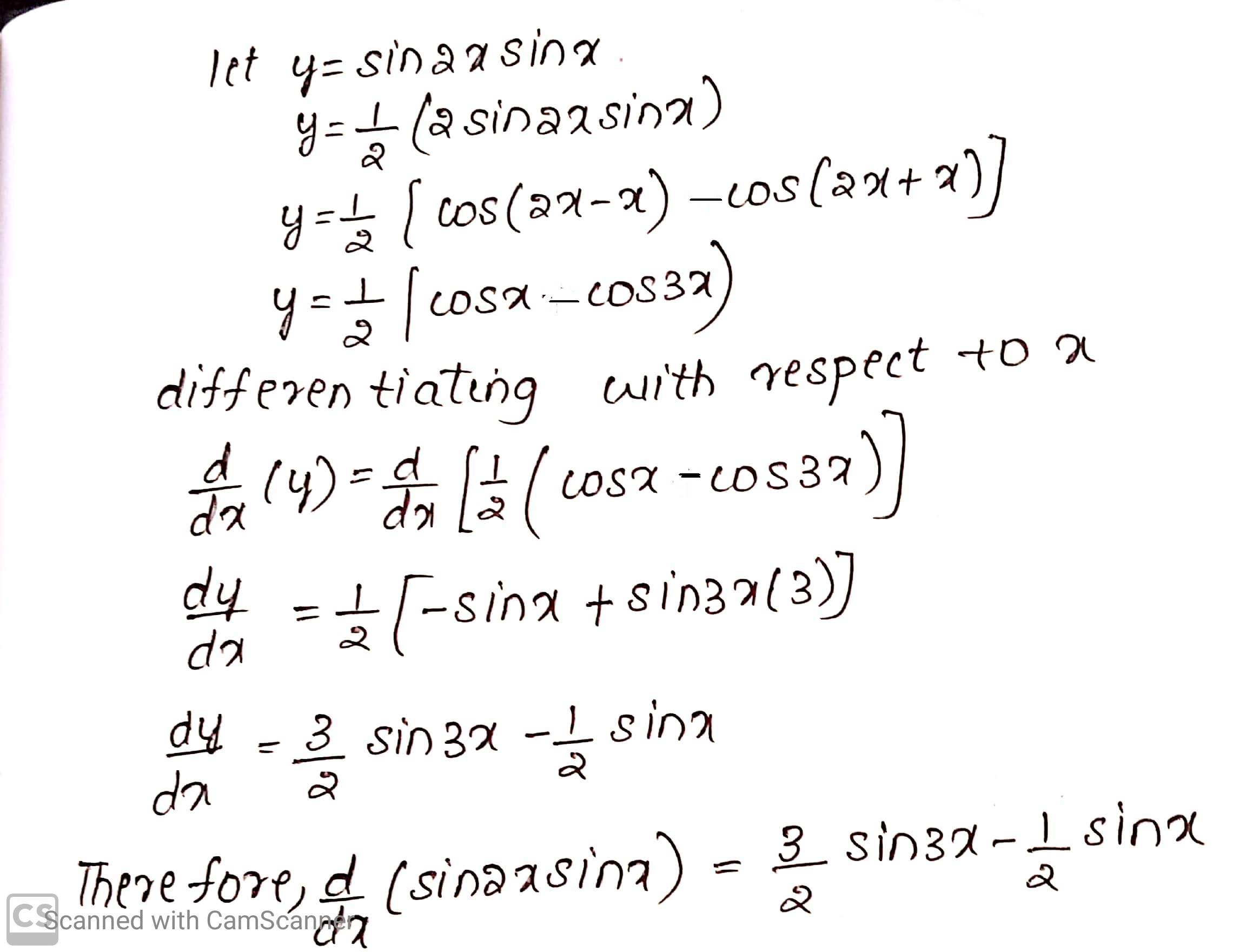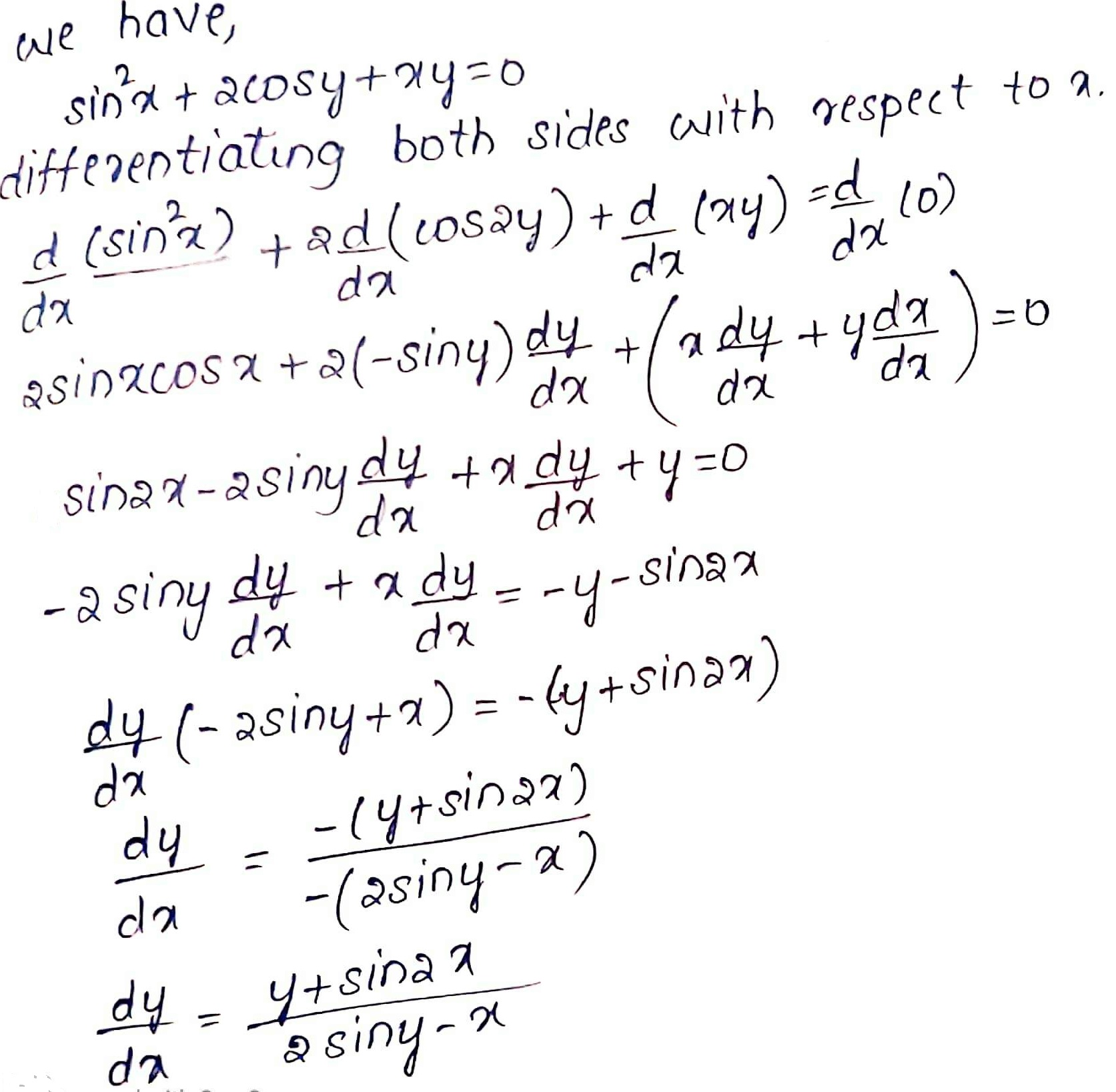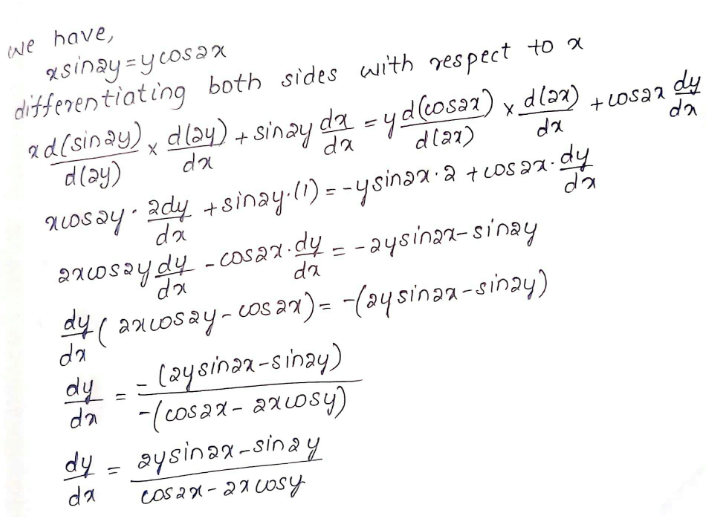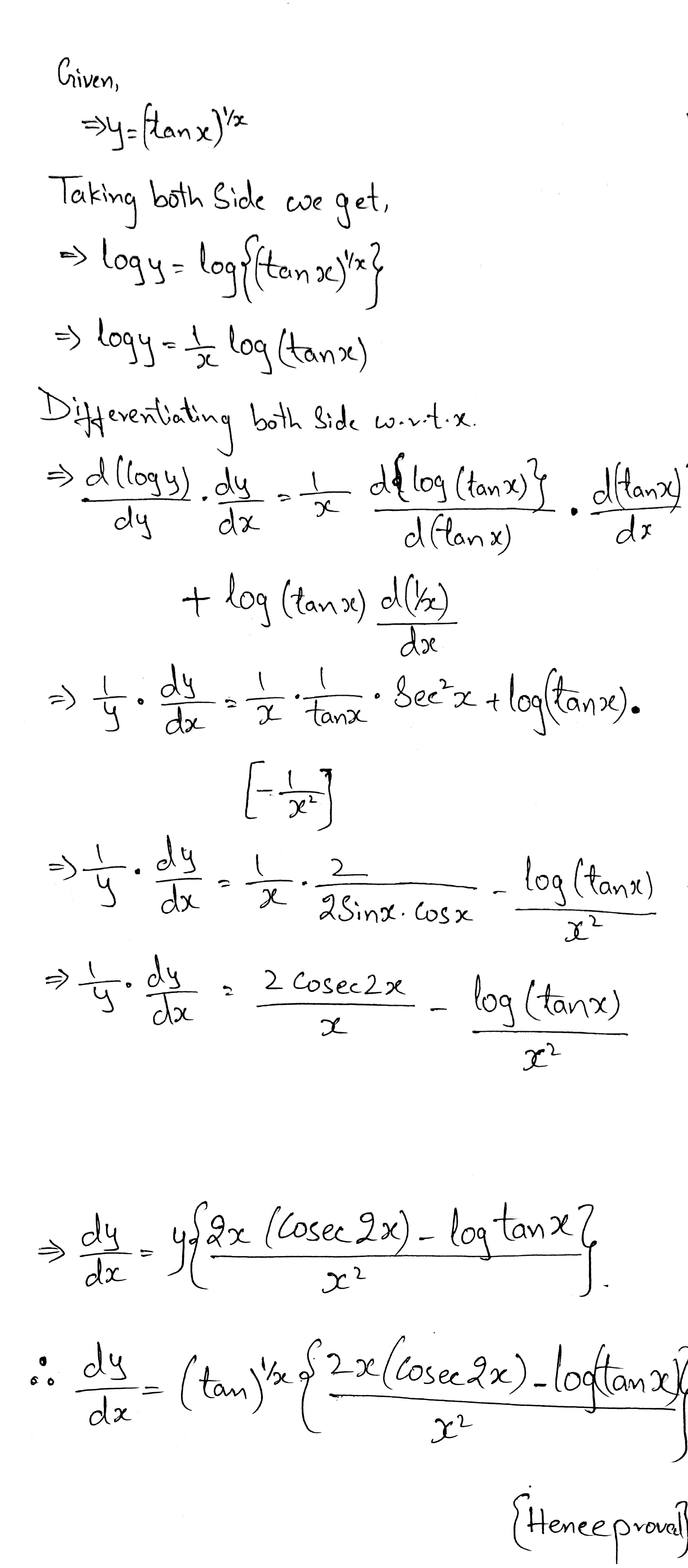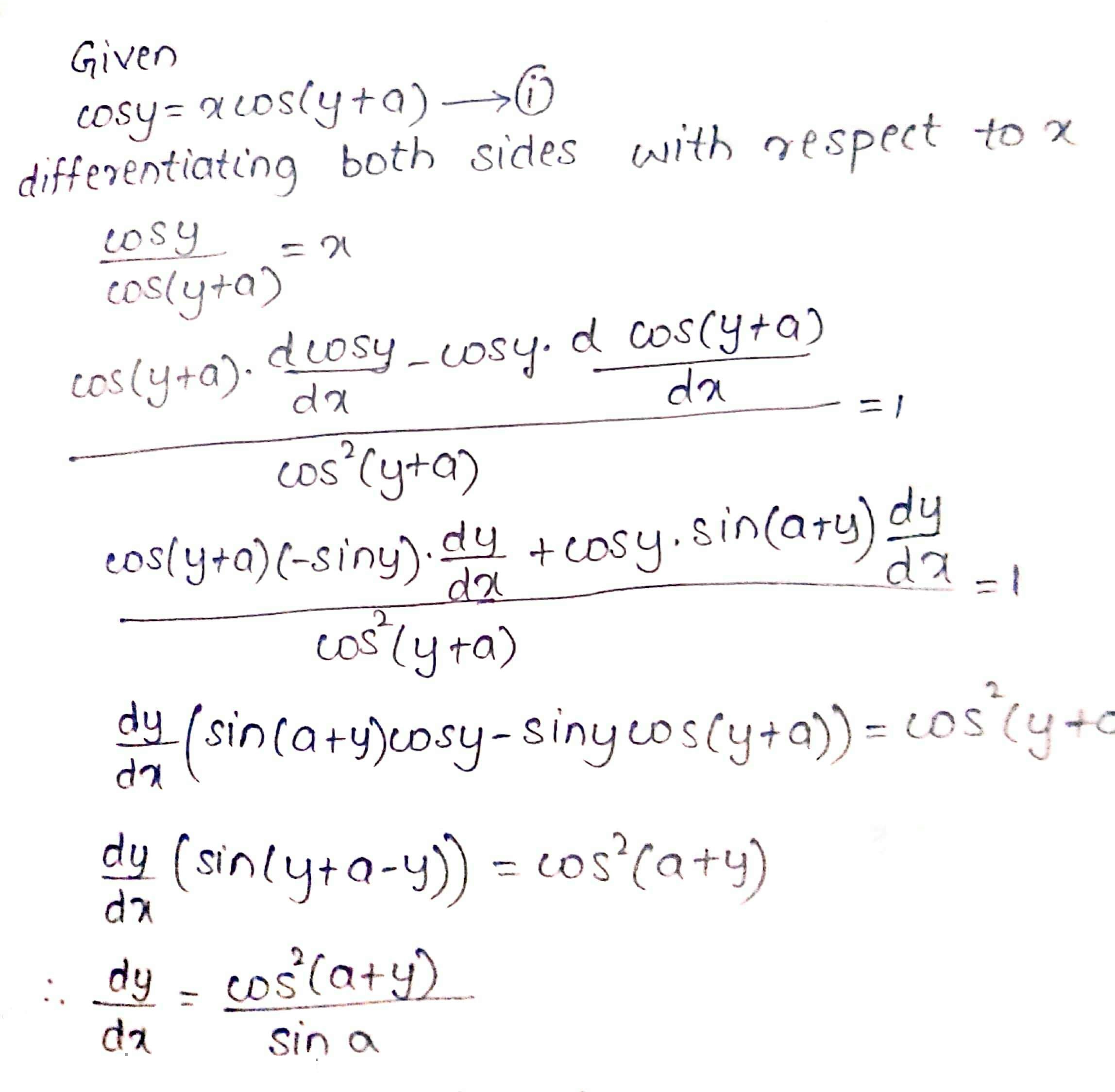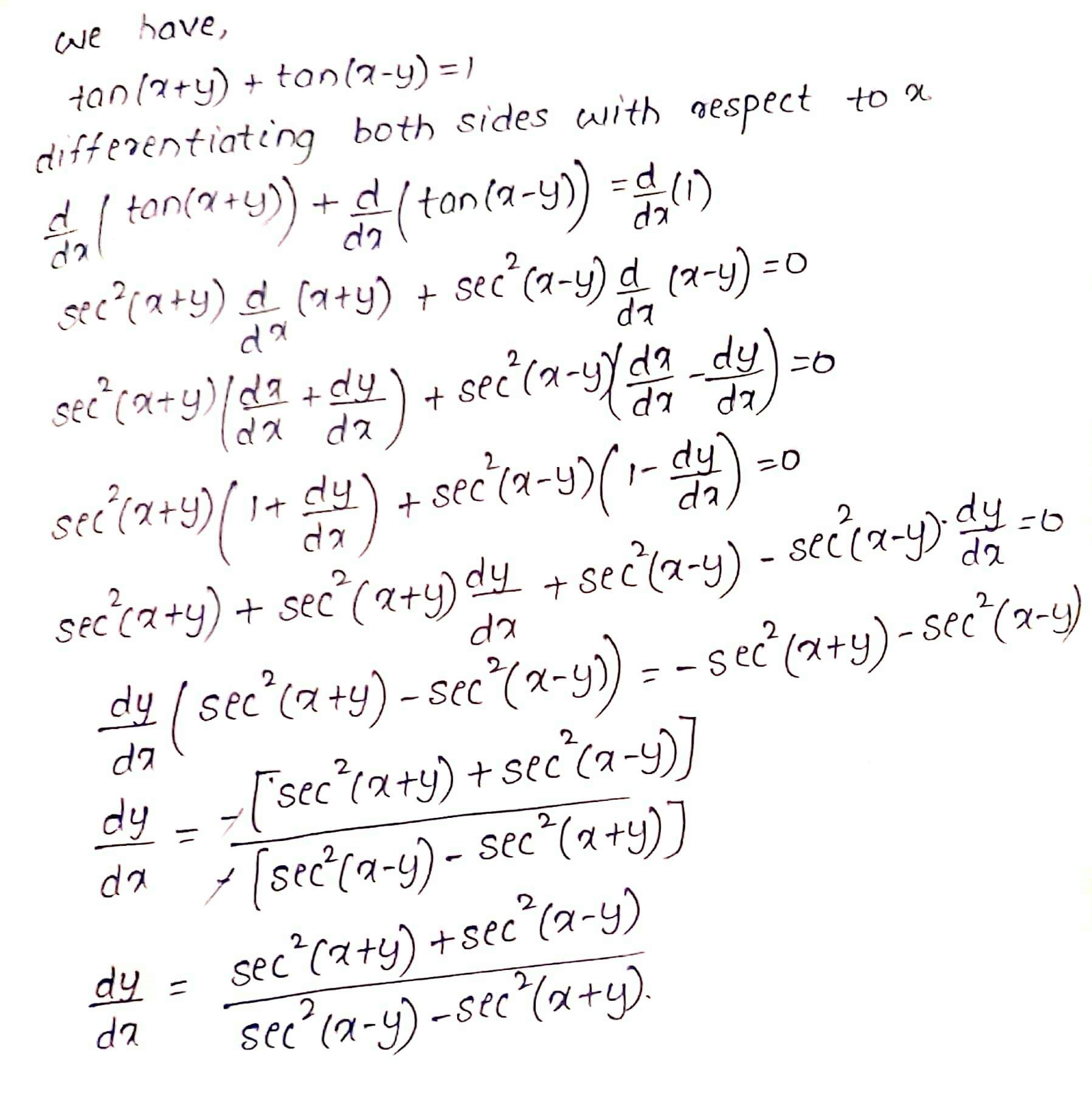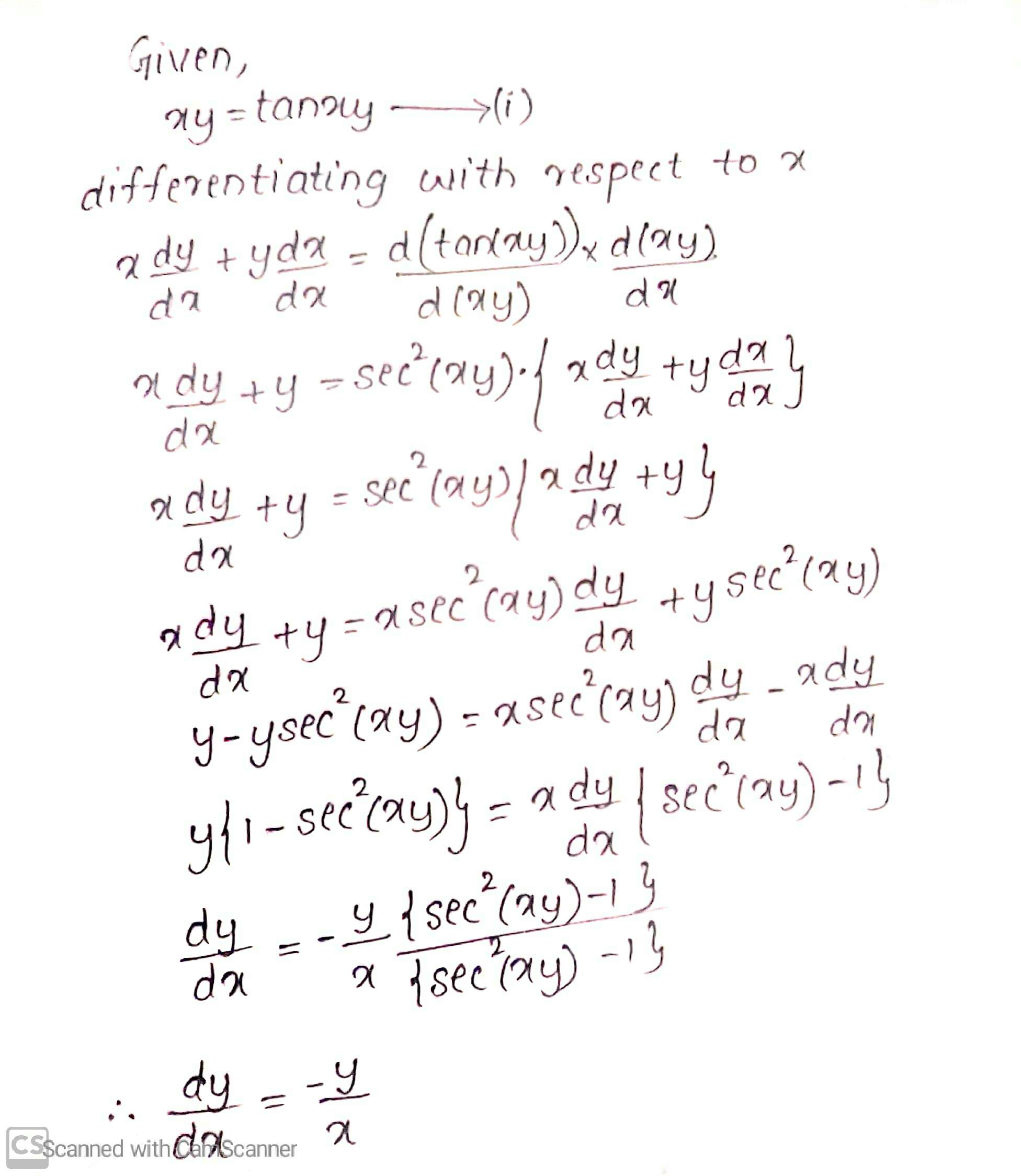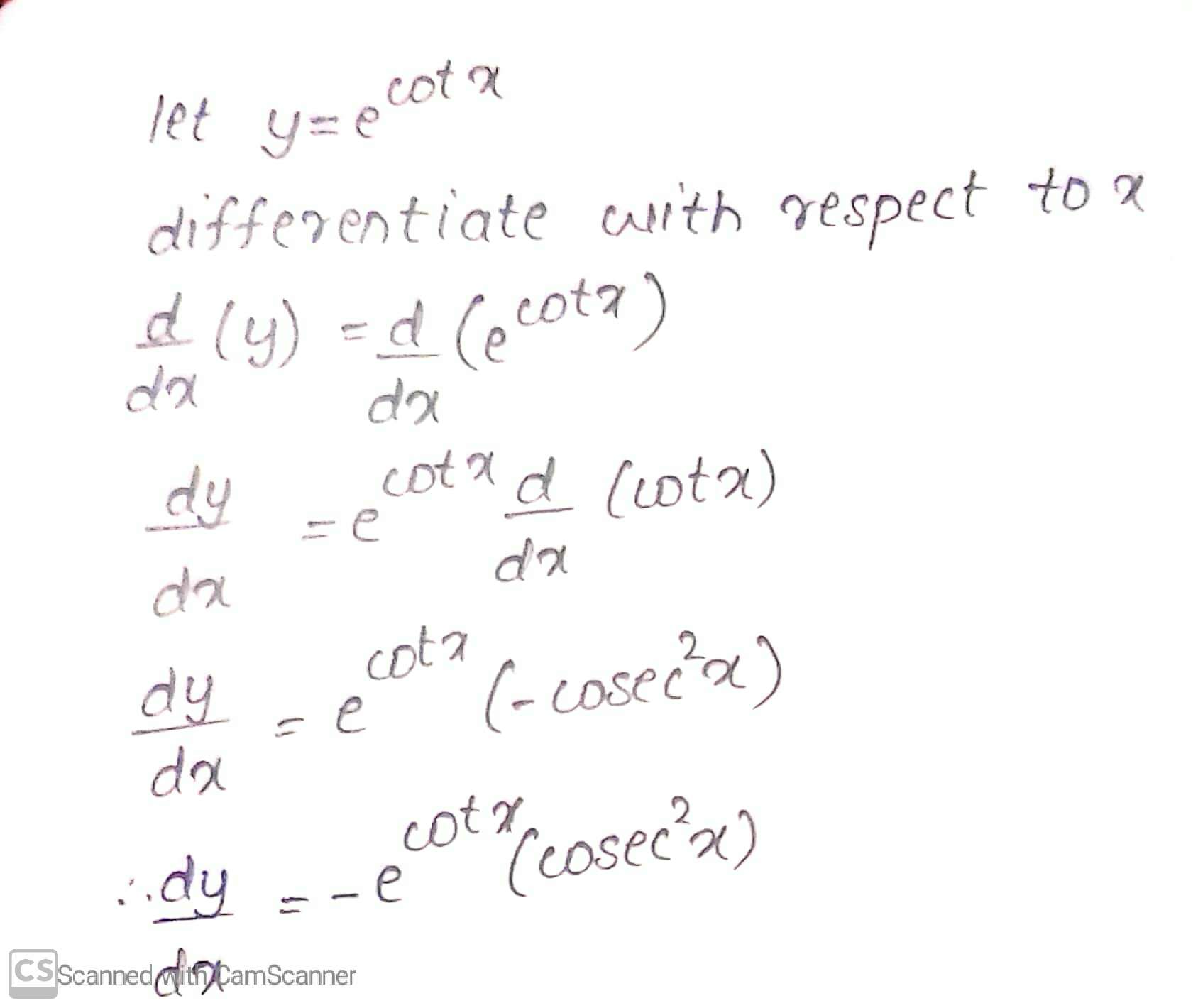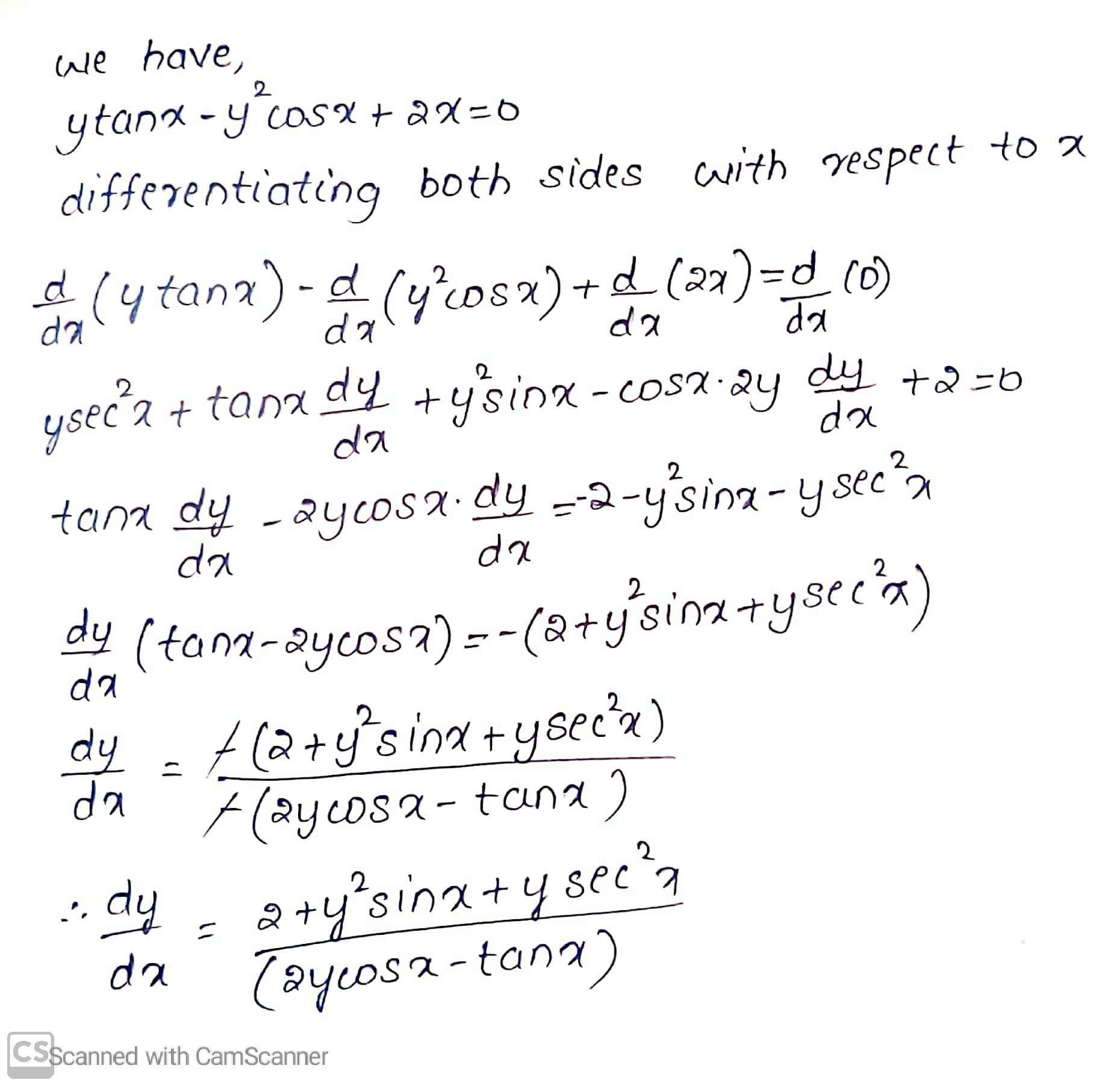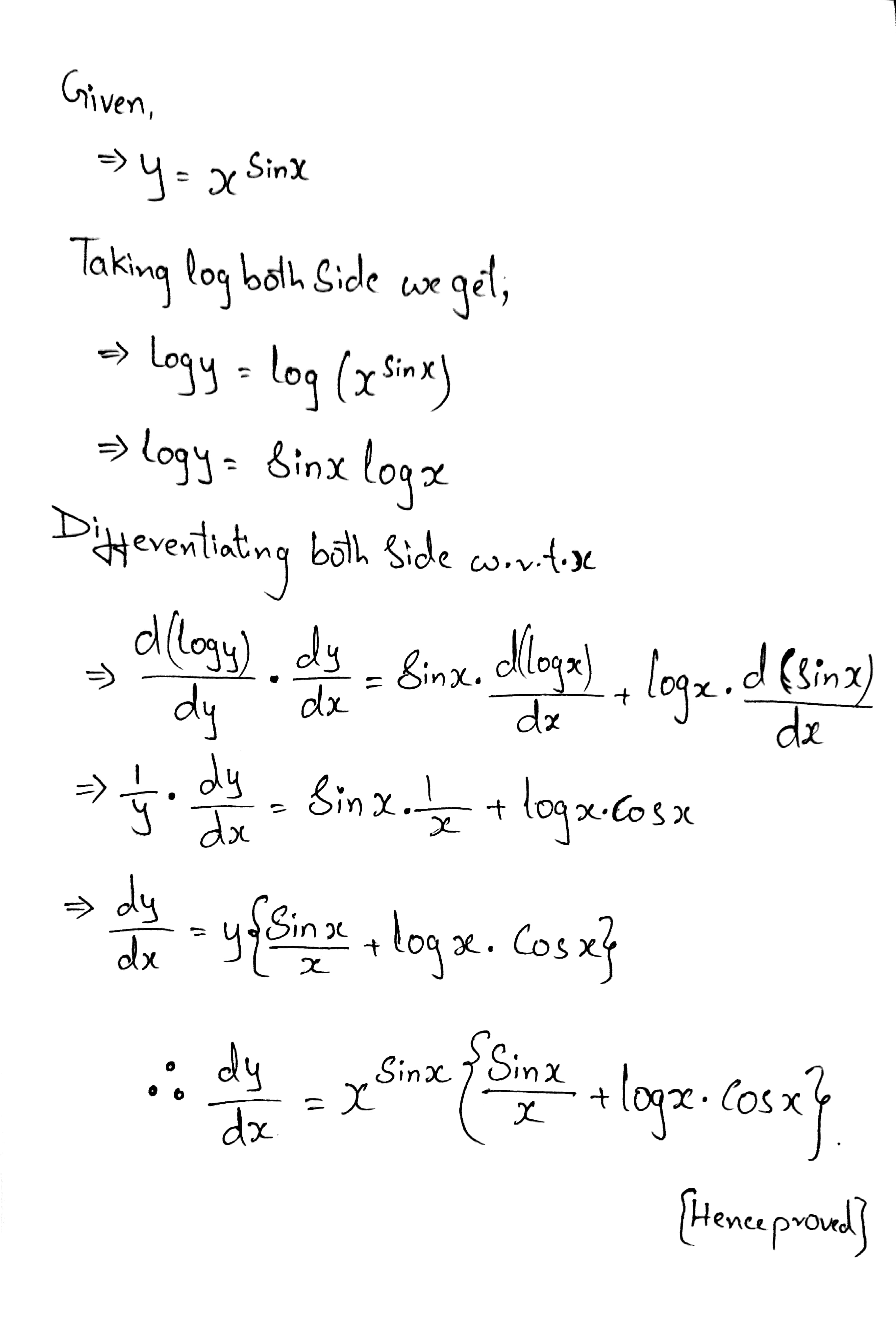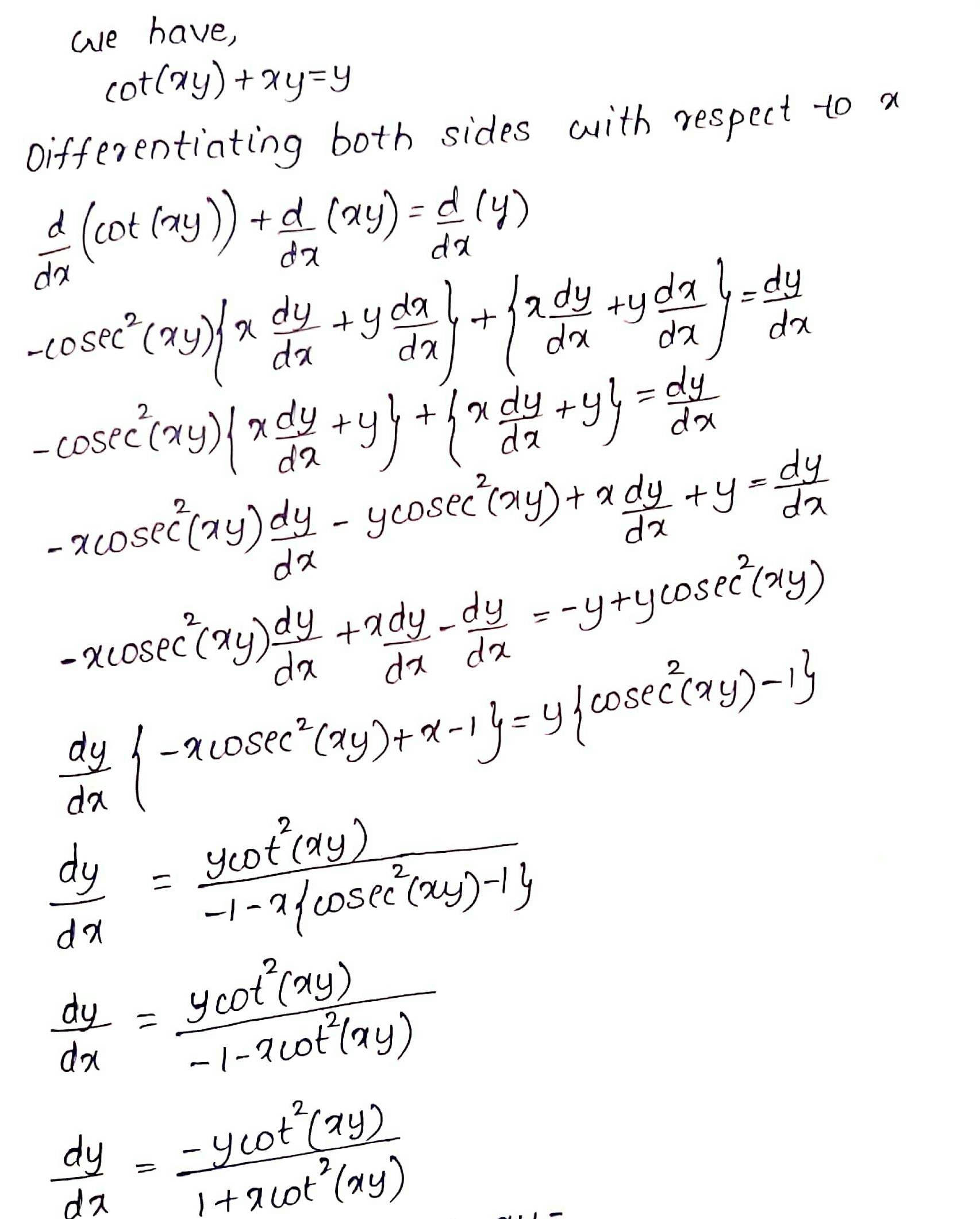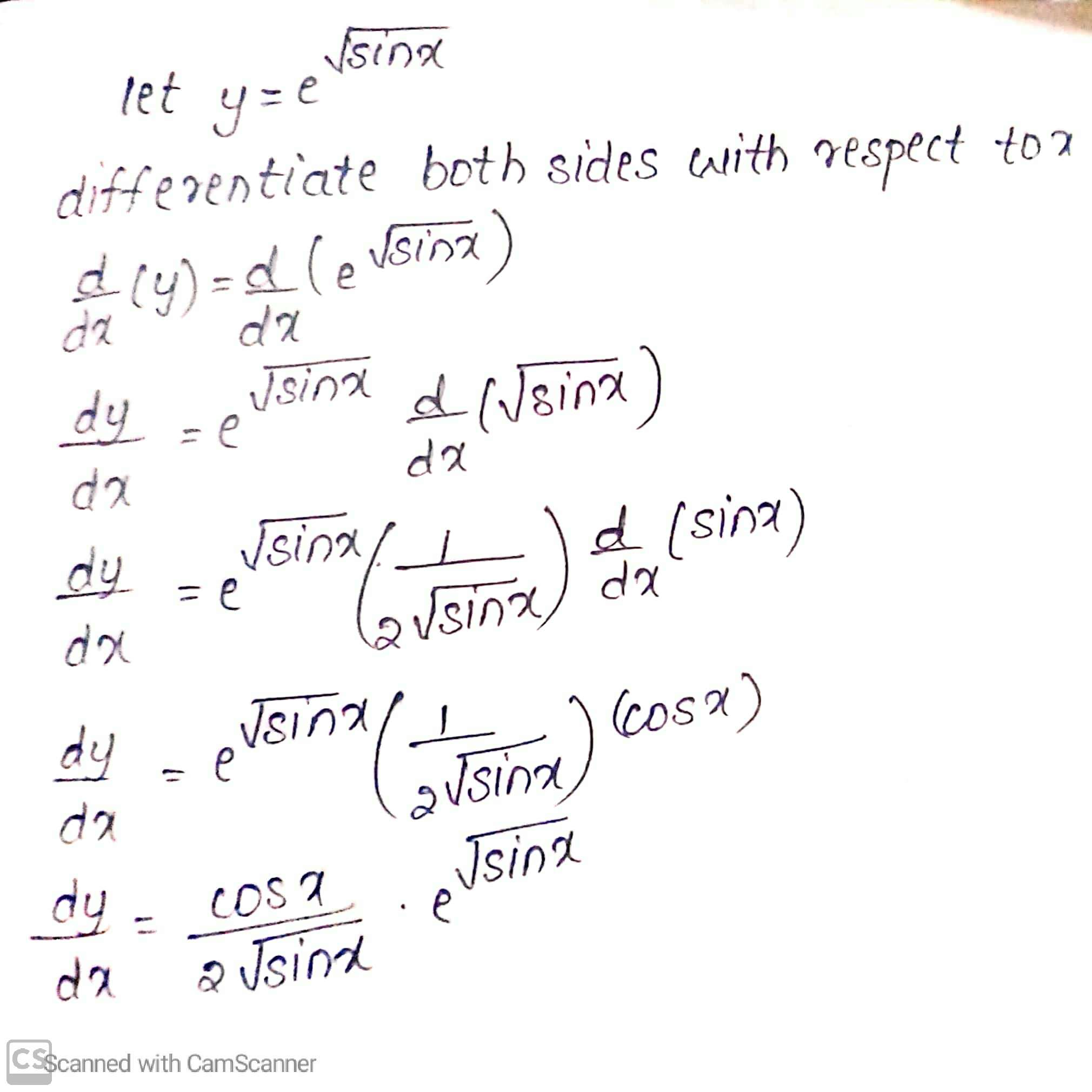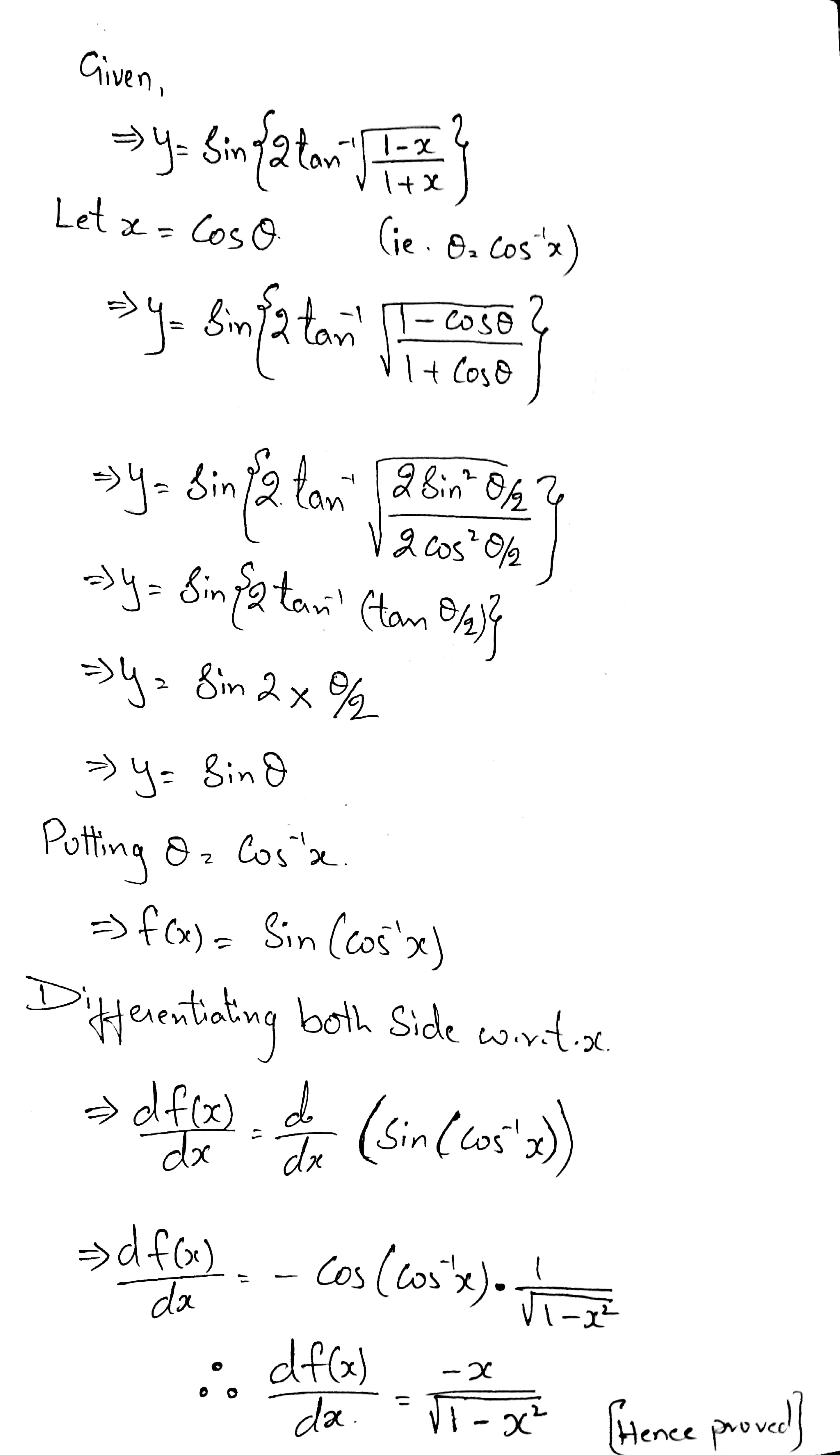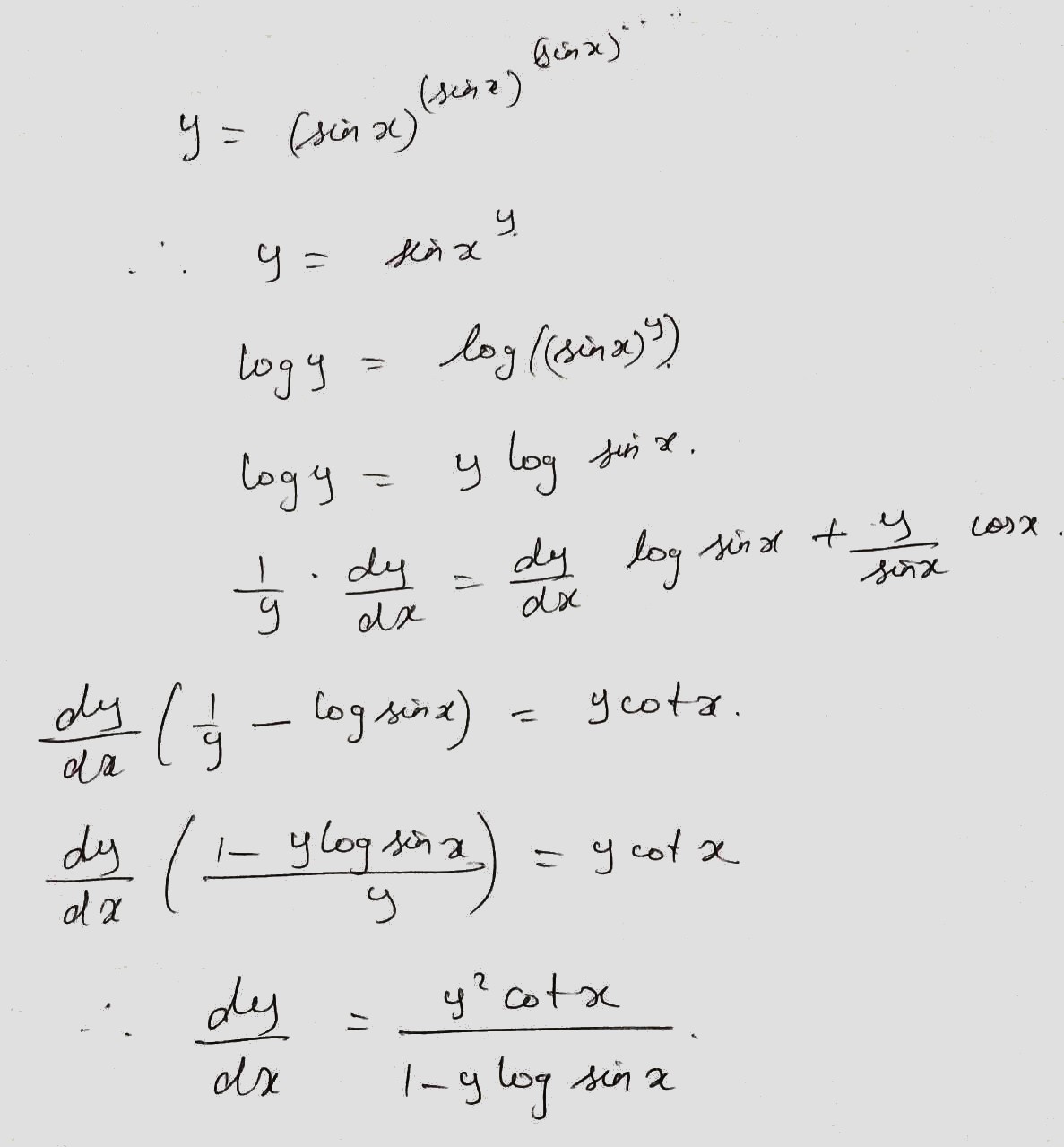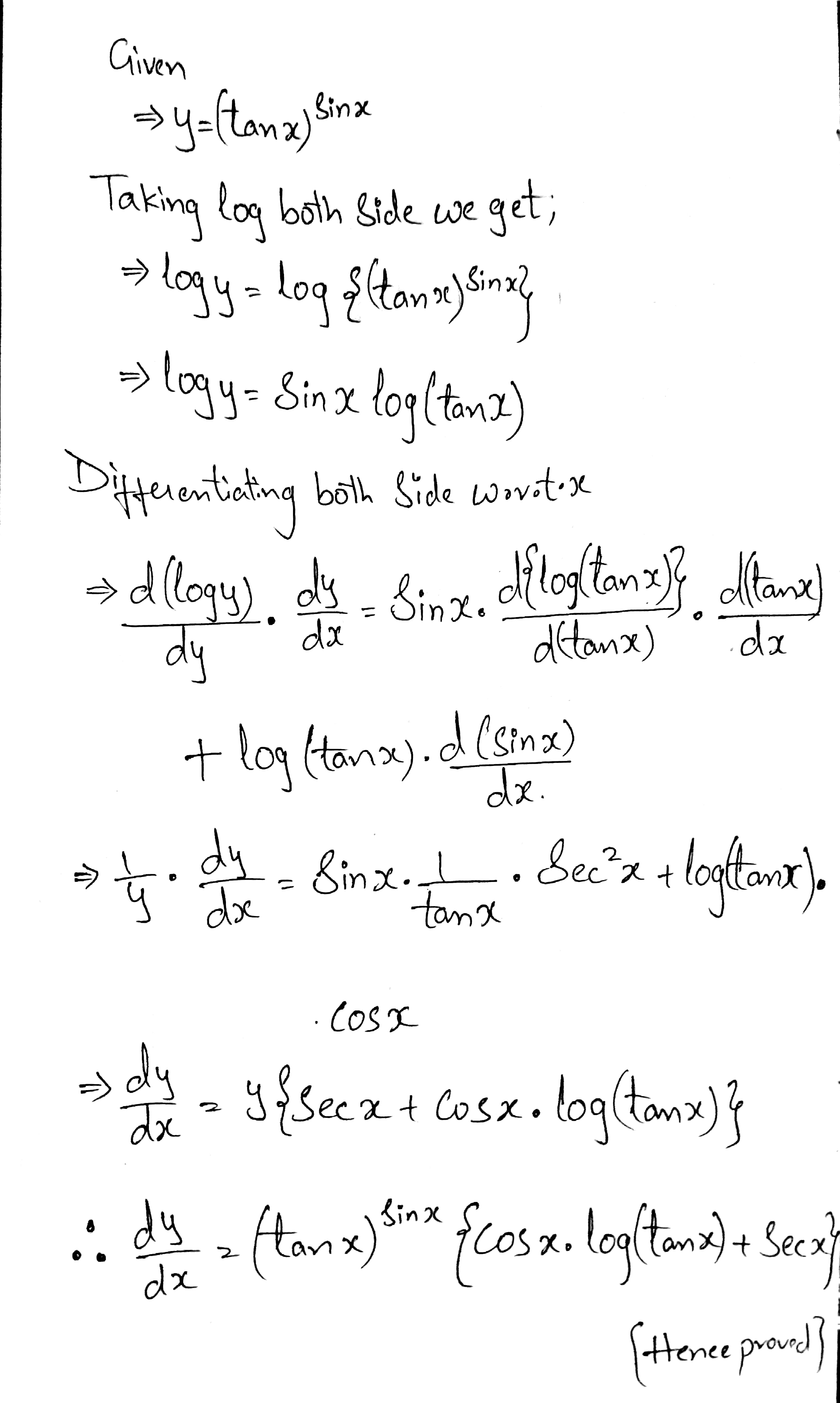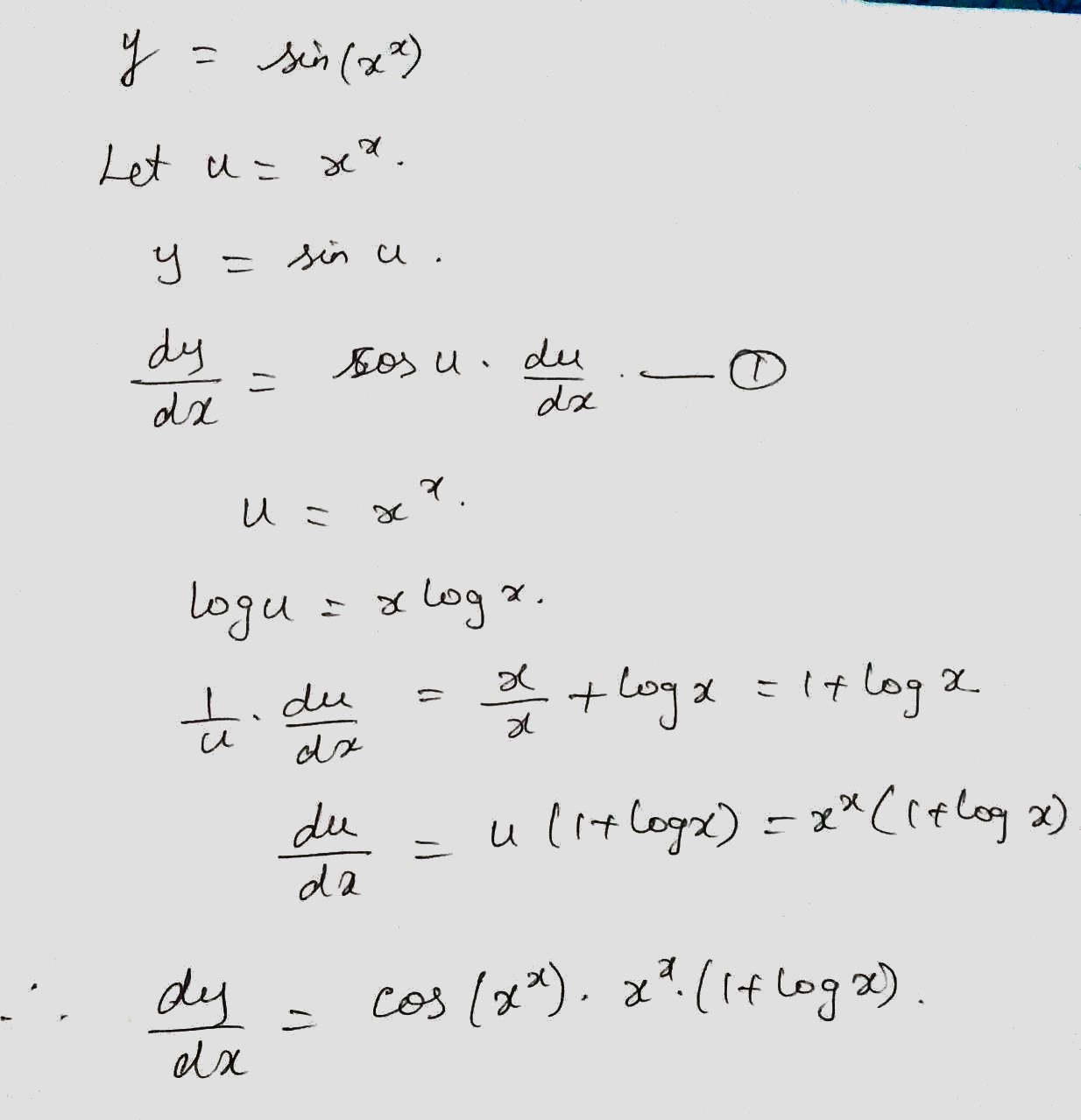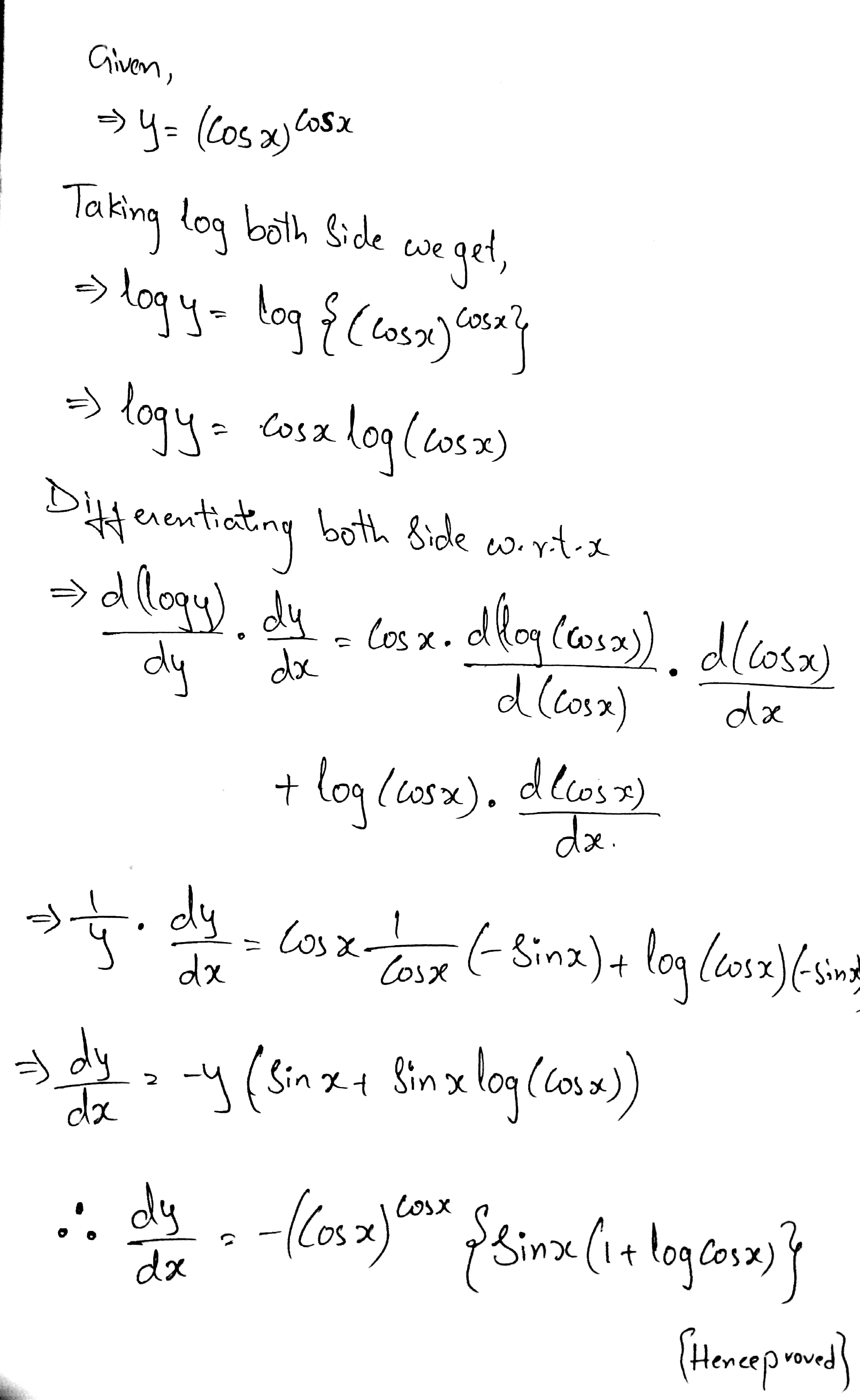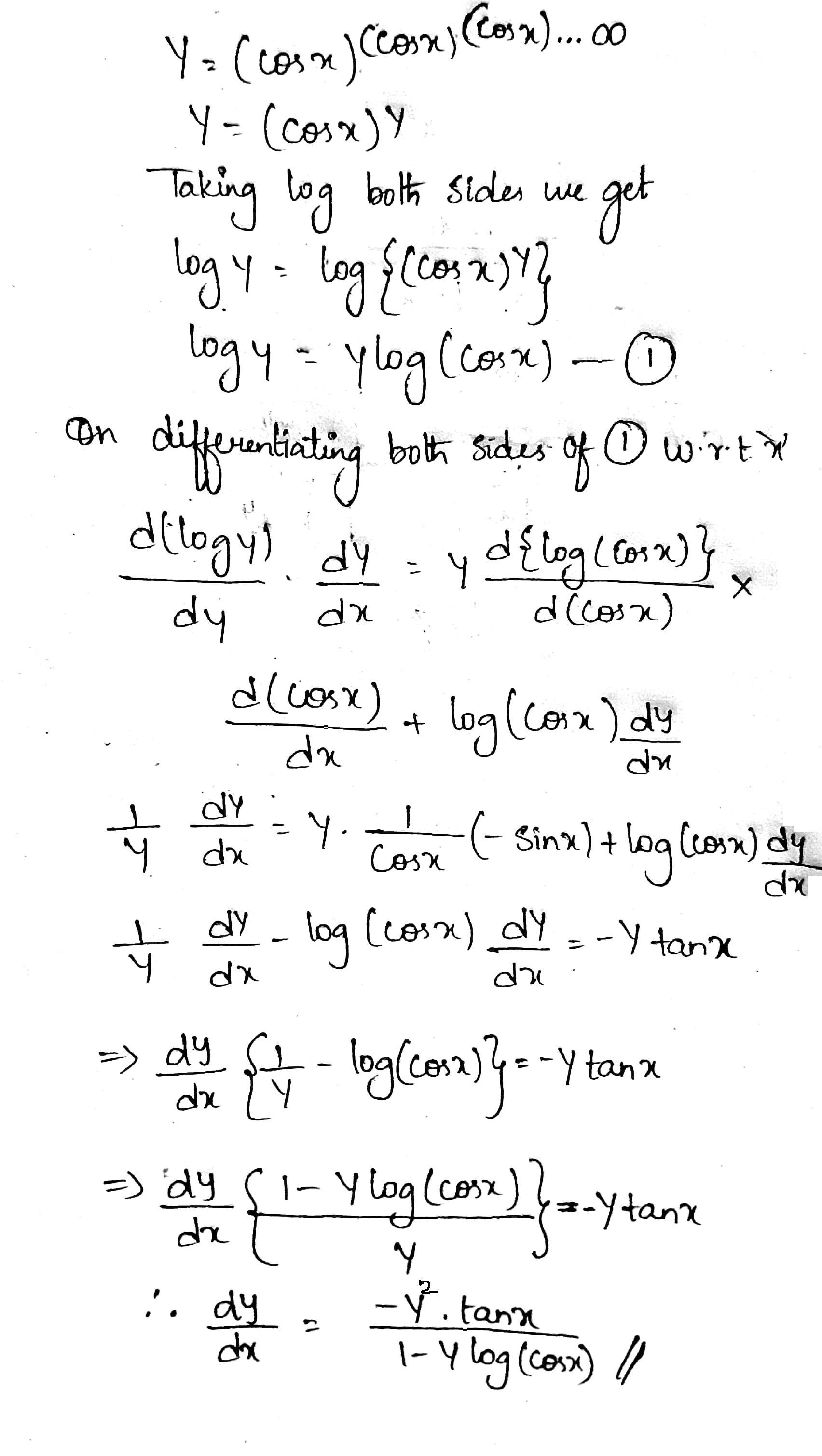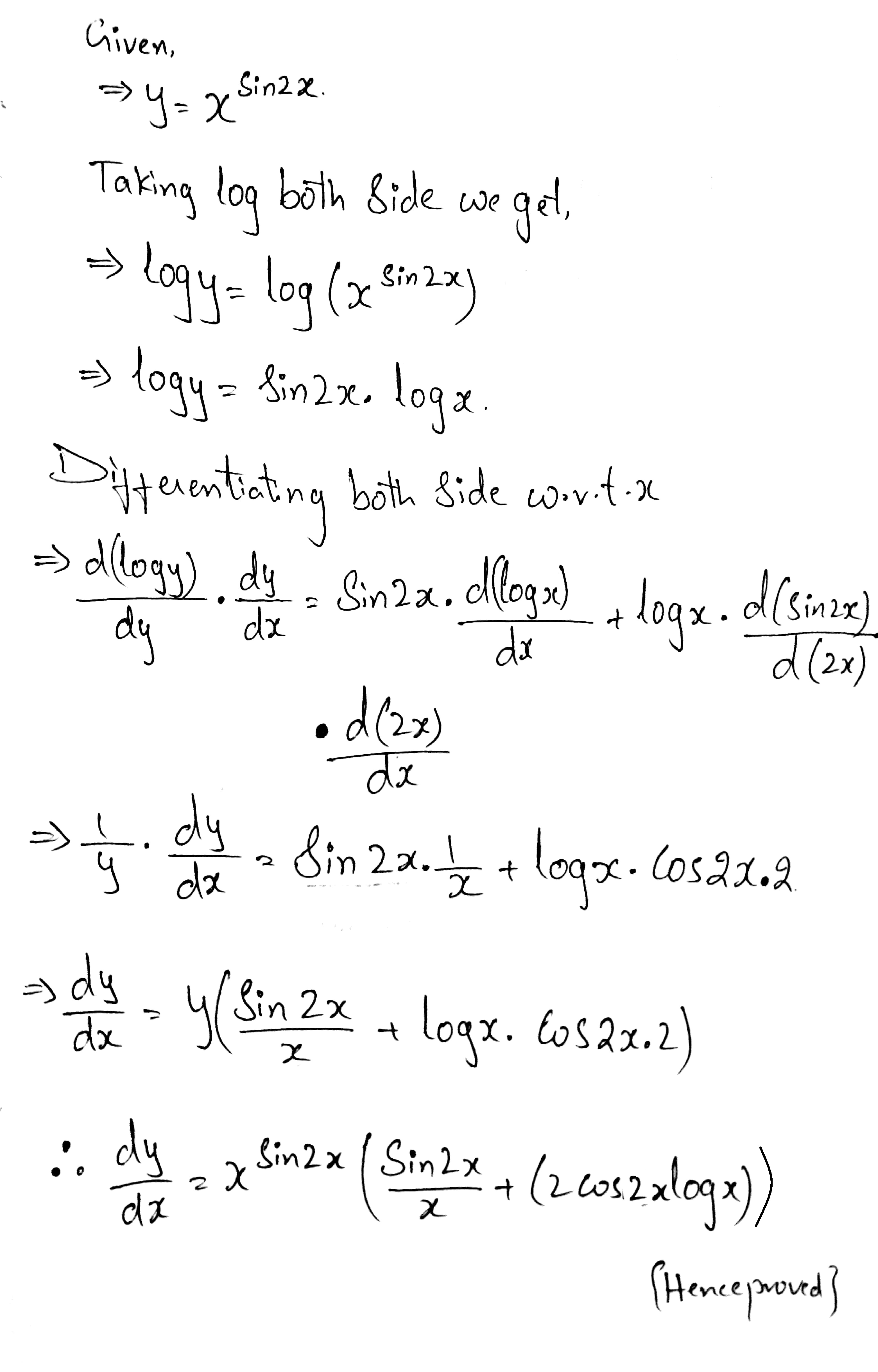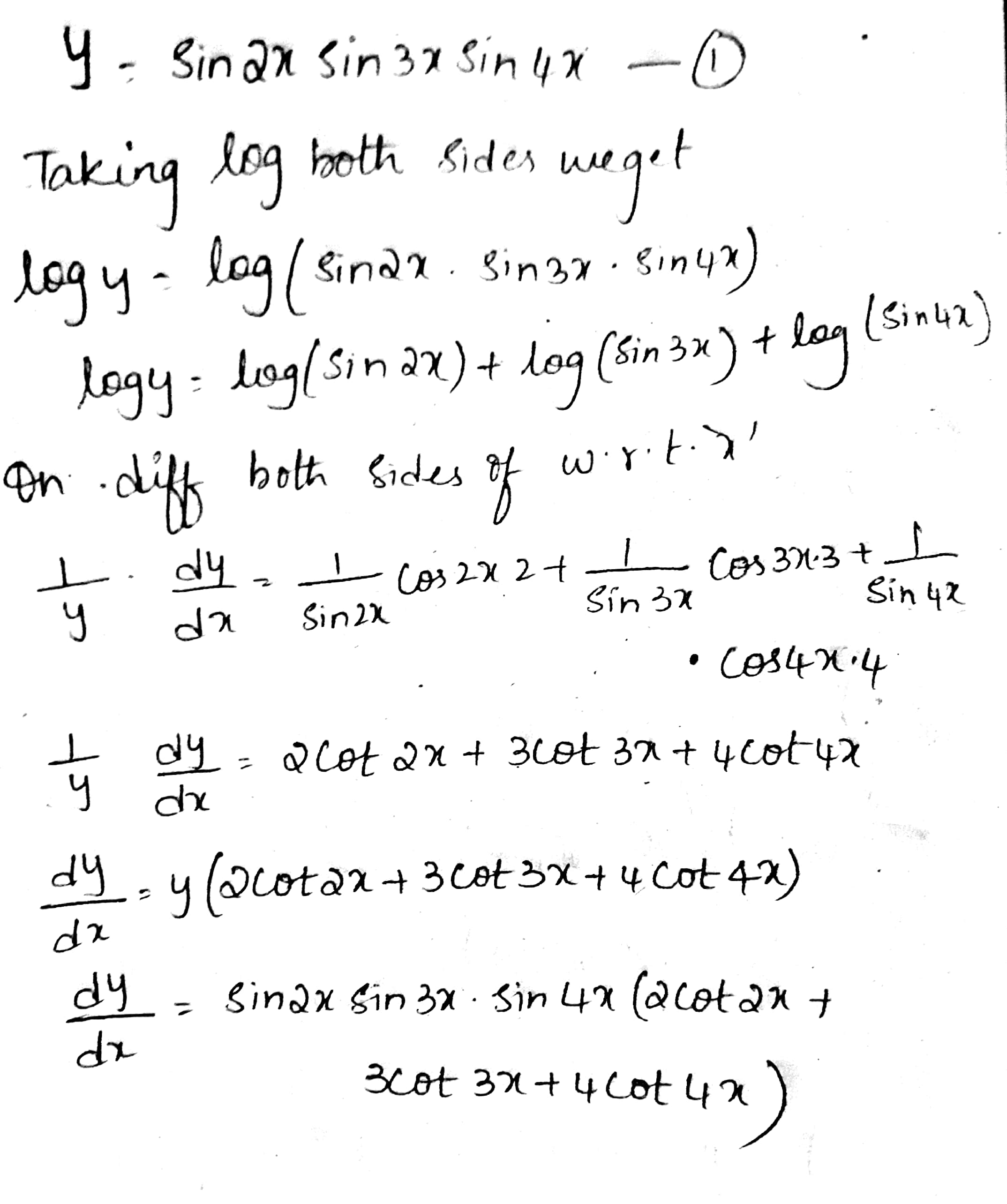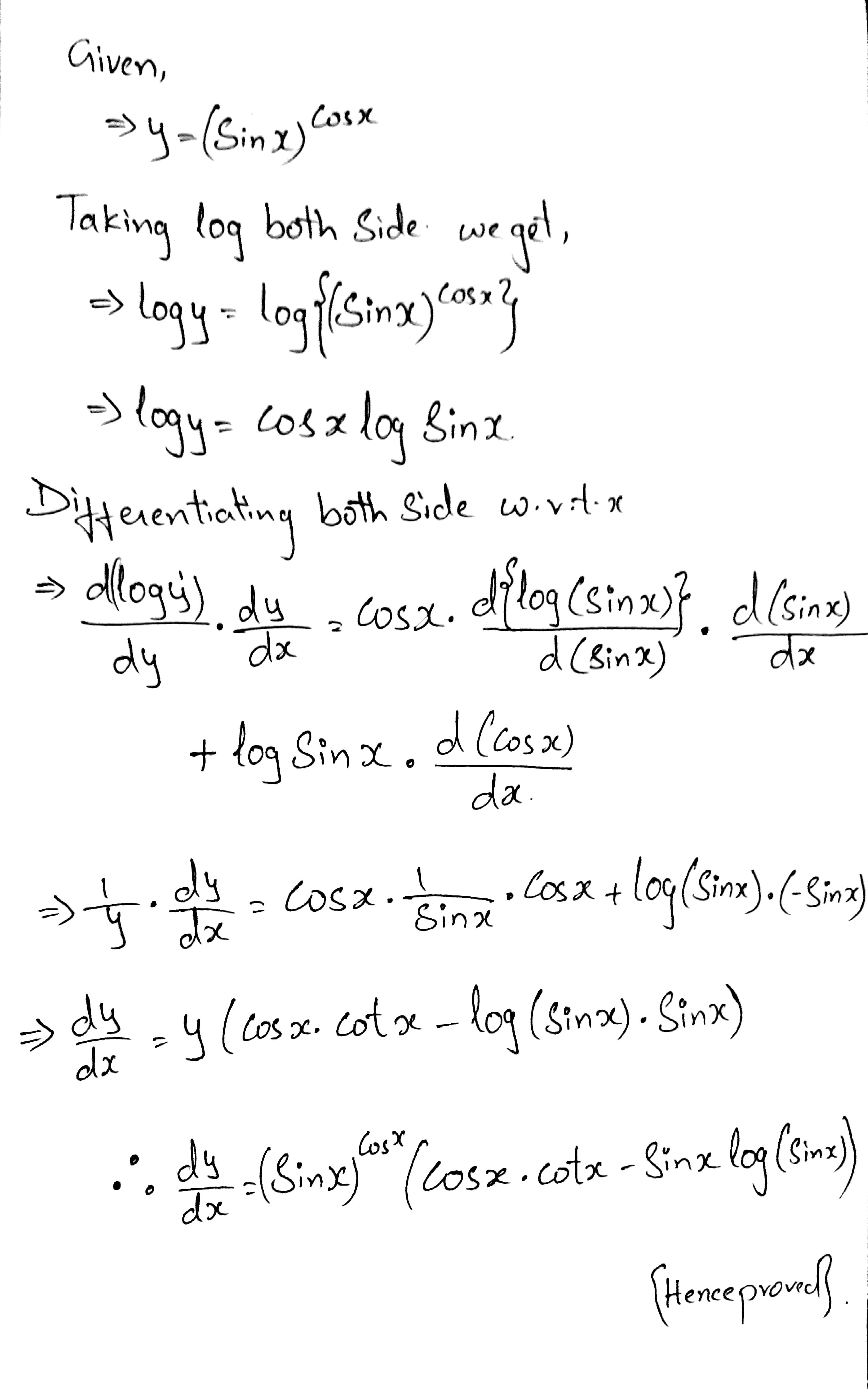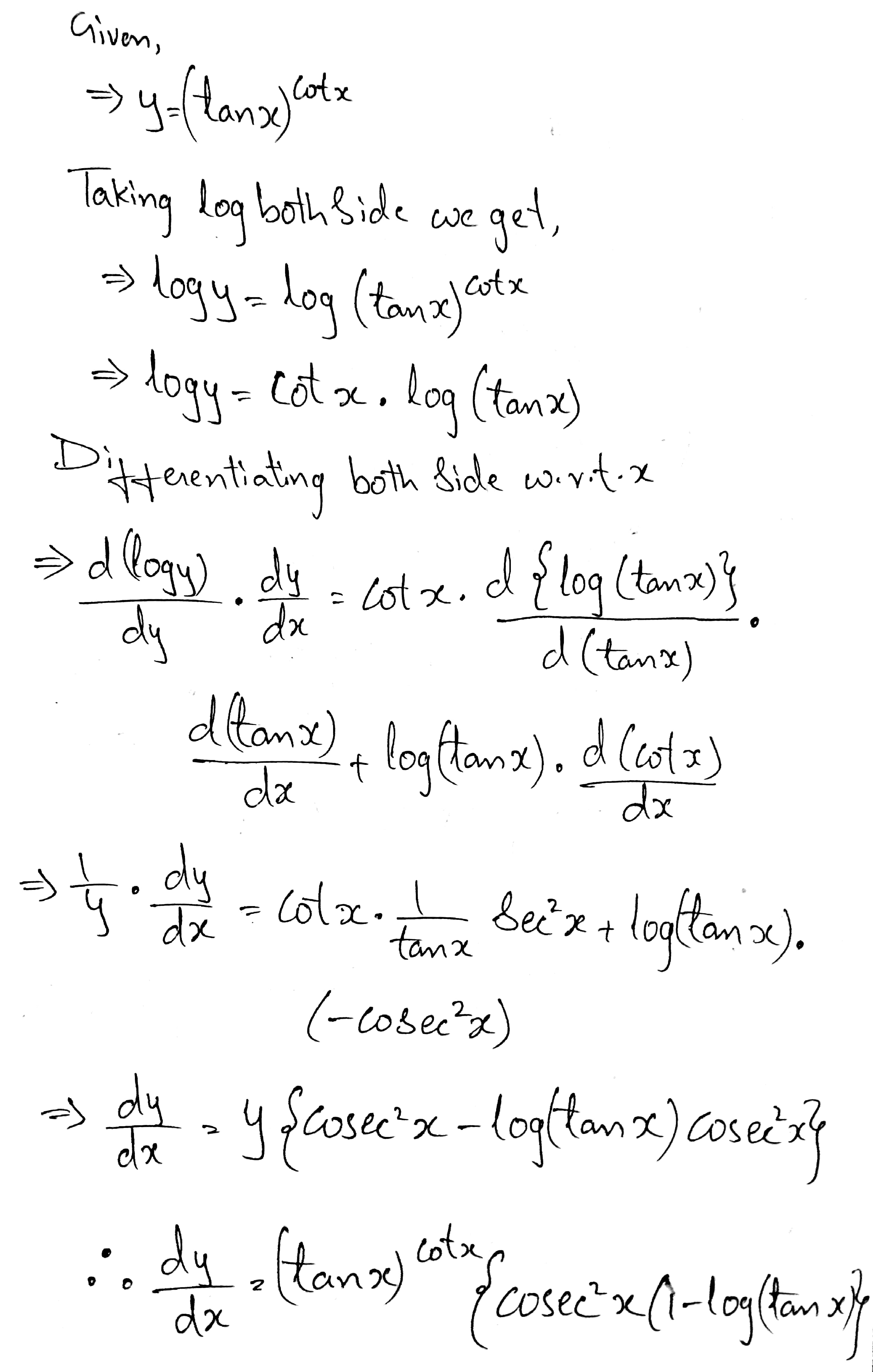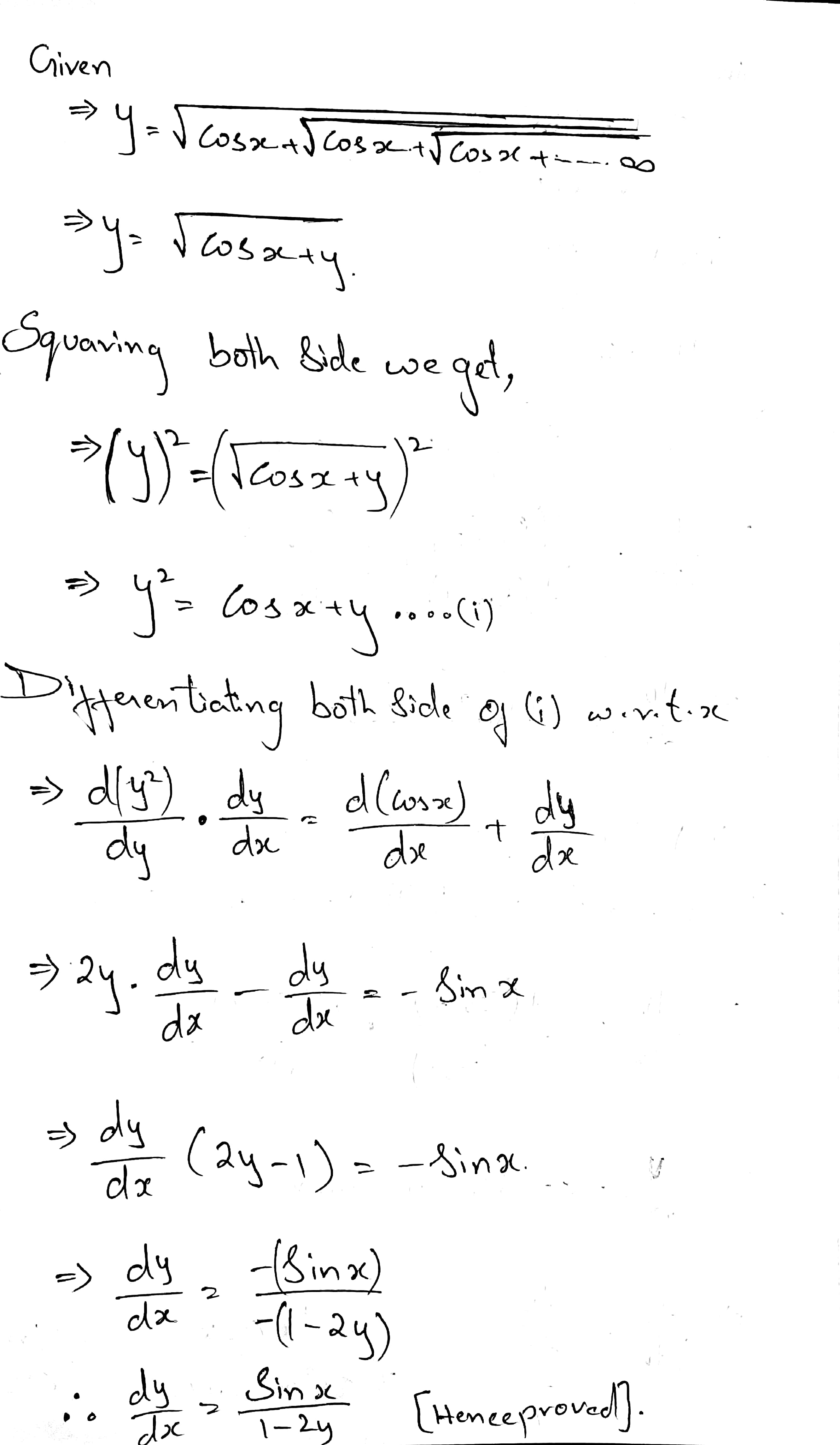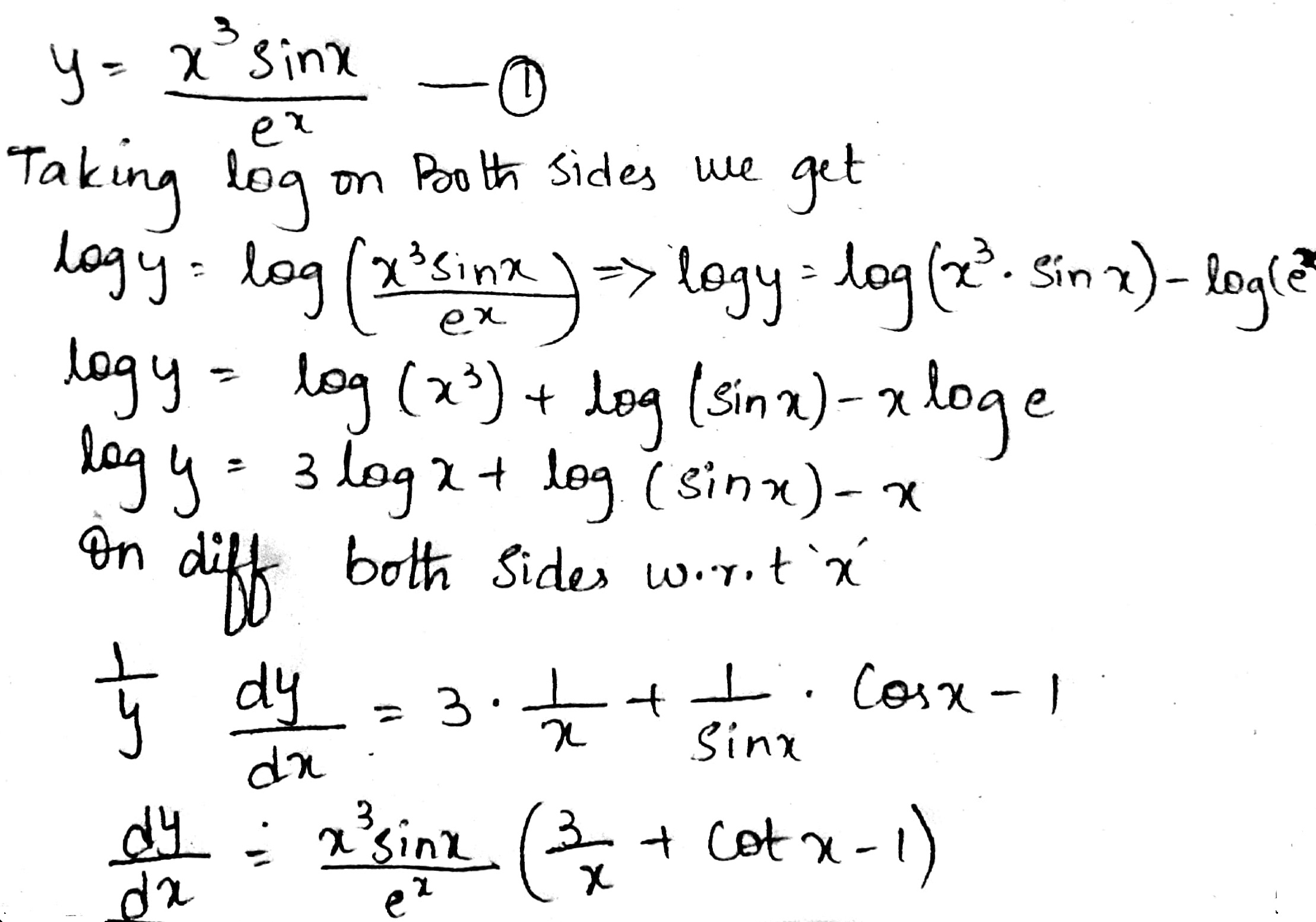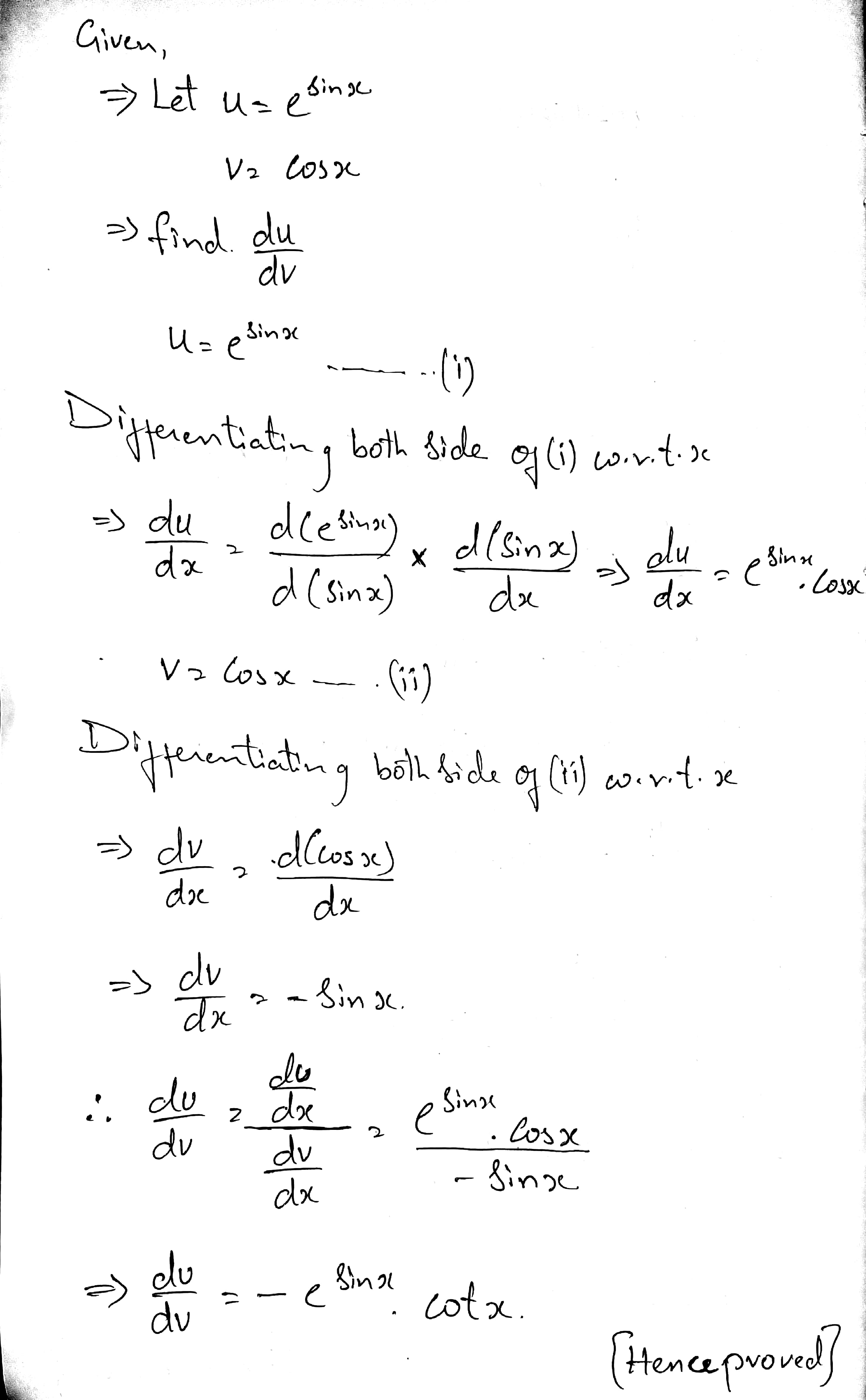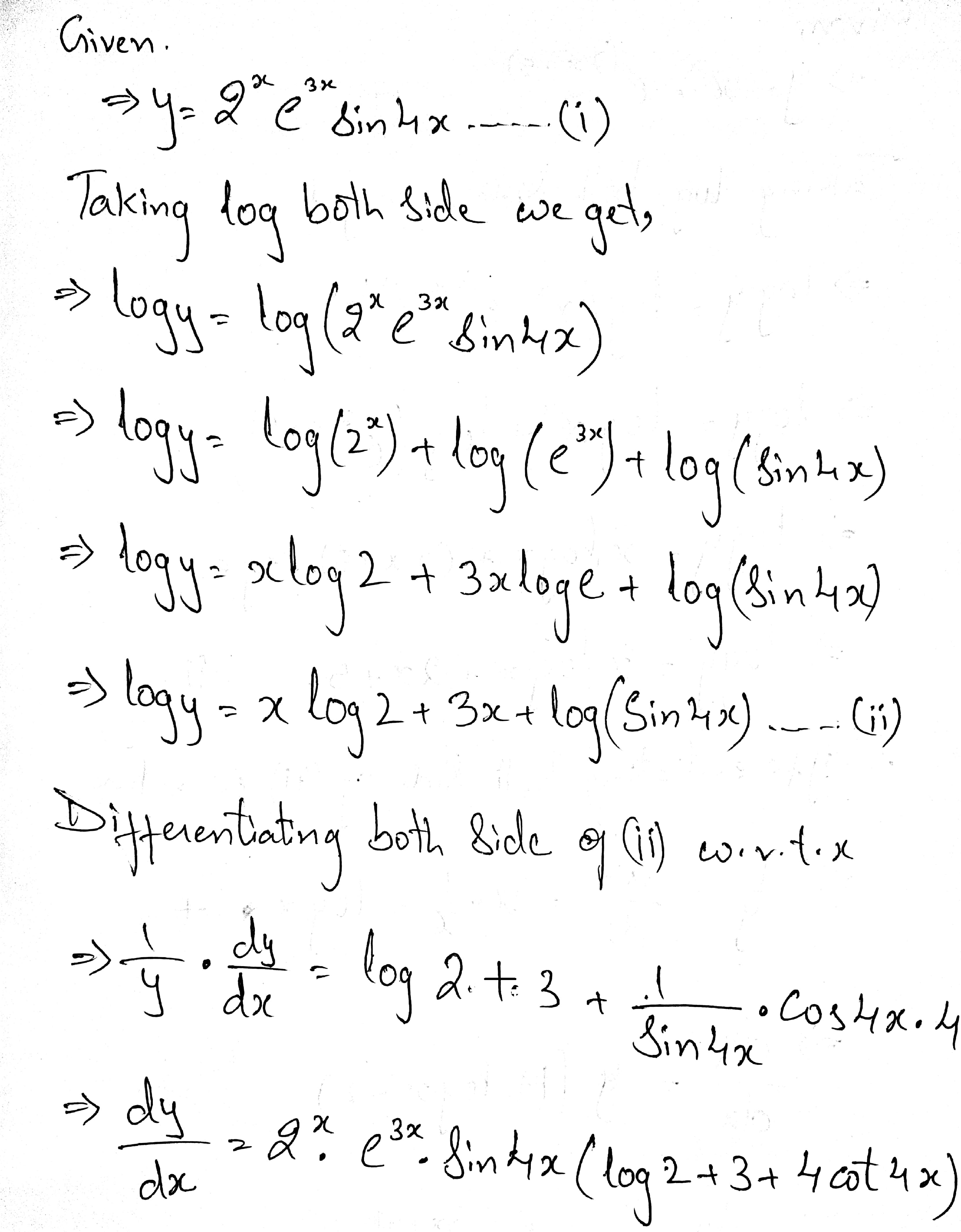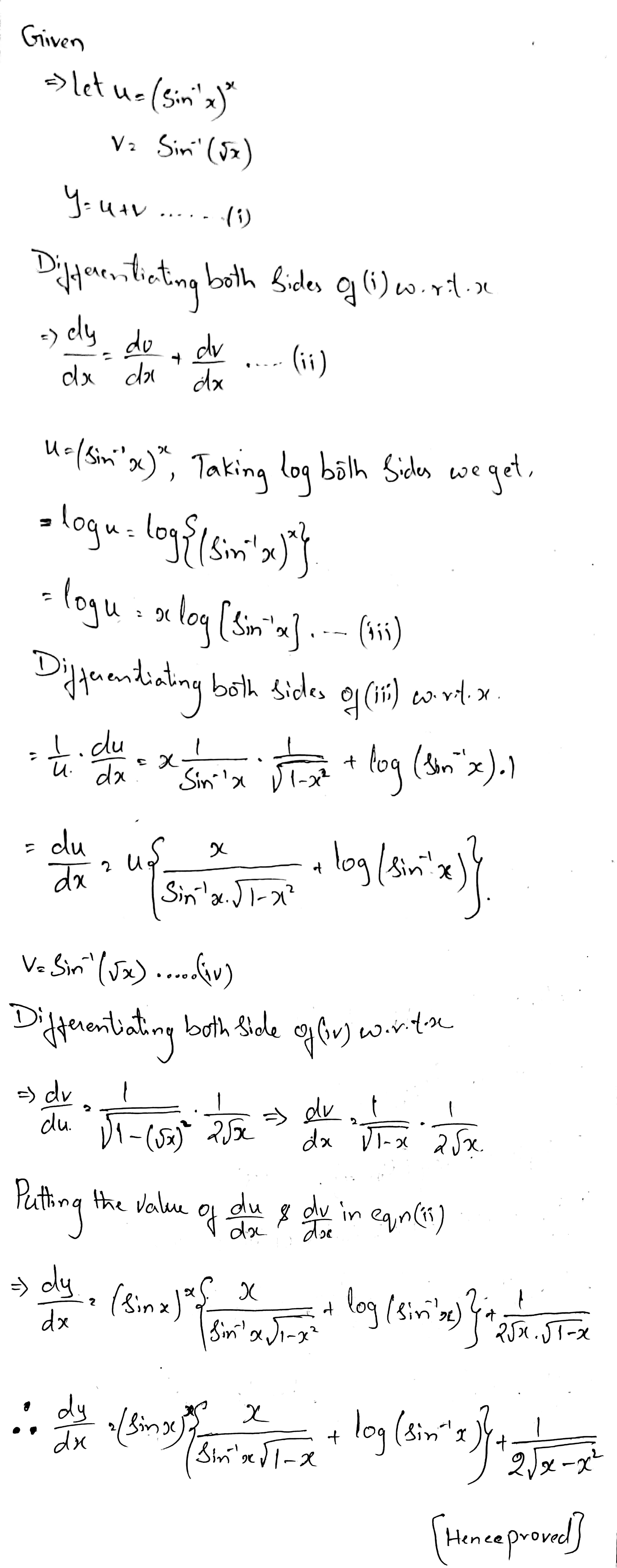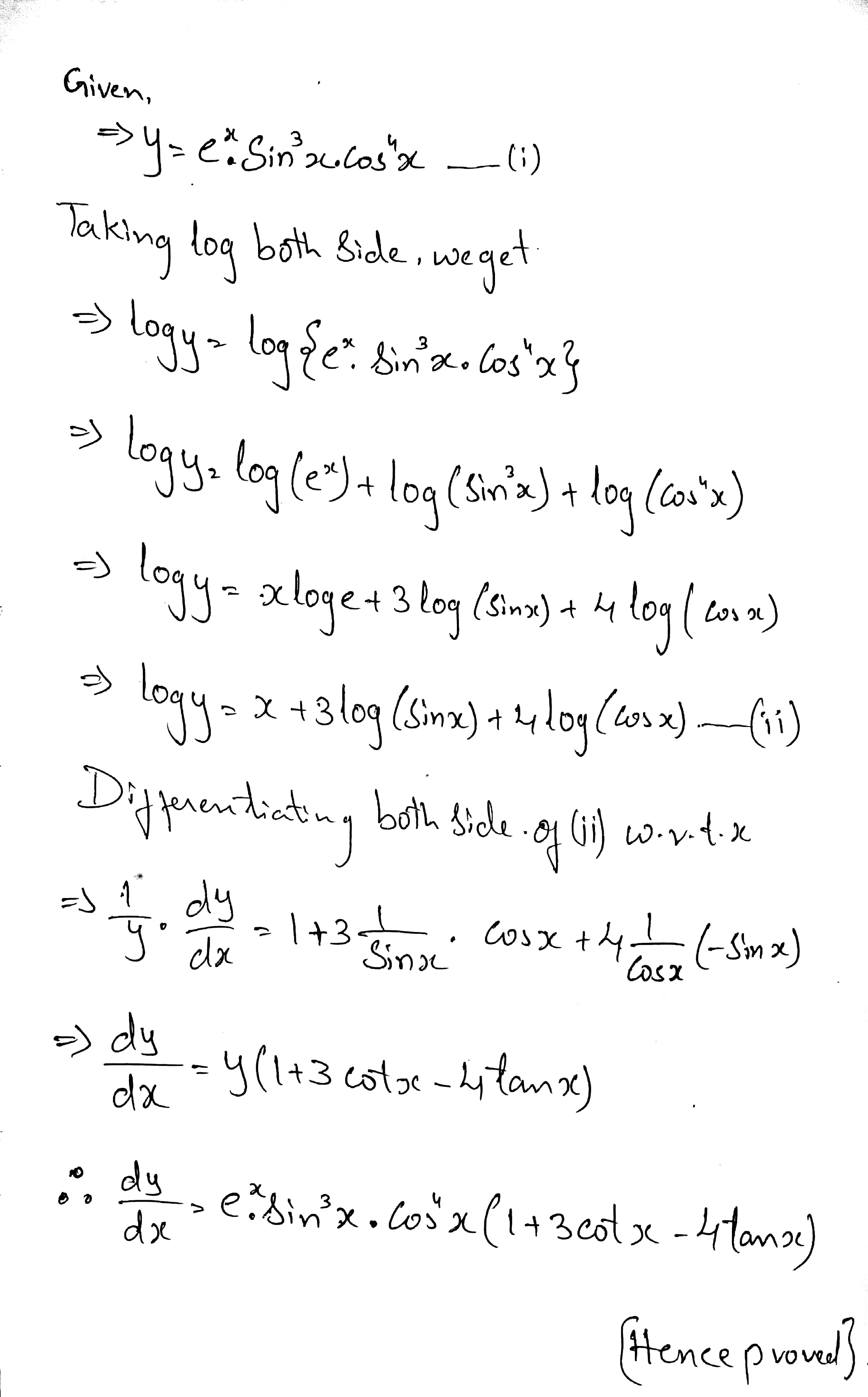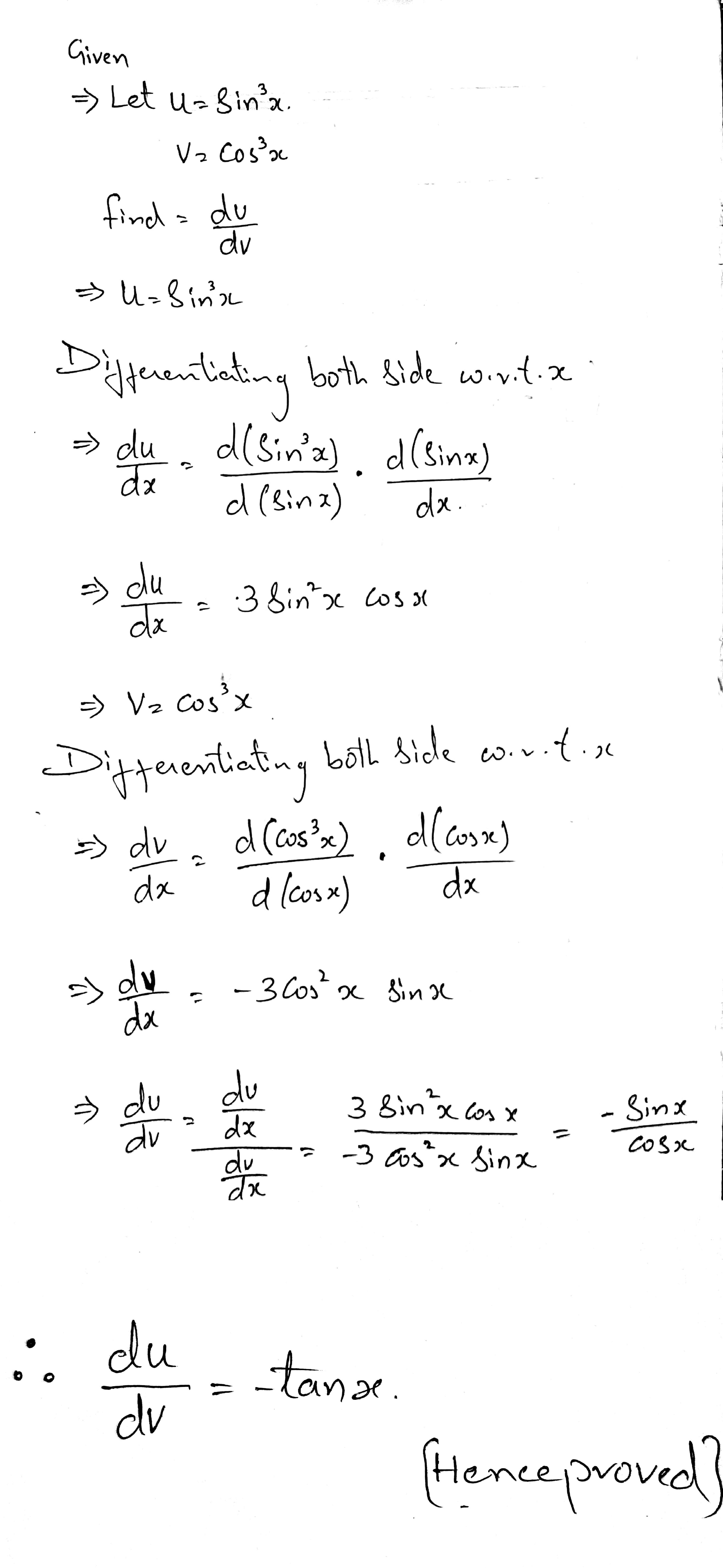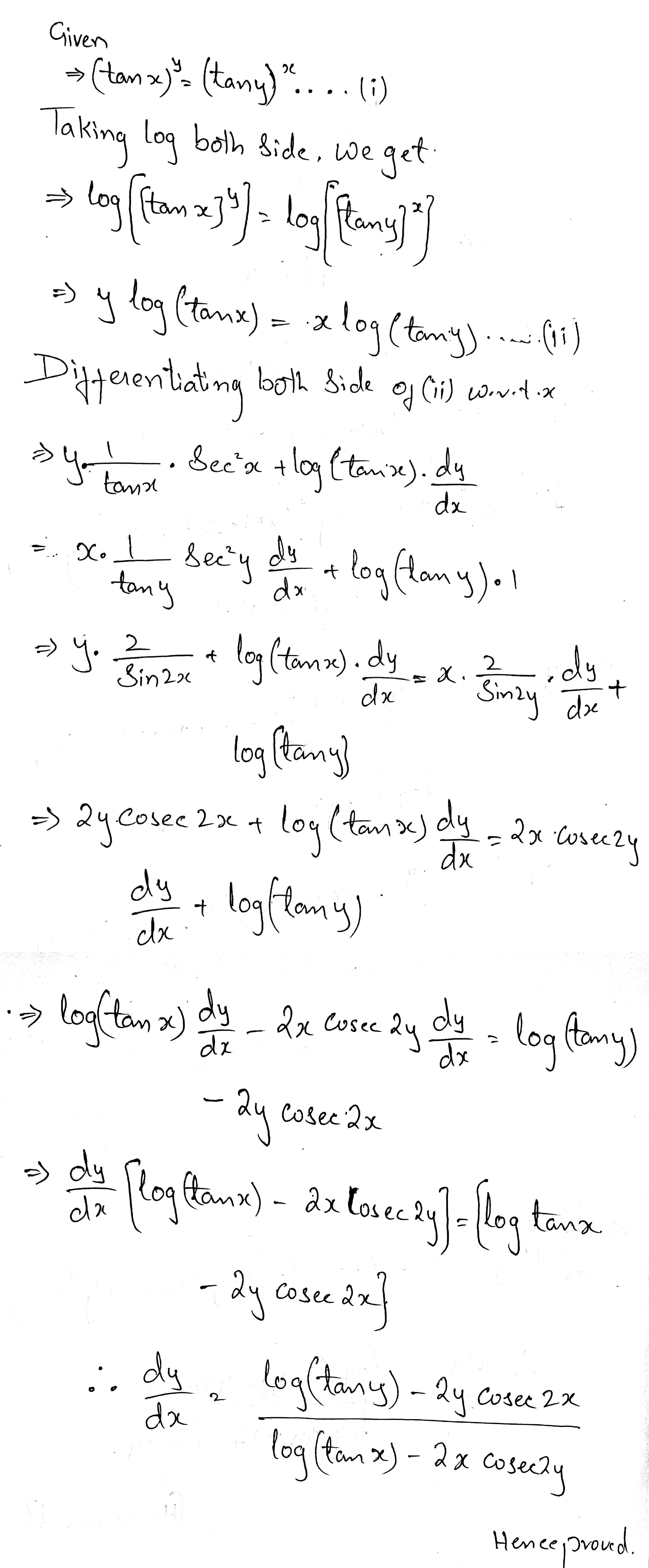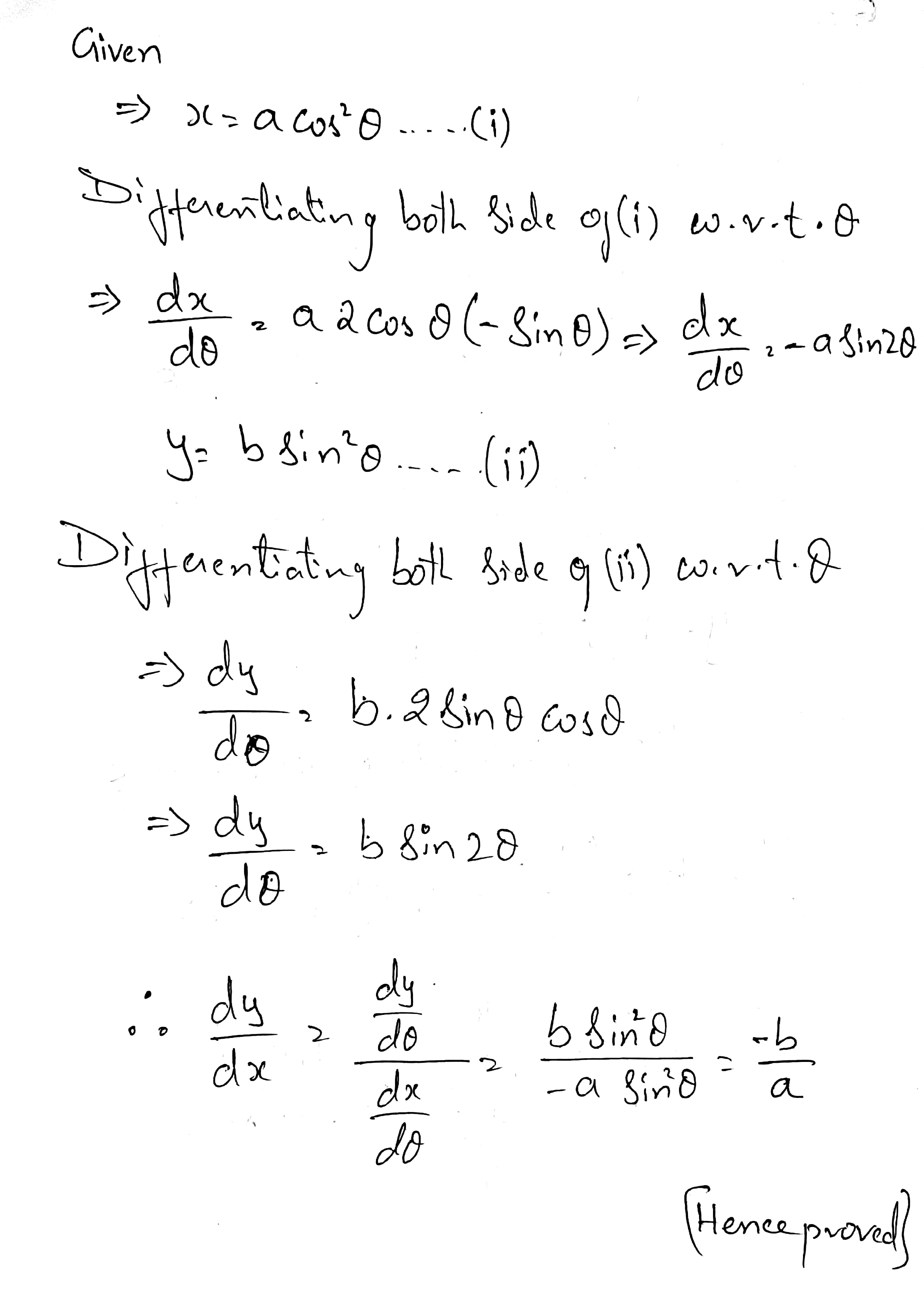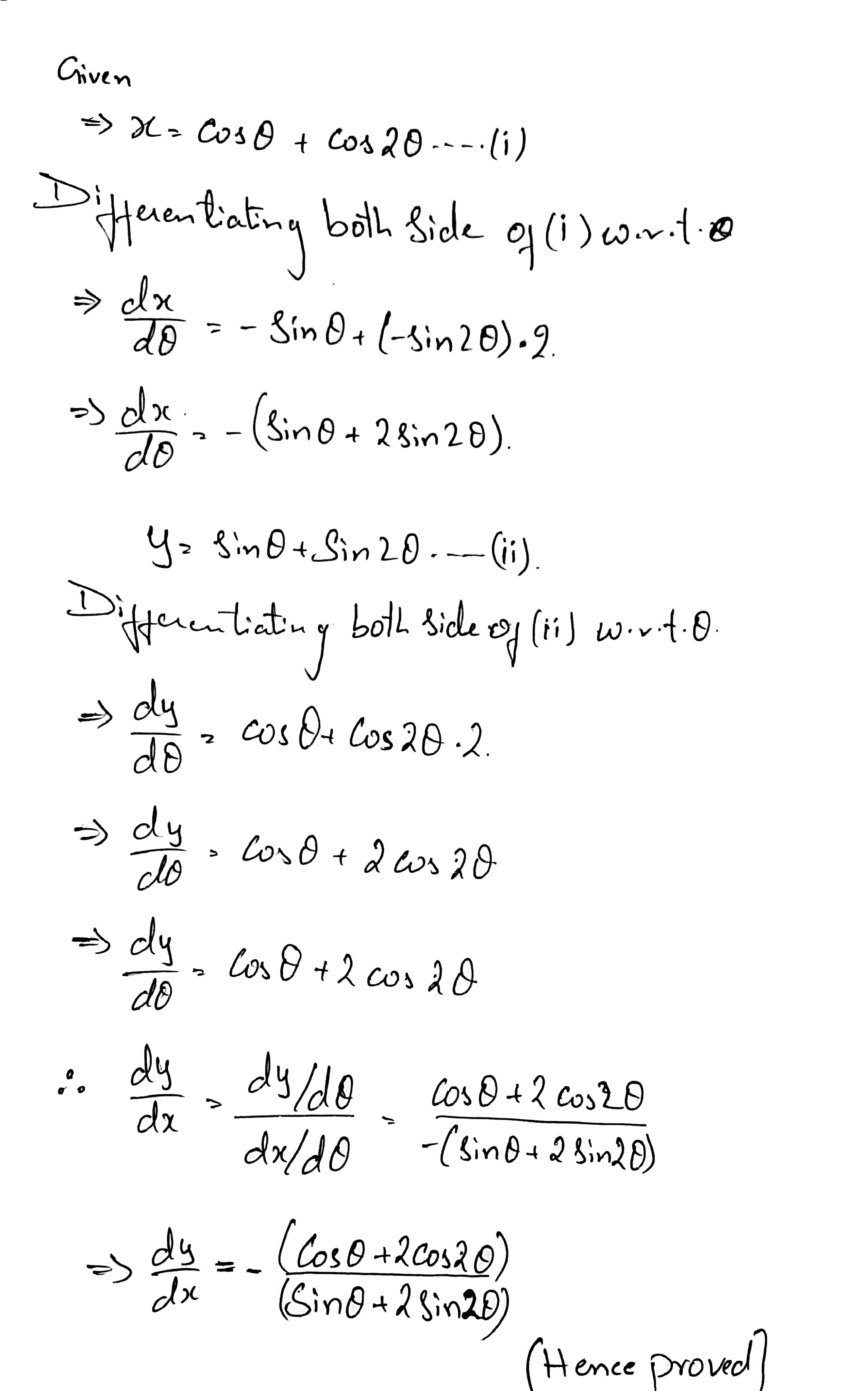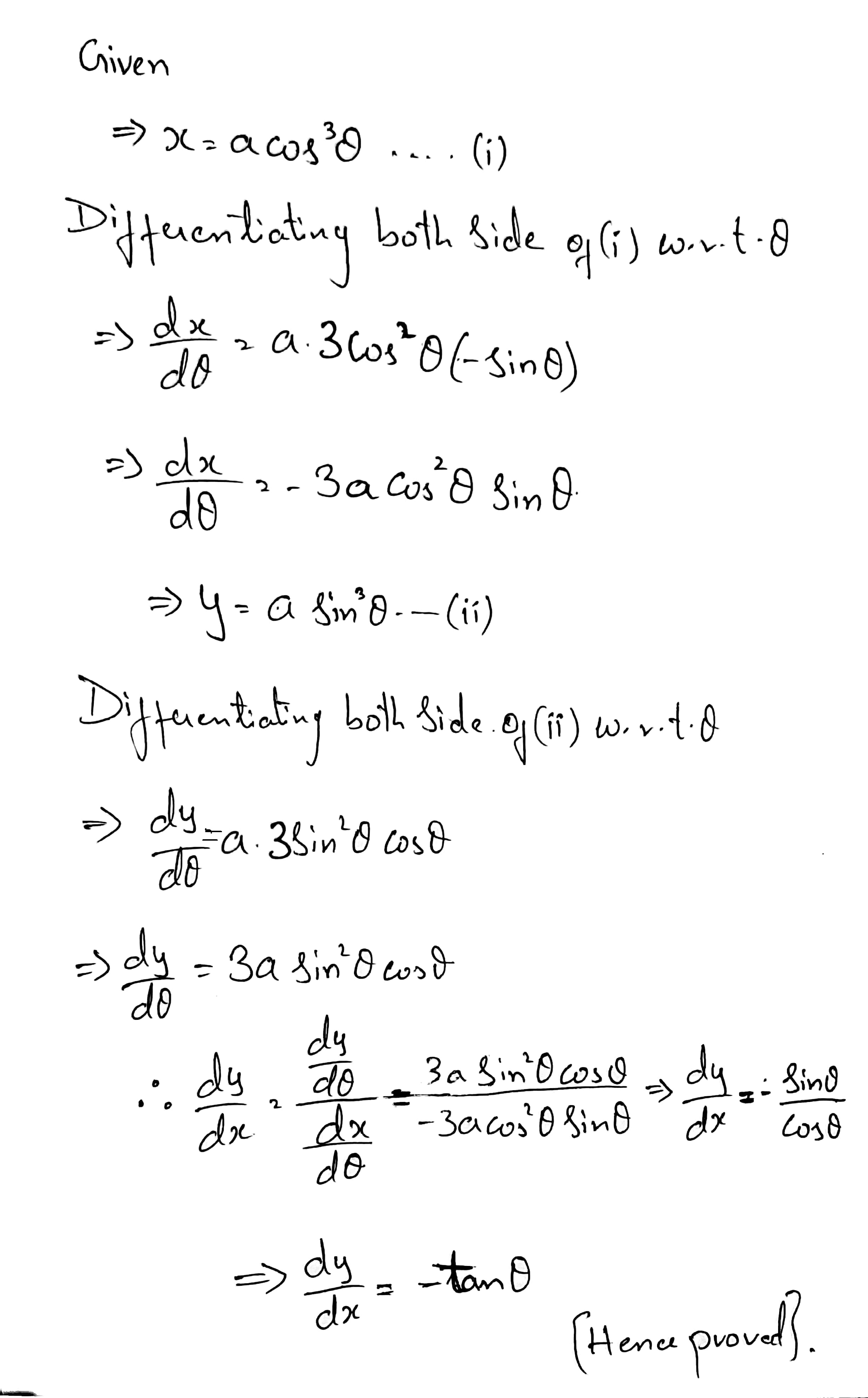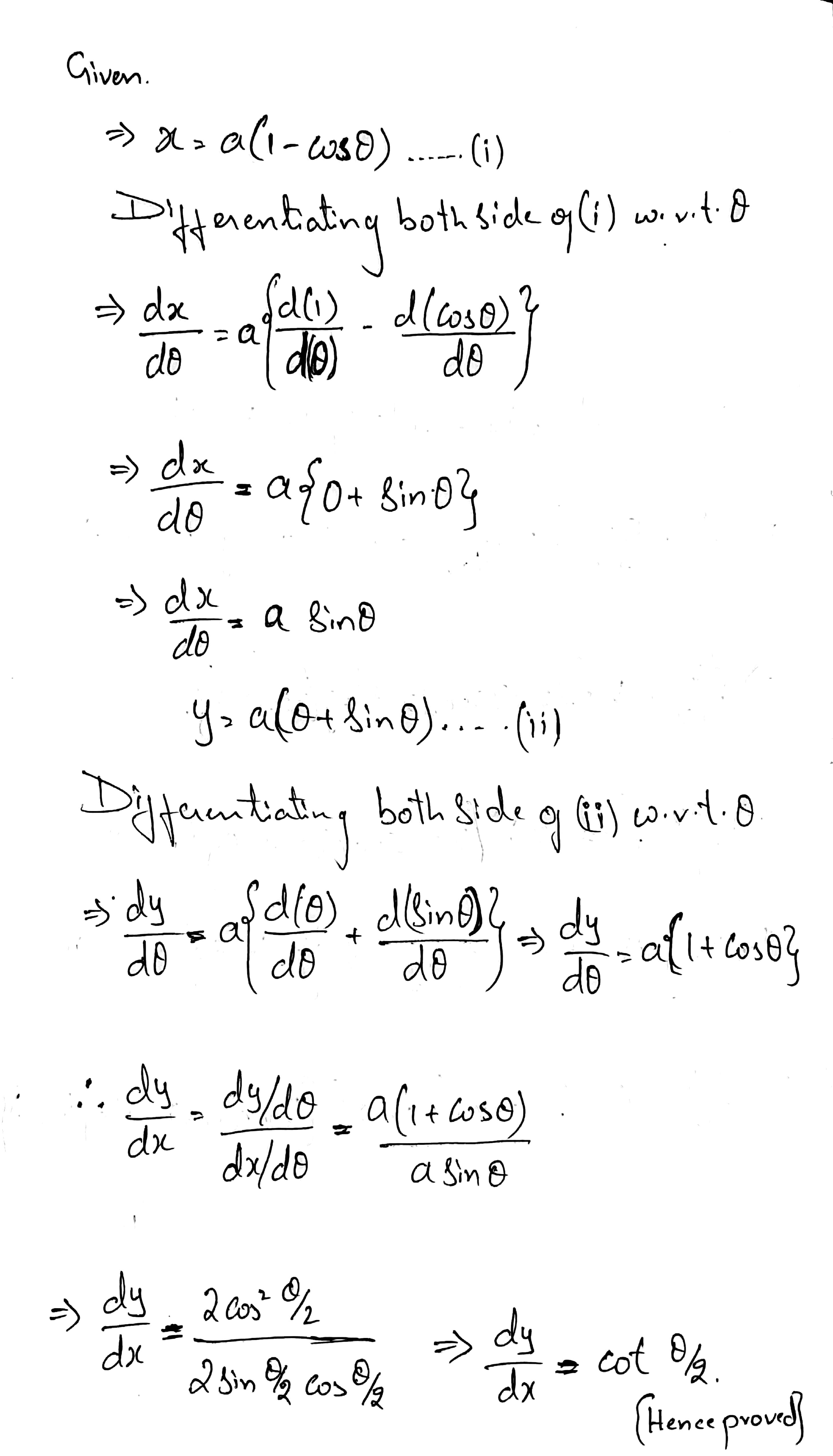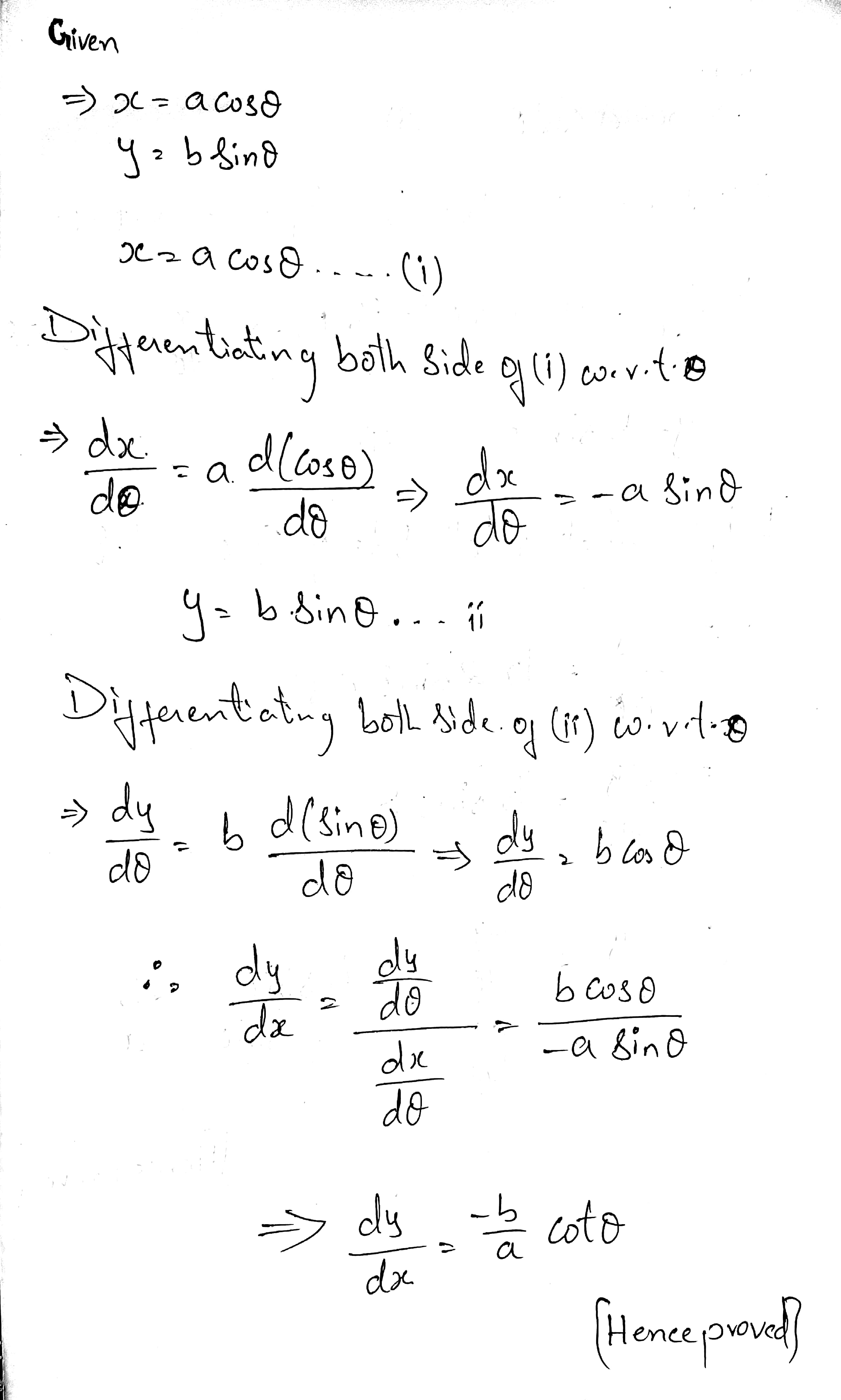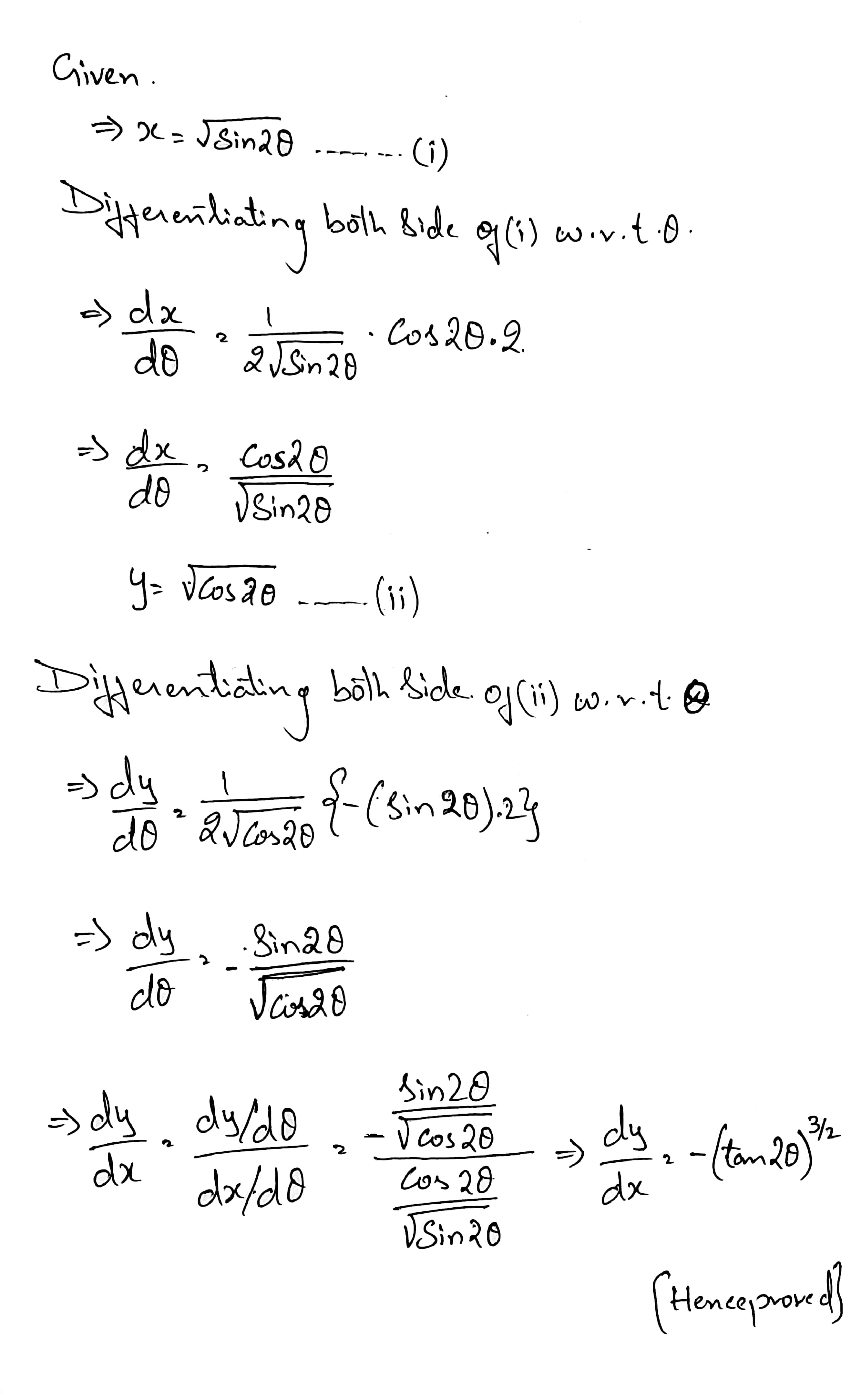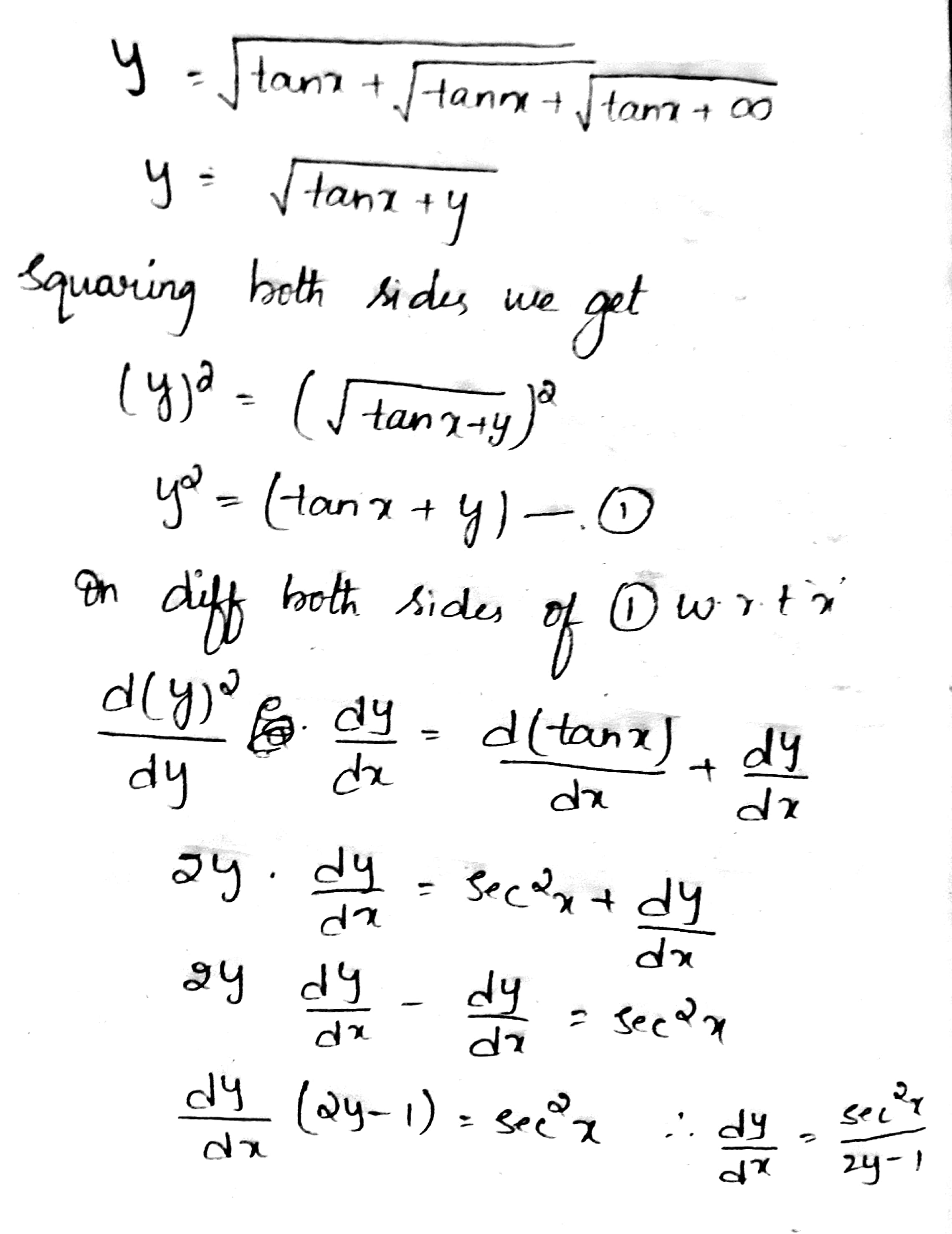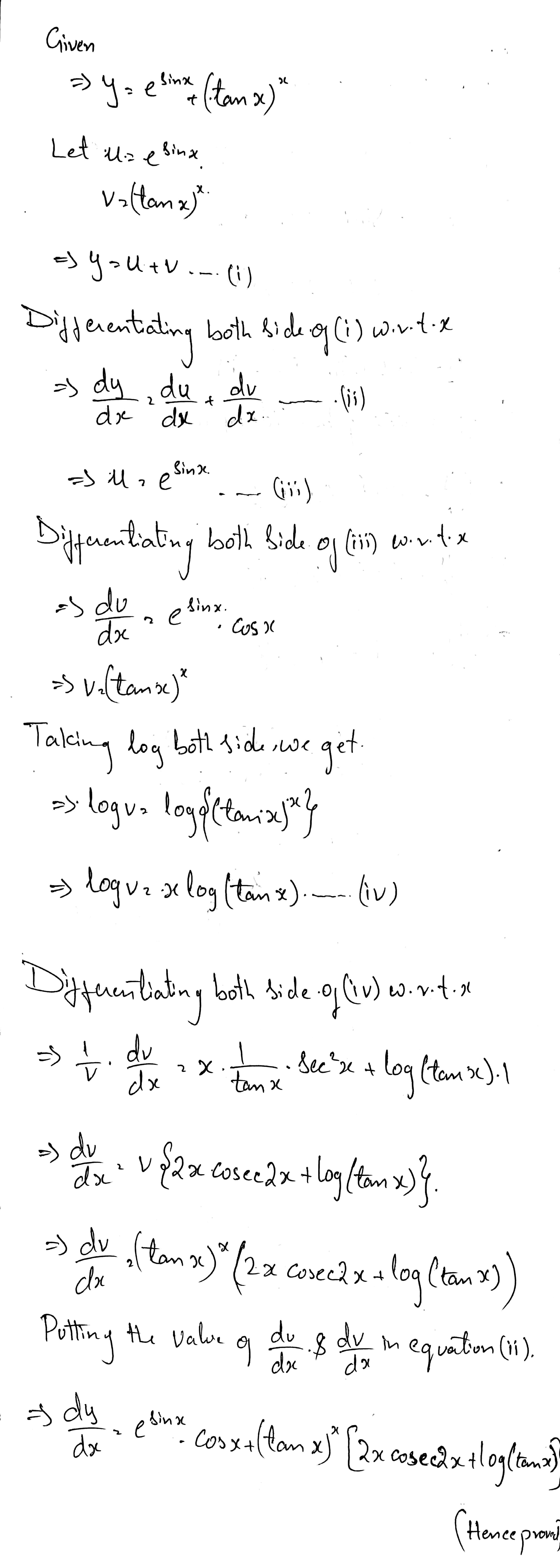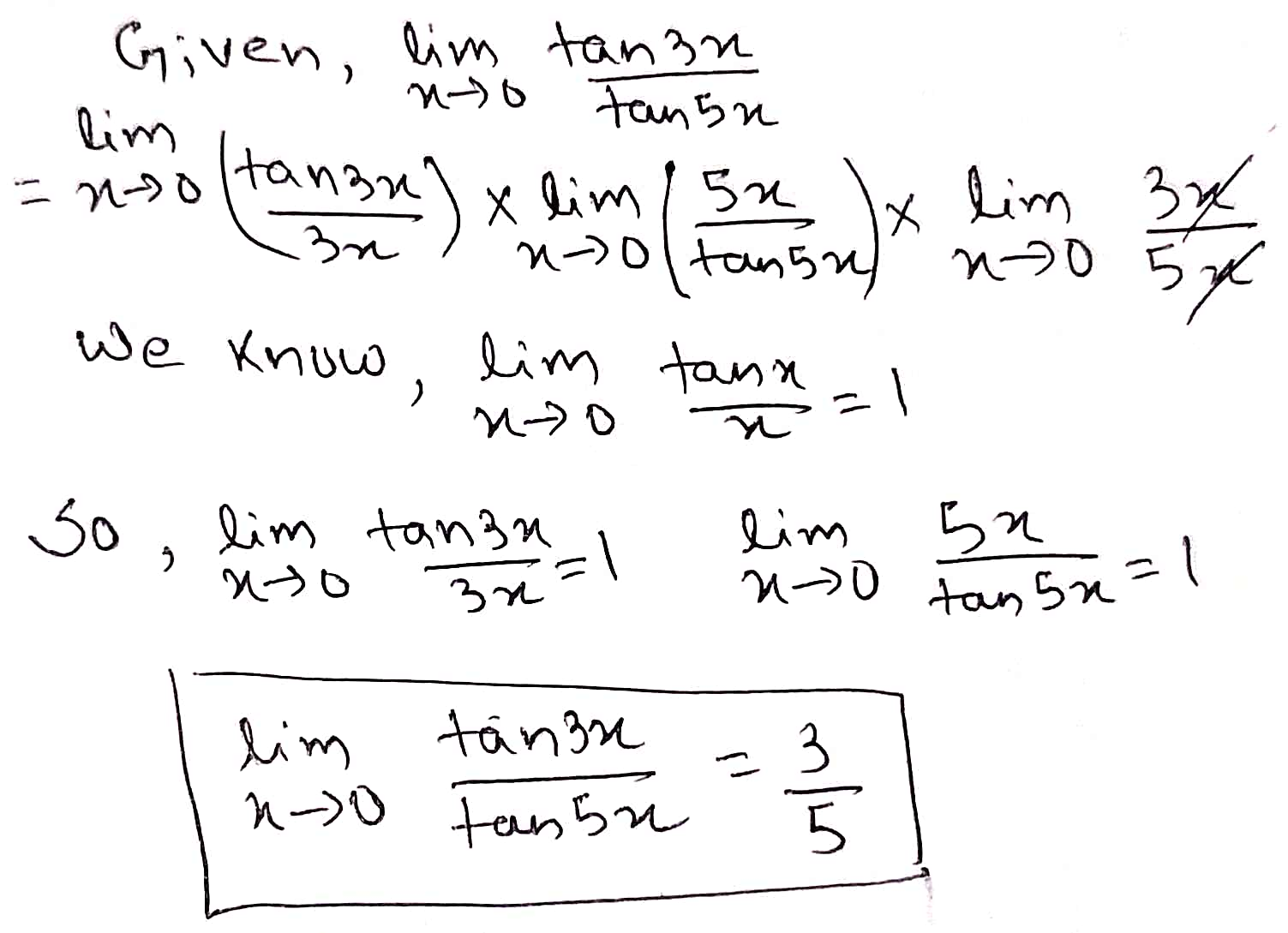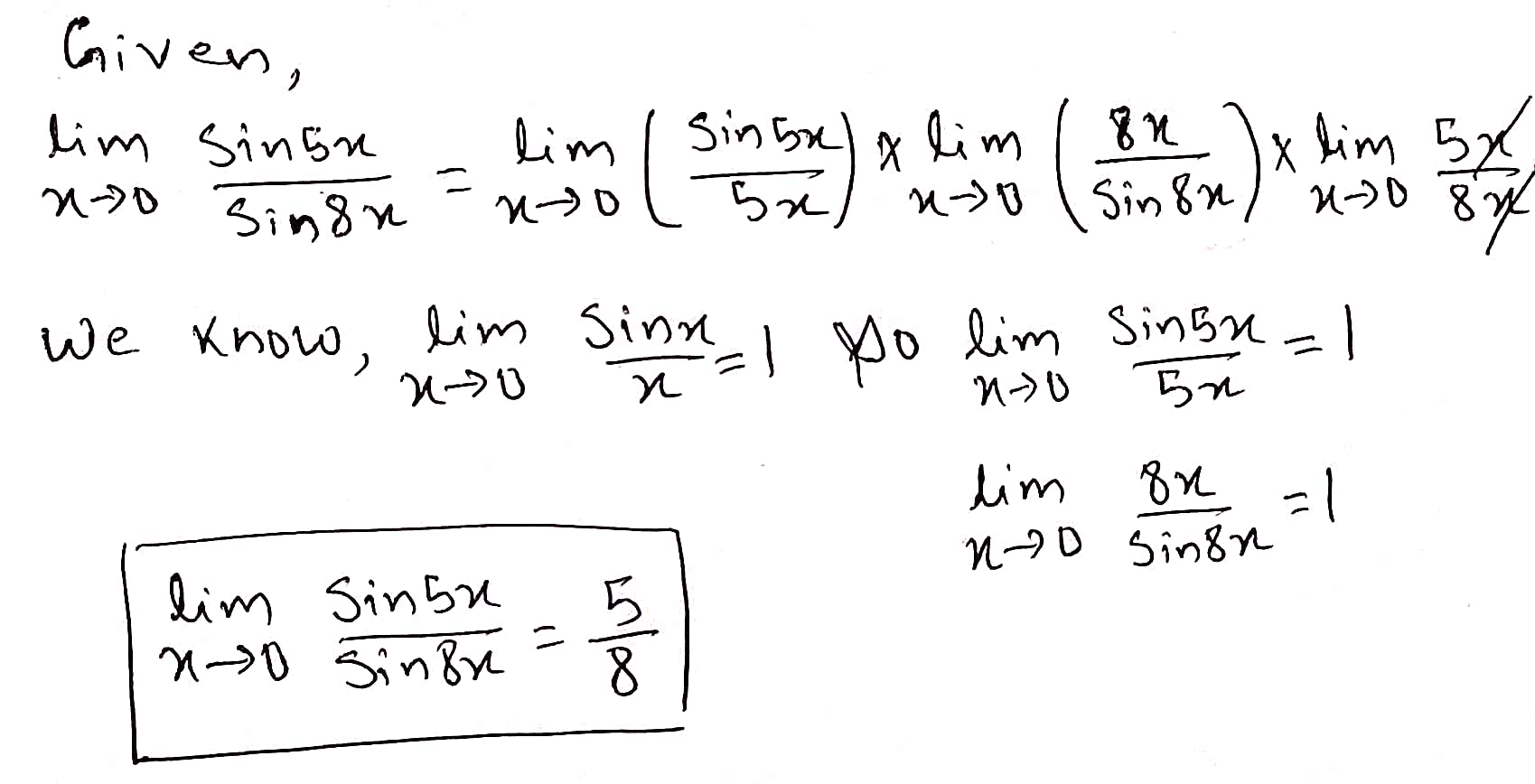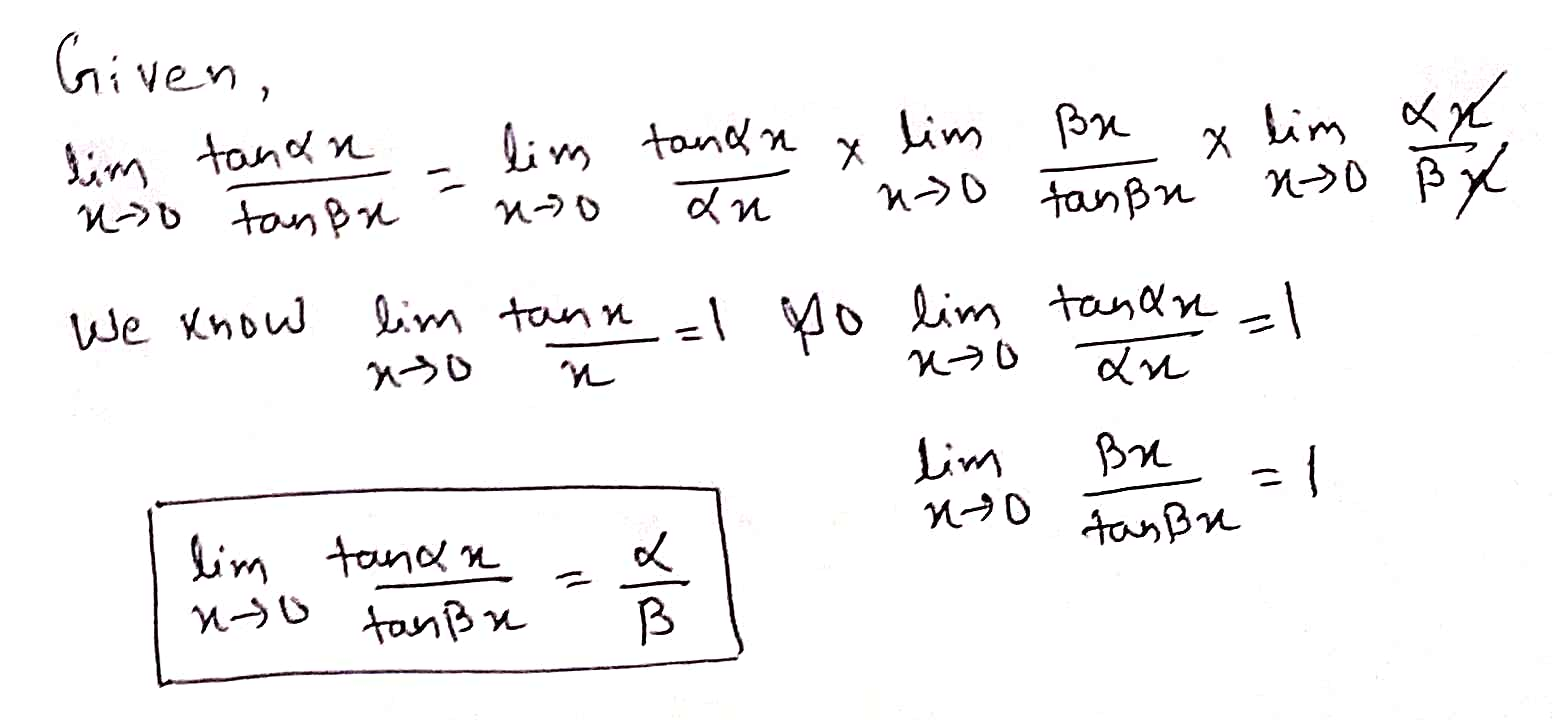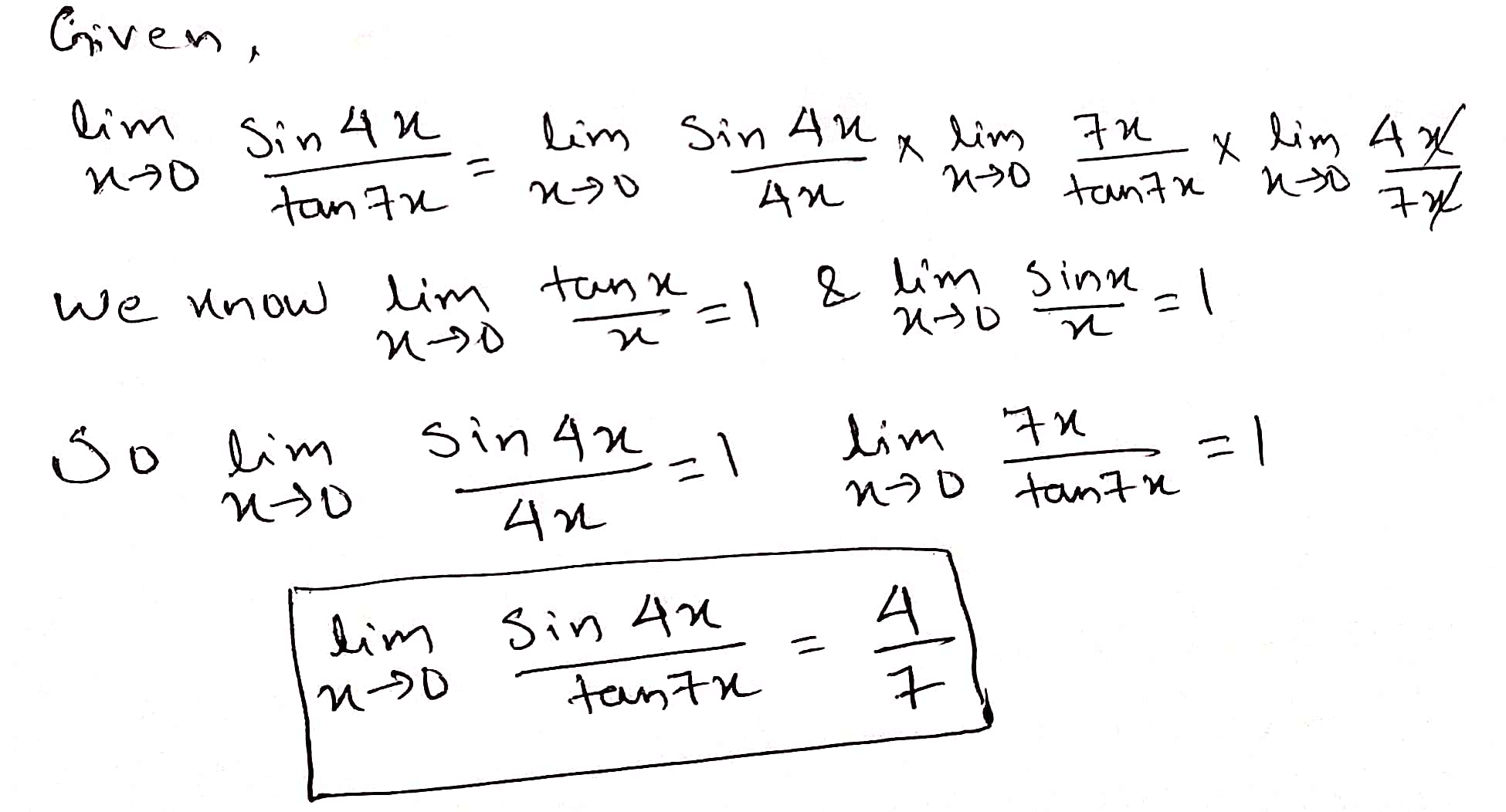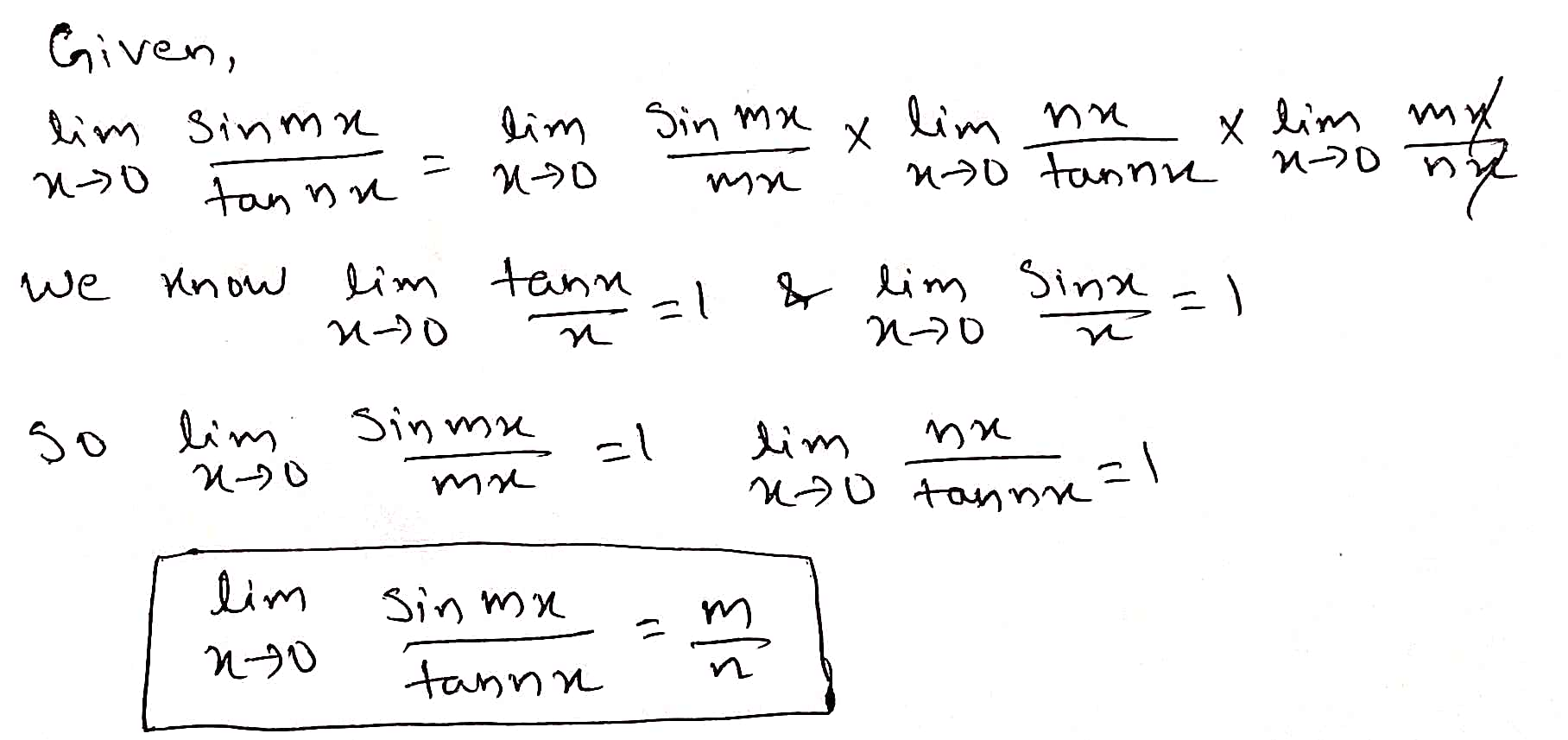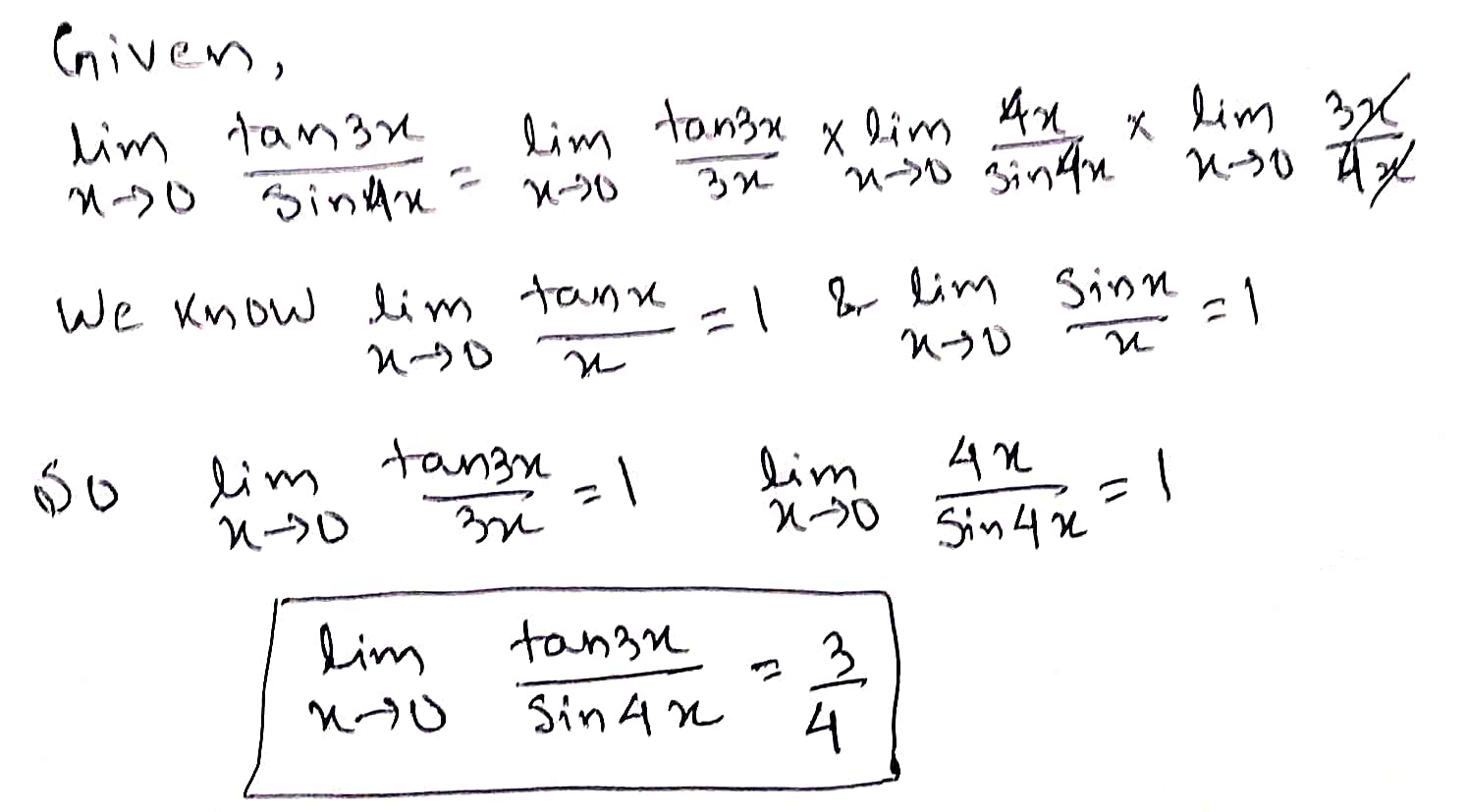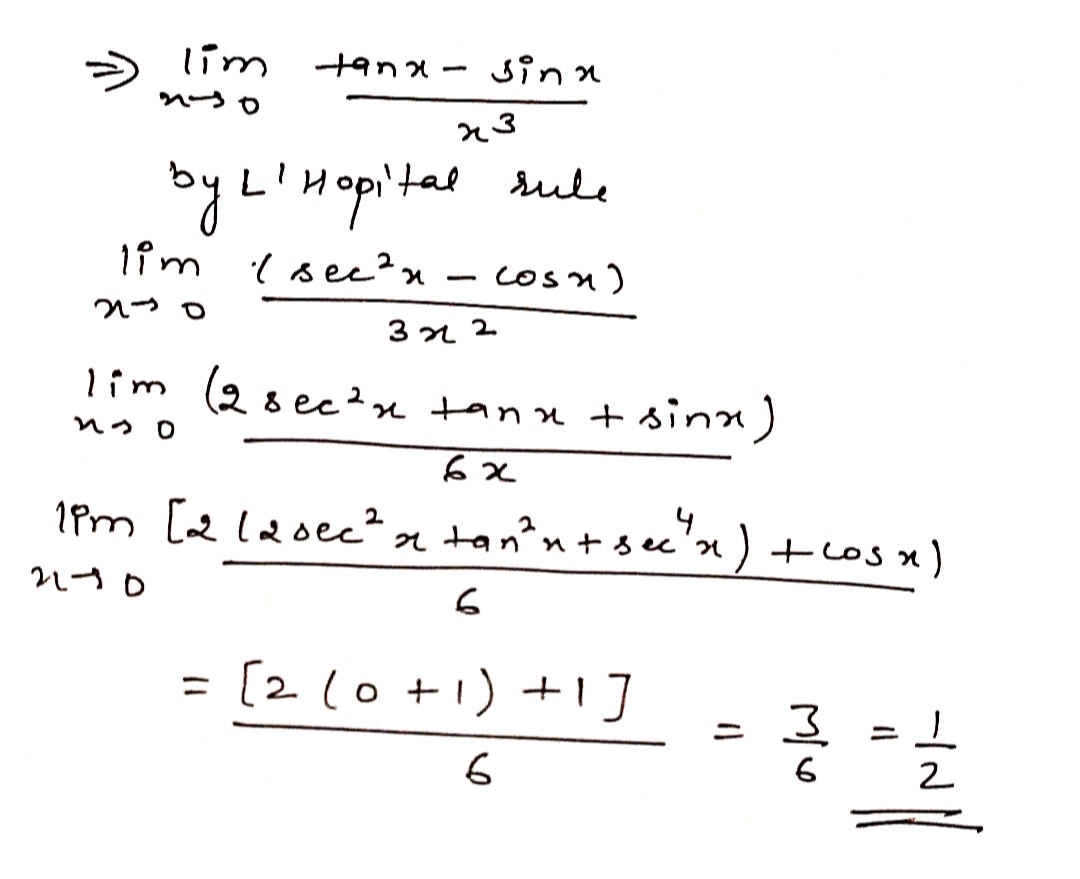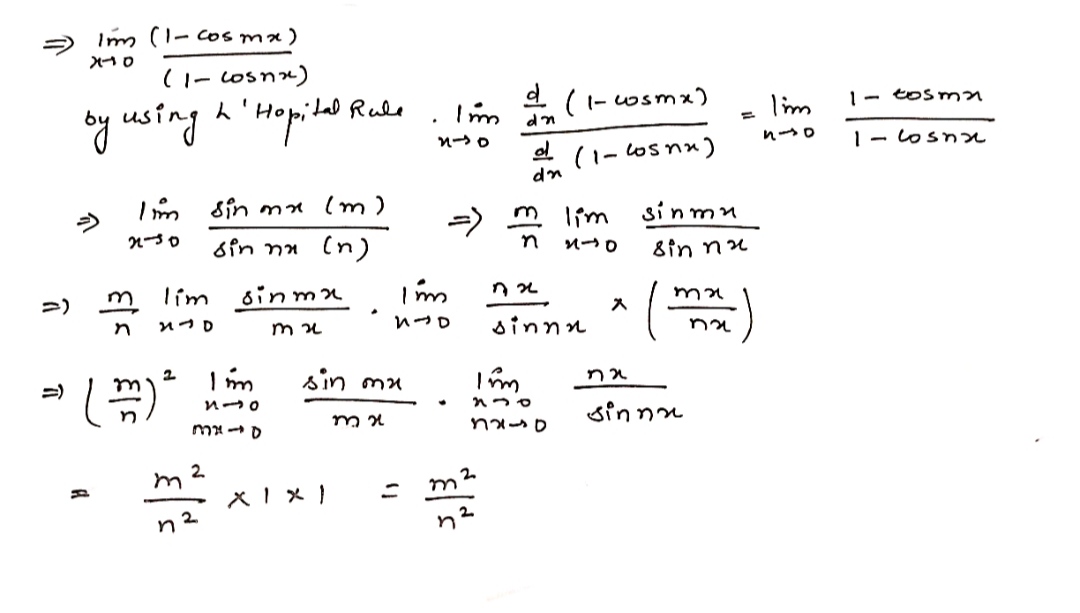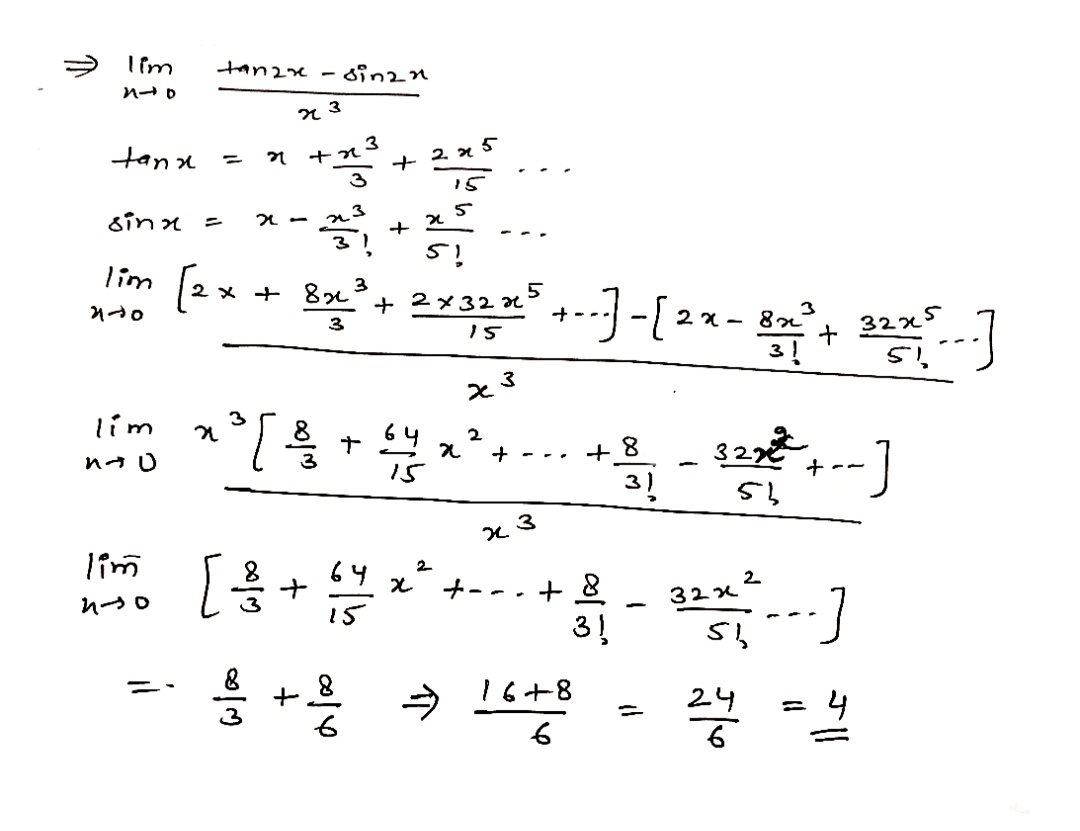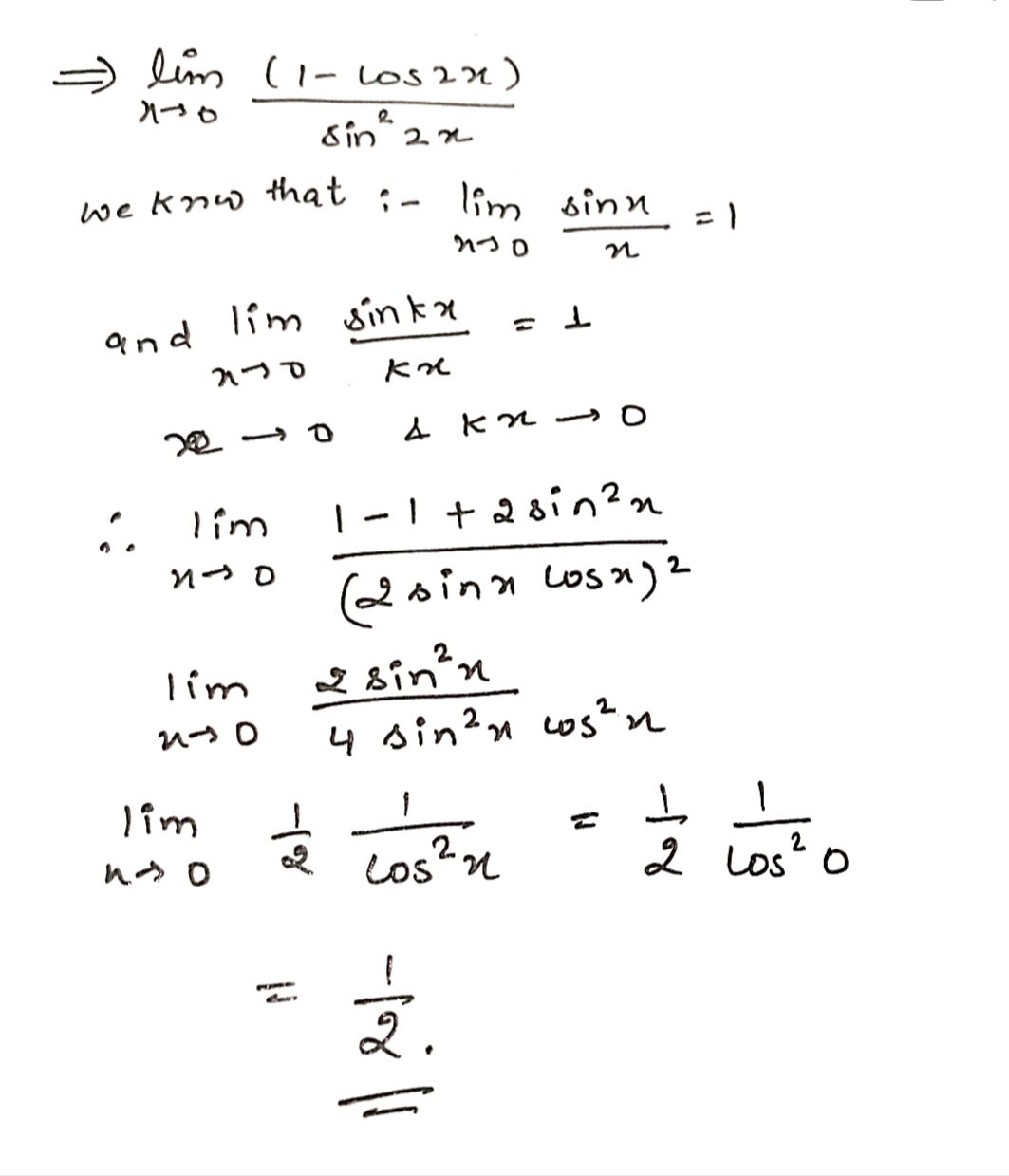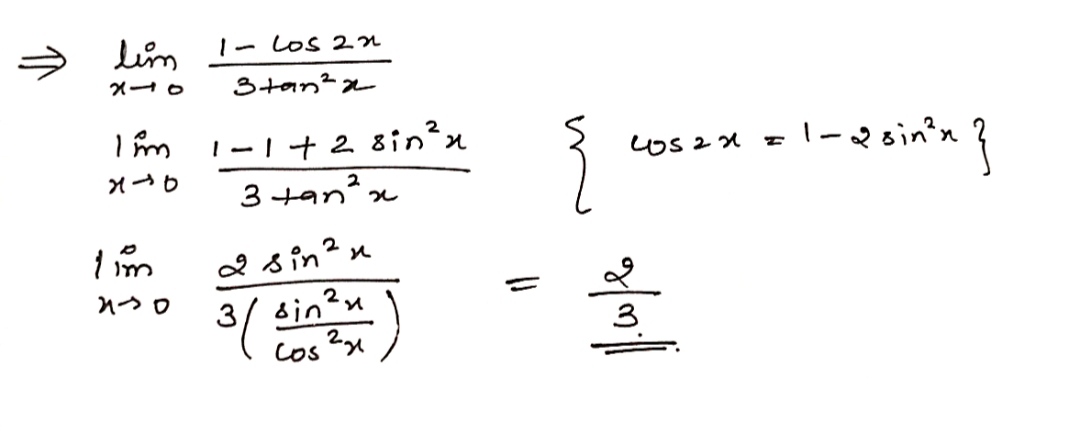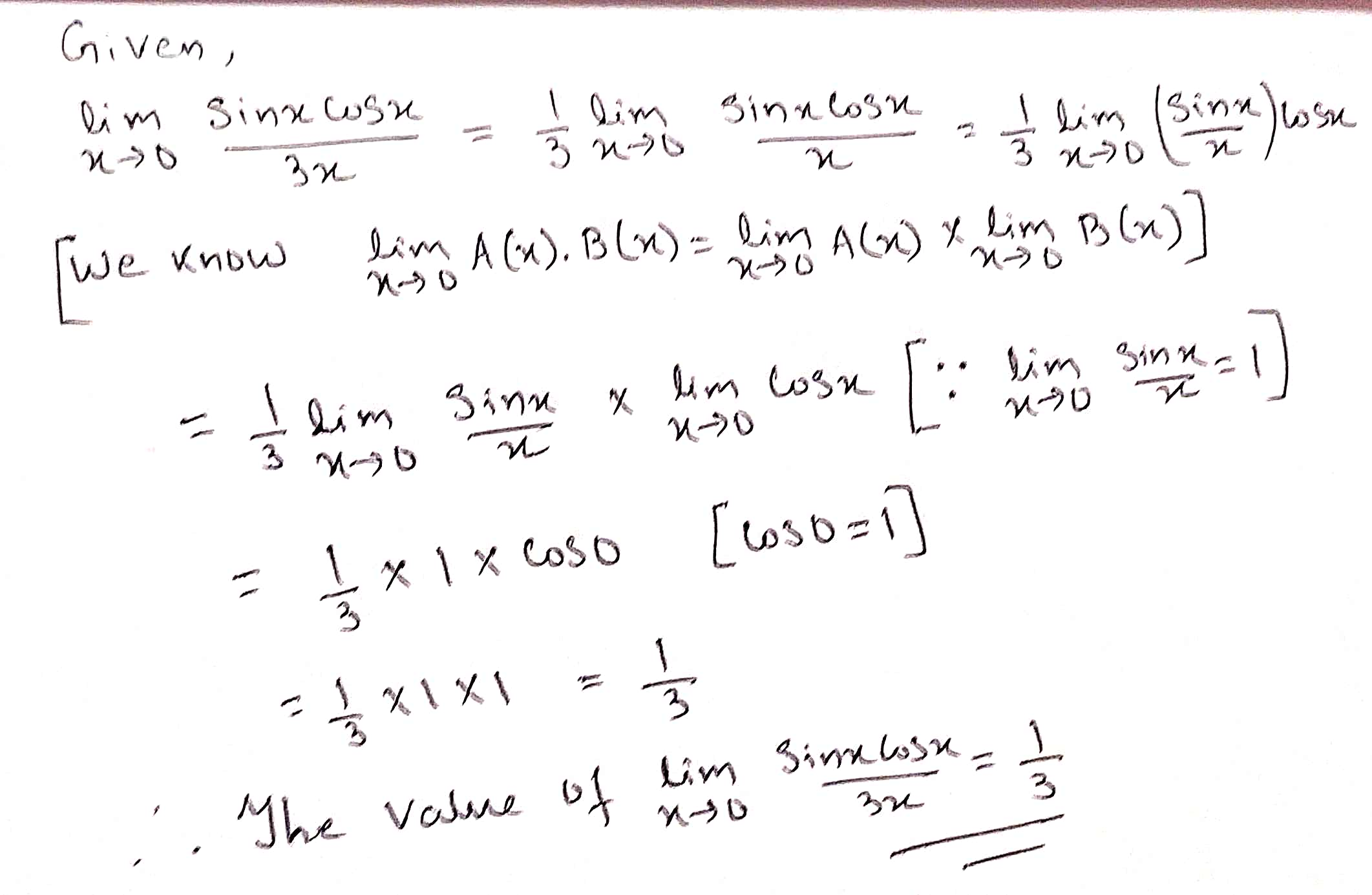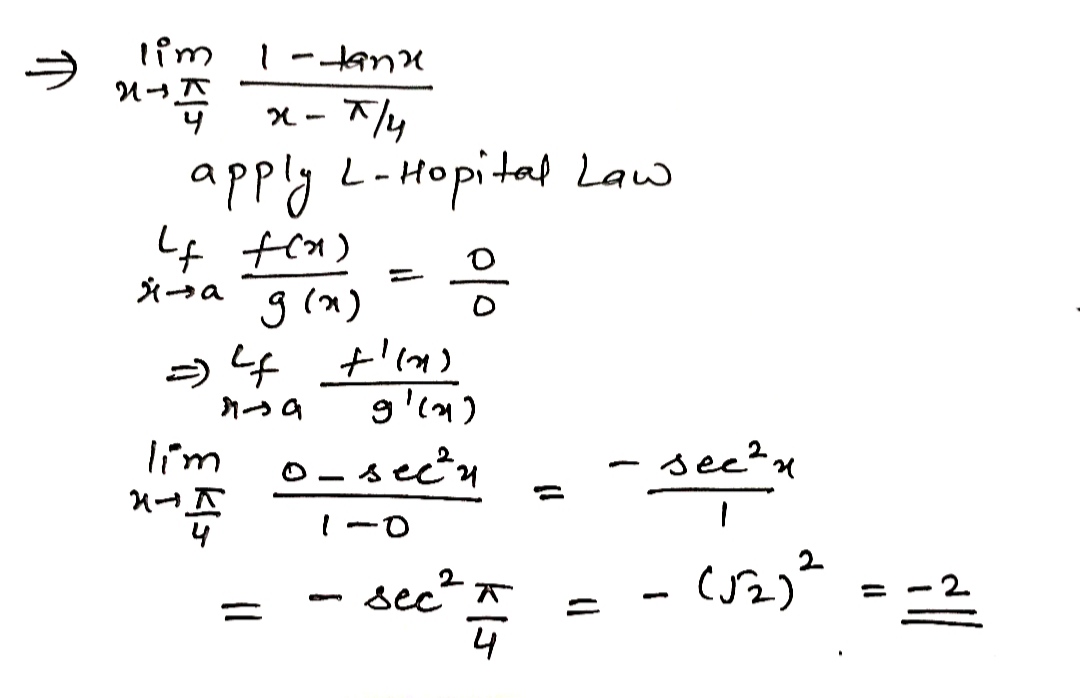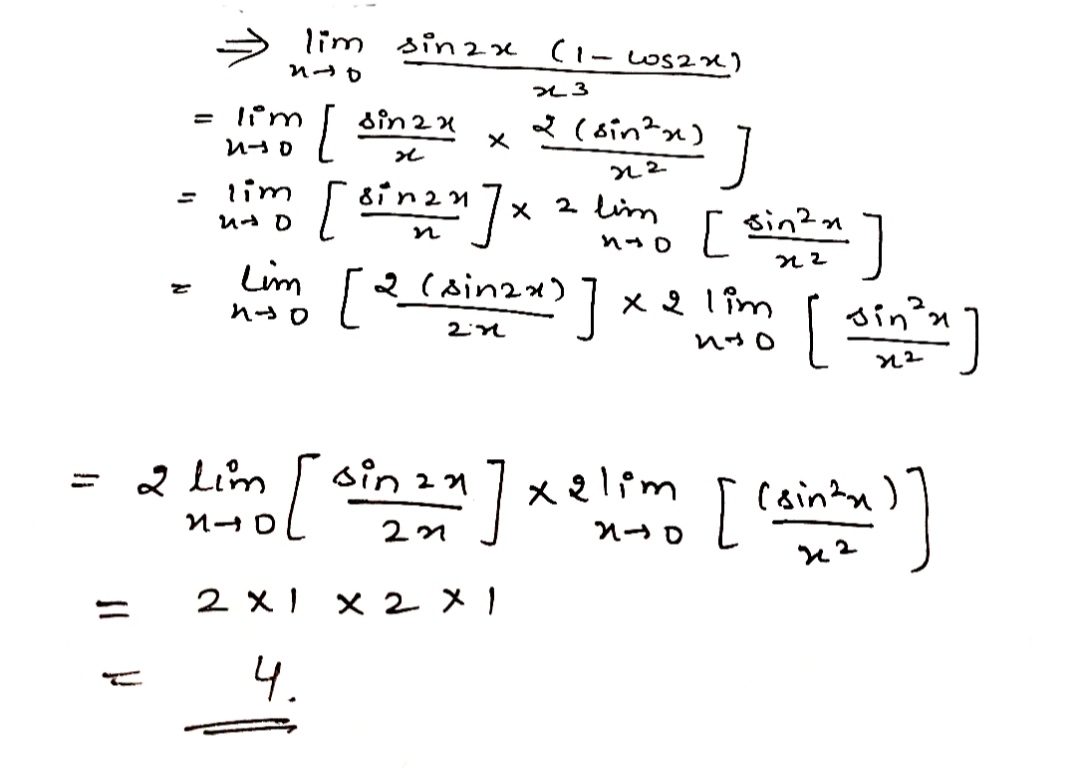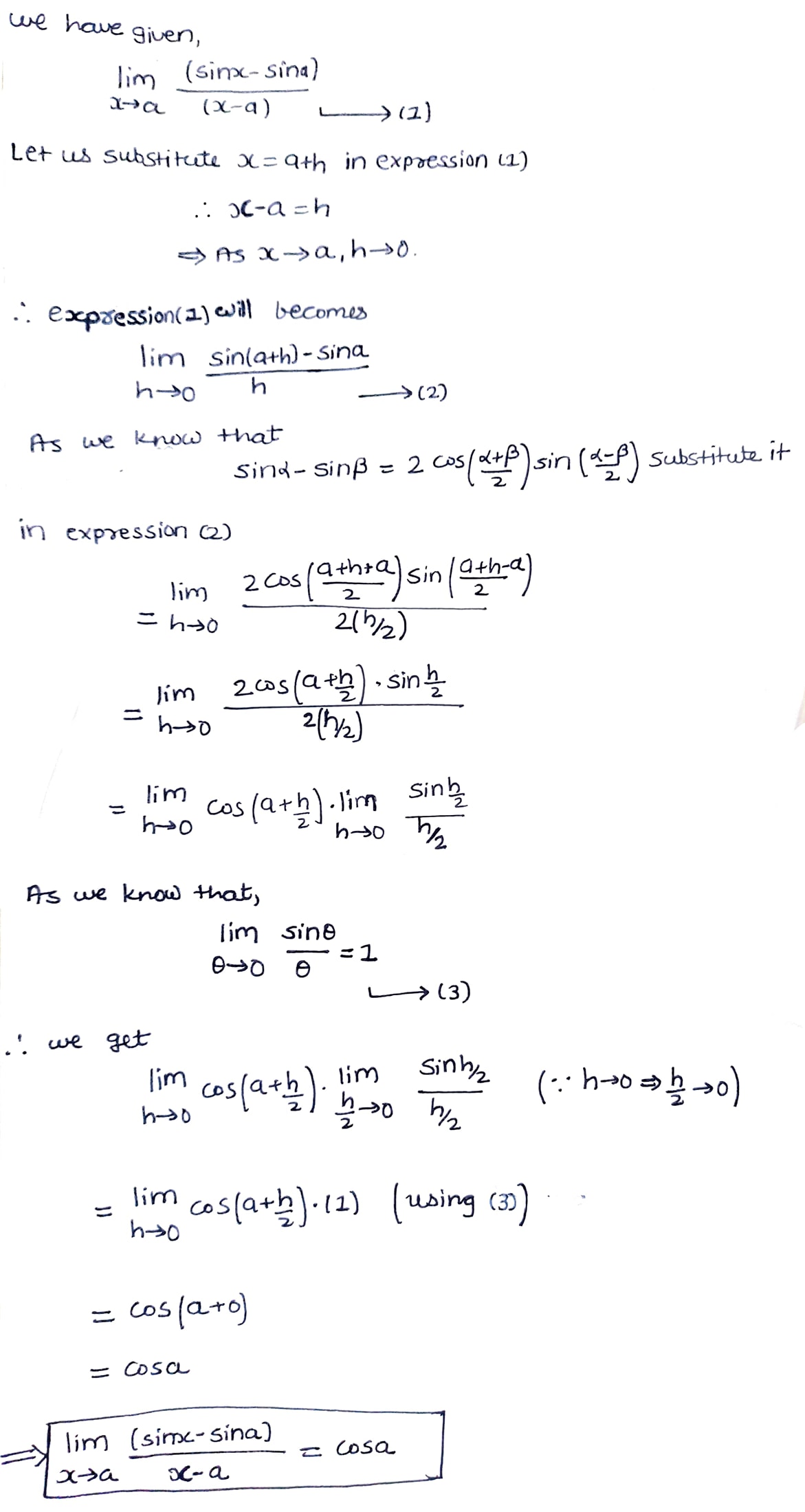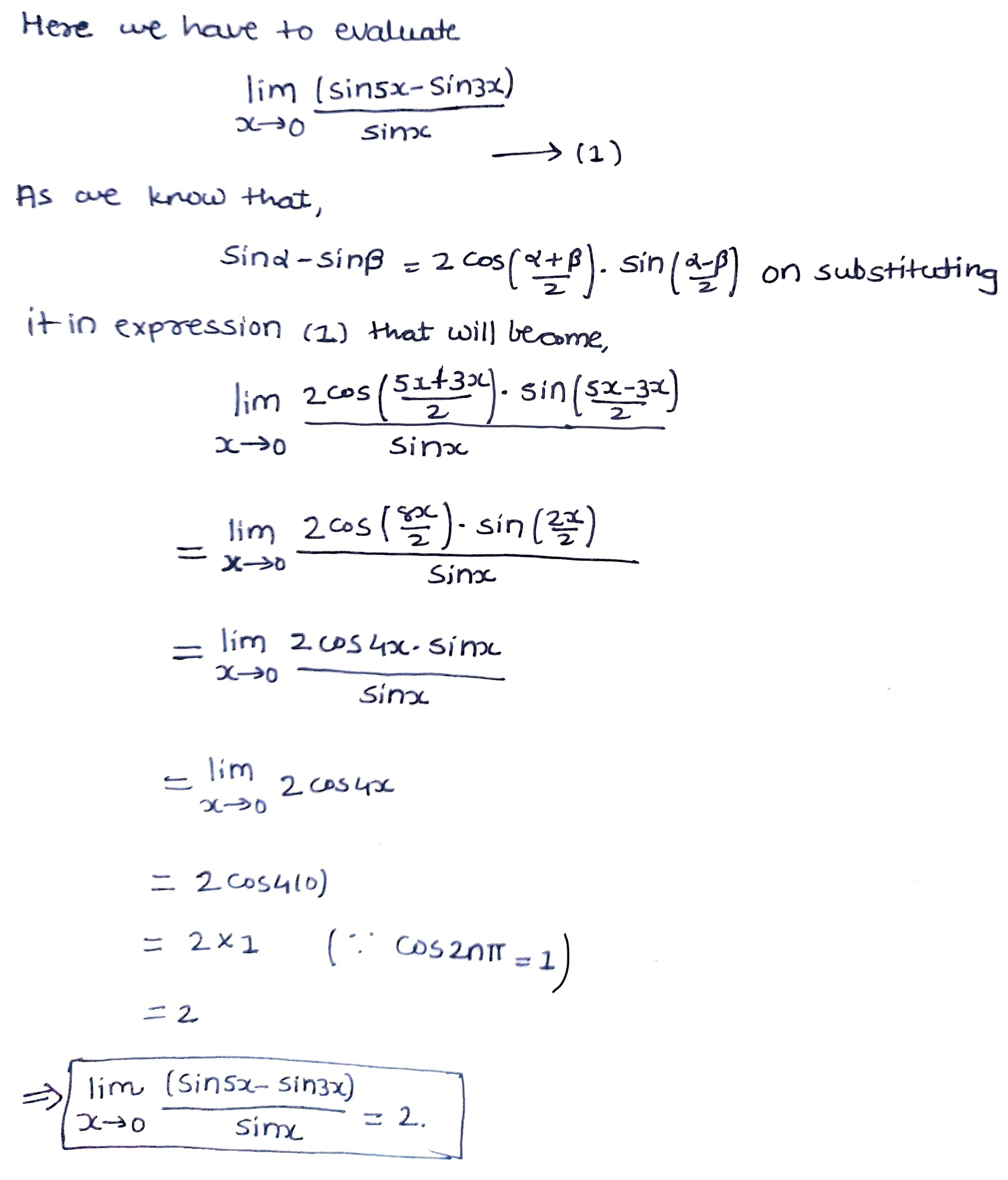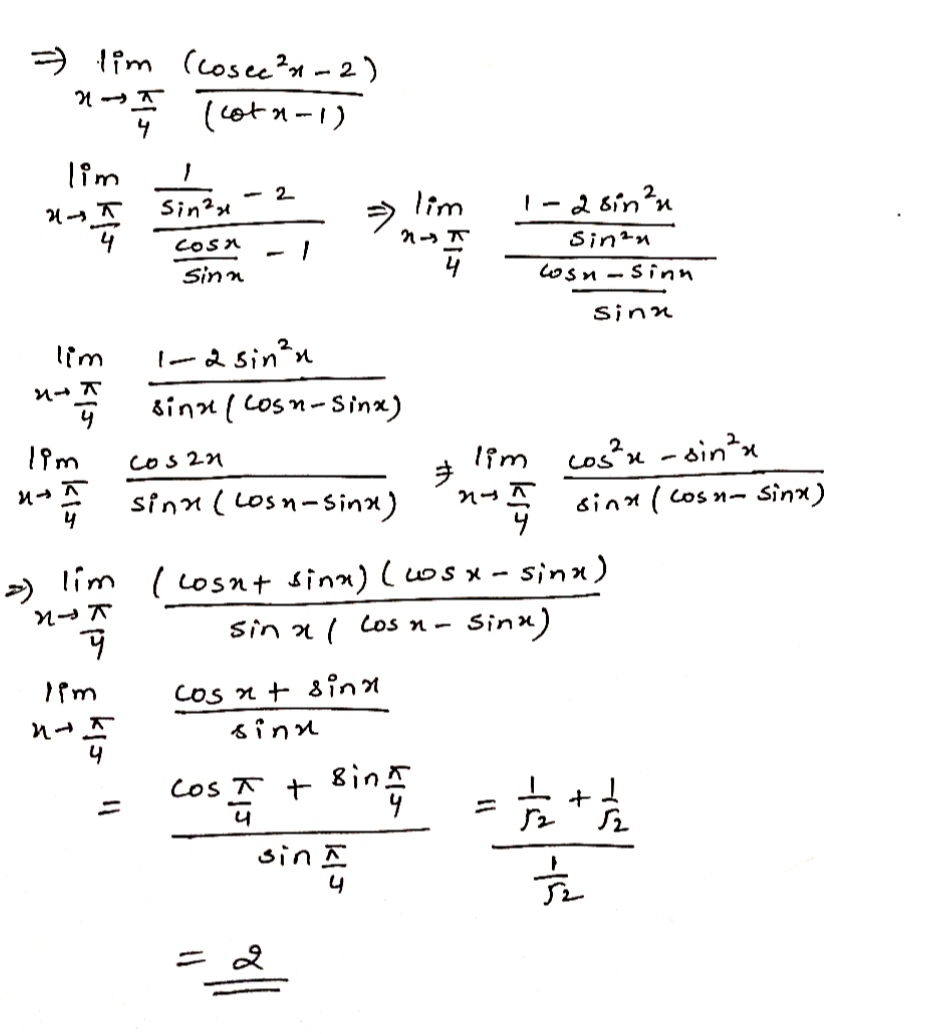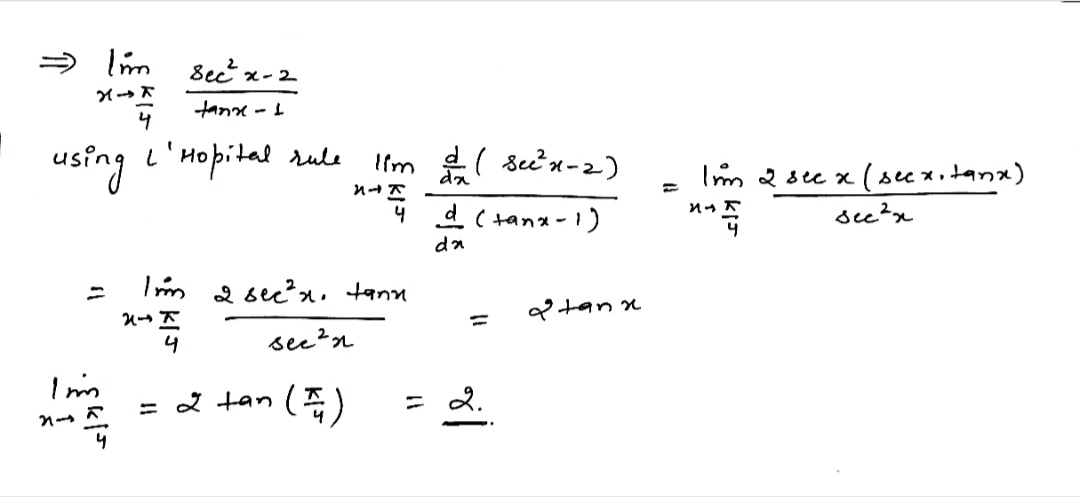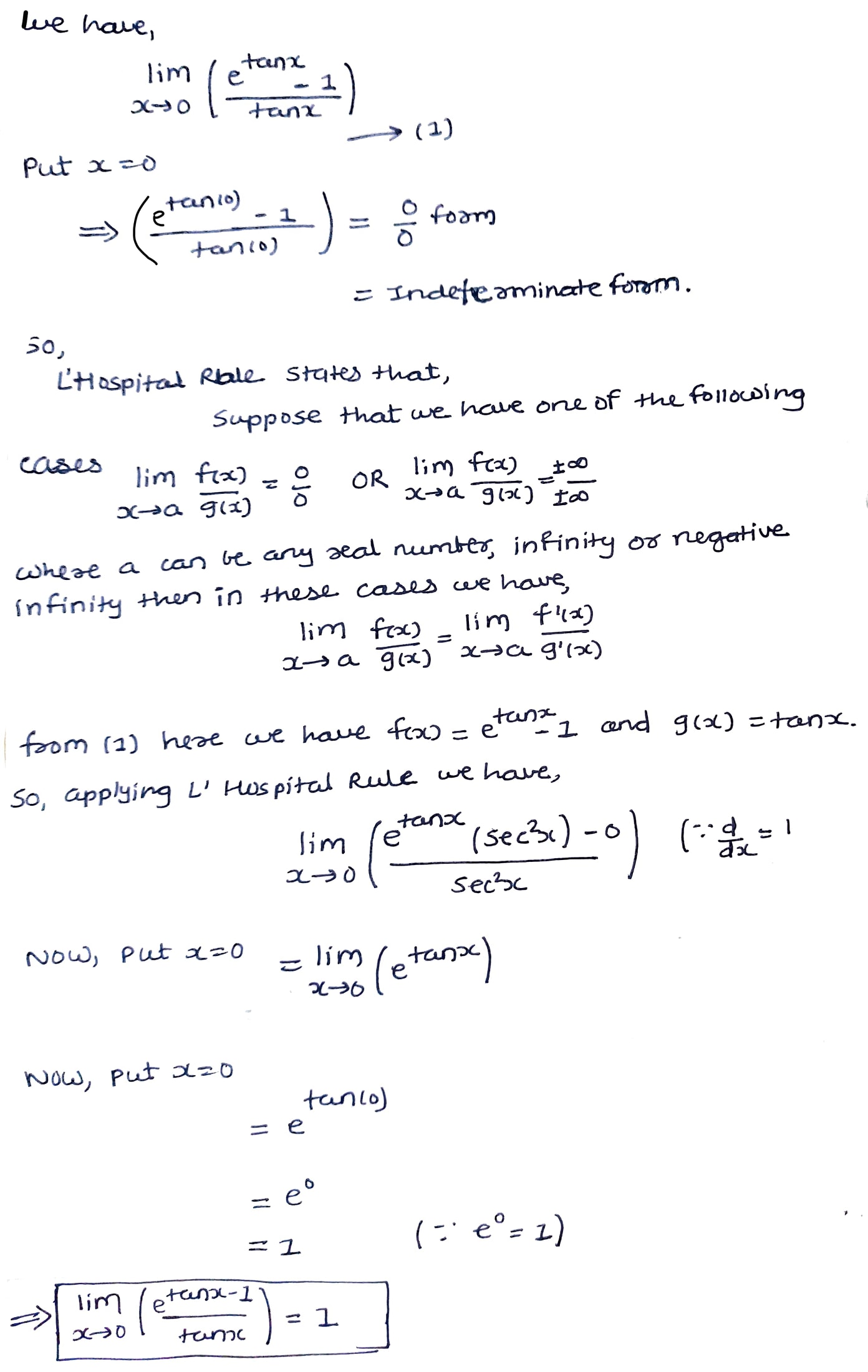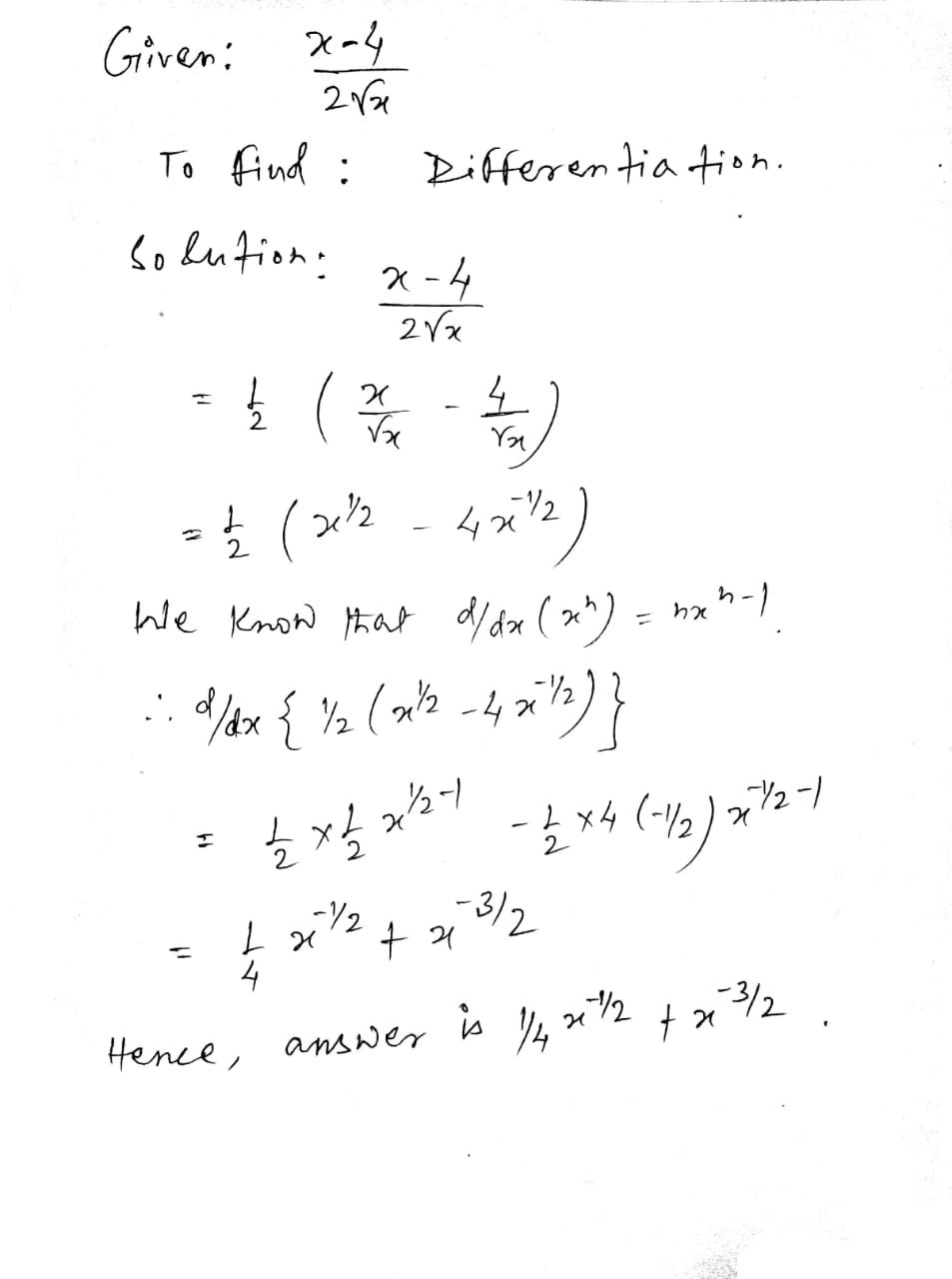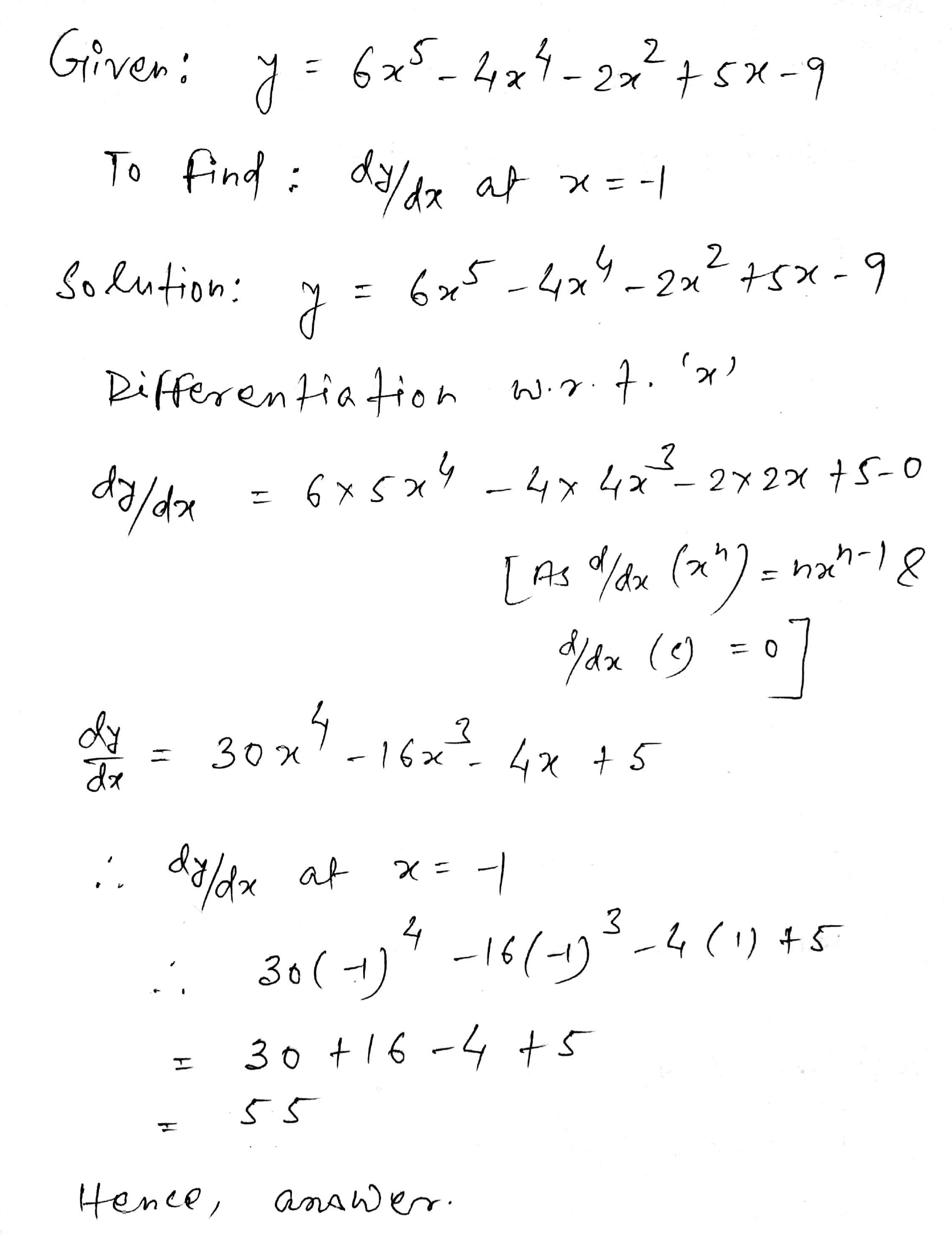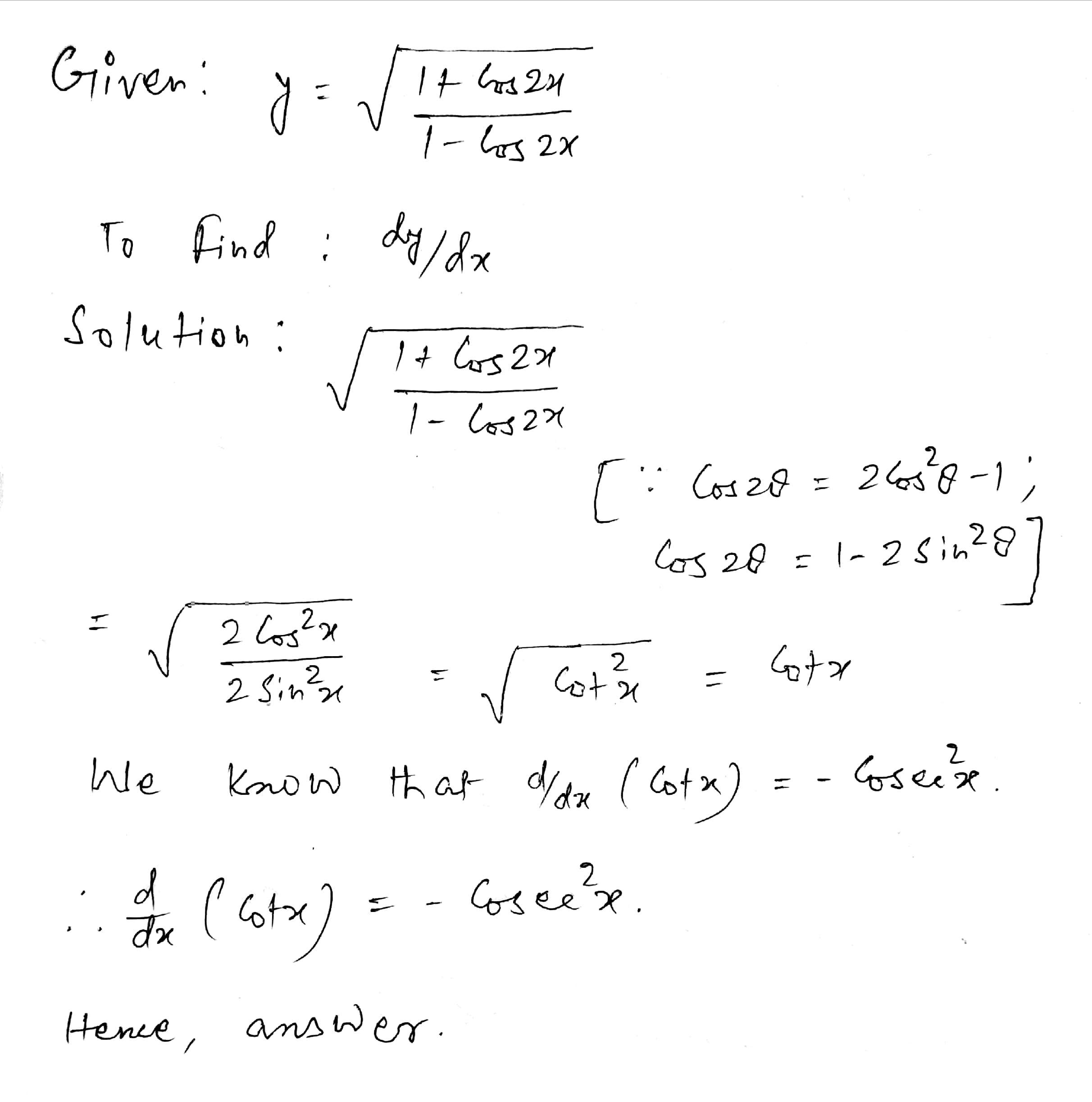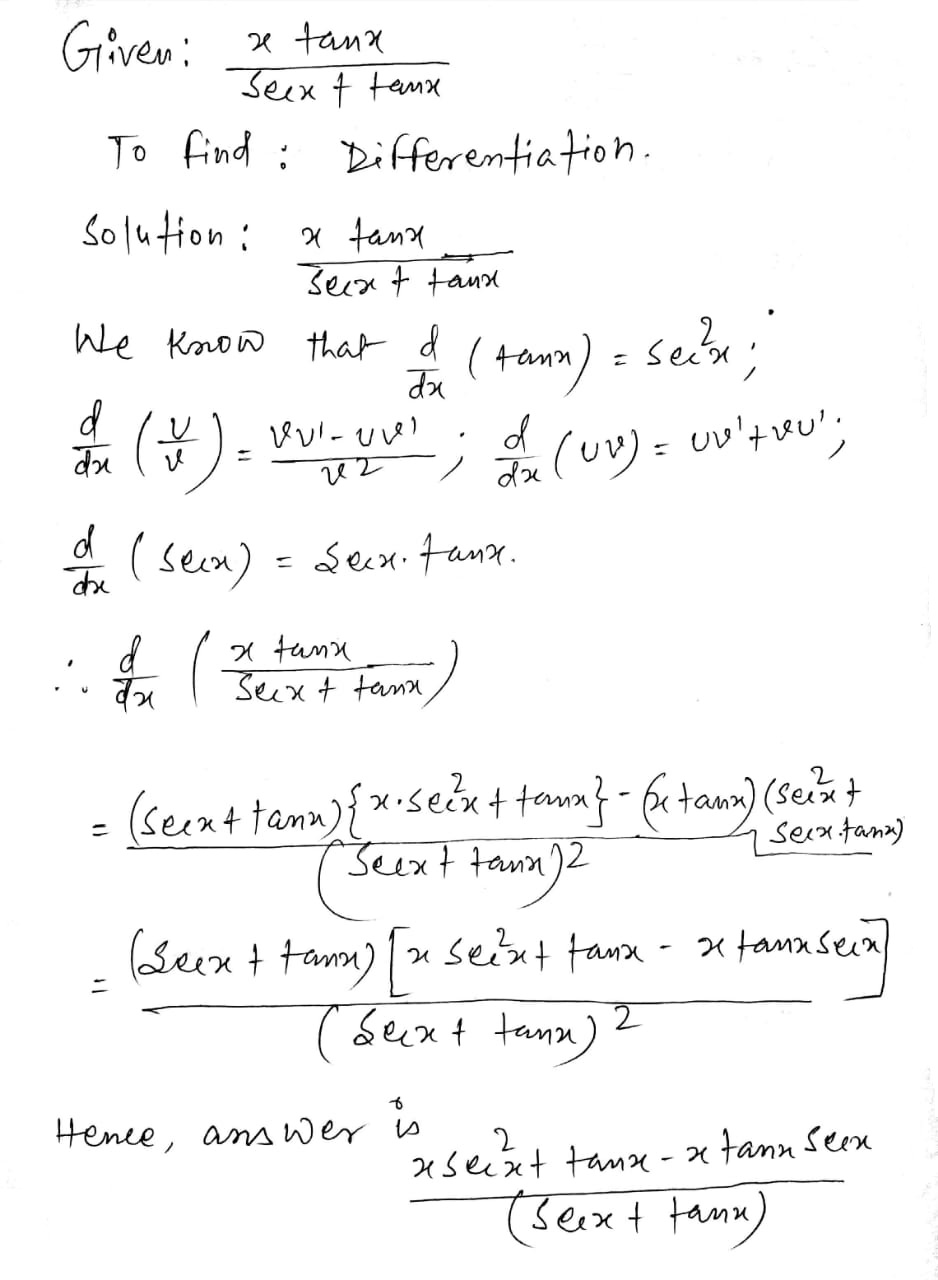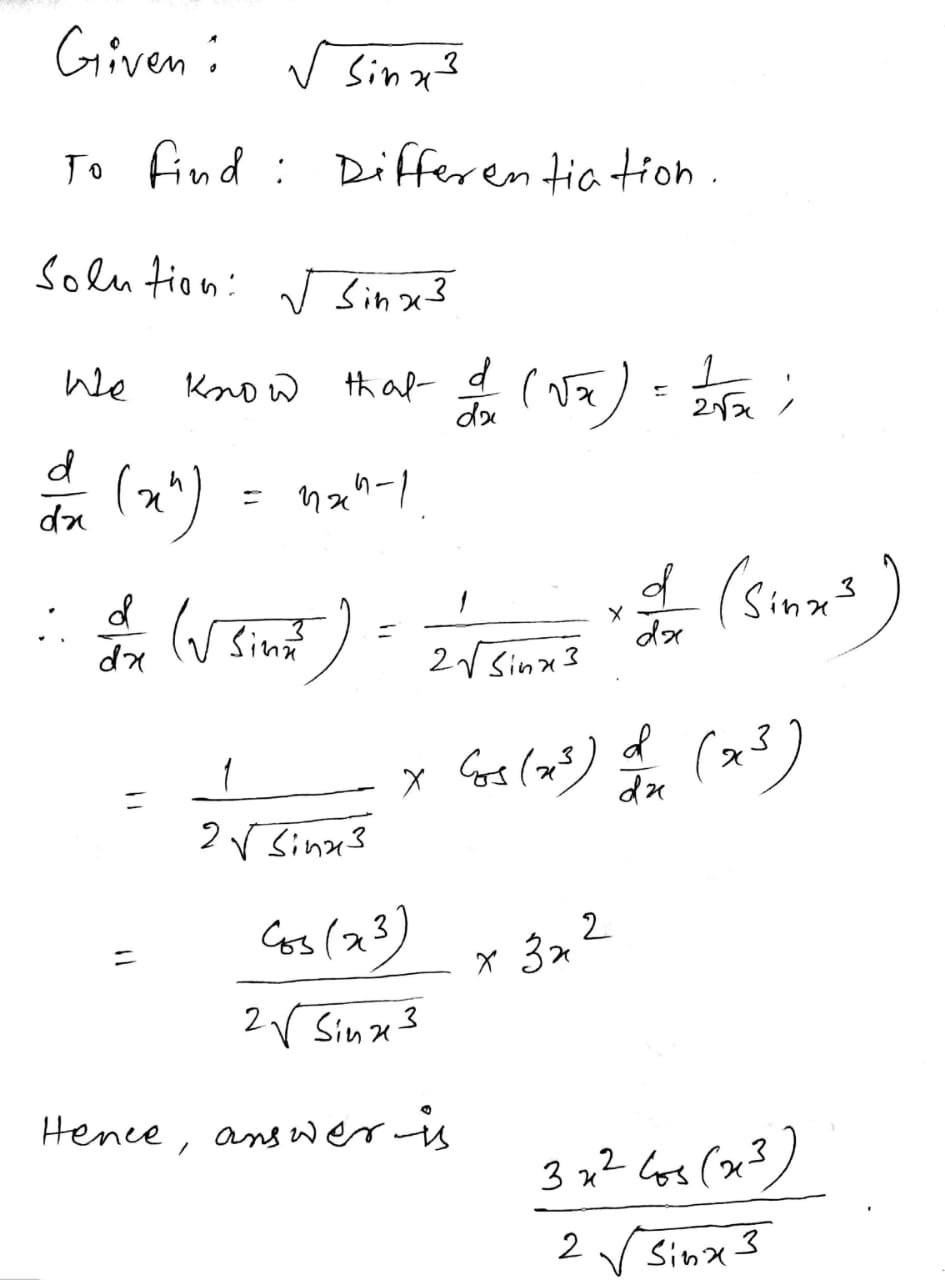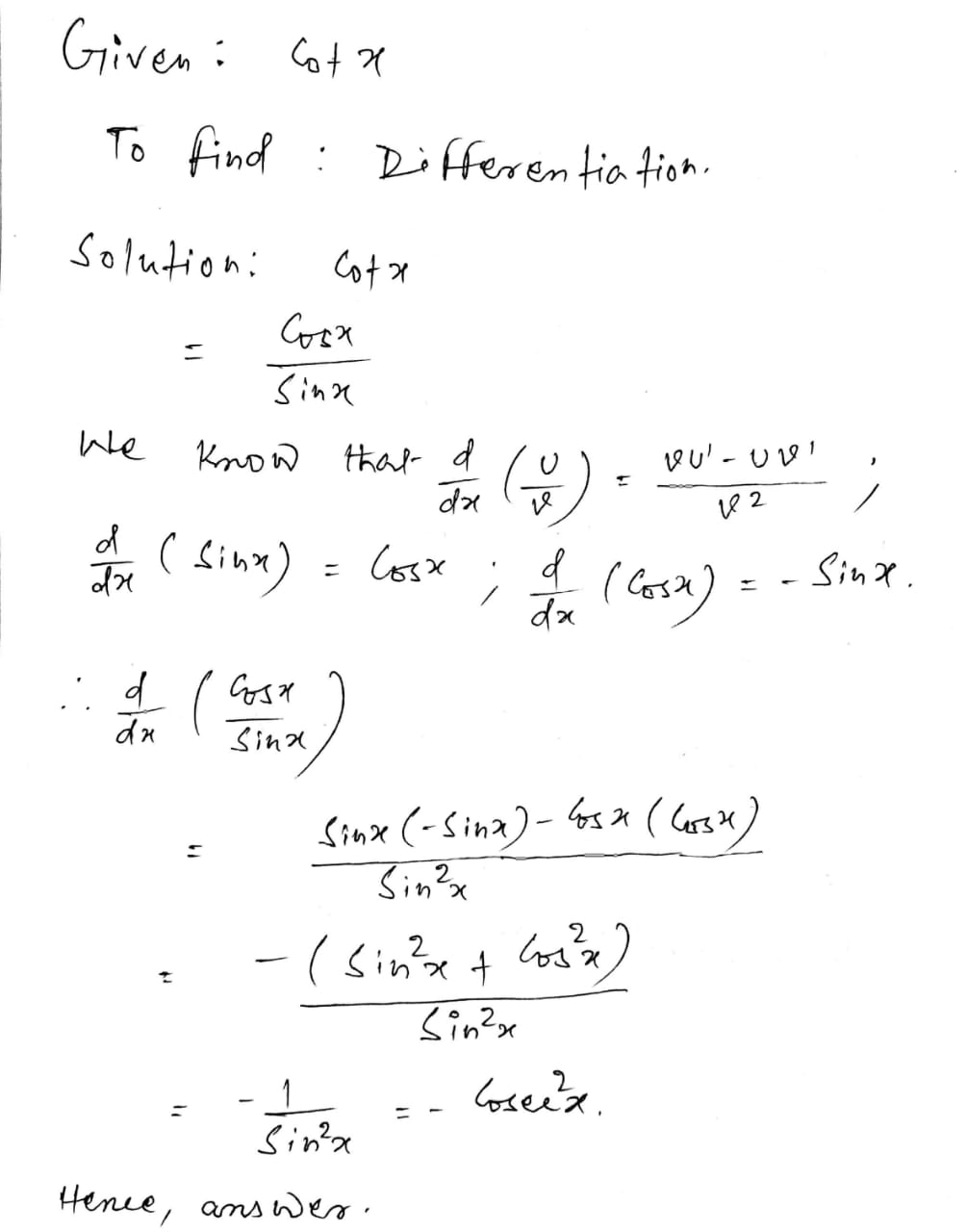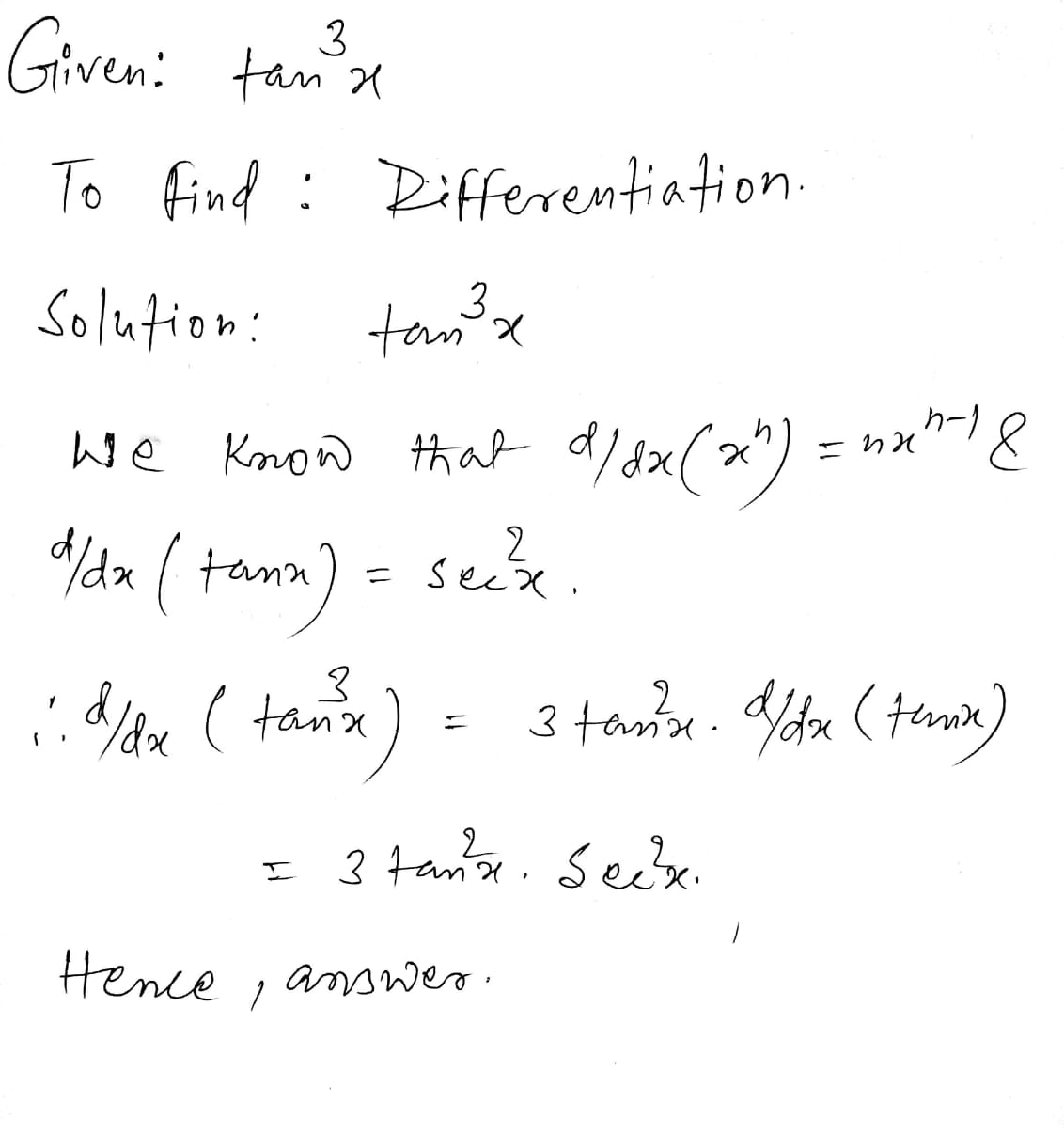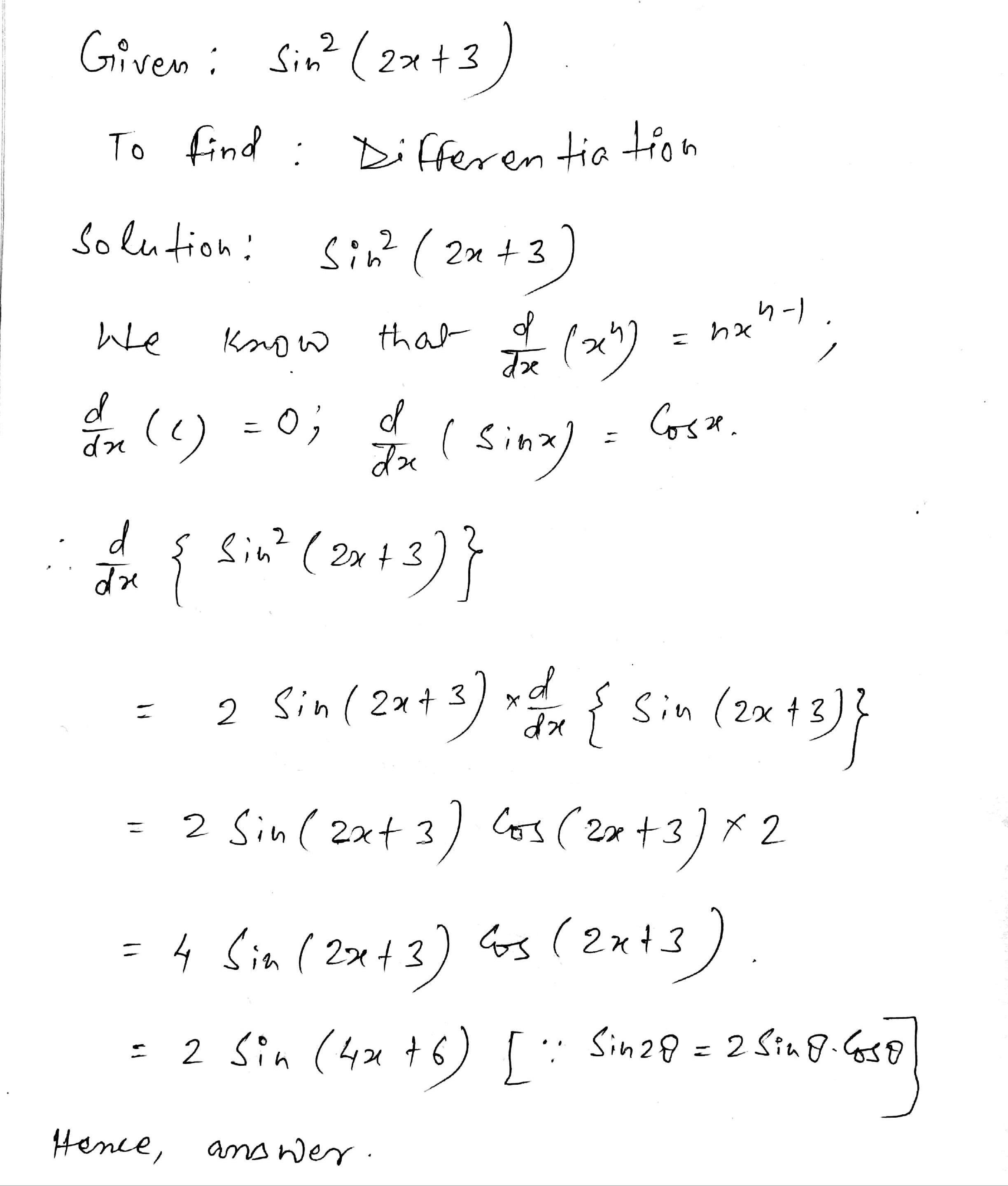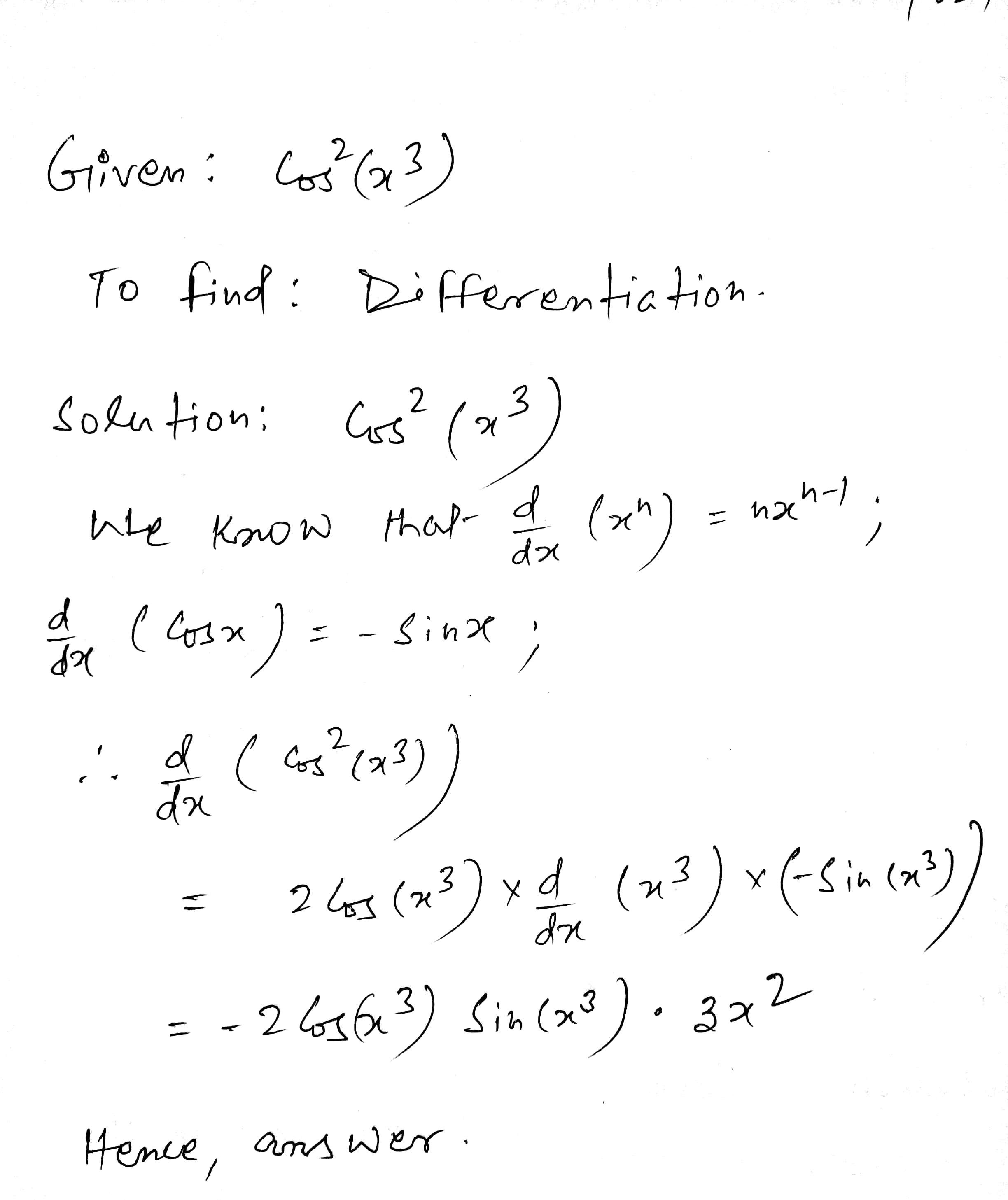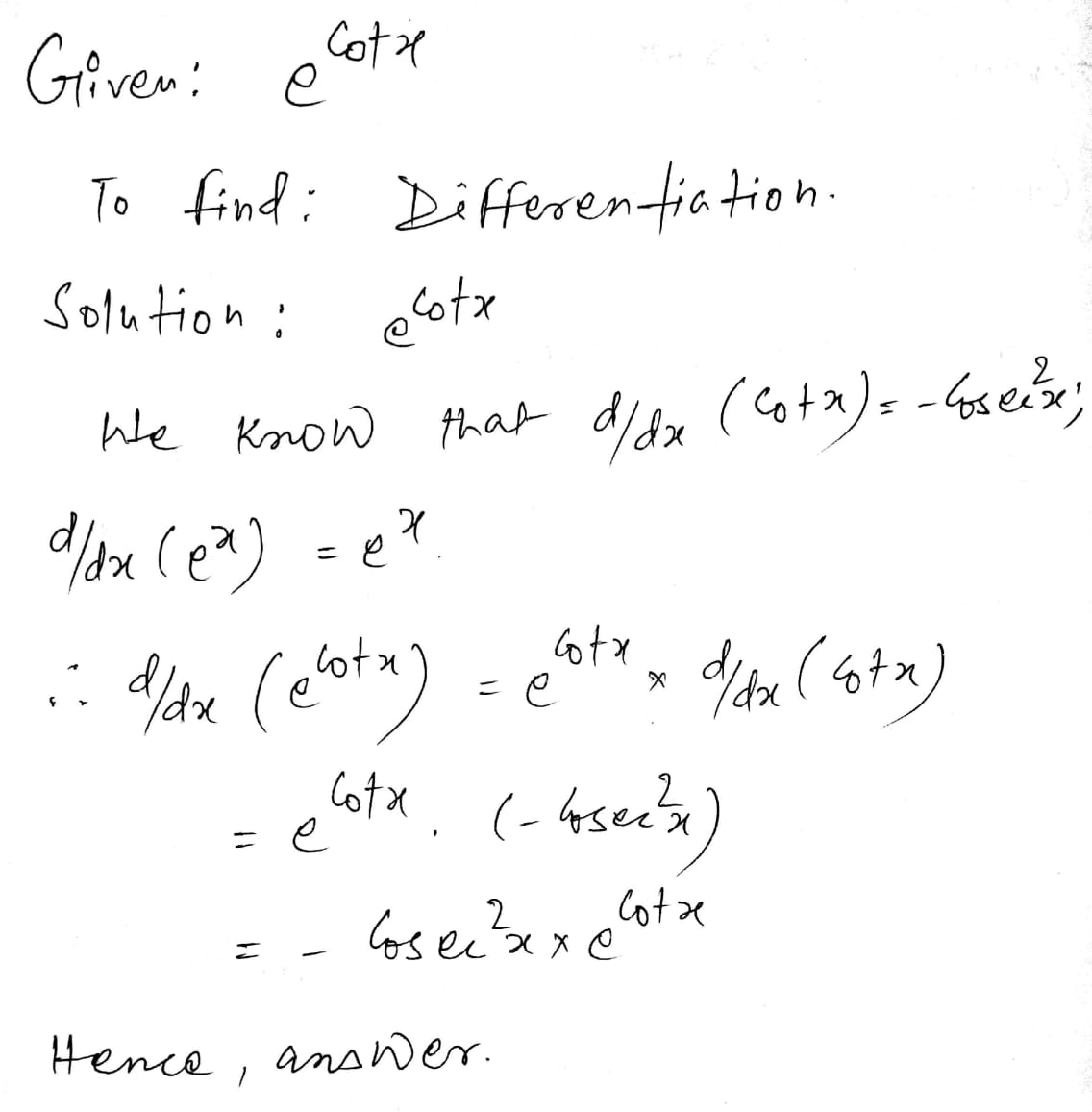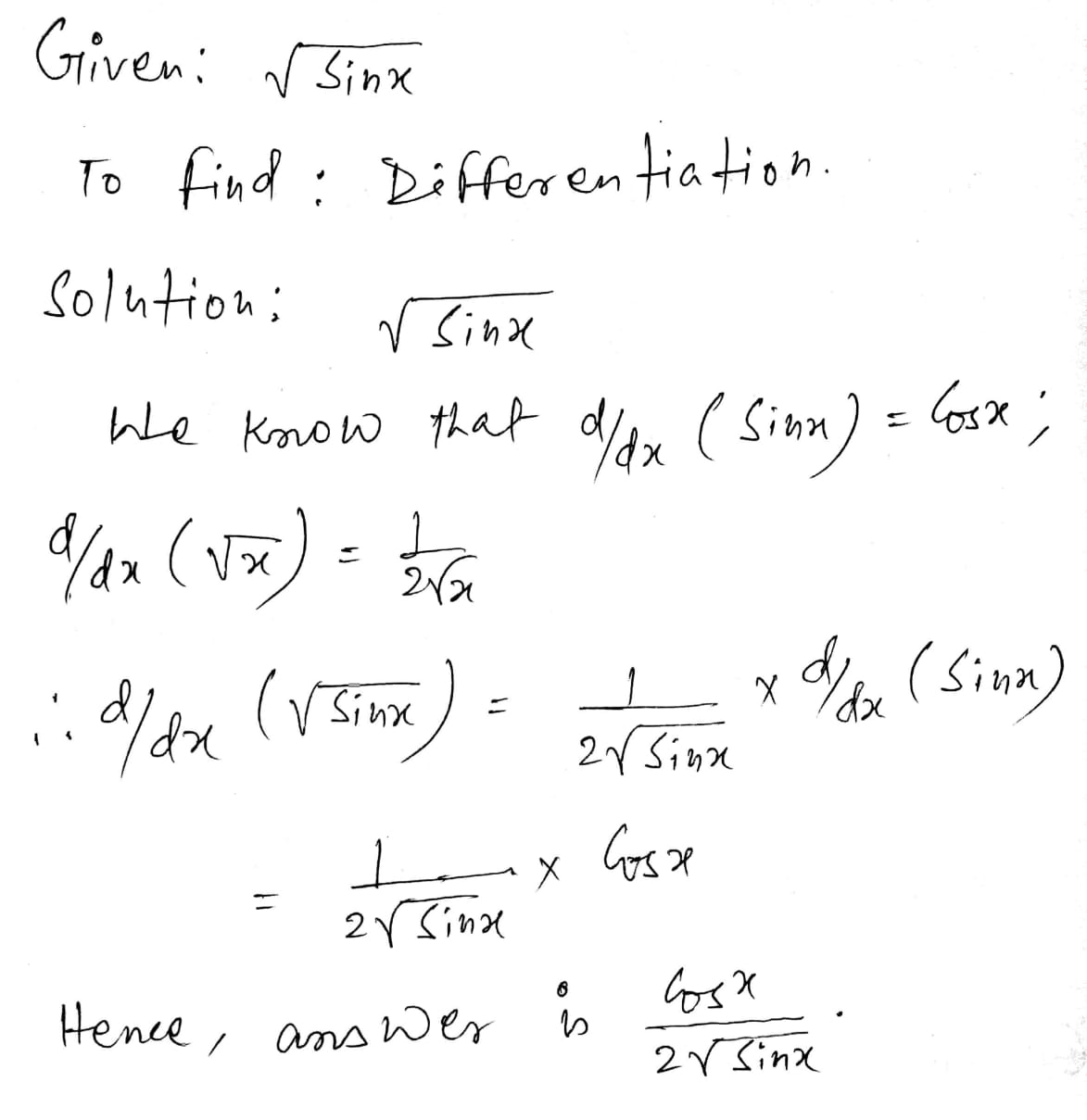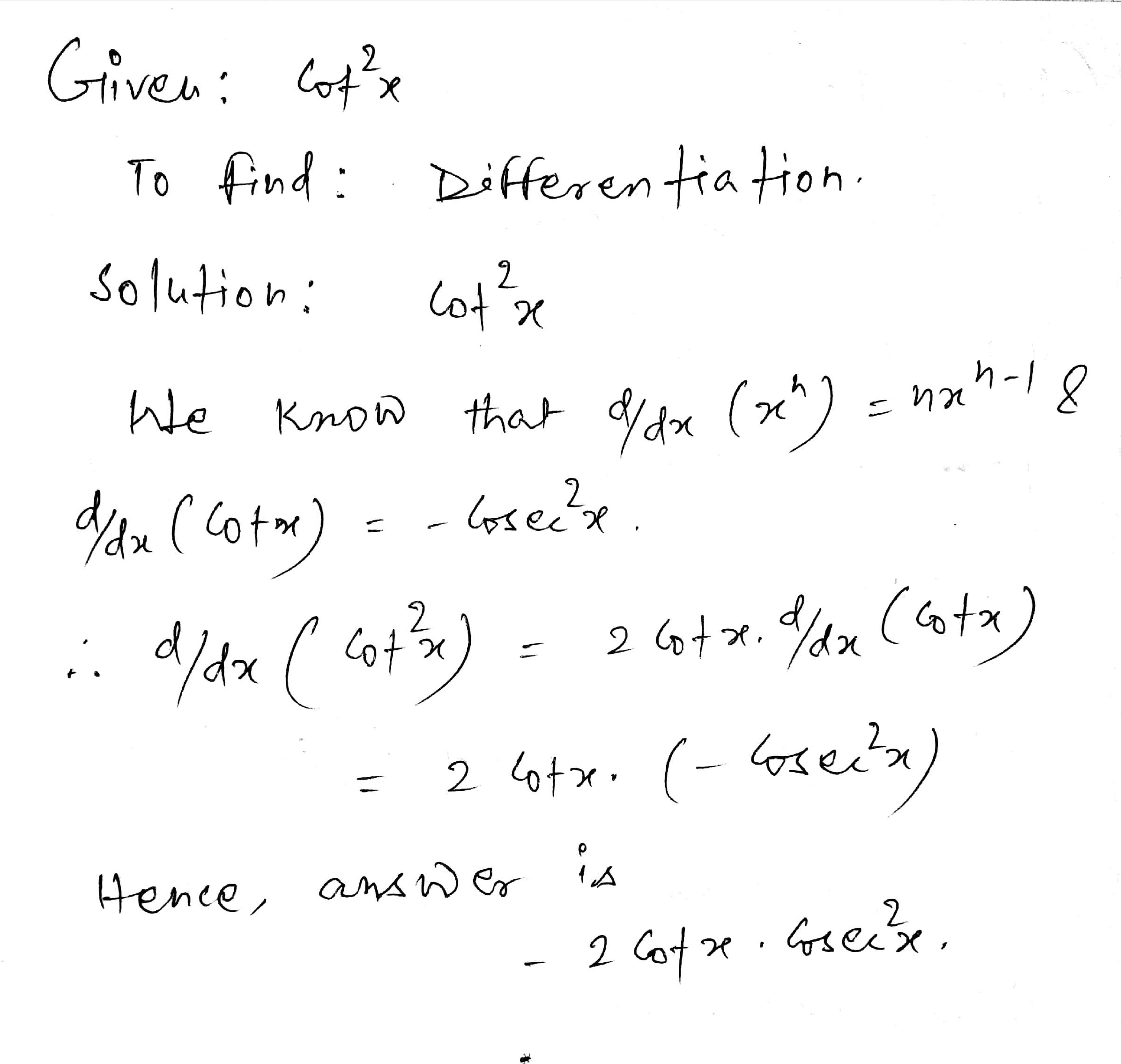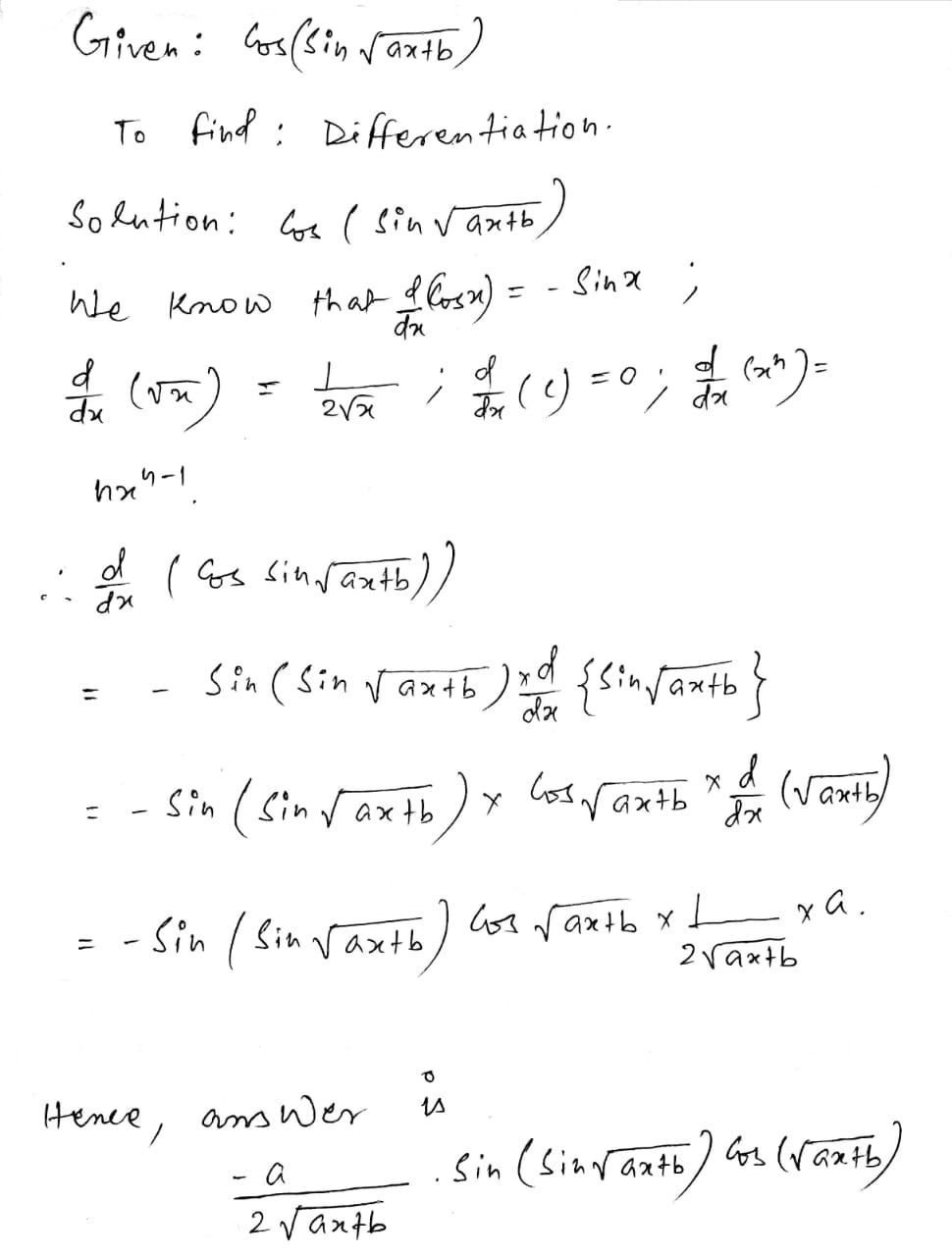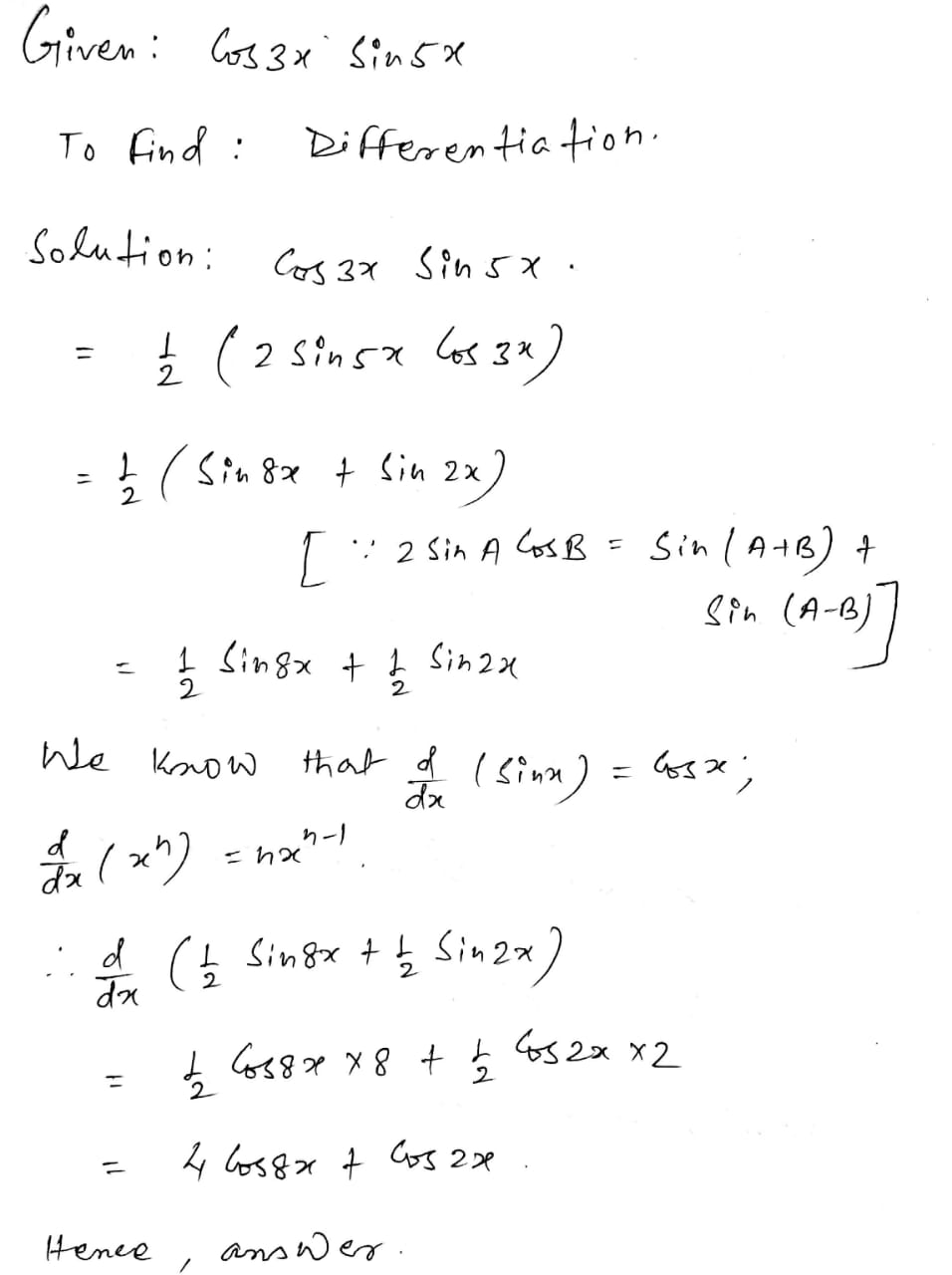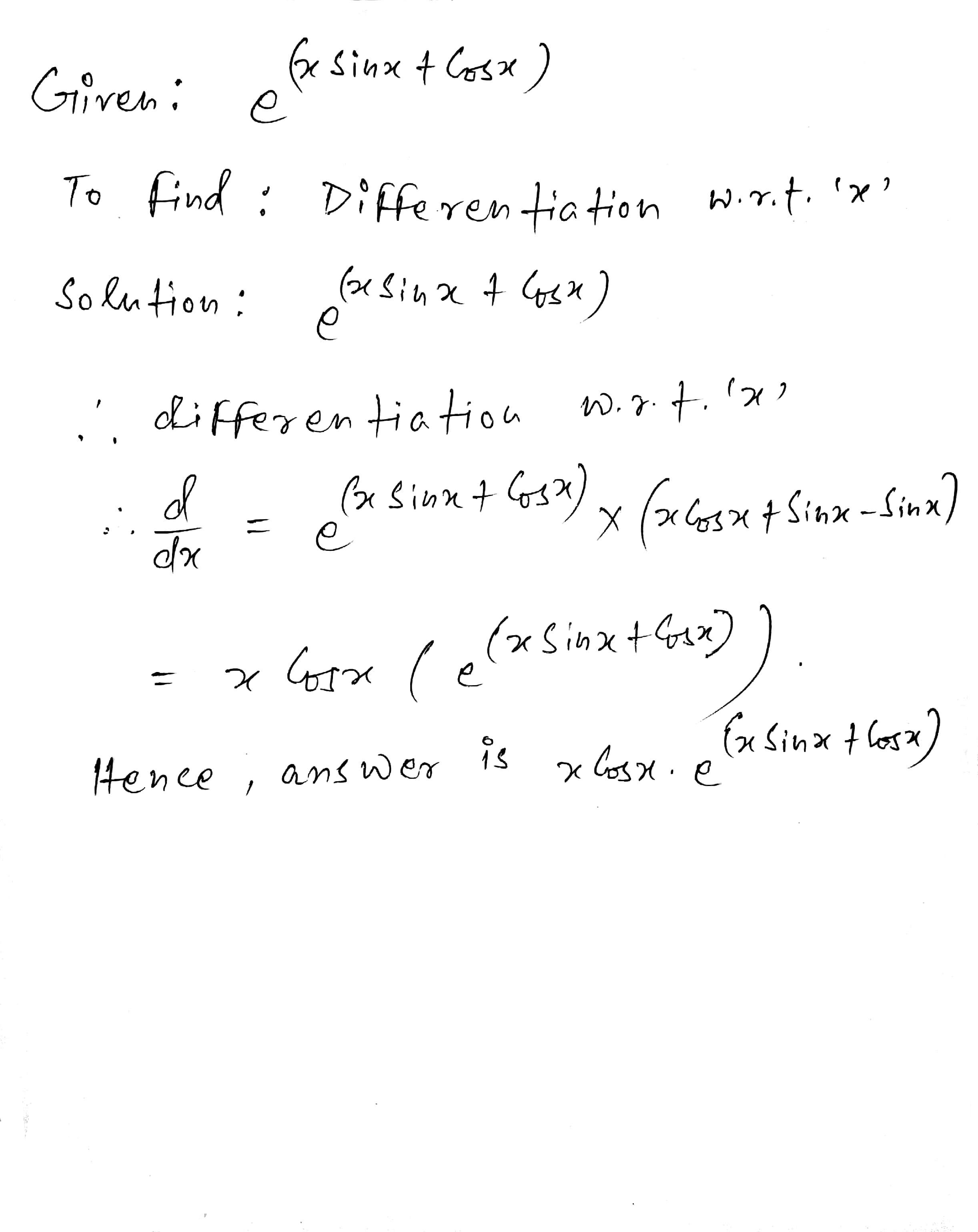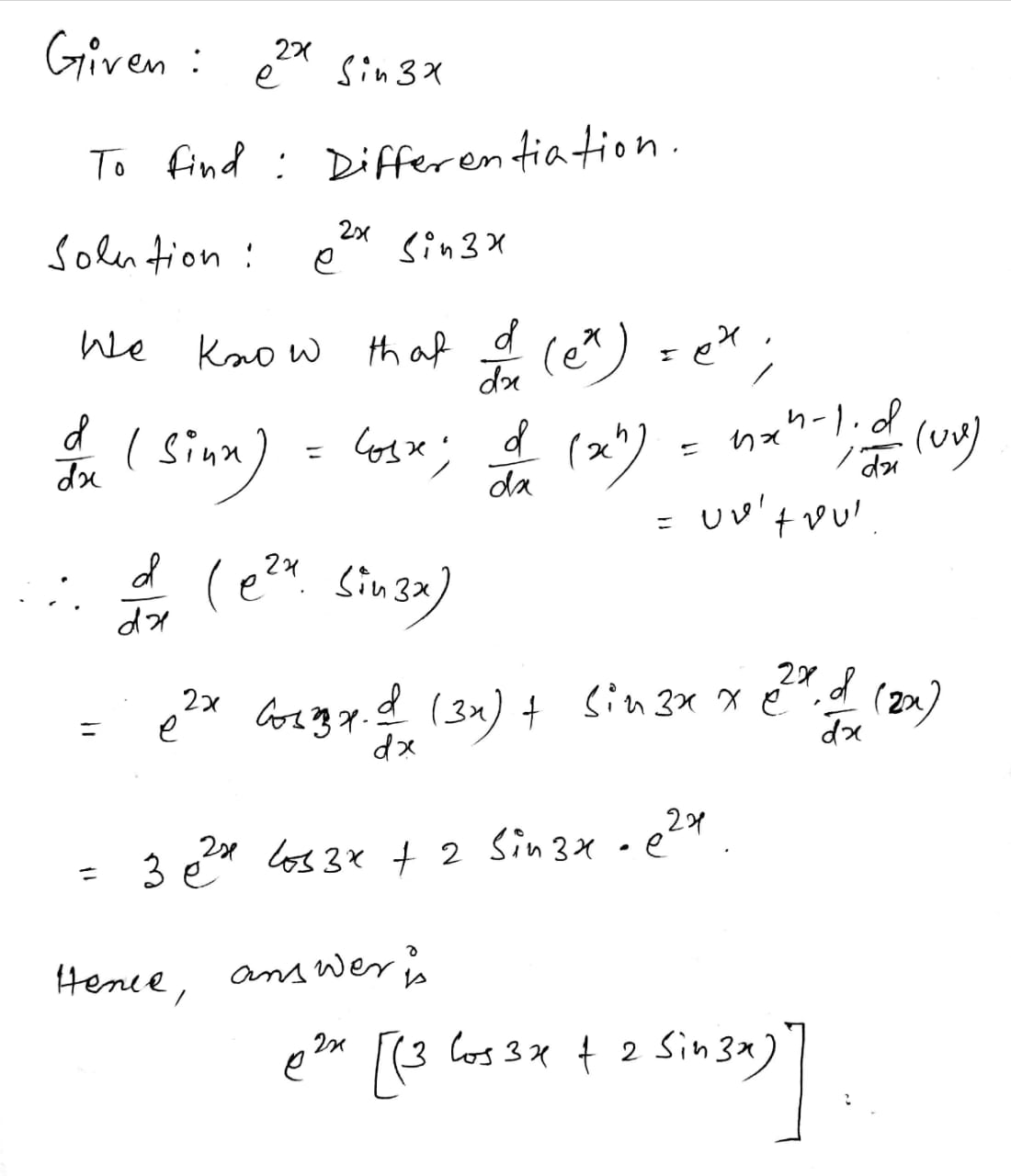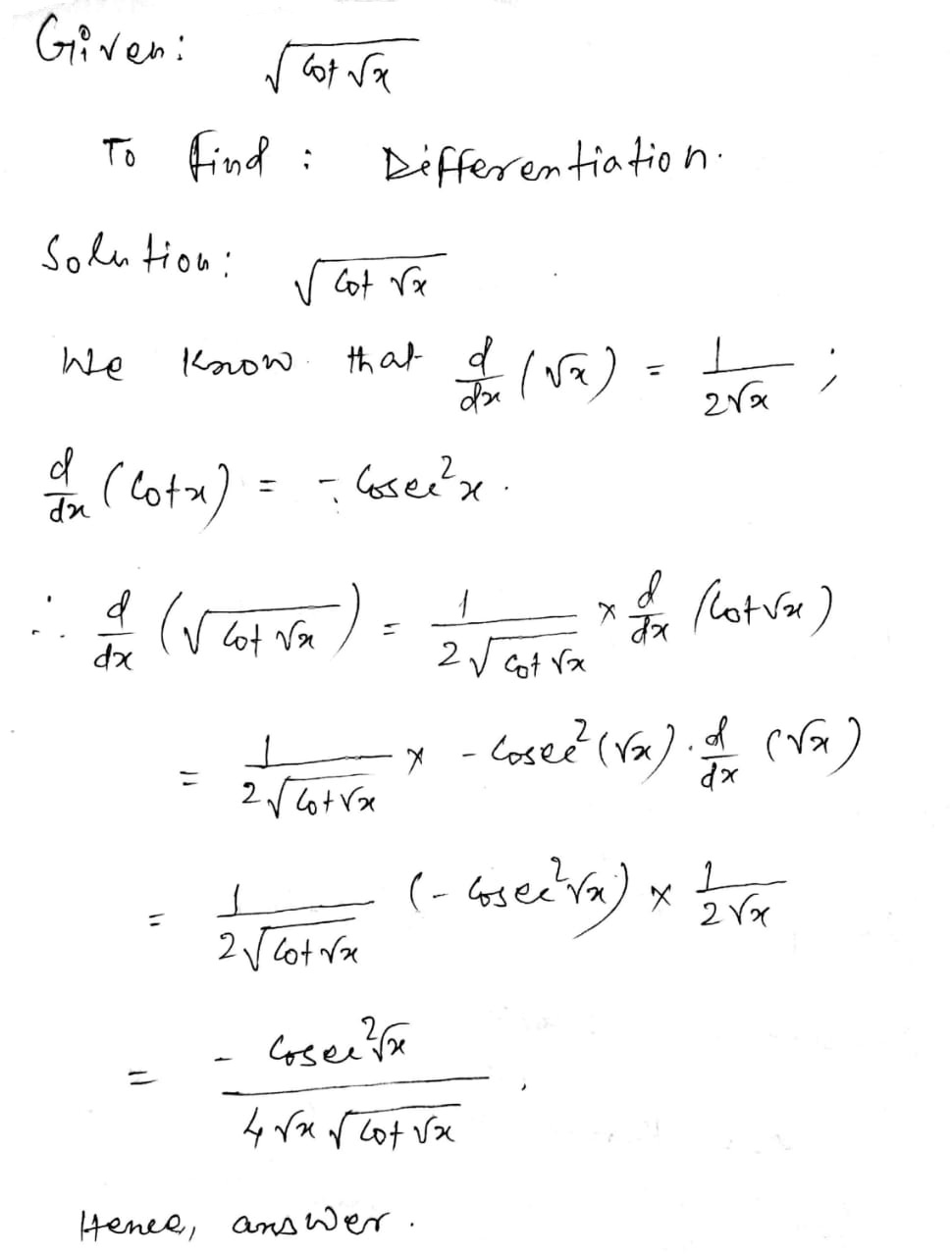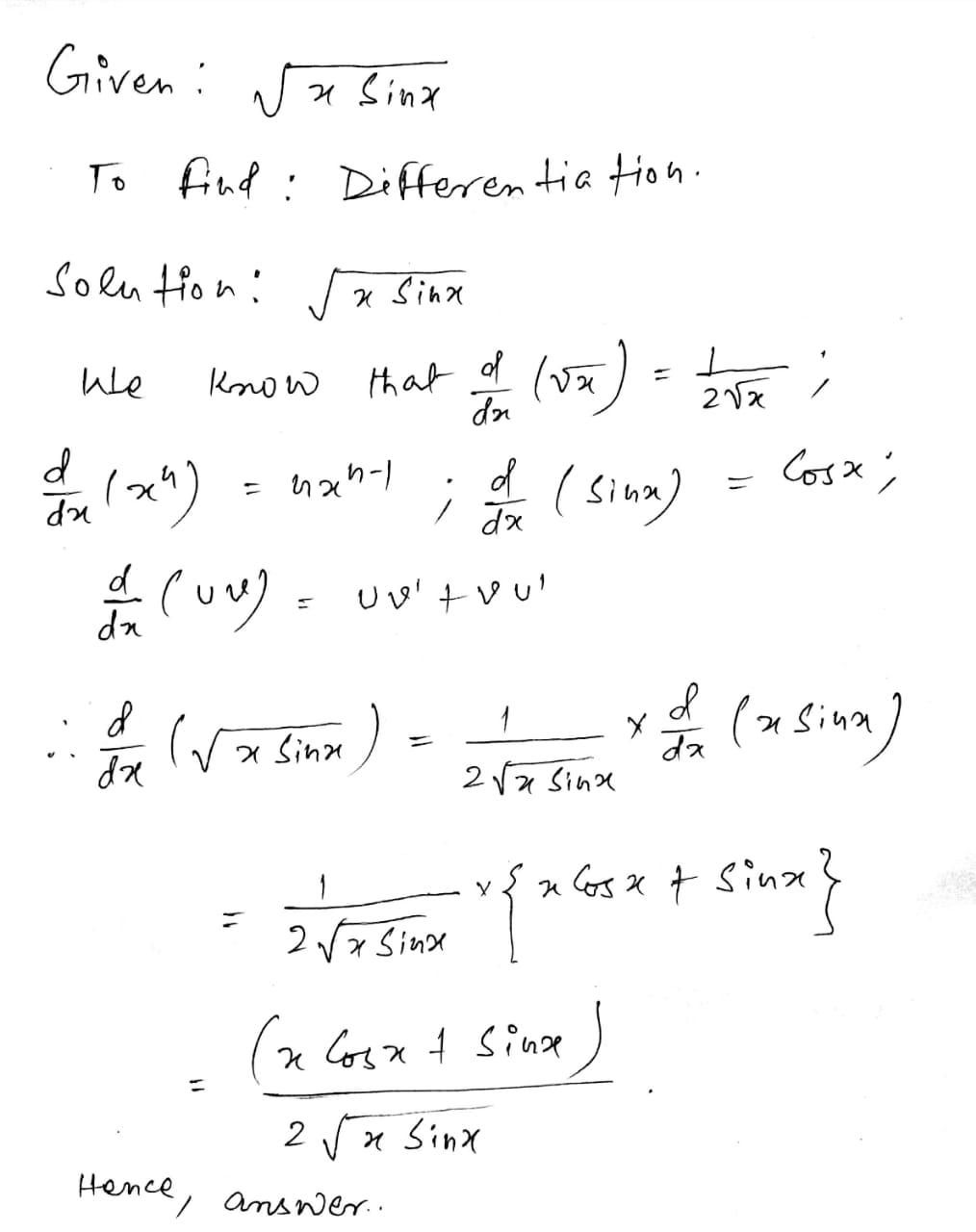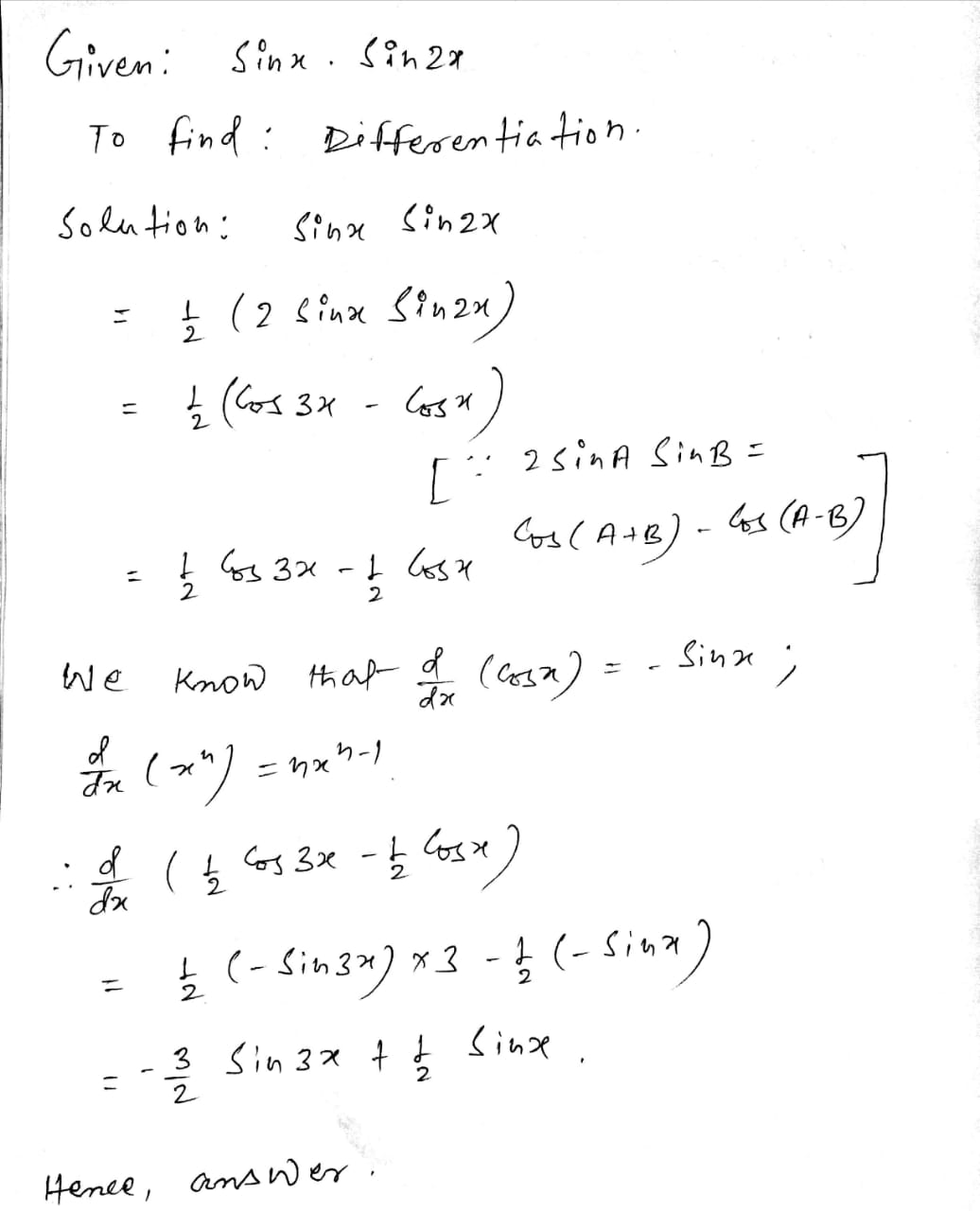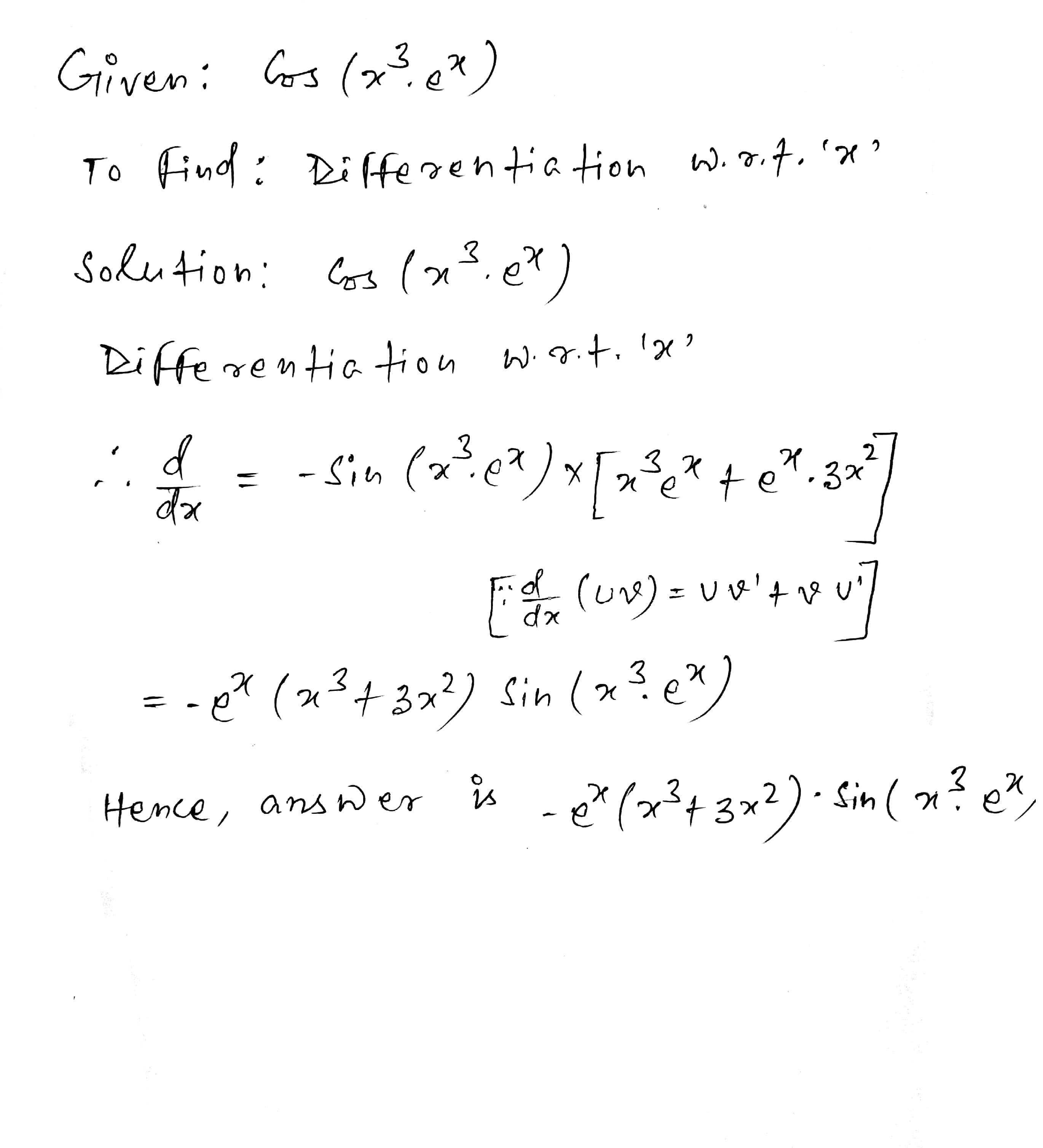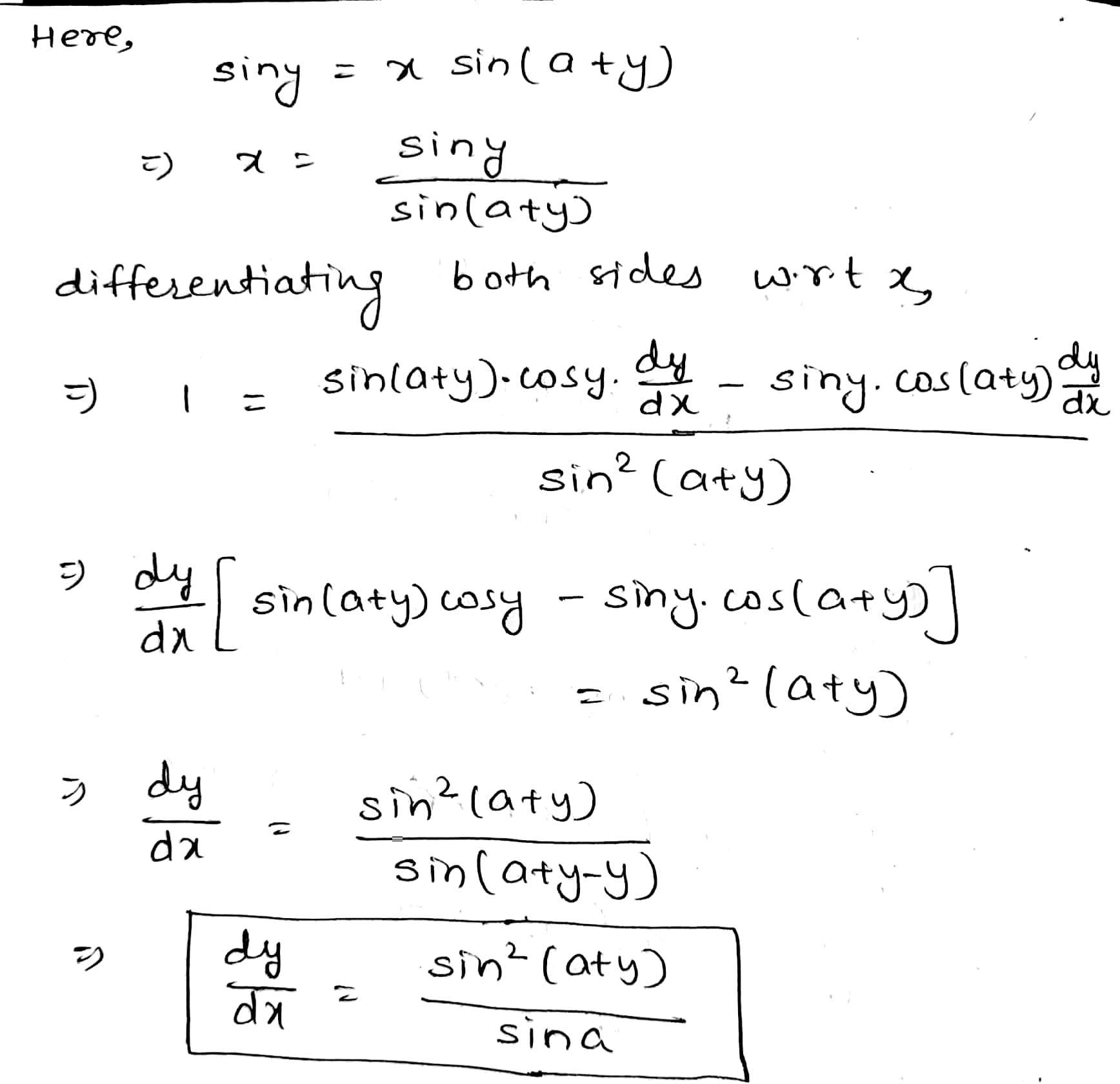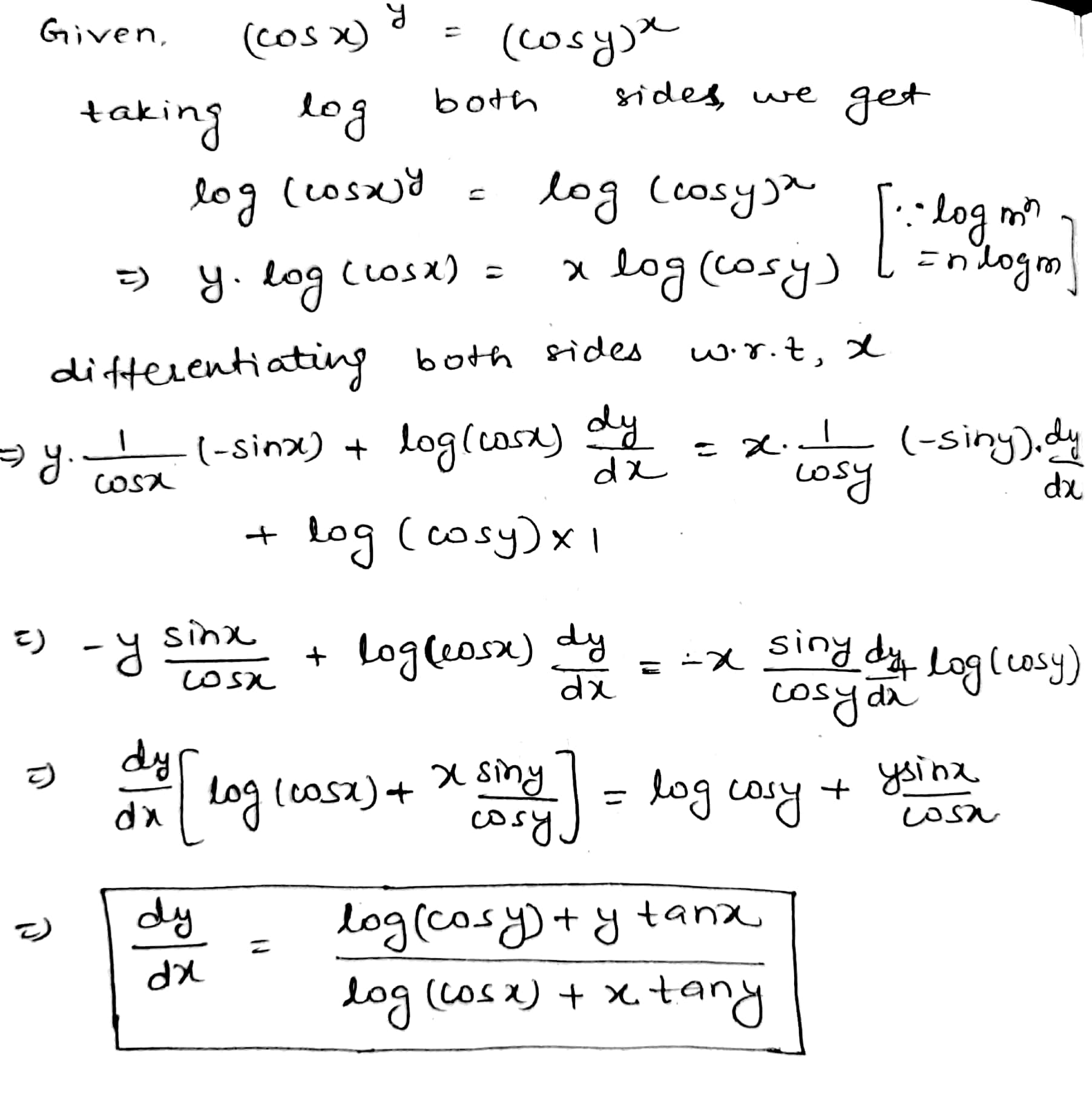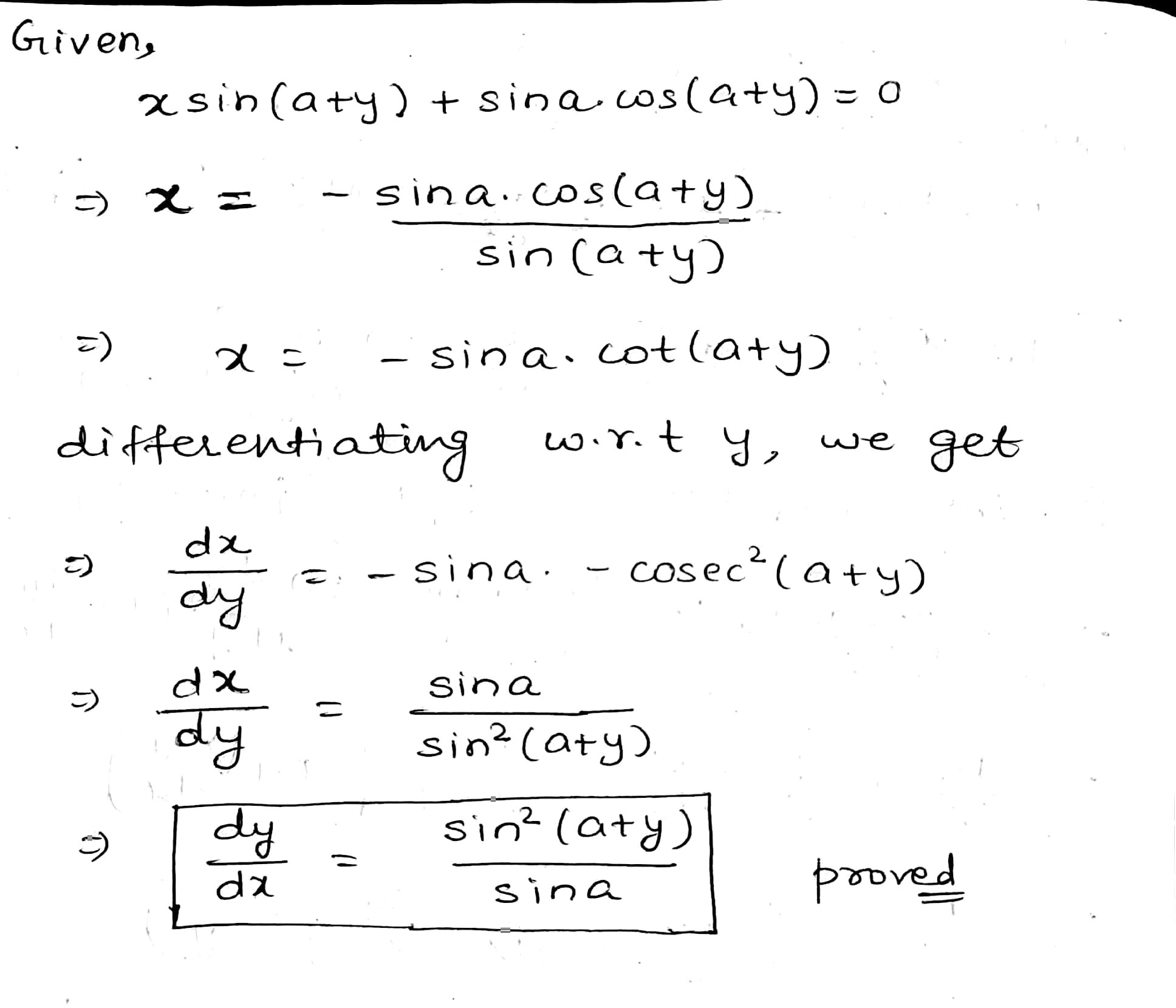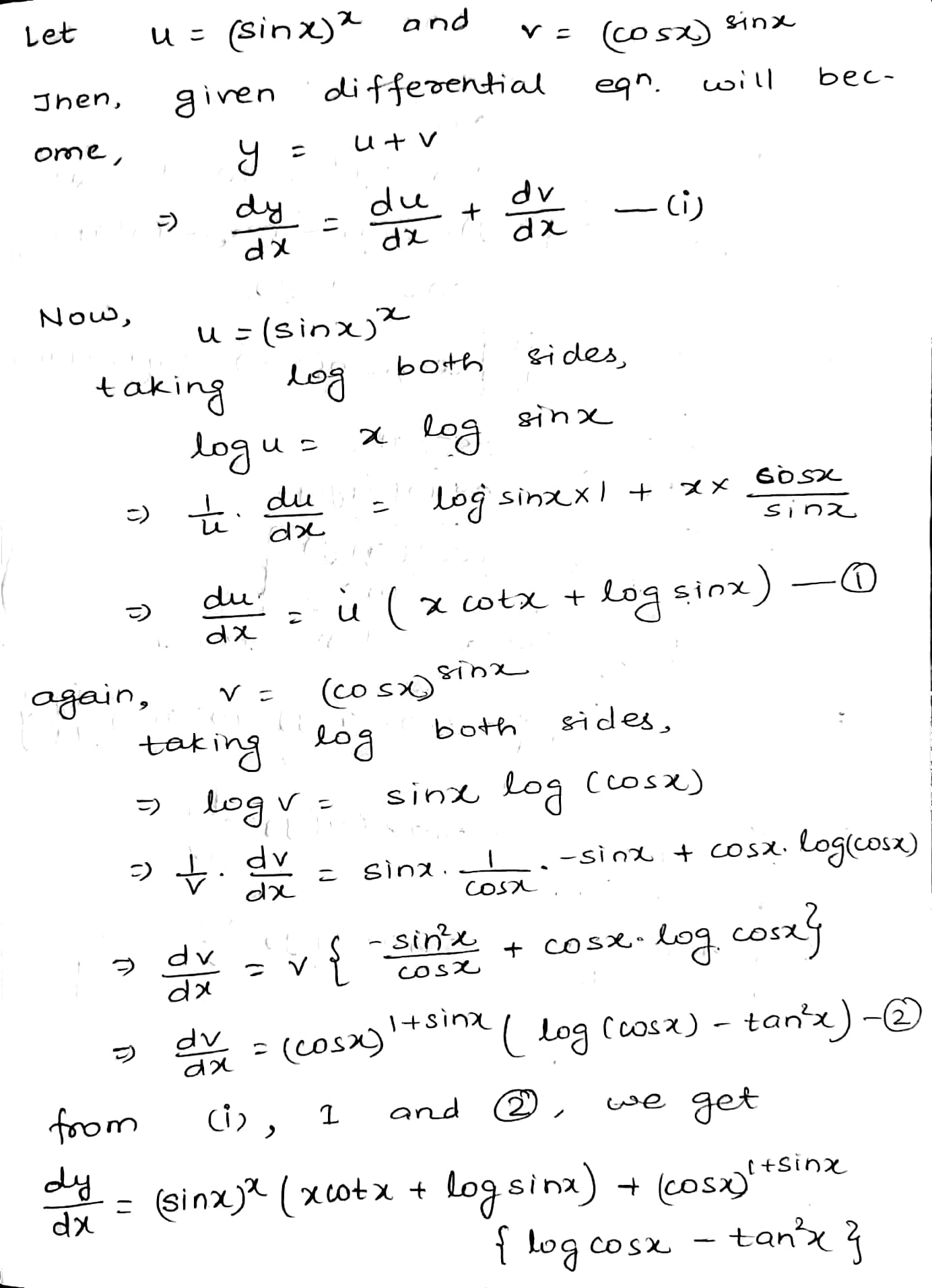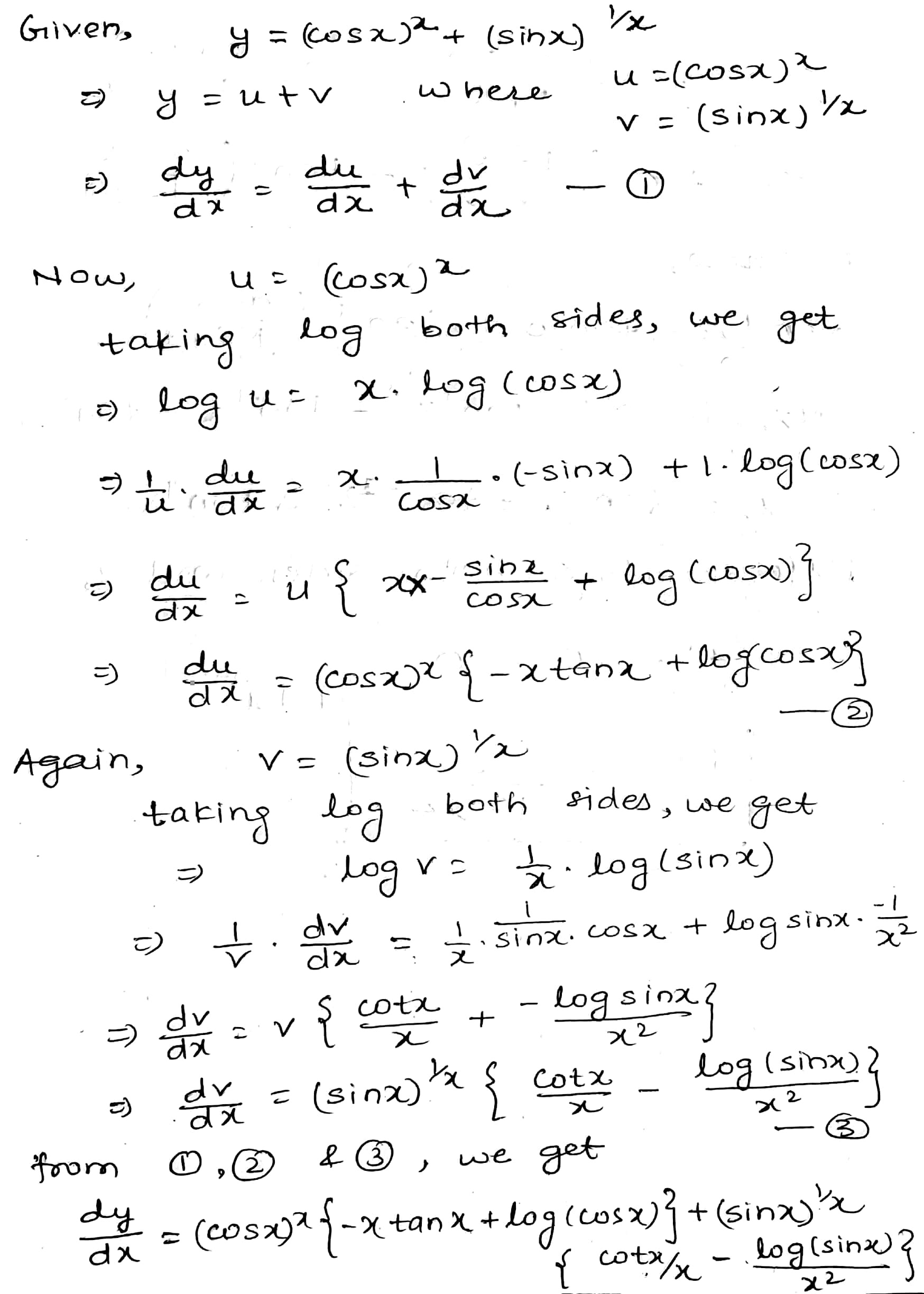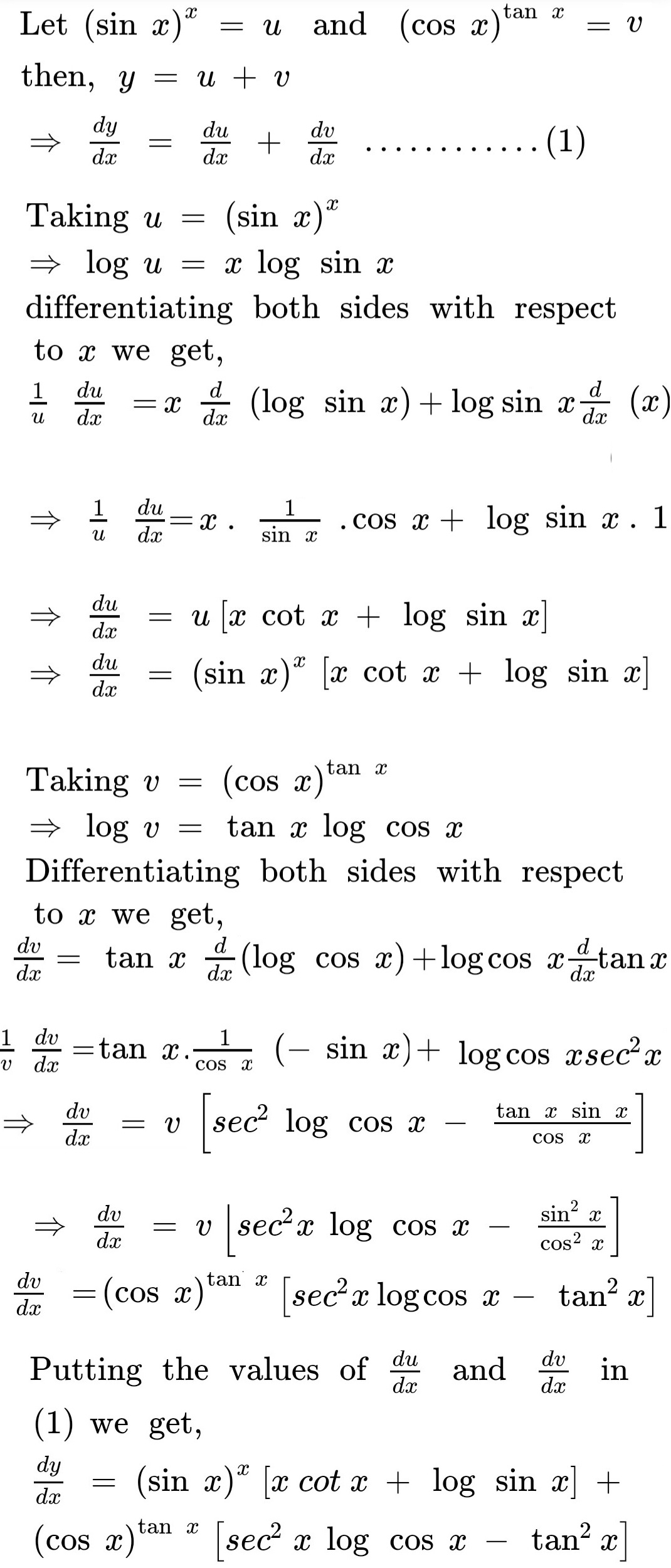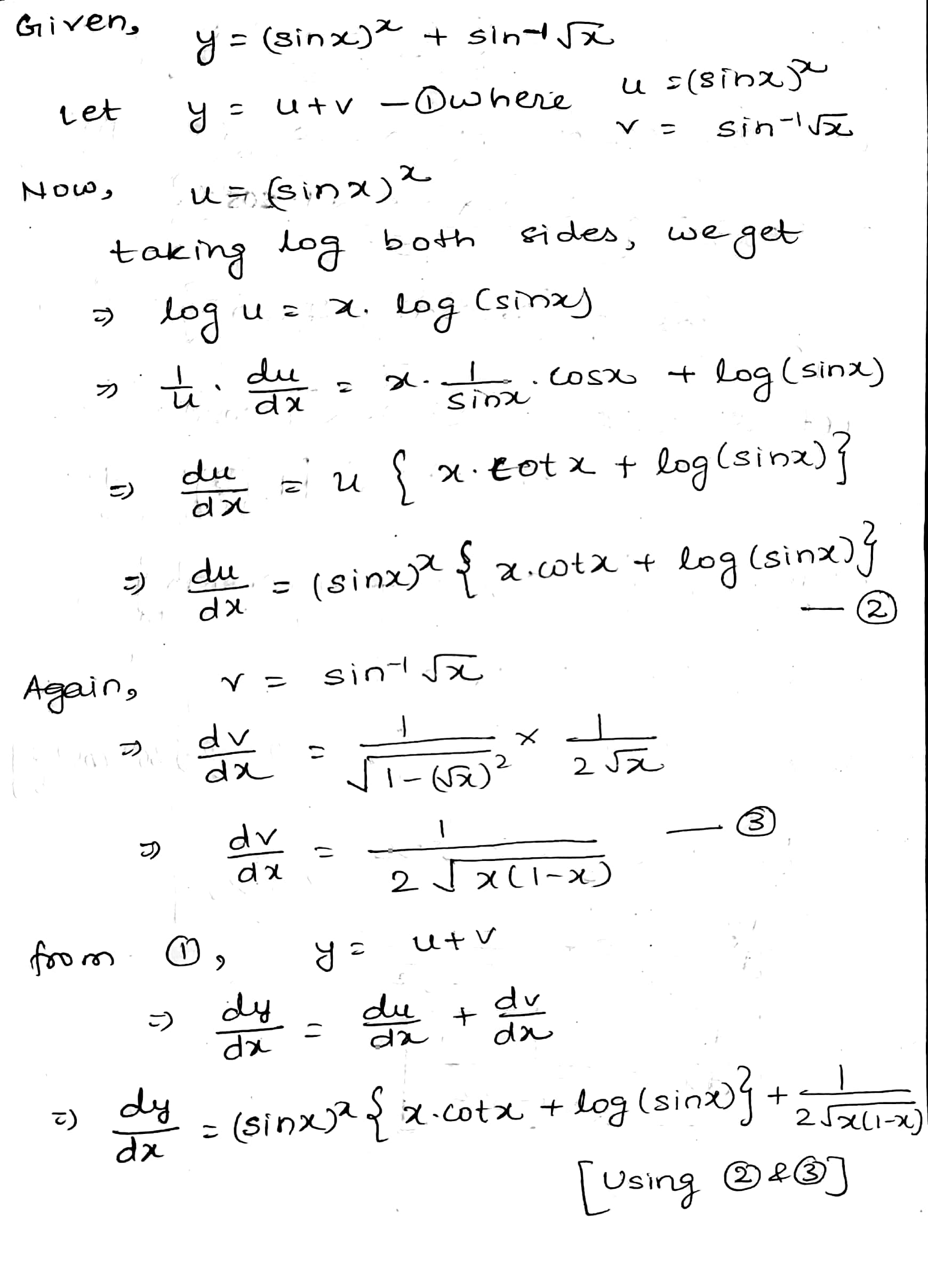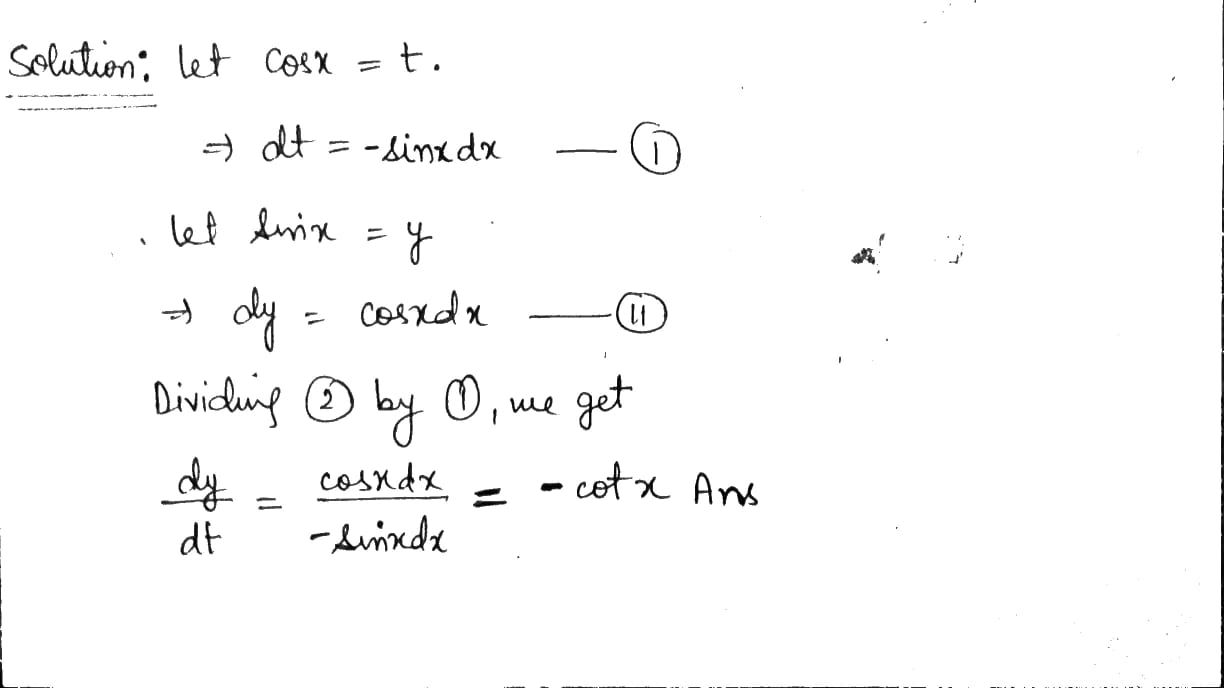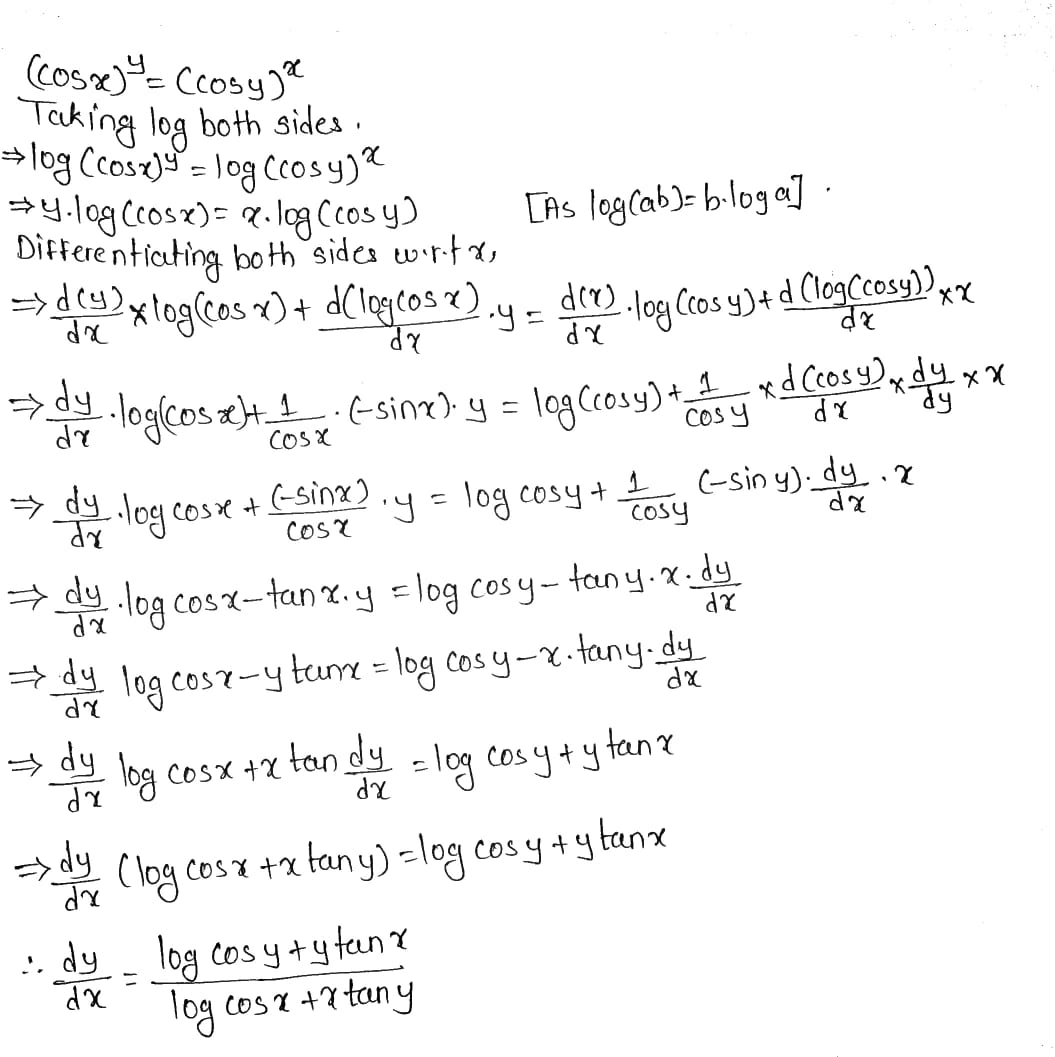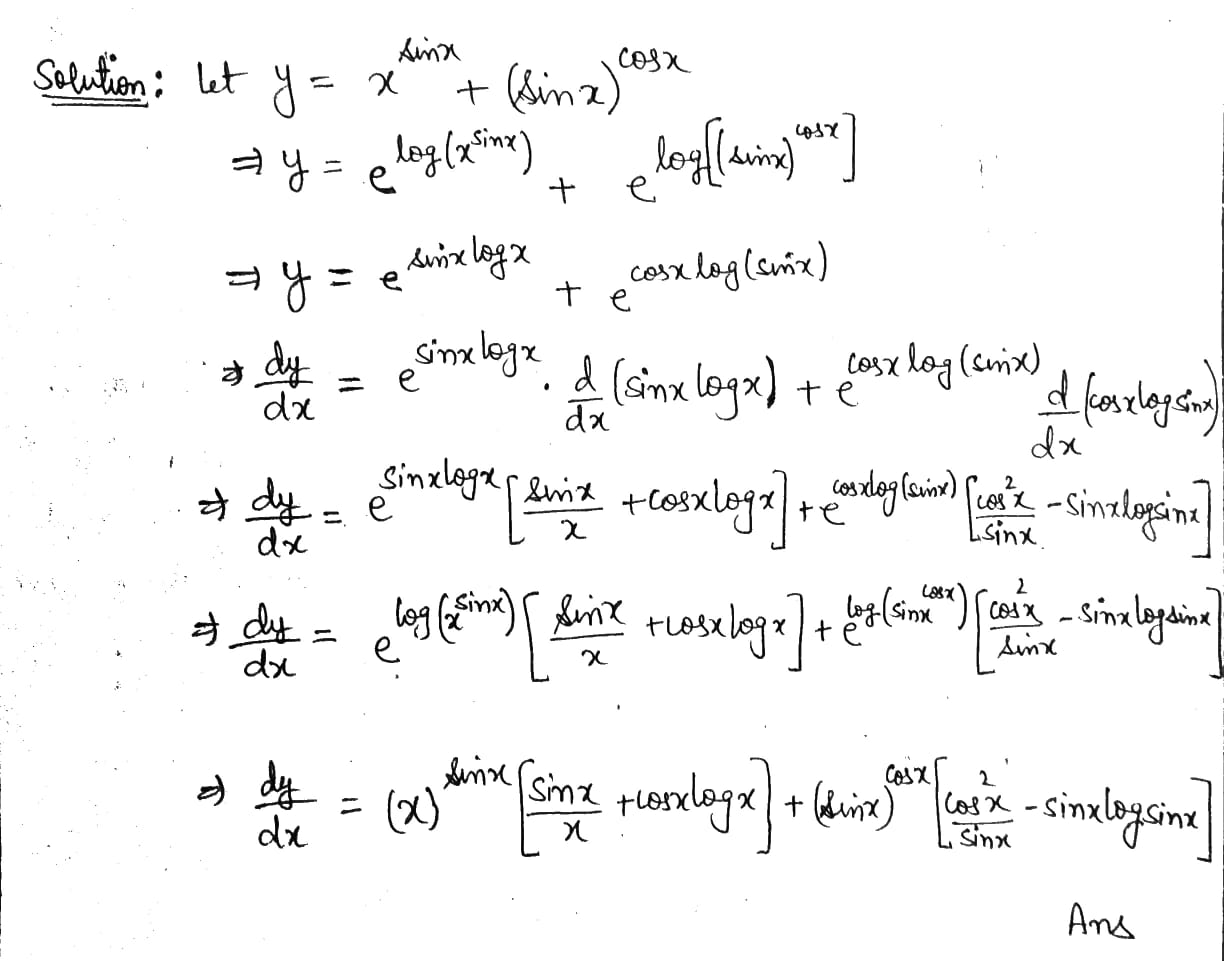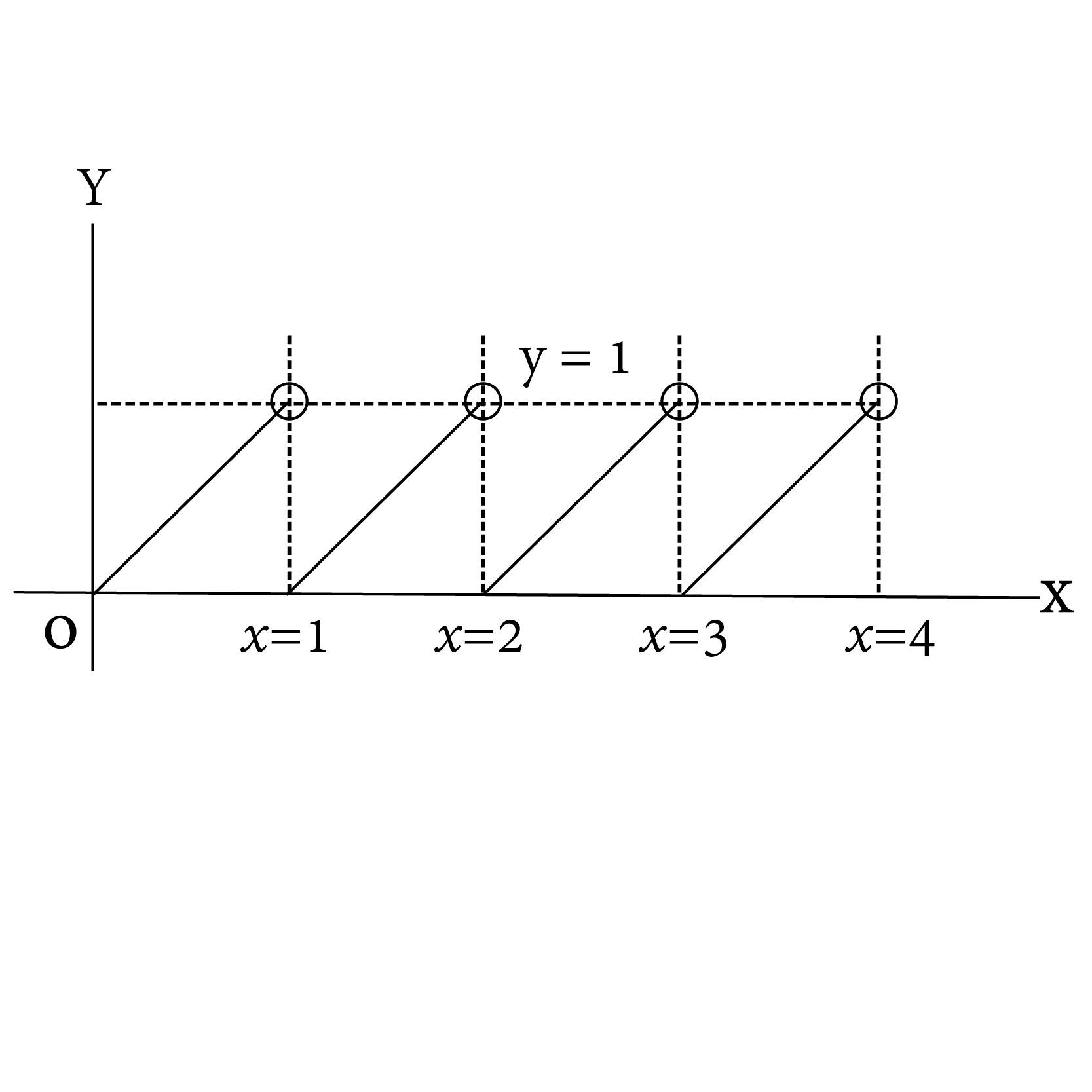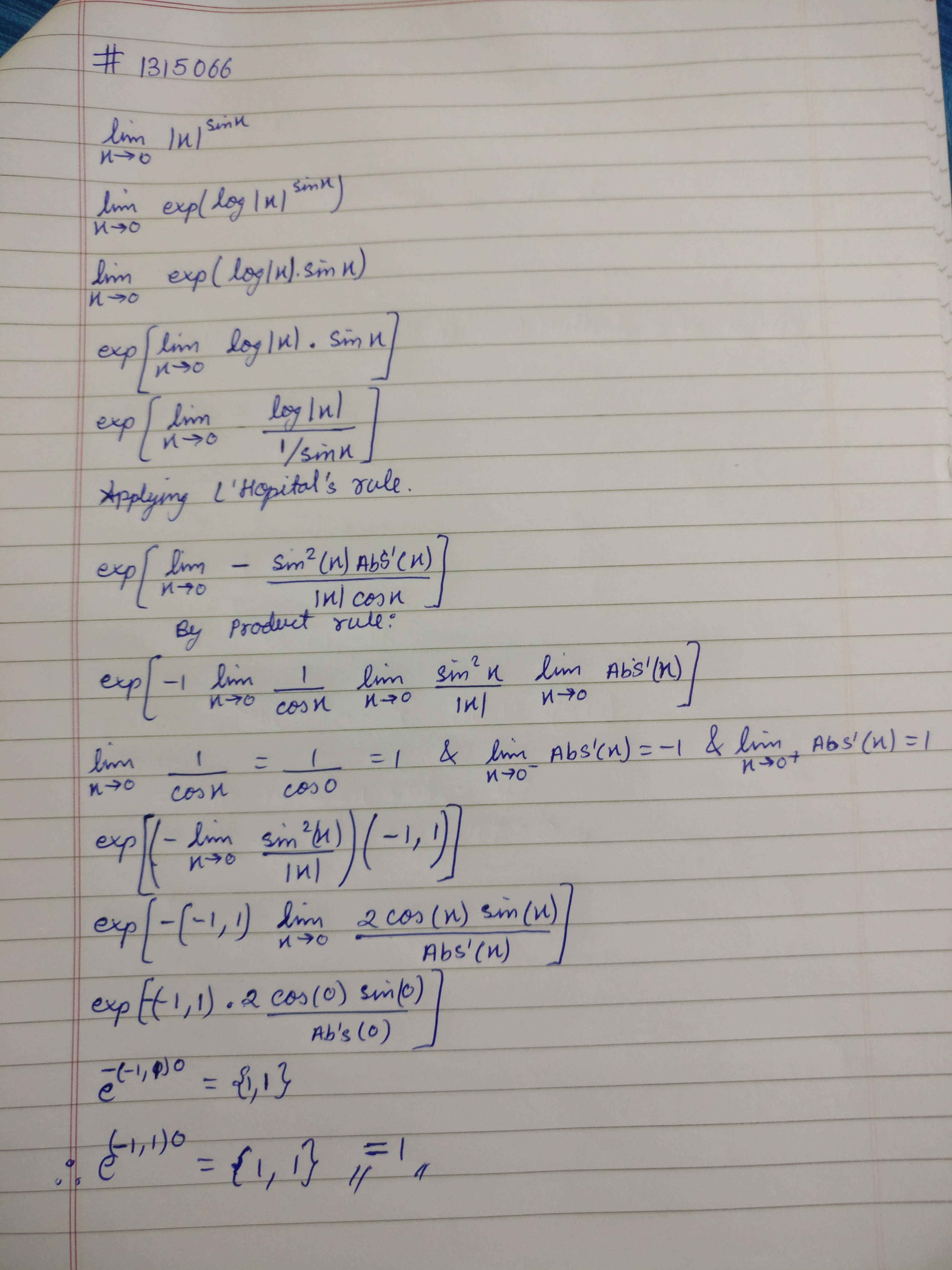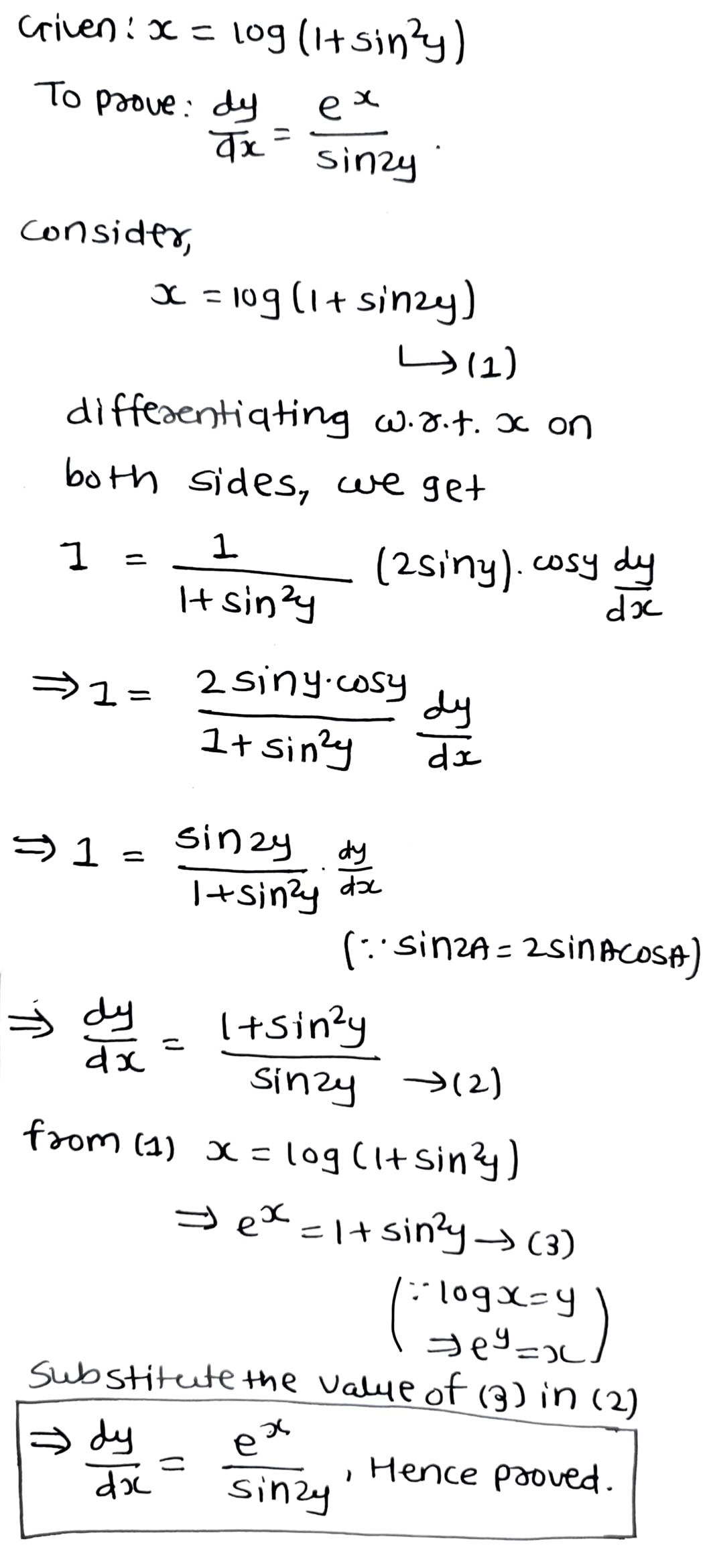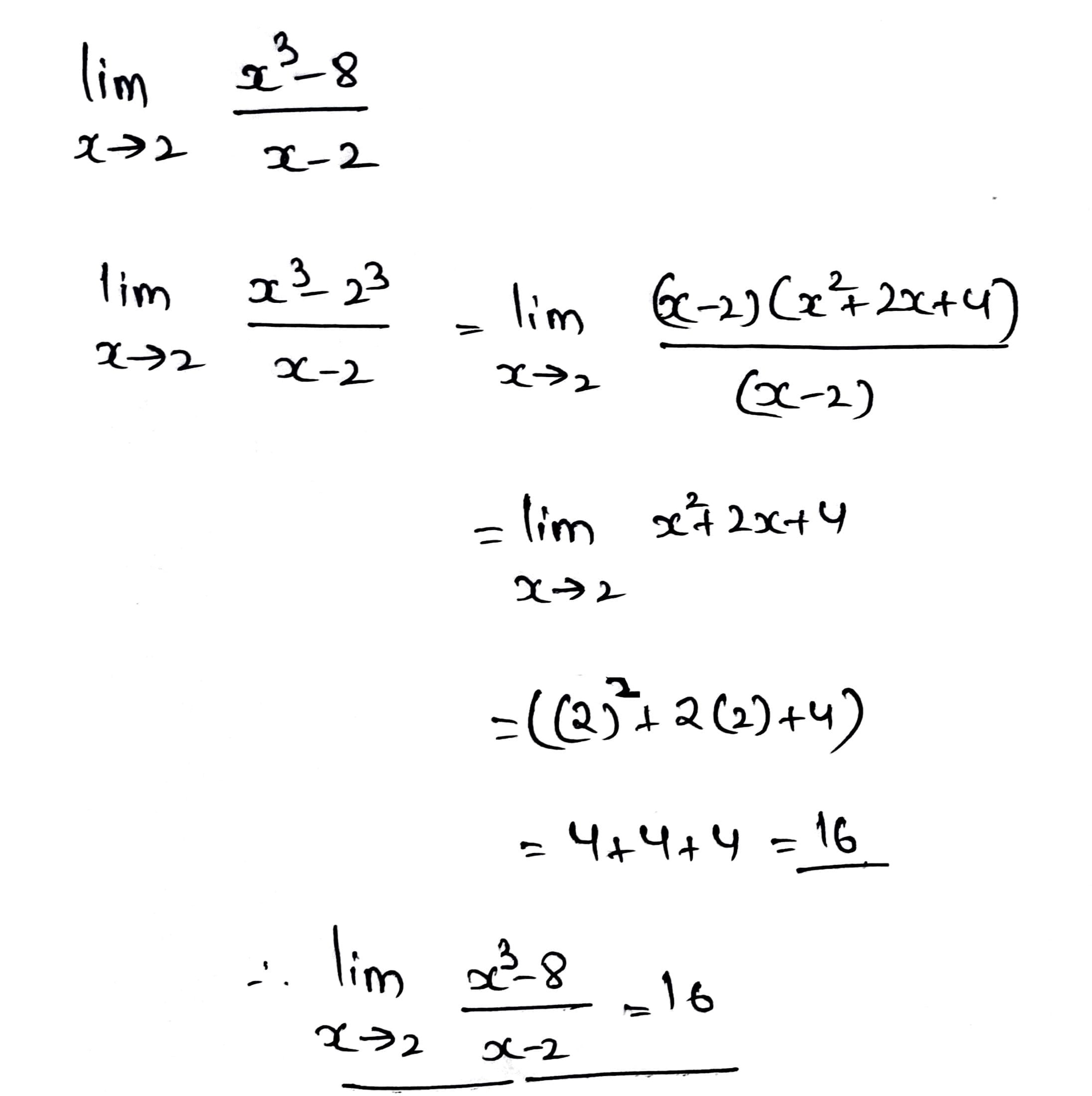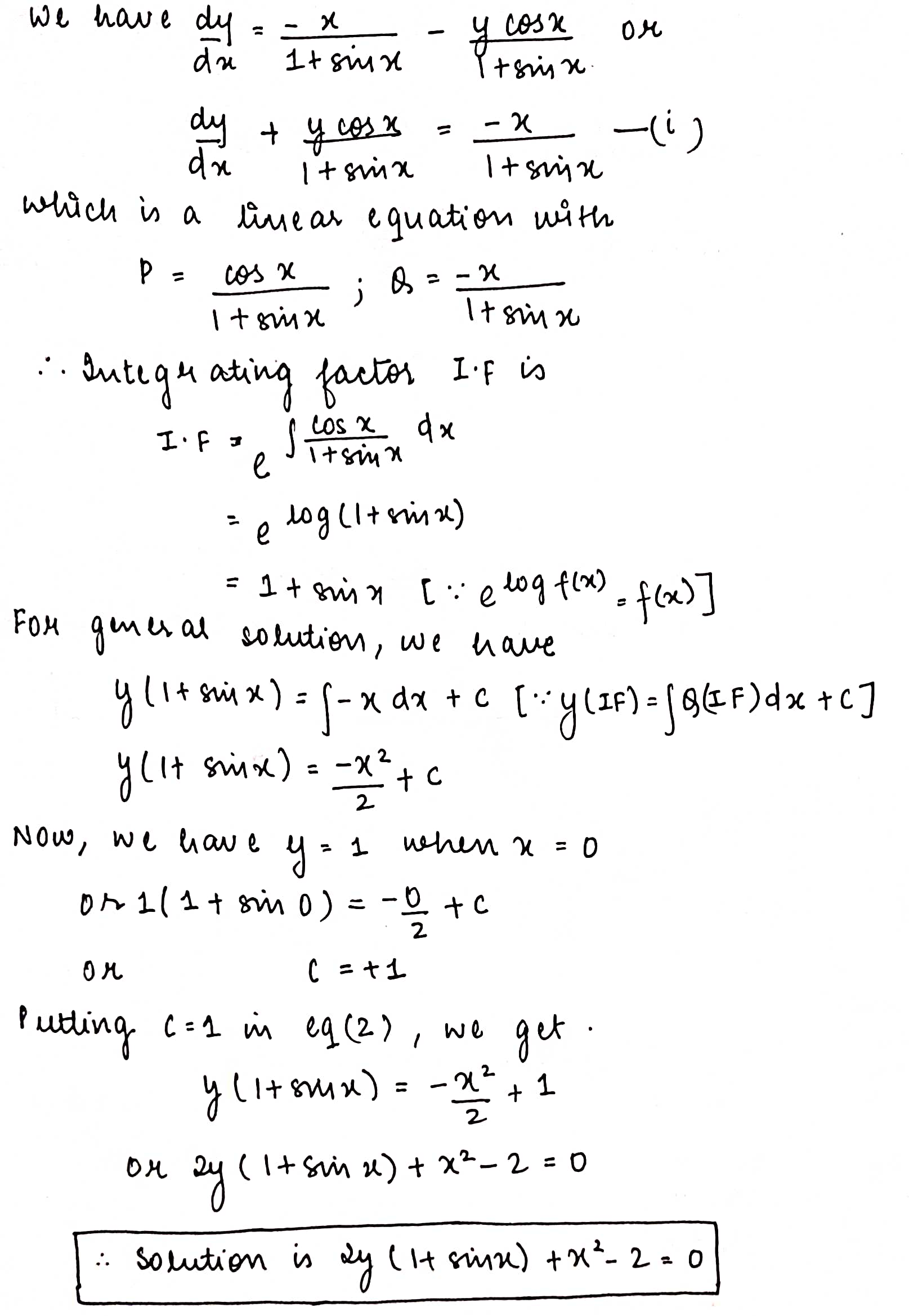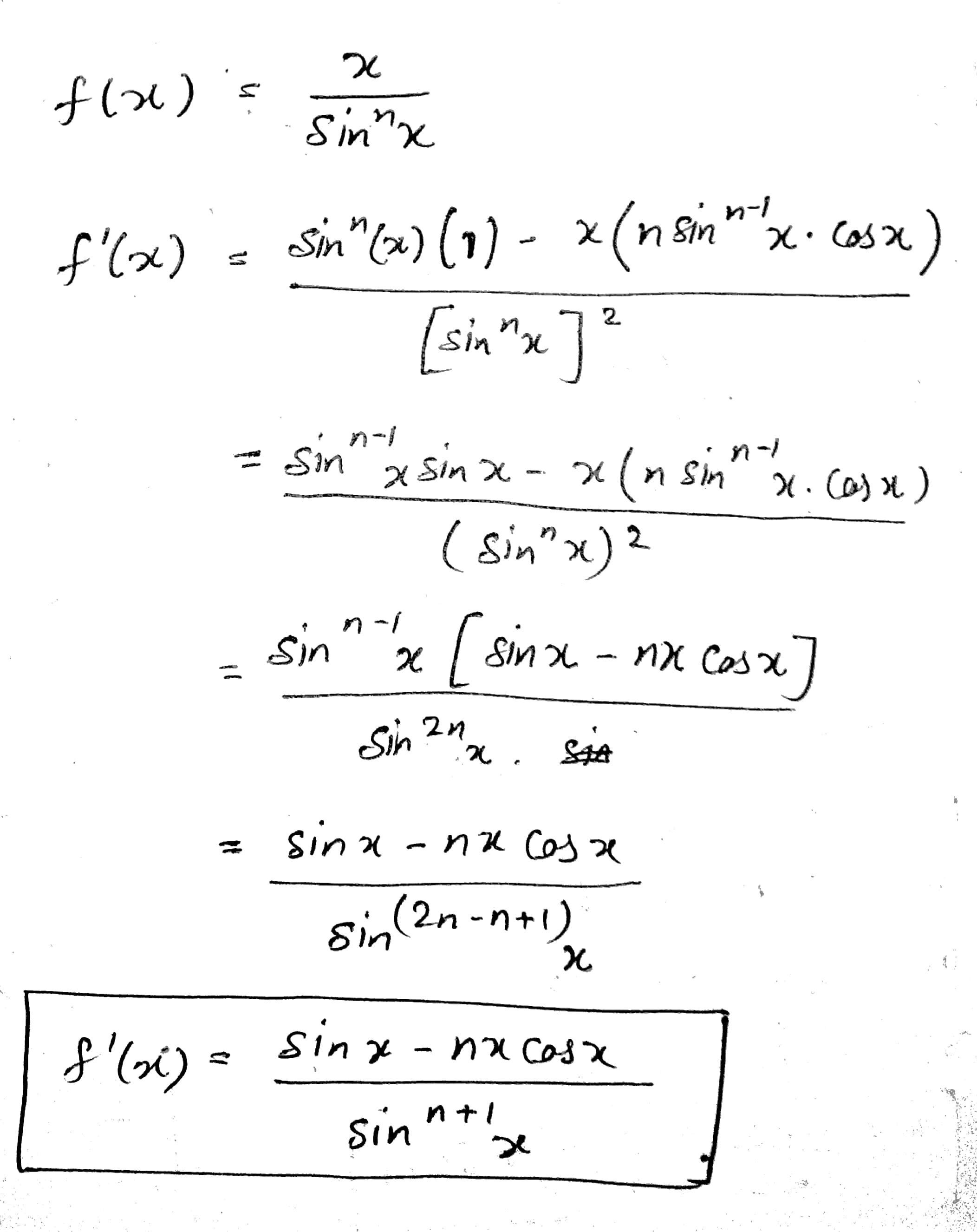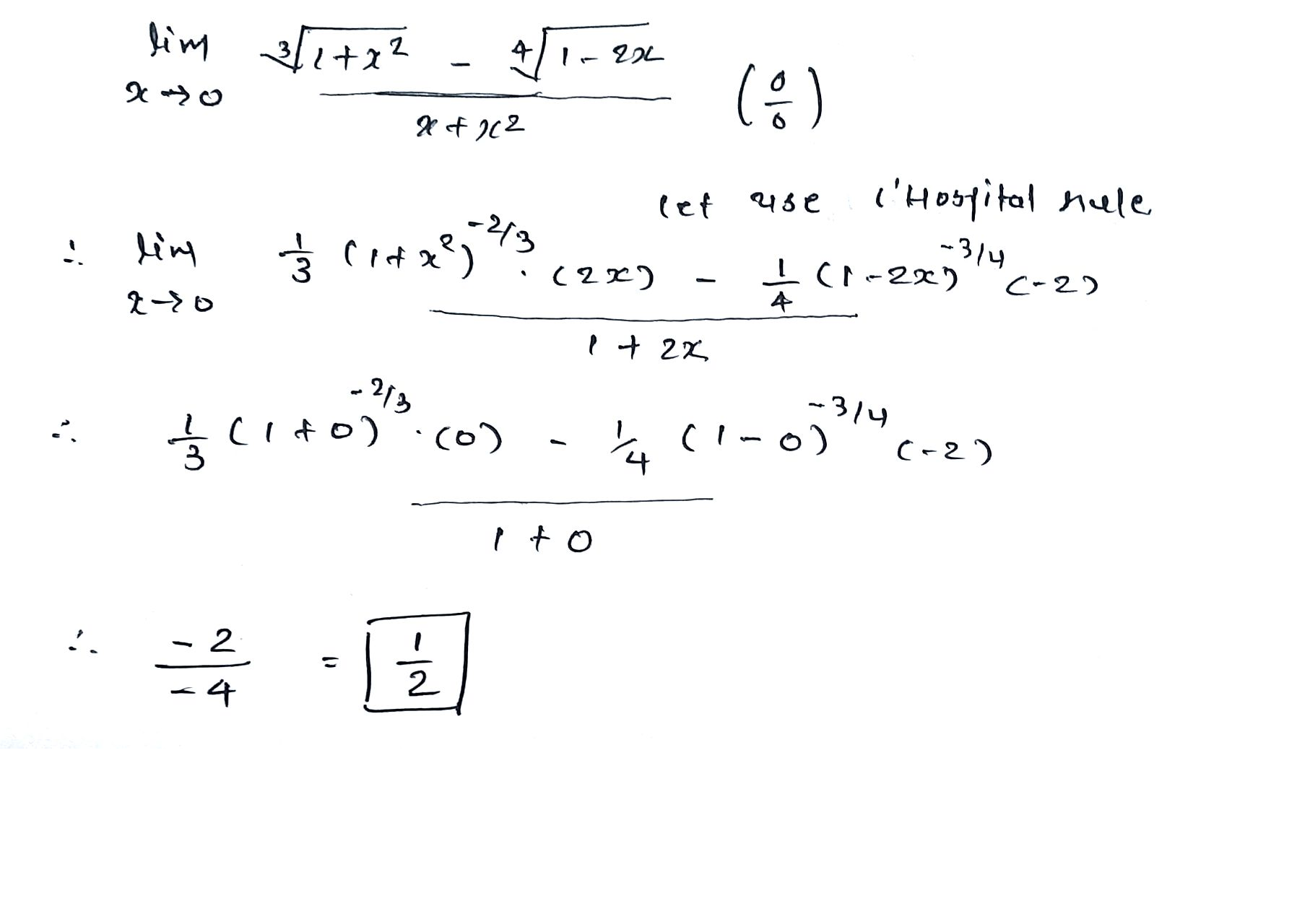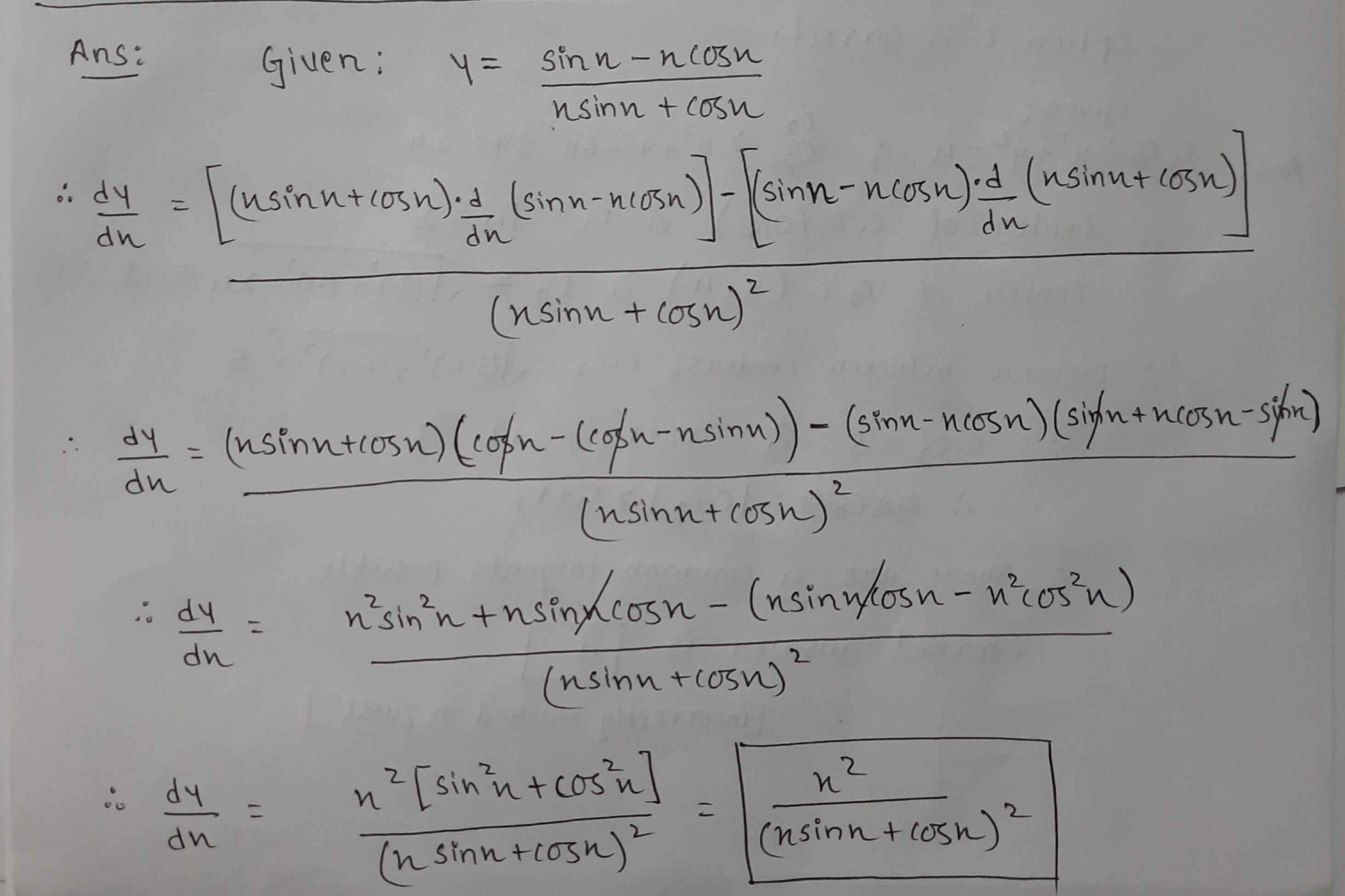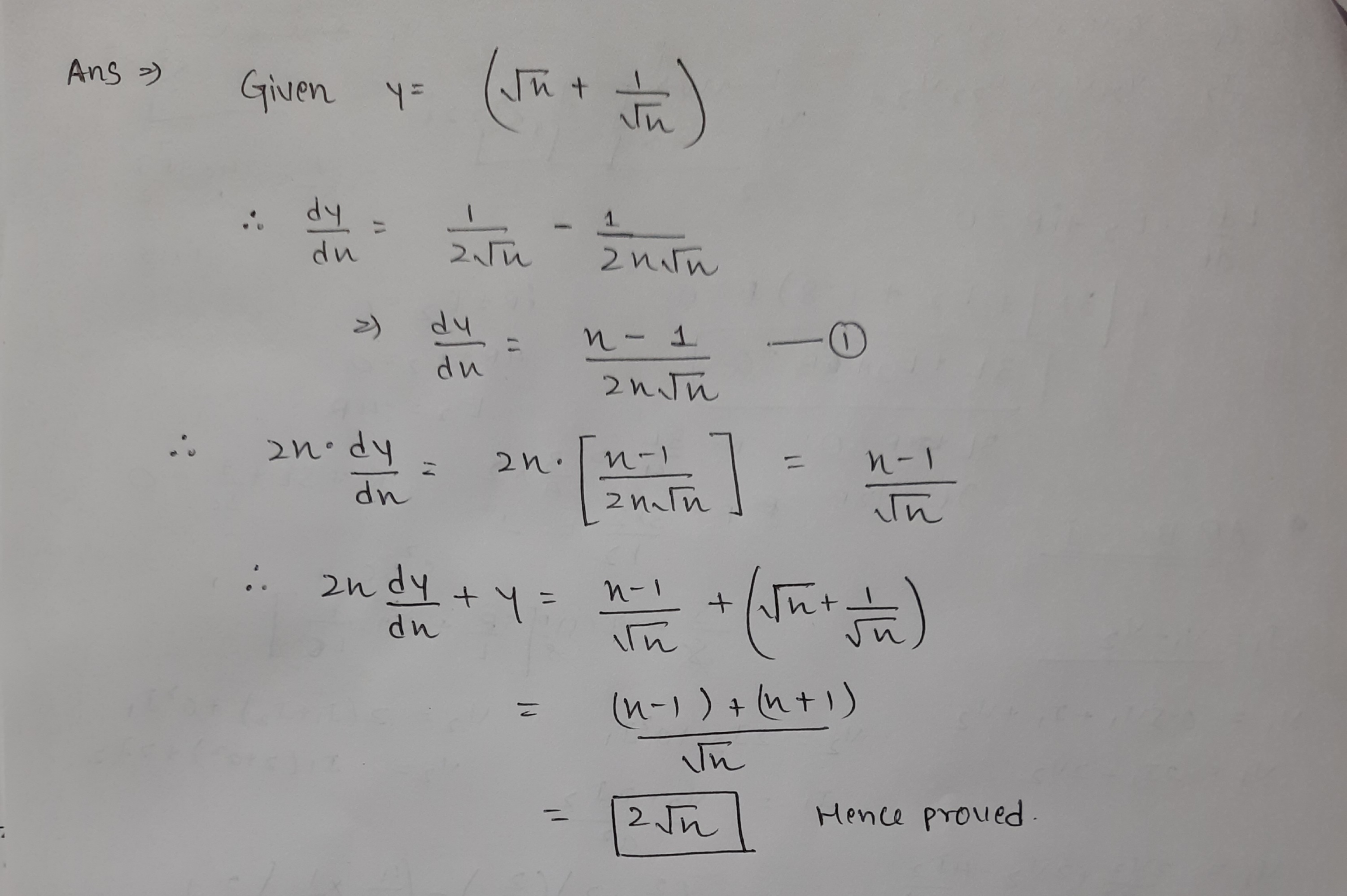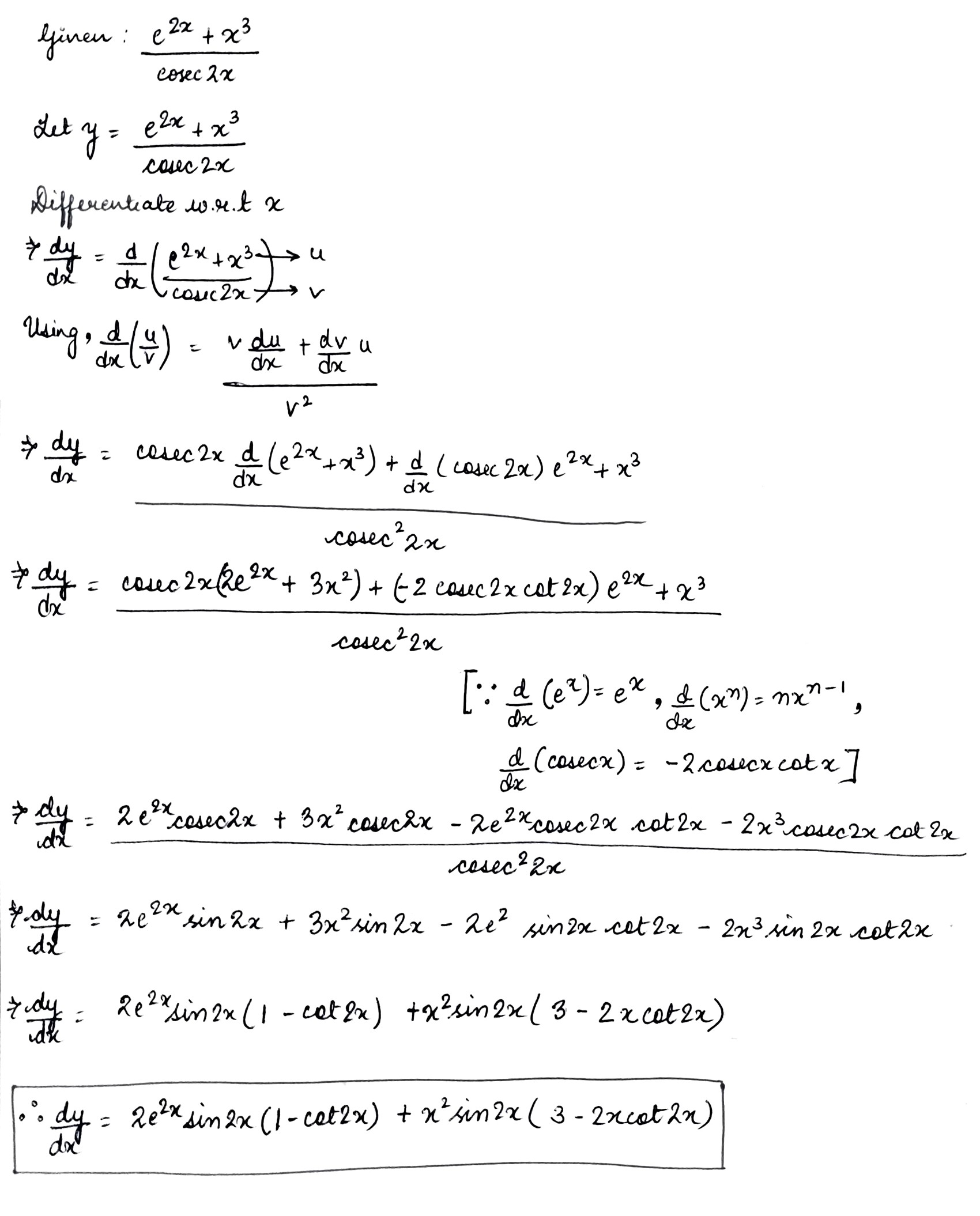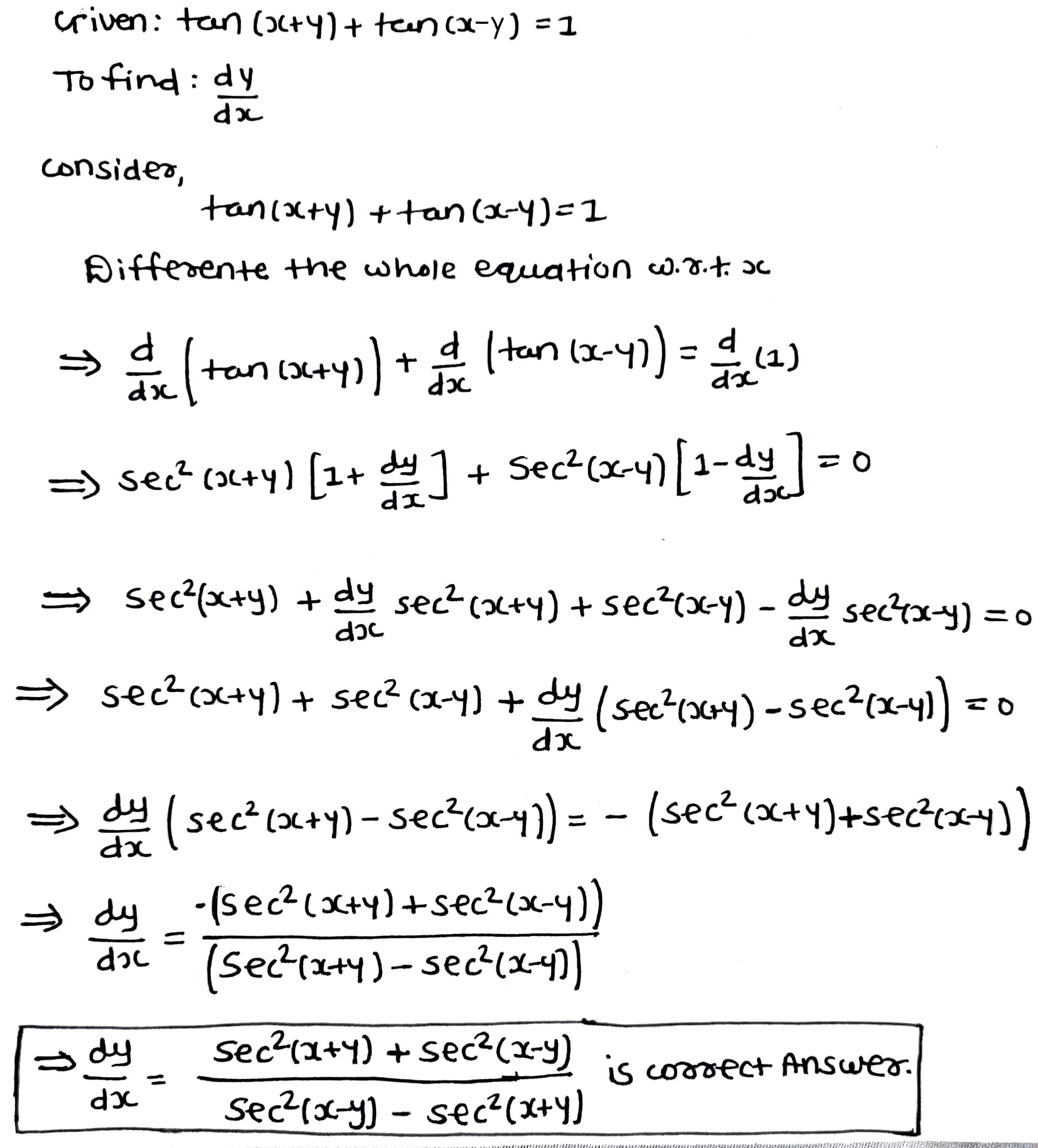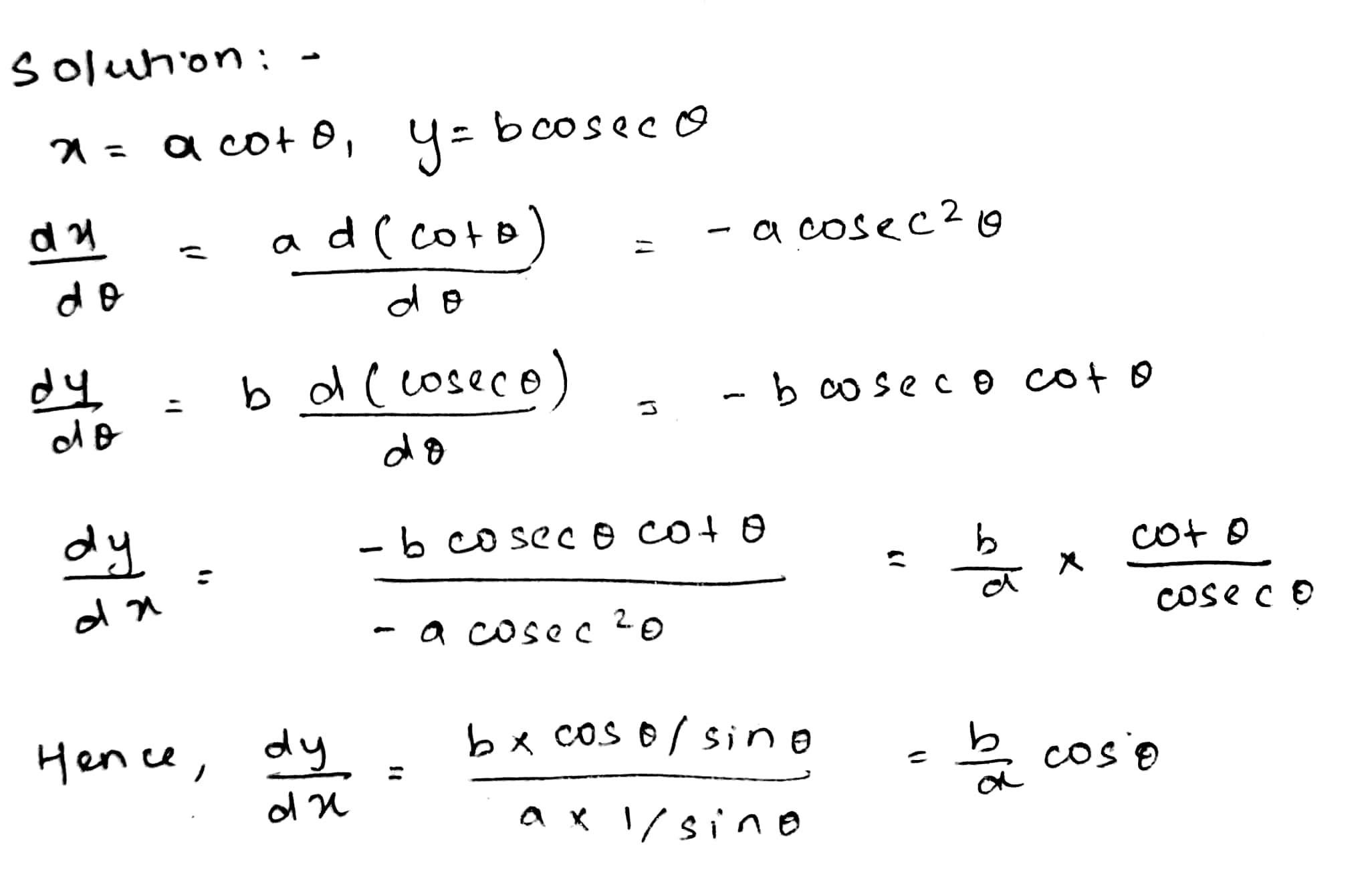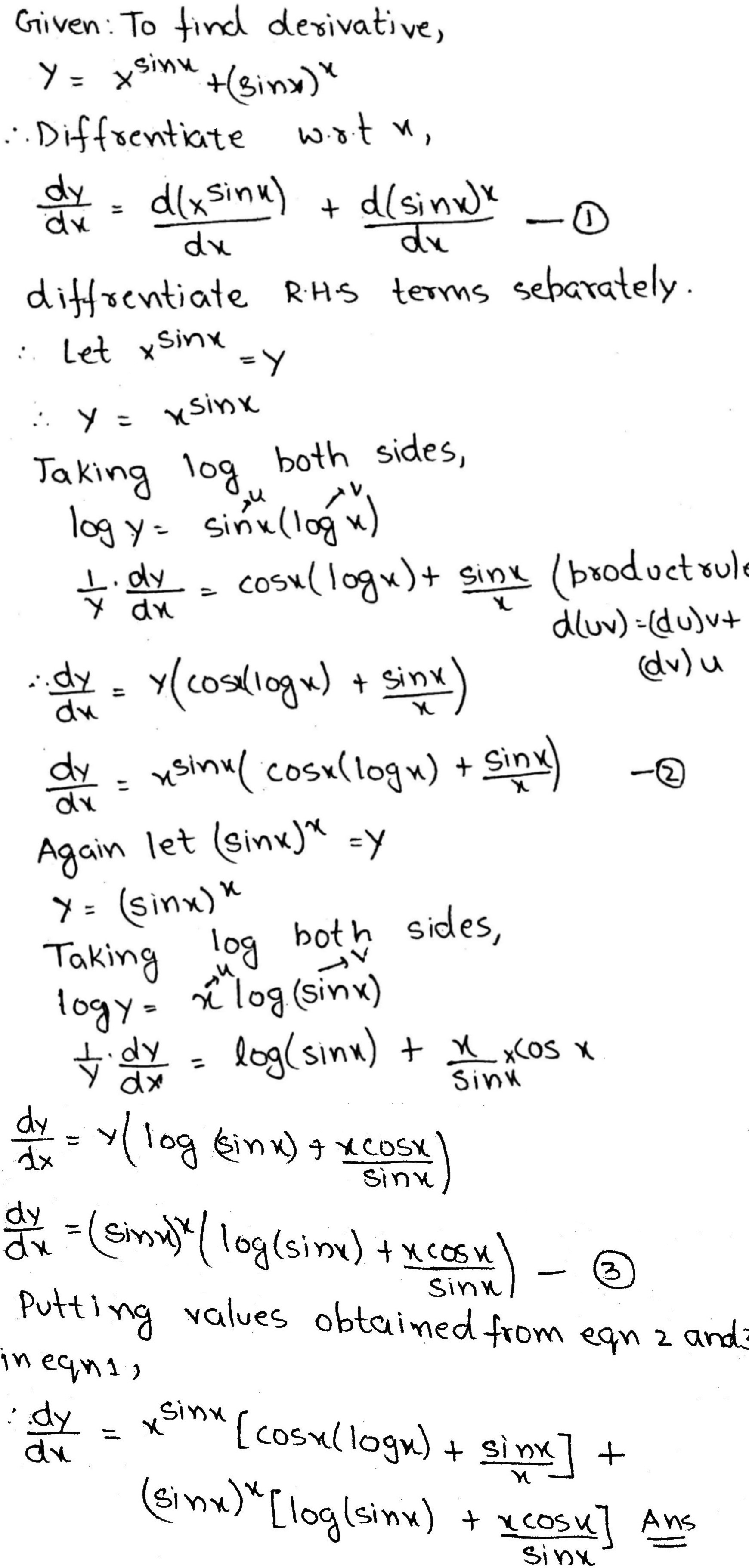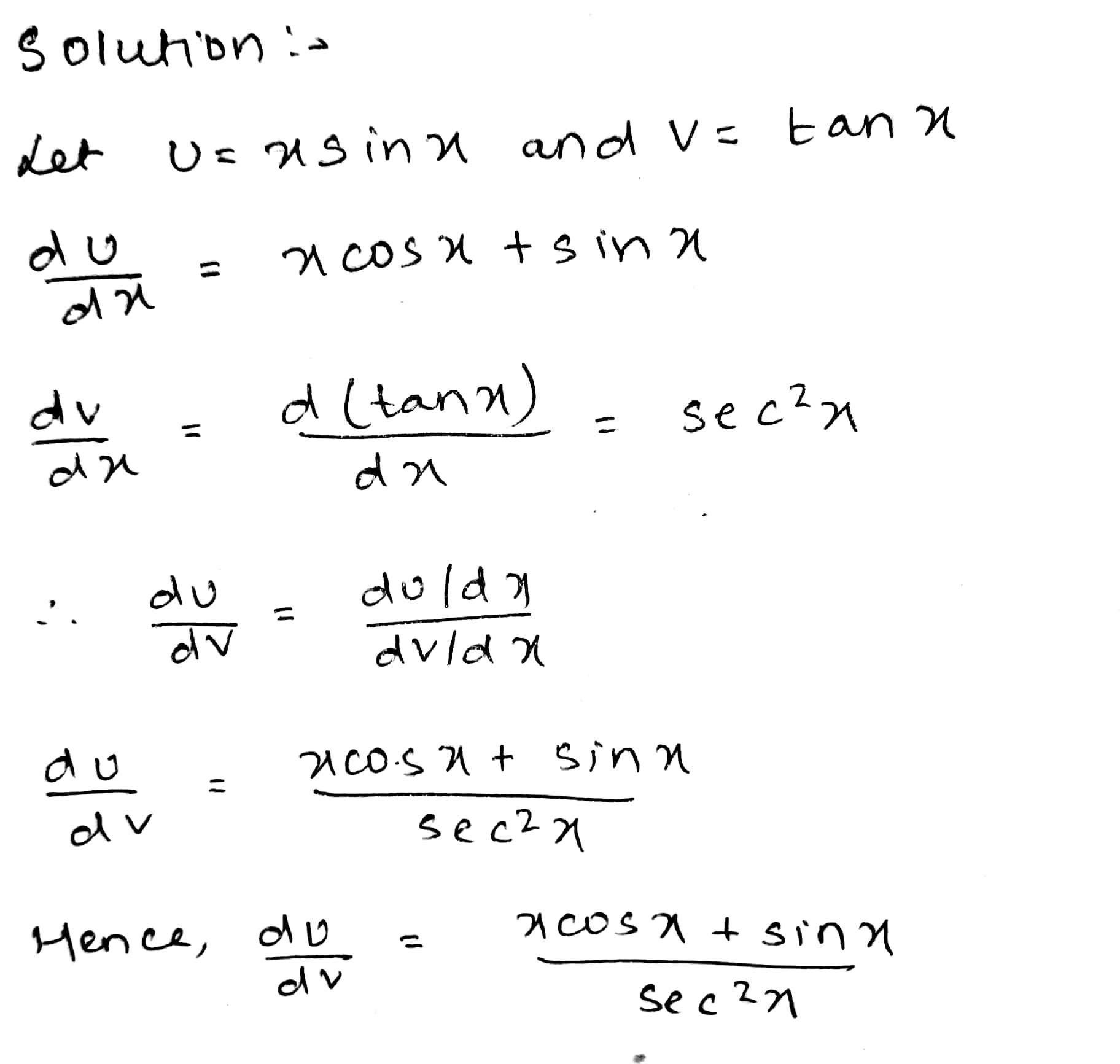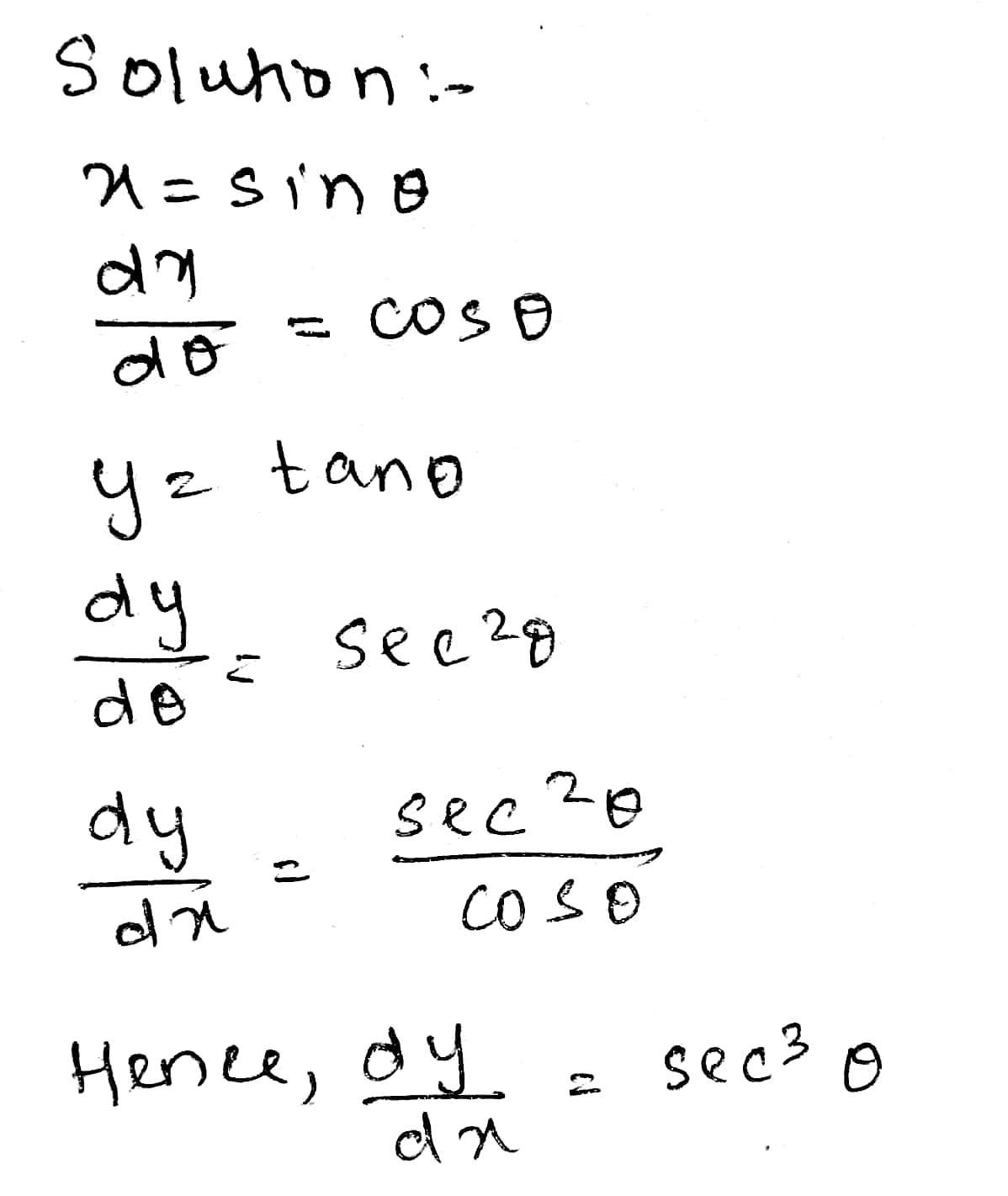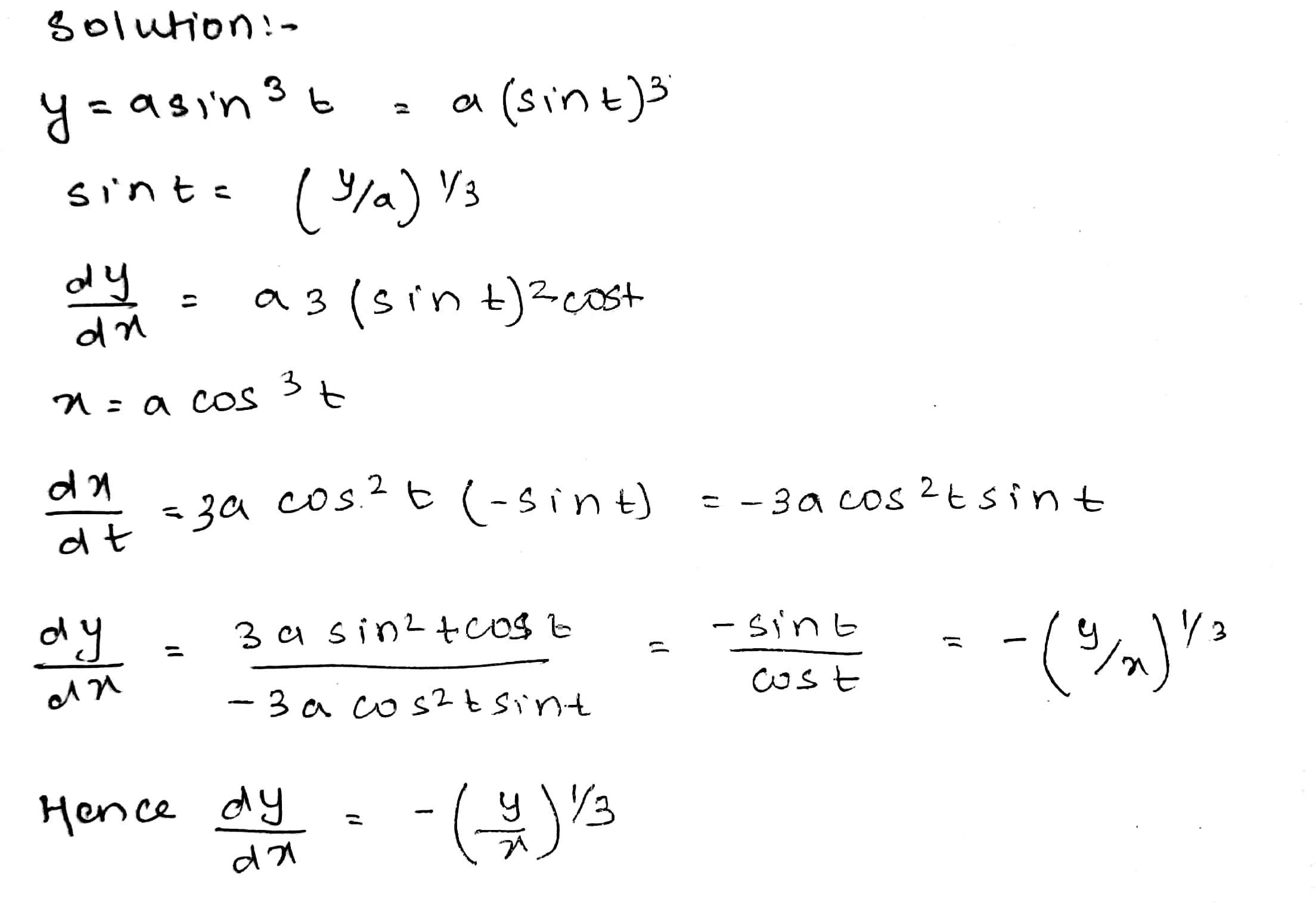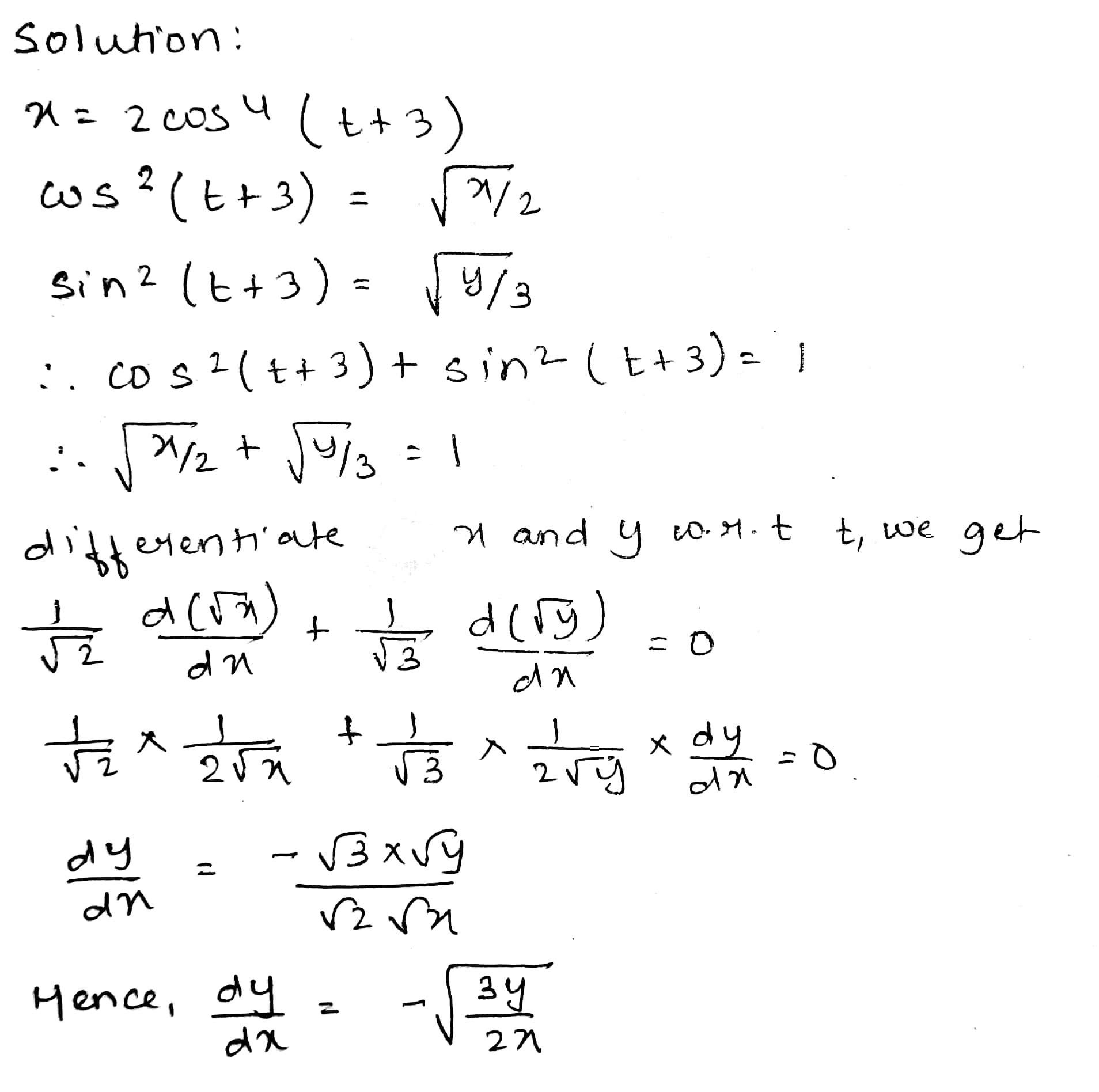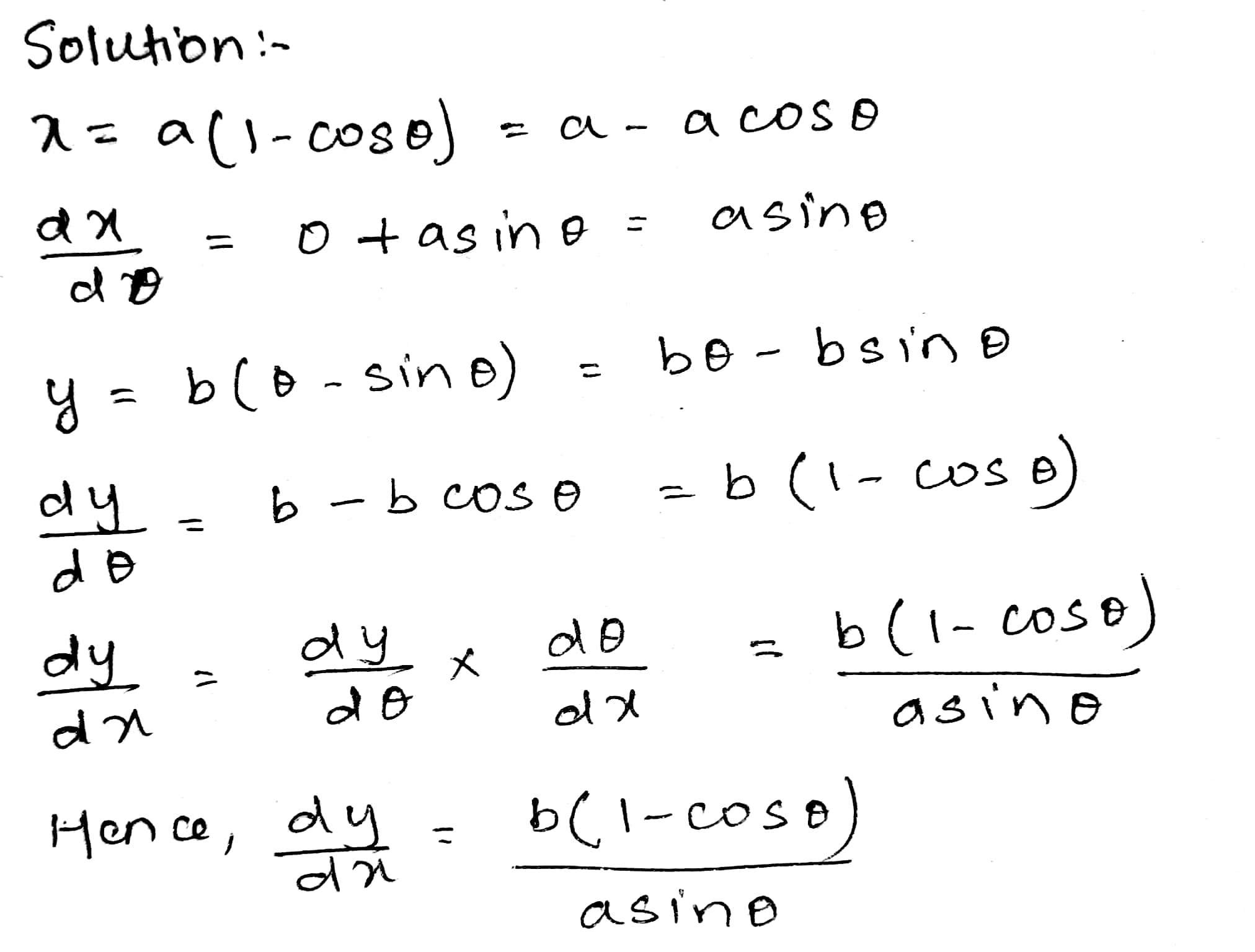Limits And Derivatives - Class 11 Engineering Maths - Extra Questions
The value of the limit $$\underset{x \rightarrow \dfrac{\pi}{2}}{\lim} \dfrac{4 \sqrt{2} (\sin 3x + \sin x)}{\left(2 \sin 2x \sin \dfrac{3x}{2} + \cos \dfrac{5x}{2} \right) - \left(\sqrt{2} + \sqrt{2} \cos 2x + \cos \dfrac{3x}{2}\right)}$$ is ______.
State whether the following statement is true or false.Enter $$1$$ for true and $$0$$ for false$$f(x)$$ is differentiable at a point $$P$$, if there exists a unique tangent at point $$P$$.
State whether the following statement is true or false.
Enter $$1$$ for true and $$0$$ for false
Find the derivative of the following functions from first principle:
$$\displaystyle \cos \left ( x-\frac{\pi }{8} \right )$$
Evaluate the Given limit: $$\displaystyle \lim_{x\rightarrow \pi}\frac{\sin \left ( \pi -x \right )}{\pi \left ( \pi -x \right )}$$
Evaluate : $$\displaystyle \underset{n\, \rightarrow \,
\infty }{Lt} \frac{1}{2^n}$$
Evaluate the given limit: $$\displaystyle \lim_{x\rightarrow 0}\frac{\cos \,x}{\pi -x}$$
Find $$ \displaystyle \frac{dy}{dx} $$ of $$2x + 3y = \sin x$$
Find the derivative of the following functions from first principle:
$$\sin (x + 1) $$
If the derivative of the function $$\displaystyle 4\sqrt{x}-2$$ is $$\dfrac{a}{\sqrt{x}}.$$ Find the value of $$a$$.
Find the derivative of $$\displaystyle 2x-\frac{3}{4}$$
$$\lim_\limits{x\to\frac{\pi}{4}} \dfrac{\sqrt{1-\sqrt{\sin 2x}}}{\pi-4x}=-\dfrac{1}{m}$$.Find $$m$$
Evaluate $$\displaystyle \lim_{x \rightarrow 1}\left( \dfrac{1}{x^2 + x - 2} - \dfrac{x}{x^3 - 1}\right)$$
Differentiate $$\sec x$$ by first principle.
$$\displaystyle\lim _{ x\rightarrow 0 }{ \left[ \dfrac { 8\sin { x } +x\sin { x } }{ 3\tan { x } +{ x }^{ 2 } } \right] } $$ is equal to
If y = log(logx) + $$2sinx$$, find $$\frac{dy}{dx}$$
If $$f(x)=\tan x$$, find $$f'(x)$$ and hence find $$f'\left(\dfrac{\pi}{4}\right)$$.
If $$x = a(\theta + \sin \theta)$$ and $$y = a(1 - \cos \theta)$$, find $$dy/ dx$$.
Write the negation of "some continuous functions are differentiable".
$$Find \ \dfrac{{dy}}{{dx}}\,in\,the\,following:$$
1)$$2x + 3y = \sin x$$
2)$$ax + b{y^2} = \cos x$$
3)$${x^3} + xy + y = 100$$
Differentiate the function with respect to $$x$$.
$$f(x)=$$ $$x^{2/3} + 7e^x - \dfrac{5}{x} + 7\tan x$$
Find $$\dfrac{dy}{dx}$$; $$y=4-x^2$$
Find the integrals of the function :
$$\sin^{2}(2x+5)$$
$$\underset {x\rightarrow 0}{\lim}\dfrac{x-\sin\,x}{x+\cos^2\,x}=$$
If $$y=\sqrt{x^2+1}$$, find $$\dfrac{dy}{dx}$$ at $$x=-1$$
If $$f\left( x \right) = \sin 2x - \cos 2x,$$ find $$f'\left( {\dfrac{\pi}{6}} \right)$$
Evaluate the following: $$\underset{n \rightarrow \infty}{\lim}\dfrac{\cos n + \sin n}{n^2}$$,
Find $$\dfrac{dy}{dx}$$, if $$y = \sin^3 x \, \cos^5 x$$.
Evaluate :$$lim_{x\rightarrow \infty} \dfrac{3x^2+4x+5}{4x^2+7}$$
$$\lim\limits_{x \to 0}\dfrac{\sin x^o}{x}=$$
Find $$\displaystyle \lim_{x \rightarrow \frac {\pi}{2}}[\sin x]$$ where $$[x]$$ indicates greatest integer function
Find the derivative of $$f(x)$$ from the first principles, where $$f(x)$$ is
$$\sin x+\cos x$$
$$\mathop {\lim }\limits_{x \to 1} \left( {1 - x} \right)\tan \left( {\frac{{\pi x}}{2}} \right)$$
Derivative of :$$(x+1)^2$$
Evaluate $$\underset{x \rightarrow a}{\lim} \dfrac{\sin x - \sin a}{\sqrt{x} - \sqrt{a}}$$
If $$y = \dfrac {1}{4} (x\pm A)^{2} $$Hence prove: $$y_{1}^{2} = y$$.
Differentiate with respect to $$x$$, where $$y = x - x^2.$$
Solve $$\mathop {\lim }\limits_{x \to 0} \dfrac{{\cos x}}{{\pi - x}}$$
Evaluate $$\underset { x\rightarrow 0 }{ lim\quad } log\frac { sinx }{ x } \\ $$
Find $$\dfrac{dy}{dx}$$
$$y = - x ^ { 3 } + x$$ ...
Find the derivatives of the following:
$$\sin x\cos x$$.
Evaluate :$$\mathop {\lim }\limits_{x \to 0} \cfrac{{{2^x} - 1}}{{{{(1 + x)}^{1/2}} - 1}}$$
$$\mathop {\lim }\limits_{x \to 0} \dfrac{{{e^x} - {e^5}}}{{x - 5}}$$
Evaluate $$\lim_{x\rightarrow \pi/2} \dfrac {\cos x}{\pi-2x}$$
Find the derivative of $$x^{2}$$ - 2 at x = 10
Evaluate $$\mathop {\lim }\limits_{x \to \infty } \dfrac{{5{x^2} + 4}}{{\sqrt {2{x^4} + 1} }}$$
Find the derivative of the following functions:
(i) tan$$x$$cos$$x$$
(ii) sec$$x$$
Evaluate: $$\displaystyle{\lim}_{x\rightarrow2}\dfrac{\sin(x^{2}-5x+6)}{x^{2}-7x+10}$$
$$\mathop {\lim }\limits_{x \to 0} \cfrac{{\sin \left( {\pi {{\cos }^2}x} \right)}}{{{x^2}}}$$
Evaluate : $$\displaystyle \lim _ { x \rightarrow 3 } \dfrac { \sqrt [ 4 ] { x } - \sqrt [ 4 ] { 3 } } { \sqrt [ 3 ] { x } - \sqrt [ 3 ] { 3 } }$$
$$\lim _{ x\rightarrow 0 }{ \dfrac { \tan { x }-\cos x }{ x} } $$ is p then$${p}$$ =
Solve:
$$\lim_{x\to\ 3}\dfrac{x^2-9}{x-3}$$
Find the value of $$\displaystyle x\xrightarrow { lim } 1\frac{\sqrt{x-1}+\sqrt{x}-1}{\sqrt{{x}^{2}-1}}$$
If $$x^2+y^2=t-\dfrac{1}{t}$$ and $$x^4+y^4=t^2+\dfrac{1}{t^2}$$, then prove that $$\dfrac{dy}{dx}=\dfrac{1}{x^3y}$$.
Find the derivative of $$f(x)$$ from the first principle.
$$\sin x\div \cos x$$
Find the derivative by first principle
$$\cos 5 x$$
Evaluate $$\underset { x\rightarrow 0 }{ lim } f(x)$$, where $$f(x)=\{ \overset { { |x| } ,\quad \quad x\neq 0 }{ \underset { 0,\quad \quad x=0 }{ x } } $$
$$\lim _{ x\rightarrow \pi /2 }{ \frac { \sin ^{ }{ x } }{ x } } $$
Find the derivative by first principle in examples to $$( 8 )$$
$$ \cos x $$
If $$y=x^2+5x$$ find $$\dfrac {dy}{dx}$$
$$\dfrac{dy}{dx}=\cos x +\sin x $$
Find $$\dfrac {dy}{dx}$$ if $$y=\dfrac {x^2+x}2$$
$$\displaystyle \lim_{x\rightarrow 0} \tan \left(\dfrac {\pi}{4}+x\right)$$
$$y=\sin x \cos x $$ find $$\dfrac{dy}{dx}$$
If $$y=e^x+\sec x$$, then find $$\dfrac{dy}{dx}$$.
$$\displaystyle \lim _{ x\rightarrow 0 } \left(\dfrac{a}{b}+\dfrac{\cos{x}}{b}\right)$$
Differentiate with respect to $$x$$:
$$3x^2-e^{-3x}+\sec x$$
Find $$\frac { d y } { d x } ,$$ if $$y = \log \left( \sqrt { x } - \frac { 1 } { \sqrt { x } } \right)$$
Differentiate with respect to $$x$$:
$$\cos x+\sin 2x$$
Find $$\dfrac{dy}{dx}$$ if $$y=3x^2+2$$
A curve has equation $$y=(2x-1)^{-1}+2x$$. $$x\neq\dfrac{1}{2}$$
Find $$\dfrac{dy}{dx}$$ and $$\dfrac{d^2y}{dx^2}$$.
$$\lim_{x\rightarrow 3} x^2-3x+1$$
Evaluate $$lim_{ x_\rightarrow 2} \,\dfrac { x ^ { 5 } - 32 } { x ^ { 3 } - 8 } $$
Evaluate $$\lim_{x\rightarrow 2}{(x)^{3}}$$.
Differentiate $$e^x+e^{-x}$$ with respect to x.
$$y=\dfrac{6}{x^2}+2x$$, then find $$\dfrac{dy}{dx}$$.
Differentiate w.r.t. $$x$$:$$y=2x^2-\log x +(x+1)^2$$
If $$y=a^x +\log x +3x^2$$, find $$\dfrac{dy}{dx}$$.
Differentiate with respect to $$x$$:
$$y=e^{-3x}+\sin 2x$$
If $$y=e^x+e^{-x}+\log x^2$$, find $$\dfrac{dy}{dx}$$.
If $$y=2x^3+\dfrac{3}{x^2}$$, then find $$\dfrac{dy}{dx}$$.
Differentiate w.r.t. $$x$$:$$\log e^x+\sin 3x-8$$
If $$y=e^x+x^2+\log x$$, then find $$\dfrac{dy}{dx}$$.
Differentiate with respect to $$x$$:
$$y=\cos x + \sin 2x$$
Differentiate $$e^x+e^{x^2}+....+e^{x^5}$$ w.r.t. $$x$$.
Evaluate the following limits.
$$\displaystyle\lim_{x\rightarrow a}a^3x$$
Answer the following question in one word or one sentence or as per exact requirement of the question.
If the value of $$\displaystyle\lim_{x\rightarrow -\infty}(3x+\sqrt{9x^2-x})$$$$=\dfrac{1}{6b}$$. Find the value of $$b$$?
Answer the following question in one word or one sentence or as per exact requirement of the question.
Write the value of $$\displaystyle\lim_{n\rightarrow \infty}\dfrac{n!+(n-1)!}{(n+1)!+(n+2)!}$$.
Evaluate the following:
$$\displaystyle\lim_{x\rightarrow 0}x^2-3 $$
Differentiate each of the following w.r.t. $$x$$ :
$$\sin 4x$$
Evaluate the following question:$$\displaystyle\lim_{x\rightarrow 2}2x+5 $$
Answer the following question in one word or one sentence or as per exact requirement of the question.
Write the value of $$\displaystyle\lim_{x\rightarrow 0^-}[x]$$.
Evaluate the following limit:
$$\displaystyle\lim_{h\rightarrow 0}\dfrac{\sqrt{x+h}-\sqrt{x}}{h}, x\neq 0$$.
$$\displaystyle\lim_{h\rightarrow 0}\dfrac{\sqrt{x+h}-\sqrt{x}}{h}, x\neq 0$$.
Differentiate
$$ \left ( \dfrac{sec\,x - 1}{sec\,x + 1} \right ) $$
Find derivative of $$ sec\, x $$ by first principle
Differentiate the following w.r.t.x: $$ \sin ^{2} x^{2}-\cos ^{2} x^{2} $$
Find the derivative of following functions w.r.t. $$x$$:
$$\sec x^o$$
If $$\displaystyle \underset{x\rightarrow a}{lim} f\left ( x \right )g\left ( x \right )$$ exists, then does it imply that $$\displaystyle \underset{x\rightarrow a}{lim} f\left ( x \right )$$ and $$\displaystyle \underset{x\rightarrow a}{lim}\ g\left ( x \right )$$ also exist? Yes =5 No=7
Find $$m+n$$
$$\displaystyle \underset{x\rightarrow \infty }{lim} \frac{2\sqrt{x}+3\sqrt[3]{x}+5\sqrt[5]{x}}{\sqrt{\left ( 5x-2 \right )}+\sqrt[3]{\left ( 3x-2 \right )}}$$ is $$\dfrac{m}{\sqrt{n}}$$
Find the value of $$\displaystyle \lim_{x\rightarrow 1}e\left ( 1+\sin \pi x \right )^{\cot \pi x}$$
Match the columns
Extending the functions in col. 1 as $$\lim _{ x\rightarrow \pi }{ f(x)}$$
Let $$\displaystyle f(x)=x+\dfrac {1}{2x+\dfrac {1}{2x+\dfrac {1}{2x+.....\infty}}}$$
Compute the value of $$f(100).f'(100).$$
If the function$$f(x)$$ satisfies $$\displaystyle \lim_{x\rightarrow 1}\frac{f\left ( x \right )-2}{x^{2}-1}=\pi $$ evaluate $$\displaystyle \lim_{x\rightarrow 1}f\left ( x \right )$$
Evaluate the Given limit: $$\displaystyle \lim_{x\rightarrow 0}\frac{\sin \,ax}{bx}$$
Find the derivative of the following functions:$$\displaystyle 2\tan x-7\sec x$$
For some constant $$a$$ and $$b$$, find the derivative of the following functions:
$$(ax^{2} + b)^{2}$$.
Find the derivatives of the following:
$$\sec x$$.
Find $$ \displaystyle \frac{dy}{dx}$$, if $$\displaystyle y = \sin^{-1} x + \sin^{-1} \sqrt{1 - x^2} , - 1 \leq t \leq 1$$
Find the derivatives of the following:
$$3\cot x + 5 cosec x$$.
Find $$\dfrac{dy}{dx}$$ if $$x=a(\cos \theta + \theta \sin \theta)$$. and $$y=a(\sin \theta - \theta \cos \theta)$$.
If $$y + \sin y = \cos x$$, find $$\dfrac{dy}{dx}$$.
Show that when $$n$$ is infinite the limit of $$nx^{n}$$ tends to $$0$$, when $$x> 1$$.
If $$y=\sin ^{ -1 }{ (3x) } +\sec ^{ -1 }{ \left( \cfrac { 1 }{ 3x } \right) } $$, find $$\cfrac { dy }{ dx } $$
If $$x = a sin$$ $$\theta$$ $$+ b cos$$ $$\theta$$, $$y= a cos$$ $$\theta$$ $$- b sin$$ $$\theta$$ , then show that $$(ax + ay)^2$$ + $$(bx - ay)^2$$ = $$(a^2 + b^2)^2$$.
$$\displaystyle \lim _{ x\rightarrow 1 }{ { \left( 2-x+a\left[ x-1 \right] +b\left[ 1+x \right] \right) } } $$ =exists
So find $$a,b$$
Find the following limit:
$$\displaystyle \lim_{x \, \rightarrow \, -2 } \, \frac{x^4 \, + \, 5x^3 \, + \, 6x^2}{x^2 \, - \, 3x \, - \, 10}$$
Calculate the following limits.
$$\displaystyle \lim_{n \, \rightarrow \, \infty} \, \frac{n^2}{1 \, - \, 9n^2}, \, n \, \epsilon \, N.$$
Find the derivative of $$\displaystyle\, y \, =\, (2 \, -\, x^2)\, \cos\, x \, +\, 2x \, \sin\, x$$
Find the following limit:
$$\displaystyle \lim_{x \, \rightarrow \, 1 } \, \left [ \, \left (\frac{x^3 \, - \, 4x}{x^3 \, - \, 8} \right )^{-1} \, - \, \left (\frac{x \, + \, \sqrt{2x}}{x \, - \, 2} \, - \, \frac{\sqrt{2}}{\sqrt{x} \, - \, \sqrt{2}} \right )^{-1} \, \right]$$
Evaluate $$\displaystyle \lim_{x\rightarrow 0} \dfrac {a^{\sin x} - 1}{\sin x}$$.
Find the following limit:
$$\displaystyle \lim_{x \, \rightarrow \, \infty } \, \frac{x^2 \, + \, 3x \, - \, 4}{1 \, - \, 3x^2}.$$
Find the derivative of $$\displaystyle\, y \, =\, \frac{1}{x} \, +\, \frac{1}{x^2} \, +\, \frac{3}{x^3}$$
Find the following limit.
$$\displaystyle \lim_{x \, \rightarrow \, 1 } \, \frac{x^4 \, - \, 2x^2 \, + \, 1}{x^3 \, - \, 1}.$$
Find the following limit.
$$\displaystyle \lim_{x \, \rightarrow \, 0 } \, \frac{(1 \, + \, x) \, (x \, + \, 2x) \, (1 \, + \, 3x) \, - \, 1}{x}.$$
Find the value of $$x$$ for which the derivative of the function $$\displaystyle\, f(x) = 20\, \cos \, 3x + 12\, \cos\, 5x - 15\, \cos\, 4x$$ is equal to zero?
Find the slope of the tangent to the curve $$y = x^{3} - x$$ at $$x = 2$$.
Find the derivative of $$\sin {x}$$ with respect to $$x$$ from first principles.
Find the derivatives of the following functions.
(a) $$\cot^3 \, x$$ (b) $$\sin \, \sqrt{x}$$
Find the derivatives of the following functions at the indicated points.
$$\displaystyle\, f(x) \, = \, sin \, 4x \, cos \, 4x, \, f' \, (\pi/3) \, = \, ?$$
Find the derivative of
$$f(x)=(x^2-5)(x^3-2x+3)$$
Find $$\dfrac{dy}{dx}$$ when $$x$$ and $$y$$ are connected by the relation given:
$$\sin (xy)+\dfrac{x}{y}=x^2-y$$
$$(3x^4-x^3+4)^{5/2}$$ differentiate w.r.t x.
Differentiate $$3x^{1/3} + \frac{6}{7} x^{7/6} +3x^{2/3} +C$$
solve: $$x - \ sin x + C$$
Differentiate$$ \frac{2}{3} x^{3} + \frac{3}{2} x^{2} +C$$
Differentiate$$ \sqrt{2x^{3/2} - 5x^{4/5}}$$
Differentiate$$ \dfrac{ x^4 }{4} - \dfrac{x^{-3}}{3} - \dfrac{2}{x} +C$$
(a) Differentiate $$y = {\cos ^{ - 1}}\left( {\frac{{1 - {x^2}}}{{1 + {x^2}}}} \right)$$ with respect to $$x,0<x<1$$,
(b) Differentiate $${x^x} - {2^{\sin x}}$$ with respect to $$x$$
Solve $$\lim _{ x\rightarrow a }{ \{ \dfrac { { (x+2) }^{ 5/3 }-{ (a+2) }^{ 5/3 } }{ x-a } } \}$$
The value of $$\lim\limits_{x\to 0}\left[\dfrac{\tan x}{x}+\dfrac{\sin x}{x}\right]$$ is
$$y={e}^{x}+{e}^{-x}$$ prove that $$\dfrac { dy }{ dx } =\sqrt { { y }^{ 2 }-4 }$$
$$\lim _{ n\rightarrow \infty }{ \dfrac { \cos { x } +\cos { 3x } +\cos { 5x } +\cos { \left( 2n-1 \right) } x }{ n } } $$ where $$x\neq k\pi ,k\epsilon $$
Differentiate with respect to $$x$$$$y=\sin{2x}-4{e}^{3}x$$
If $$y = \dfrac{{\sin \left( {x + 9} \right)}}{{\cos x}}$$, then $$\dfrac{dy}{{dx}}$$ at $$x = 0$$, is
Solve $$\lim_{x \rightarrow \infty}(\sqrt{x^{2} +ax + a^{2}} - \sqrt{x^{2} + a^{2}})$$ =
Solve: $$\underset{x \rightarrow 0}{lim}\left(\dfrac{1}{x^2} - \cot^2 x\right)$$.
Solve $$x=a(\theta -\sin \theta),y=a(1+\cos \theta )$$ find $$\dfrac{dy}{dx}$$ ?
Examine the graph of $$y=f(x)$$ as shown and evaluate the following limits
(i) $$\lim_\limits{x \to1}f(x)$$
(ii) $$\lim_\limits{x \to2}f(x)$$
(iii) $$\lim_\limits{x \to3}f(x)$$
(iv) $$\lim_\limits{x \to199}f(x)$$
(v) $$\lim_\limits{x \to3^+}f(x)$$
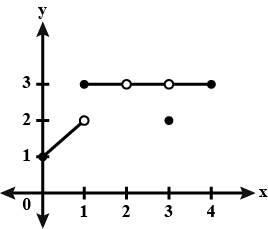
If $${f}_{1}(x)=\cfrac{x}{2}+10\forall x\in R$$ and $${f}_{n}(x)={f}_{1}({f}_{n-1}(x))\forall n\ge 2,n \in N$$, then evaluate $$\lim _{ n\rightarrow \infty }{ { f }_{ n }(x) } $$
$$x=e^{\theta}(\sin\theta+\cos\theta)$$, $$y=e^{\theta}(\sin\theta-\cos\theta)$$Fine $$\dfrac{dy}{dx}$$.
Find the derivative of $$f(x)$$ from the first principles, where $$f(x)$$ is:
$$x \sin x$$
Differentiate $$\sqrt {\dfrac{{1 - \tan x}}{{1 + \tan x}}} $$
Find the derivative of $$\sin \left( {x + 1} \right)$$, with respect to $$x$$, from first principle.
Solve: $$\displaystyle\lim_{x\rightarrow \dfrac {3\pi}{4}} \dfrac {2 + \tan x}{5 + 4\tan x}$$.
$$\displaystyle \lim_{x \to 0} \sin \dfrac{\pi}{x}$$
Find
$$\displaystyle \lim_{x \rightarrow \dfrac {5}{2}}[x]$$
$$\lim_{x\rightarrow o}\frac{4sin^{2(x/_{2})cos^{2}(x/_{2})}}{sin^{2}(x/_{2})}=K$$
$$\displaystyle\lim_{x\rightarrow\infty}\dfrac{\cos x+\sin^2x}{x+1}$$.
$$f(x)=\sec x-\cos x,x \epsilon (0,\pi/2)$$find f'(x)
Which of the following limits vanish ?
Solve: $$\underset{x \rightarrow 2}{\lim} \dfrac{(1 - 3^x - 4^x + 12^x)}{\sqrt{(2 \cos x + 7)} - }$$
Solve the equation:-
$$\overset{lim}{n\rightarrow 20}\displaystyle\int_{r=0}^{n-1}\dfrac{n}{n^{1}+r^{2}}$$
Find the limit :-
$$\mathop {\lim }\limits_{x \to 1} \,\,\dfrac{{1 - \dfrac{1}{x}}}{{\sin \,\pi (x - 1)}}$$
$$\lim_{x\rightarrow o}cos\left ( \sqrt{1+x} \right )-cos\sqrt{x}$$.
$$\dfrac{sin2x}{a cos^{2}x+b sin ^{2}x}$$
Solve: $$\displaystyle \int^{1}_{-1} \frac{dx}{x^2 + 2x + 5}$$
Evaluate the following limits
$$\mathop {\lim }\limits_{x \to 0} \left( {\frac{{{e^x} - \sin x}}{x}} \right)$$
$$y = \sin \left( {\pi /6{e^{xy}}} \right){\text{putting}}\;x = 0\;{\text{than}}\dfrac{{dy}}{{dx}}$$
Solve $$\mathop {\lim }\limits_{x \to \infty } {\left( {\frac{{x + 4}}{{x + 2}}} \right)^{x + 3}}$$
Evaluate :
$$\mathop {\lim }\limits_{x \to 0} \frac{{x - \sin x\cos x}}{{{x^3}}}.$$
$$y=6{{x}^{3}}+3{{x}^{2}}+4x+5$$
Find the value of $$\dfrac{dy}{dx}$$?$$\lim_{x\rightarrow 2}\frac{\sum 32x}{x^{3}-p}$$
Solve
$$\mathop {\lim }\limits_{x \to 0} \,\,\dfrac{{\tan 8x}}{{\sin 2x}}$$
Solve the equation:-
$$\lim_{{x\rightarrow \pi/2}}\ \ \dfrac{\tan\ 2x}{x-\pi/2}$$
$$\lim _ { x \rightarrow 0 } \dfrac { 1 - \cos ^ { 3 } x } { x \sin 2 x }$$
$$\displaystyle\lim_{x\rightarrow \frac{\pi}{2}}\dfrac{\tan 2x}{x-\dfrac{\pi}{2}}$$.
Solve $$\lim _ { x \rightarrow 0 } \dfrac { \sqrt { 2 + x } - \sqrt { 2 } } { x }$$
Find differentiation of $$\sec ^ { - 1 } \tan x$$.
Find the diffrentiation of $$xsinx$$.
Solve $$\underset { x\rightarrow 1 }{ \lim } \dfrac { { x }^{ 3 }+{ 3x }^{ 2 }-6x+2 }{ { x }^{ 3 }+{ 3x }^{ 2 }-3x-1 } $$
Find the derivative of $$cosec^2\:x$$, by using first principle of derivatives ?
Let $$y=$$$$\sqrt { x } + 2 x ^ { \dfrac { 3 } { 4 } } + 3 x ^ { \dfrac { 5 } { 6 } } ( x > 0 )$$. Find the derivative of $$y$$ with respect to $$x$$.
Differentiate:
$$y = c ^ { 2 } + \dfrac { c } { x }$$
Solve:
$$\underset { x\rightarrow 0 }{ lim } \dfrac { sin3x }{ x } $$
Evaluate $$ \lim_{x\rightarrow 0}\dfrac { { x }^{ 2 }-\tan 2x }{ \tan x } $$
If $$y=\tan x +\cot x$$ find $$\dfrac{dy}{dx}$$
Evaluate:$$\mathop {\lim }\limits_{x \to \tfrac{\pi }{3}} \dfrac{{\sin \left( {\frac{\pi }{3} - x} \right)}}{{2\cos x - 1}}$$
$$\lim\limits_{x \rightarrow 0}\dfrac{\sin (\pi\, \cos^2\,x)}{x^2}$$=
If $$y=\cos^{-1}\left\{\dfrac{2x-3\sqrt{1-x^{2}}}{\sqrt{13}}\right\}$$, find $$\dfrac{dy}{dx}$$.
Evaluate: $$\lim _{x\to 0}\:\dfrac{e^{\alpha x}-e^{\beta x}}{sin\:\alpha x-sin\:\beta x}$$
Differentiate w.r.t $$x$$
$$e ^ { x }\cos ^ { 3 } x\sin ^ { 2 } x$$
$$lim_{x \rightarrow 1}\dfrac{sin\, \pi\,x}{x-1}$$ is
Solve $$\mathop {\lim }\limits_{x \to 2} \,f\left( x \right) = \mathop {\lim }\limits_{x \to 2} \,\dfrac{{\left( {{x^2} - 4} \right)}}{{\left( {x - 2} \right)}}$$
If $$\dfrac{3}{2}+y^{3}=3axy$$, then find $$ \dfrac {dy}{dx} $$
If $$y = \log \left( {{e^{3x}}{{\left( {\frac{{x - 4}}{{x + 3}}} \right)}^{\frac{2}{3}}}} \right)$$, then find $$\dfrac{{dy}}{{dx}} $$
Find $$\dfrac{dy}{dx}$$, if $$x=a(\theta-\sin \theta)$$ and $$y=a(1-\cos \theta)$$.
Solve:
$$\displaystyle \lim_{n\rightarrow \infty}{\dfrac{1.n+2(n-1)+3(n-2)+.....+n.1}{n^{3}}}$$
$$lim_{x \rightarrow 3}\dfrac{x^5-243}{x^2-9}$$
verify that the function y= $$\sqrt{a^2 - x^2}, x\epsilon (-a,a_)$$ is a solution of the diffrential equation x + y $$\dfrac{dy}{dx}=0, (y \neq 0)$$
$$\begin{matrix} lim \\x \xrightarrow\quad 1 \end{matrix}$$ $$\left(\dfrac{1}{x-1} - \dfrac{2}{x^2 - 1}\right)$$
Solve:
$$\displaystyle \lim _{ \theta \rightarrow \pi }{ \dfrac {\pi -\theta}{\sqrt {\cos \theta +1}} } $$
Solve :
$$\displaystyle\lim _{ x\rightarrow 1 }{ \left[ \dfrac { 3 }{ { x }^{ 2 }+x-2 } -\dfrac { 4 }{ { x }^{ 2 }+2x-3 } \right] } $$
Solve:
$$\displaystyle\lim _{ x\rightarrow 2 }{ \dfrac { { x }^{ 6 }+32 }{ x+2 } } $$
$$\lim_{x\rightarrow\ 0}\dfrac{\cos\ x}{\pi-x}$$
Evaluate: $$\displaystyle\lim_{n\rightarrow \infty}(n-\sqrt{n^2+n})$$.
$$\underset { x\rightarrow 3 }{ lim } \left( [x-3] \right) +[3-x]-x$$
Evaluate : $$\underset { x\rightarrow 0 }{ lim } \frac { { 3 }^{ x }-1 }{ \sqrt { 1+x } -1 } $$.
solve $$\underset { x\rightarrow 0 }{ lim } \cfrac { { 5 }^{ x }-{ 4 }^{ x } }{ x } $$
If $$y=\dfrac{(ax+b)(cx+d)}{(ax-b)(cx-d)}, x \neq \dfrac{b}{a}, \dfrac{d}{c}$$ then find $$\dfrac{dy}{dx}$$.
$$\underset { x\rightarrow 1 }{ lim } \cfrac { (\log { (1+x) } -\log { 2 } )(3.{ 4 }^{ x-1 }-3x) }{ \{ { (7+x) }_{ 3 }^{ 1 })-{ (1+3x) }^{ \cfrac { 1 }{ 2 } })\} \sin { \pi x } } $$
$$lim_{x\to \infty} (10e^{3x} +8)^{5/x}$$
$$\underset { x\rightarrow 0 }{ lim } \dfrac { { sin(\pi cos }^{ 2 }x) }{ { x }^{ 2 } } $$ is equal to
Find $$\dfrac{dy}{dx}$$, if $$x^{y}+y^{x}=1$$
If $$y = \cos ^ { - 1 } \left( \dfrac { 5 \cos x - 12 \sin x } { 13 } \right) , x \in \left( 0 , \dfrac { \pi } { 2 } \right) ,$$ then find the value of $$dy/dx .$$
Solve: $$\underset{x \rightarrow 0}{lim} \dfrac{(x + 1)^5 -1}{x}$$
$$\displaystyle x\xrightarrow { lim } 0\frac{log(2+x)-log(2-x)}{x}$$
Evaluate $$\displaystyle x\xrightarrow { lim }a\, \frac{{x}^{7}-{a}{7}}{x-a} $$
Evaluate$$\lim_{x\rightarrow 0}\dfrac{cos(2x^3)-cos(5x^3)}{xsin^2(2x)tan^3(3x)}$$
Find $$\dfrac{dy}{dx}$$ for $$y=x^{10}+10^x+10x+10$$.
Solve:
$$\displaystyle\lim _{ x\rightarrow 5 }{ \dfrac { x-5 }{ \sqrt { 6x-5 } -\sqrt { 4x+5 } } } $$
Solve:
$$\displaystyle \lim_{x\rightarrow 8}\dfrac {\sqrt {1+\sqrt {1+x}}-2}{x-8}$$
Evaluate : $$\lim_{x-1}\frac{x^{7}-2x^{5}+1}{x^{3}-3x^{2}+2}$$
if $$\displaystyle \lim_{x\rightarrow 2}\dfrac{ x^5-32}{x^2-4}$$
Evaluate $$\displaystyle \lim _{ x\rightarrow 0 } \dfrac{3\sin{x}-\sin{3x}}{x^{2}}$$
$$\text{Show that}$$ $$f\left(x\right)=\dfrac{x\tan{2x}}{\sin{3x}\sin{5x}}$$ for $$x\neq \,0, f(0)=\dfrac{2}{17} \, \text{is discontinuous at x=0}$$.
$$\displaystyle \lim_{x\rightarrow 1}\left(\dfrac{1}{1-x}-\dfrac{3}{1-x^{3}}\right)$$ is equal to
Find the slope of tangent to the curve $$y=3x^{2}-6$$ at the point on it whose x-coordinate is 2.
Differentiate $$y=\sin{b{x}^{2}}$$ w.r.t $$x$$
Differentiate $$y=\left(x+a\right)\left({x}^{2}+{a}^{2}\right)$$ w.r.t $$x$$
Given:
$$y = {\tan ^{ - 1}}\left( {\dfrac{{3x - {x^3}}}{{1 - 3{x^2}}}} \right), - \dfrac{1}{{\sqrt 3 }} < x < \dfrac{1}{{\sqrt 3 }}.$$ Then find $$\dfrac{dy}{dx}$$.
Find $$\dfrac{dy}{dx}$$ $$( x + y ) \frac { d y } { d x } = 1$$
If $$y=\dfrac { { 2x }^{ 9 } }{ 3 } -\dfrac { 5 }{ 7 } { x }^{ 7 }+6{ x }^{ 3 }$$ find $$\dfrac { dy }{ dx } $$ at x =1
Differentiate : y = 5 sin x + 3 cos x
Find the derivative of $${\csc}^{2}{x}$$, by using first principle of derivatives.
Using the $$\in -\delta $$ definition prove that $$\underset { x\rightarrow 1 }{ lim } \left( 2x-1 \right) =1$$
Differentiate $$ \dfrac { 1 }{ 3 } { \tan }^{ 3 }{x}-\tan{x}+x$$ w.r.t $$x$$
Find the derivative of $$ \sin \sqrt{x} $$ from the first principle.
Prove that the limit of $$f\left(x\right)=2x-3$$ as $$x$$ approaches $$5$$ is $$7$$ using the $$\epsilon-\delta$$ proof.
$$\int { \dfrac { dx }{ { x }^{ 2 }+1 } } $$
If $$x=a\sin { 2t(1+\cos { 2t } ) } $$ and $$y=b\cos { 2t } (1-\cos { 2t } )$$, find $$\dfrac { dy }{ dx } $$ at $$t=\dfrac { \pi }{ 4 } $$.
Differentiate the following functions with respect to $$x$$
$$(x \cos x)^x +(x\sin x)^{1/x}$$
Differentiate the following functions with respect to $$x$$:
$$\log (3x-2)-x^2 \log (2x-1)$$
Differentiate with respect to $$x$$:
$$e^{3x}-6x^3+\tan x$$
If $$y=e^{-x}+\log x -\sec^2x$$, then find $$\dfrac{dy}{dx}$$.
Find the intervals in which the following functions are increasing or decreasing
$$f(x)=10-6x-2{ x }^{ 2 }$$
Differentiate with respect to $$x$$:
$$e^{-x}+\log x+\sin 2x$$
Differentiate the following functions with respect to $$x$$:
$$x\sin 2x+5^x +k^k +(\tan^2 x)^2$$
Differentiate the following functions with respect to $$x$$:
$$\cos^{-1}\left\{\dfrac {x}{\sqrt {x^2 + a^2}}\right\}$$
Find $$\dfrac{dy}{dx}$$, if $$y=e^{3x}+\sin (2x^5)$$.
Evaluate the following limits.
$$\displaystyle\lim_{x\rightarrow 1}\dfrac{\sqrt{x+8}}{\sqrt{x}}$$.
Solve the following differential equation.
$$\dfrac{dy}{dx}=x^2$$.
Show that $$f(x)=x-\sin x$$ is increasing for all $$x\in R$$
Evaluate the following limits.
$$\displaystyle\lim_{x\rightarrow 0}9$$.
Evaluate the following limits.
$$\displaystyle\lim_{x\rightarrow 2}(3-x)$$.
Evaluate the following limits.
$$\displaystyle\lim_{x\rightarrow 3}\dfrac{\sqrt{2x+3}}{x+3}$$.
If $$\displaystyle\lim_{x\rightarrow 2}\dfrac{\sqrt{3-x}-1}{2-x}$$ $$=\dfrac 1 a$$, then $$a$$ is equal to ____.
Evaluate the following limits.
$$\displaystyle\lim_{x\rightarrow 1}\dfrac{1-x^{-1/3}}{1-x^{-2/3}}$$.
Evaluate the following limits.
$$\displaystyle\lim_{x\rightarrow 3}\dfrac{x^4-81}{x^2-9}$$.
Evaluate the following limits.
$$\displaystyle\lim_{x\rightarrow 1}\dfrac{\sqrt{5x-4}-\sqrt{x}}{x-1}$$.
If $$\displaystyle\lim_{x\rightarrow 0}\dfrac{\sqrt{1+x}-\sqrt{1-x}}{2x}$$$$=\dfrac 1 a$$, then $$a$$ is equal to ____.
Evaluate the following limits.
$$\displaystyle\lim_{x\rightarrow 3}\dfrac{x-3}{\sqrt{x-2}-\sqrt{4-x}}$$.
Evaluate the following limits.
$$\displaystyle\lim_{x\rightarrow 0}\dfrac{x}{\sqrt{1+x}-\sqrt{1-x}}$$.
If $$\displaystyle\lim_{x\rightarrow 7}\dfrac{4-\sqrt{9+x}}{1-\sqrt{8-x}}$$$$=\dfrac 1 a$$, then $$a$$ is equal to ____.
Evaluate the following limits.
$$\displaystyle\lim_{x\rightarrow 0}\dfrac{\sqrt{1+3x}-\sqrt{1-3x}}{x}$$.
Evaluate the following limits.
$$\displaystyle\lim_{x\rightarrow 5}\dfrac{x-5}{\sqrt{6x-5}-\sqrt{4x+5}}$$.
If $$\displaystyle\lim_{x\rightarrow 0}\dfrac{\sqrt{1+x}-1}{x}$$$$=\dfrac 1 a$$, then $$a$$ is equal to ____.
Evaluate: $$\displaystyle\lim_{h\rightarrow 0}\dfrac{\sqrt{x+h}-\sqrt{x}}{h}, x\neq 0$$.
Evaluate the following limits.
$$\displaystyle\lim_{n\rightarrow \infty}\left(1+\dfrac{x}{n}\right)^n$$$$=e^{ax}$$. Find the value of $$a?$$
Differentiate the following function with respect to x.$$\dfrac{ax+b}{px^2+qx+r}$$.
If $$\displaystyle\lim_{x\rightarrow 3}\dfrac{x^n-3^n}{x-3}=108$$, find the value of n.
Evaluate the following limits.
$$\displaystyle\lim_{x\rightarrow 0}\dfrac{e^x-x-1}{2}$$.
Evaluate the following question:
$$\displaystyle\lim_{x\rightarrow 0}x^2-3 $$
Evaluate the following limit:-
$$\displaystyle\lim_{x\rightarrow 0}\dfrac{ax+x\cos x}{b\sin x}$$.
Evaluate the following limits.
$$\displaystyle\lim_{x\rightarrow 0}\dfrac{\cos 2x-1}{\cos x-1}$$.
Find the derivative of $$f(x)=99x$$ at $$x=100$$.
Differentiate the following function with respect to x.$$\dfrac{1}{\sin x}$$.
Find the derivative of $$f(x)=x$$ at $$x=1$$.
Answer the following question in one word or one sentence or as per exact requirement of the question.
Write the value of $$\displaystyle\lim_{x\rightarrow 1^-}x-[x]$$.
Answer the following question in one word or one sentence or as per exact requirement of the question.
Write the value of $$\displaystyle\lim_{x\rightarrow 2}\dfrac{|x-2|}{x-2}$$.
Write the value of $$\displaystyle\lim_{x\rightarrow \infty}\dfrac{1+2+3+...…+n}{n^2}$$.
Differentiate the following function with respect to x.$$\dfrac{x+\cos x}{\tan x}$$.
Differentiate the following function with respect to x.
$$\dfrac{x^n}{\sin x}$$.
Differentiate the following from first principle.
$$\cos\left(x-\dfrac{\pi}{8}\right)$$.
Differentiate the following w.r.t. $$x$$ :
$$\cos 4x \cos 2x$$
Differentiate the following w.r.t. $$x$$ :
$$\sin 5x \cos 3x$$
Find $$\dfrac {dy}{dx}$$, where $$y \sec x + \tan x +x^2 y=0$$.
Differentiate using first principle
$$\sqrt {cosec\ (x^3 +1)}$$
Differentiate the following function with respect to x.
$$\dfrac{4x+5\sin x}{3x+7\cos x}$$.
Differentiate the following w.r.t. $$x$$ :
$$\sin 2x \sin x$$
Find $$\dfrac {dy}{dx}$$, where $$\sin^2 x+2\cos y+xy =0$$.
Find $$\dfrac {dy}{dx}$$, where $$x \sin 2y= y\cos 2x$$.
Answer the following question in one word or one sentence or as per exact requirement of the question.
If $$\dfrac{\pi}{2} < x <\pi$$, then find $$\dfrac{d}{dx}\left(\sqrt{\dfrac{1+\cos 2x}{2}}\right)$$.
Find $$\dfrac {dy}{dx}$$, when $$y=(\tan x)^{1/x}$$.
If $$\cos y=x\cos (y+a)$$, prove that $$\dfrac {dy}{dx}=\dfrac {\cos^2 (y+a)}{\sin a}$$.
Find $$\dfrac {dy}{dx}$$, where :
$$\tan (x+y)+\tan (x-y)=1$$
If $$xy=\tan (xy)$$, show that $$\dfrac {dy}{dx}=\dfrac {-y}{x}$$
Differentiate the following w.r.t.$$x$$:
$$e^{\cot x}$$
Find $$\dfrac {dy}{dx}$$, where $$y\tan x-y^2 \cos x +2x =0$$
Find $$\dfrac {dy}{dx}$$, when $$y=x^{\sin x}$$.
Find $$\dfrac {dy}{dx}$$, where $$\cot (xy)+xy =y$$.
Different the following w.r.t.$$x$$:
$$e^{\sqrt{\sin x}}$$
If $$y=\sin\left\{2\tan^{-1}\left(\sqrt{\dfrac{1-x}{1+x}}\right)\right\}$$. show that $$\dfrac{dy}{dx}=\dfrac{-x}{\sqrt{1-x^{2}}}$$
If $$y=(\sin x)^{(\sin x)^{(\sin x) ...... \infty}}$$, prove that $$\dfrac{dy}{dx}=\dfrac{y^{2}\cot x}{(1-y\log \sin x)}$$
Find $$\dfrac {dy}{dx}$$, when $$y=(\tan x)^{\sin x}$$.
Find $$\dfrac {dy}{dx}$$, when $$y=\sin (x^x)$$.
Find $$\dfrac {dy}{dx}$$, when $$y=\cos x \cos 2x \cos 3x$$.
Find $$\dfrac {dy}{dx}$$, when $$y=(\cos x)^{\cos x}$$.
If $$y=(\cos x)^{(\cos x)^{(\cos x).....\infty}}$$, prove that $$\dfrac{dy}{dx}=\dfrac{-y^{2}\tan x}{(1-y\log \cos x)}$$
Find $$\dfrac {dy}{dx}$$, when $$y=x^{\sin 2x}$$.
Find $$\dfrac {dy}{dx}$$, when $$y=\sin 2x \sin 3x \sin 4x$$.
Find $$\dfrac {dy}{dx}$$, when $$y=(\sin x)^{\cos x}$$.
Find $$\dfrac {dy}{dx}$$, when $$y=(\tan x)^{\cot x}$$.
If $$y=\sqrt{\cos x+\sqrt{\cos x+\sqrt{\cos x+.......\infty}}}$$, prove that $$\dfrac{dy}{dx}=\dfrac{\sin x}{(1-2y)}$$
Find $$\dfrac {dy}{dx}$$, when :
$$y=x^{\sin x}+(\sin x)^{\cos x}$$
Find $$\dfrac {dy}{dx}$$, when $$y=\dfrac {x^3 \sin x}{e^x}$$.
Find $$\dfrac {dy}{dx}$$, when :
$$y=(x \cos x)^x +(x \sin x)^{1/x}$$
Differentiate $$e^{\sin x}$$ with respect to $$\cos x$$.
Find $$\dfrac {dy}{dx}$$, when $$y=2^x . e^{3x} \sin 4x$$.
Find $$\dfrac {dy}{dx}$$, when $$y=x^{x\cos x} +\left (\dfrac {x^2 +1}{x^2 -1}\right)$$.
Find $$\dfrac {dy}{dx}$$, when :
$$y=(\sin x)^x +\sin^{-1}\sqrt x$$
Find $$\dfrac {dy}{dx}$$, when $$y=e^x \sin^3 x\cos^4 x$$.
Differentiate $$\sin^3 x $$ with respect to $$\cos^3x$$.
Find $$\dfrac {dy}{dx}$$, when $$(\tan x)^y =(\tan y)^x$$
Find $$\dfrac {dy}{dx}$$, when $$(\cos x)^y =(\cos y)^x$$
Find $$\dfrac{dy}{dx}$$, when $$x=a\cos^2\theta, y=b\sin^2\theta$$.
Find $$\dfrac{dy}{dx}$$, when $$x=\cos \theta+\cos 2\theta, y=\sin \theta+\sin 2\theta$$.
Find $$\dfrac{dy}{dx}$$, when $$x=a\cos^3\theta, y=a\sin^3\theta$$.
Find $$\dfrac{dy}{dx}$$, when $$x=a(1-\cos \theta), y=a(\theta+\sin \theta)$$.
Find $$\dfrac{dy}{dx}$$, when $$x=a\cos \theta, y=b\sin \theta$$.
Find $$\dfrac{dy}{dx}$$, when $$x=\sqrt{\sin 2\theta}, y=\sqrt{\cos 2\theta}$$.
If $$y=\sqrt{\tan x+\sqrt{\tan x+\sqrt{\tan x+.......\infty}}}$$, prove that $$\dfrac{dy}{dx}=\dfrac{\sec^{2}x }{(2y-1)}$$
If $$y=e^{\sin x}+(\tan x)^x$$, prove that. $$\dfrac {dy}{dx}=e^{\sin x}\cos x+(\tan x)^x [2x\ \text cosec 2x+\log \tan x]$$.
Evaluate the following limit:
$$\displaystyle \lim_{x\rightarrow 0}{\dfrac{\tan 3x}{\tan 5x}}$$
Evaluate the following limit:
$$\displaystyle \lim_{x\rightarrow 0}{\dfrac{\sin 5x}{\sin 8x}}$$
Evaluate the following limit:
$$\displaystyle \lim_{x\rightarrow 0}{\dfrac{\tan \alpha x}{\tan \beta x}}$$
Evaluate the following limit:
$$\displaystyle \lim_{x\rightarrow 0}{\dfrac{\sin 4x}{\tan 7x}}$$
Evaluate the following limit:
$$\displaystyle \lim_{x\rightarrow 0}{\dfrac{(x\cos x+\sin x)}{(x^2+\tan x)}}$$
Evaluate the following limit:
$$\displaystyle \lim_{x\rightarrow 0}{\dfrac{(\tan 2x-x)}{(3x-\tan x)}}$$
Evaluate the following limit:
$$\displaystyle \lim_{x\rightarrow 0}{\dfrac{\sin mx}{\tan nx}}$$
Evaluate the following limit:
$$\displaystyle \lim_{x\rightarrow 0}{\dfrac{(\tan x-\sin x)}{\sin^3x}}$$
Evaluate the following limit:
$$\displaystyle \lim_{x\rightarrow 0}{(x\csc x)}$$
Evaluate the following limit:
$$\displaystyle \lim_{x\rightarrow 0}{\dfrac{(x^2-\tan 2x)}{\tan x}}$$
Evaluate the following limit:
$$\displaystyle \lim_{x\rightarrow 0}{\dfrac{\tan 3x}{\sin 4x}}$$
Evaluate the following limit:
$$\displaystyle \lim_{x\rightarrow \dfrac{\pi}{6}}{\dfrac{(2\sin^2x+\sin x-1)}{(2\sin^2x-3\sin x+1)}}$$
Evaluate the following limit:
$$\displaystyle \lim_{x\rightarrow 0}{\dfrac{(\sin 2x+3x)}{(2x+\sin 3x)}}$$
Evaluate the following limit:
$$\displaystyle \lim_{x\rightarrow 0}{(x\cot 2x)}$$
Evaluate the following limit:
$$\displaystyle \lim_{x\rightarrow 0}{\dfrac{(\tan x-\sin x)}{x^3}}$$
Evaluate the following limit:
$$\displaystyle \lim_{x\rightarrow 0}{\dfrac{(1-\cos 4x)}{(1-\cos 6x)}}$$
Evaluate the following limit:
$$\displaystyle \lim_{x\rightarrow 0}{\dfrac{(1-\cos x)}{\sin^2x}}$$
Evaluate the following limit:
$$\displaystyle \lim_{x\rightarrow 0}{\dfrac{(2\sin x-\sin 2x)}{x^3}}$$
Evaluate the following limit:
$$\displaystyle \lim_{x\rightarrow 0}{\dfrac{(1-\cos mx)}{(1-\cos nx)}}$$
Evaluate the following limit:
$$\displaystyle \lim_{x\rightarrow 0}{\dfrac{(\tan 2x-\sin 2x)}{x^3}}$$
Evaluate the following limit:
$$\displaystyle \lim_{x\rightarrow 0}{\dfrac{(1-\cos 2x)}{\sin^2 2x}}$$
Evaluate the following limit:
$$\displaystyle \lim_{x\rightarrow 0}{\dfrac{(1-\cos 2x)}{3\tan^2x}}$$
Evaluate the following limit:
$$\displaystyle \lim_{x\rightarrow 0}{\dfrac{(\csc x-\cot x)}{x}}$$
Evaluate the following limit:
$$\displaystyle \lim_{x\rightarrow 0}{\dfrac{\sin x \cos x}{3x}}$$
Evaluate the following limit:
$$\displaystyle \lim_{x\rightarrow \dfrac{\pi}{4}}{\dfrac{(1-\tan x)}{\left(x-\dfrac{\pi}{4}\right)}}$$
Evaluate the following limit:
$$\displaystyle \lim_{x\rightarrow a}{\dfrac{(\cos x-\cos a)}{(x-a)}}$$
Evaluate the following limit:
$$\displaystyle \lim_{x\rightarrow 0}{\dfrac{\sin 2x(1-\cos 2x)}{x^3}}$$
Evaluate the following limit:
$$\displaystyle \lim_{x\rightarrow a}{\dfrac{(\sin x-\sin a)}{(x-a)}}$$
Evaluate the following limit:
$$\displaystyle \lim_{x\rightarrow \dfrac{\pi}{2}}{\dfrac{(1+\cos 2x)}{(\pi-2x)^2}}$$
Evaluate the following limit:
$$\displaystyle \lim_{x\rightarrow 0}{\dfrac{(\sin 5x-\sin 3x)}{\sin x}}$$
Evaluate the following limit:
$$\displaystyle \lim_{x\rightarrow 0\dfrac{\pi}{4}}{\dfrac{(\csc^2x-2)}{(\cot x-1)}}$$
Evaluate the following limit:
$$\displaystyle \lim_{x\rightarrow \pi}{\dfrac{(\sin 3x-3\sin x)}{(\pi-x)^3}}$$
Evaluate the following limit:
$$\displaystyle \lim_{x\rightarrow \dfrac{\pi}{4}}{\dfrac{(\sec^2x-2)}{(\tan x-1)}}$$
Evaluate the following limit:
$$\displaystyle \lim_{x\rightarrow a}{\dfrac{(\sin x-\sin a)}{(\sqrt x-\sqrt a)}}$$
Evaluate the following limit:
$$\displaystyle \lim_{x\rightarrow \dfrac{\pi}{2}}{\left(\dfrac{\pi}{2}-x\right)}\tan x$$
Evaluate the following limit:
$$\displaystyle \lim_{x\rightarrow 0}{\dfrac{(\sqrt{1+2x}-\sqrt{1-2x})}{\sin x}}$$
Evaluate the following limit:
$$\displaystyle \lim_{x\rightarrow 0}{\dfrac{(1-\cos 2x)}{(\cos 2x-\cos 8x)}}$$
Evaluate the following limit:
$$\displaystyle \lim_{x\rightarrow 0}{\dfrac{[\sin (2+x)-\sin (2-x)]}{x}}$$
Evaluate the following limit:
$$\displaystyle \lim_{x\rightarrow 0}{\dfrac{\sin ax+bx}{ax+\sin bx}}$$, where $$a, b, a+b \neq 0$$
Evaluate the following limit:
$$\displaystyle \lim_{h\rightarrow 0}{\dfrac{(a+h)^2\sin (a+h)-a^2\sin a}{h}}$$
Evaluate the following limit:
$$\displaystyle \lim_{x\rightarrow 0}{\dfrac{(\cos 3x-\cos 5x)}{x^2}}$$
Evaluate the following limit:
$$\displaystyle \lim_{x\rightarrow 0}{\dfrac{\sin (\pi-x)}{\pi (\pi-x)}}$$
Evaluate the following limit:
$$\displaystyle \lim_{x\rightarrow 0}{\dfrac{(\sin 3x+\sin 5x)}{(\sin 6x-\sin 4x)}}$$
Evaluate the following limit:
$$\displaystyle \lim_{x\rightarrow 0}{\dfrac{(e^{\tan x}-1)}{\tan x}}$$
Evaluate the following limit:
$$\displaystyle \lim_{x\rightarrow 0}{\dfrac{1-\cos mx}{1-\cos nx}}$$
Evaluate the following limit:
$$\displaystyle \lim_{x\rightarrow 0}{\dfrac{\sqrt 2-\sqrt{1+\cos x}}{\sin^2x}}$$
Evaluate the following limit:
$$\displaystyle \lim_{x\rightarrow \dfrac{\pi}{2}}{\dfrac{\tan 2x}{x-\dfrac{\pi}{2}}}$$
Evaluate the following limit:
$$\displaystyle \lim_{x\rightarrow 0}{\dfrac{1-\cos 2mx}{1-\cos 2nx}}$$
Evaluate the following limit:
$$\displaystyle \lim_{x\rightarrow 0}{\dfrac{\sec 4x-\sec 2x}{\sec 3x-\sec x}}$$
Evaluate the following limit:
$$\displaystyle \lim_{x\rightarrow 0}{\dfrac{\sin^2 mx}{\sin^2 nx}}$$
Evaluate the following limit:
$$\displaystyle \lim_{x\rightarrow 0}{\dfrac{\sin 2x+\sin 3x}{2x+\sin 3x}}$$
Evaluate the following limit:
$$\displaystyle \lim_{x\rightarrow \dfrac{\pi}{6}}{\dfrac{2-\sqrt 3\cos x-\sin x}{(6x-\pi)^2}}$$
Evaluate the following limit:
$$\displaystyle \lim_{x\rightarrow 0}{(\csc x-\cot x)}$$
Evaluate the following limit:
$$\displaystyle \lim_{x\rightarrow 0}{\dfrac{\sqrt{1+\sin x}-\sqrt{1-\sin x}}{x}}$$
Evaluate the following limit:
$$\displaystyle \lim_{x\rightarrow \dfrac{\pi}{4}}{\dfrac{\tan^3x-\tan x}{\cos \left(x+\dfrac{\pi}{4}\right)}}$$
Evaluate the following limit:
$$\displaystyle \lim_{x\rightarrow 0}{\dfrac{\cos ax-\cos bx}{\cos cx -1}}$$
Evaluate the following limit:
$$\displaystyle \lim_{x\rightarrow \pi}{\dfrac{\sqrt{2+\cos x}-1}{(\pi -x)^2}}$$
Differentiate the following function :
$$\dfrac {x-4}{2\sqrt x}$$
Evaluate the following limit:
$$\displaystyle \lim_{x\rightarrow \dfrac{\pi}{6}}{\dfrac{2\sin^2x+\sin x-1}{2\sin^2x-3\sin x+1}}$$
Evaluate the following limit:
$$\displaystyle \lim_{x\rightarrow \dfrac{\pi}{6}}{\dfrac{\cot^2x-3}{\csc x-2}}$$
Evaluate the following limit:
$$\displaystyle \lim_{x\rightarrow \dfrac{\pi}{2}}{\dfrac{\sqrt 2-\sqrt{1+\sin x}}{\sqrt 2 \cos^2x}}$$
Evaluate the following limit:
$$\displaystyle \lim_{x\rightarrow \dfrac{\pi}{4}}{\dfrac{1-\tan x}{1-\sqrt 2\sin x}}$$
If $$y=6x^5 -4x^4 -2x^2+5x-9$$, find $$\dfrac {dy}{dx}$$ at $$x=-1$$
Evaluate the following limit:
$$\displaystyle \lim_{x\rightarrow 0}{\dfrac{\cos x-\cos a}{\cot x-\cot a}}$$
If $$y=\sqrt {\dfrac {1+\cos 2x}{1-\cos 2x}}$$, find $$\dfrac {dy}{dx}$$.
Differentiate:
$$\dfrac{x\tan x}{(\sec x+\tan x)}$$
Differentiate the following with respect to $$x$$:
$$\sqrt{\sin x^3}$$
Differentiate:
$$\cot x$$
Differentiate the following with respect to $$x$$:
$$\tan^3 x$$
Differentiate the following with respect to $$x$$:
$$\sin^2 (2x+3)$$
Differentiate the following with respect to $$x$$:
$$\cos^2 x^3$$
Differentiate the following with respect to $$x$$:
$$e^{\cot x}$$
Differentiate the following with respect to $$x$$:
$$\sqrt{\sin x}$$
Differentiate the following with respect to $$x$$:
$$\cot^2 x$$
Differentiate:
$$\sec x$$
Differentiate the following with respect to $$x$$:
$$\cos (\sin \sqrt{ax+b})$$
Differentiate the following with respect to $$x$$:
$$\cos 3x\sin 5x$$
Differentiate the following with respect to $$x$$:
$$e^{(x\sin x+\cos x)}$$
Differentiate the following with respect to $$x$$:
$$e^{2x}\sin 3x$$
Differentiate the following with respect to $$x$$:
$$\sqrt{\cot \sqrt x}$$
Differentiate the following with respect to $$x$$:
$$\sqrt{x\sin x}$$
Differentiate the following with respect to $$x$$:
$$\sin x\sin 2x$$
Differentiate the following with respect to $$x$$:
$$\cos (x^3.e^x)$$
If $$\sin y = x \sin (a + y),$$ then prove that $$\dfrac{dy}{dx} = \dfrac{\sin ^{2}(a + y)}{\sin a}$$.
If $$(\cos x)^{y} = (\cos y)^{x}$$, then find $$\dfrac{dy}{dx}$$.
Find derivative of
$$ \dfrac{x \, sin x}{1 + cos} $$
If $$x \sin (a + y) + \sin a \cos (a + y) = 0$$, then prove that $$\dfrac{dy}{dx} = \dfrac{\sin ^{2} (a + y)}{\sin a}$$
Differentiate $$ tan \,x $$ from first principle.
Find the derivative of the function $$ f(x) = 2x^2 + 3x - 5 $$ at $$ x = -1 $$. Also show that $$ f' (0) + 3\, f' (-1) = 0 $$
Differentiate the following with respect to x :
$$(\sin x)^{x} + (\cos x)^{\sin x}$$
Evaluate $$ \underset {x \rightarrow 0} {\lim} \dfrac{ax + x \, cos \,x}{b\, sin \,x} $$
Find $$\dfrac{dy}{dx}$$ if $$y = (\cos x)^{x} + (\sin x)^{1/x}$$.
Find $$\dfrac{dy}{dx} : y = \left ( \sin x \right )^{x} + \left ( \cos x \right )^{\tan x}$$.
Evaluate $$ \underset { x \rightarrow \dfrac{\pi}{4}} {\lim} \dfrac{sin \, x - cos \, x}{ \left ( x - \dfrac{\pi}{4} \right )} $$
Differentiate the following function with respect to X:
$$y = (\sin x)^{x} + \sin ^{-1} \sqrt{x}$$
If $$f(x,y)=\dfrac{1}{\sqrt {x^{2}+y^{2}}}$$ then, prove that $$x \dfrac{\partial f}{\partial x}+y \dfrac{\partial f}{\partial y}=-f$$
Differentiate the following w.r.t.x: $$ \cos \left(x^{2}+a^{2}\right) $$
Differentiate the following w.r.t.x: $$ \cos ^{2}\left[\log \left(x^{2}+7\right)\right] $$
Differentiate the following w.r.t.x: $$ e^{3 \sin ^{2} x-2 \cos ^{2} x} $$
The derivative of $$\sin x$$ w.r.t. $$\cos x$$ is ___________.
Differentiate the following w.r.t.x: $$ \operatorname{cosec}(\sqrt{\cos x}) $$
Differentiate
$$ \left ( \dfrac{a}{x^4} \right ) - \dfrac{b}{x^2} + cos x $$
Differentiate the following w.r.t.x: $$ 5^{\sin ^{3} x+3} $$
Differentiate the following w.r.t.x: $$ \sqrt{\tan \sqrt{x}} $$
Differentiate the following w.r.t.x: $$ \left(\sqrt{\dfrac{1+\cos \left(\dfrac{5 x}{2}\right)}{1-\cos \left(\dfrac{5 x}{2}\right)}}\right) $$
Differentiate the following w.r.t.x: $$ \sqrt{\cos x}+\sqrt{\cos \sqrt{x}} $$
Differentiate the following w.r.t.x: $$ \dfrac{1+\sin x^{\circ}}{1-\sin x^{\circ}} $$
Differentiate the following w.r.t.x: $$ \sec \left[\tan \left(x^{4}+4\right)\right] $$
Differentiate the following w.r.t.x: $$ \left(1+\sin ^{2} x\right)^{2}\left(1+\cos ^{2} x\right)^{3} $$
Differentiate the following w.r.t.x: $$ \tan [\cos (\sin x)] $$
Differentiate $$ x^{\mathrm{X}} $$ w.r.t. $$ \mathrm{x}^{\mathrm{Six} } $$
Find $$ \dfrac{dy}{dx} $$ in the following
$$ 2 x + 3 y = \sin y $$
Find $$ \dfrac{dy}{dx} $$ for the following
$$ 2 x + 3 y = \sin x $$
Differentiate the following w.r.t.x: $$ \sin \sqrt{\sin \sqrt{x}} $$
Differentiable the functions given in Exercises 1 to 11 w.r.t .x.
$$ \cos x . \cos 2x . \cos 3x $$
Solve:
$$\int \displaystyle \tan^3 2x \sec 2x \ dx$$
Find $$ \dfrac{dy}{dx} $$ in the following
$$ \sin^{2} y + \cos xy = \pi $$
Find $$ \dfrac{dy}{dx} $$ in the following
$$ sin^{2} x + \cos^{2} y = 1 $$
Solve:
$$\displaystyle\int \dfrac{1-\cos x}{1+\cos x}dx$$
Find $$ \dfrac{dy}{dx} $$ in the following
$$ ax + by^{2} = \cos y $$
Differentiable the functions given in Exercises 1 to 11 w.r.t .x.
$$ (x \cos x)^{x} + (x \sin x)^{\tfrac{1}{x}} $$
Differentiate the function w.r.t .x.
$$ x ^{x} - 2^{\sin x}$$
Solve:
$$\cfrac{\cos x-\sin x}{1+\sin 2 x}$$
Find $$ \dfrac{dy}{dx} $$ in the following
$$ ax + by^{2} = \tan x + y $$
Find the derivative of following functions w.r.t. $$x$$:
$$\dfrac{\sec x-1}{\sec x+1}$$
Find the derivative of following functions w.r.t. $$x$$:
$$\sin \left\{\cos (x^2)\right\}$$
Differentiate w.r.t.x.
$$ \sin^{3} x + \cos^{6}x $$
Find $$ \dfrac{dy}{dx} $$ of $$ (\cos x)^{y} = (cos y)^{x}$$
Find the derivative of following functions w.r.t. $$x$$:
$$\sin (x^2)$$
Differentiate w.r.t.x the function in Exercise 1 to 11 .
$$ (5x)^{3 \cos 2x}$$
Using the fact that $$ \sin (A + B ) = \sin A \cos B + \cos A \sin B $$ and the differentiation , obtain the sum formula for cosines.
If $$ y = \sqrt{\sin x + \sqrt{\sin x + \sqrt{\sin x +.........\infty }}} $$
prove that $$(2y - 1)$$ $$\dfrac{dy}{dx} = \cos x $$
Find the derivative of following functions w.r.t. $$x$$:
$$\tan (2x+3)$$
If $$ y = 5\cos x - 3 \sin x $$ ,prove that $$ \dfrac{d^{2}y}{dx^{2}} + y = 0 $$
$$\displaystyle \lim_{x \rightarrow 0} \dfrac {e^{x} + e^{-x} - 2\cos x}{x\sin x}$$.
Find $$\dfrac{dy}{dx}$$ of following functions:
$$\sin (xy)+ \dfrac{x}{y}=x^2-y$$
$$\displaystyle \lim_{x\rightarrow 0} \dfrac {x(e^{x} - 1)}{1 - \cos x}$$.
Find the derivative of following functions w.r.t. $$x$$:
$$\sin ^3x. \sin 3x$$
Find $$\dfrac{dy}{dx}$$ of following functions:
$$\tan (x+y)+ \tan (x-y)=4$$
Solve the following differential equation$$\dfrac {dy}{dx}=\sec (x+y)$$
$$\displaystyle \lim_{x\rightarrow \infty} \sqrt {\dfrac {x + \sin x}{x - \cos x}}$$.
Find $$\dfrac{dy}{dx}$$ of following functions:
$$\sin x +2 \cos^2y+xy=0$$
Find the derivative of following functions w.r.t. $$x$$:
$$\sin x^o$$
Find the derivative of following functions w.r.t. $$x$$:
$$a \tan 3x$$
Differentiate $$x^{\sin x} + (\sin x)^{\cos x}$$ with respect to x.
Prove that if the function is differentiable at a point C then it is also continuous at that point.
If $$y = x^{3} \cdot e^{x} \sin x$$, then find $$\dfrac {dy}{dx}$$.
The largest value of the non-negative integer $$a$$ for which $$\displaystyle \lim_{x \rightarrow 1} \displaystyle \left \{ \dfrac{-ax + \sin (x-1)+ a}{x+\sin (x-1)-1} \right \}^{\dfrac{1-x}{1-\sqrt{x}}} = \dfrac{1}{4} $$ is ................
Consider the function f defined by f(x) =x-x(x),where x is a positive variable,and (x) denotes the integral part of x and show that it is discontinuous for integral values of x,and continuous for all others. Is the function periodic? If periodic,what is its period? Draw its graph.
The graphs of $$f$$ and $$g$$ are given. Use them to evaluate each limit.
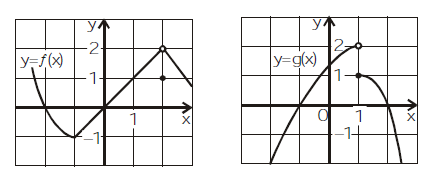
Let $$\displaystyle f_{p}\left ( \beta \right )=\left ( \cos \frac{\beta }{p^{2}}+i\sin \frac{\beta }{p^{2}} \right )+\displaystyle \left ( \cos \frac{2\beta }{p^{2}}+i\sin \frac{2\beta }{p^{2}} \right )\cdots \\ \cdots\displaystyle\left ( \cos \frac{\beta(p-1) }{p^2}+i\sin \frac{\beta(p-1) }{p^2} \right )+\left ( \cos \frac{\beta }{p}+i\sin \frac{\beta }{p} \right )$$
then $$\displaystyle \lim_{n\rightarrow \infty } 1/f_{n}\left ( \pi \right )=$$.
If $$ \displaystyle f\left ( x \right )=\cos ^{2}x+\cos ^{2}\left ( \frac{\pi }{3}+x \right )-\cos x\cos \left ( \frac{\pi }{3} +x\right ) $$ then $$ \displaystyle 4f\left ( \dfrac{\pi}8 \right ) $$ is equal to
Integrate $$\int{\frac{1}{{\sin}^{4}x+{\cos}^{4}x}}dx$$
Find the derivative of $$\displaystyle\, y \, =\, \frac{1}{x} \, +\, \frac{1}{\sqrt{x}} \, +\, \frac{1}{\sqrt[3]{x}}$$
Let $$S_{n}, n = 1, 2, 3....,$$ be sum of infinite geometric series whose first term is $$n$$ and the common ratio is $$\dfrac {1}{n +1}$$. Evaluate
$$\displaystyle \lim_{n\rightarrow \infty} \dfrac {S_{1}S_{n} + S_{2}S_{n - 1} + S_{3}S_{n - 2} + .... + S_{n}S_{1}}{S_{1}^{2} + S_{2}^{2} + .... + S_{n}^{2}}$$.
If $$\sqrt{1-x^2}+\sqrt{1-y^2}=a(x-y)$$, prove that $$\dfrac{dy}{dx}=\sqrt{\dfrac{1-y^2}{1-x^2}}$$
Solve :
$$\displaystyle \lim _{ h\rightarrow 0 }{ \frac { \sin { \left( x+h \right) } -\sin { \left( x-h \right) } }{ h } } $$
$$\displaystyle\lim _{ x\rightarrow 2 }{ \cfrac { 2x+5 }{ 8-{ x }^{ 3 } } } $$
For each of the differential equations in Exercises from $$11$$ to $$15$$, find the particular solutions satisfying the given condition:
$$x^{2}dy+(xy+y^{2})dx=0; y=1$$ when $$x=1$$
$$\underset { x\rightarrow \frac { \pi }{ 4 } }{ lim } \dfrac{1 - tan x}{1 - \sqrt2 sin x}$$
Evaluate$$lim_{x\to -3} (\dfrac{1}{x^2+4x+3} + \dfrac{1}{x^2 +8x+15})$$
If $$y={ \left( sinx \right) }^{ cosx }+{ \left( cosx \right) }^{ sinx },find\dfrac { dy }{ dx } $$
Solve $$lim_{x\to 0} |x|^{sin x}$$
$$ifx=log\left( 1+{ sin }^{ 2 }y \right) show\quad that\quad \frac { dy }{ dx } =\frac { { e }^{ x } }{ sin\quad 2y } $$
Solve:
$$\lim_{x \rightarrow 2}{\dfrac{x^3-8}{x-2}}$$
Find the particular solution of differential equation : $$\frac{dy}{dx}$$ = $$- \frac{x+y cos x}{1 + sin x}$$ given that y = 1 when x = 0.
$$\sin x \frac { d y } { d x } + 3 y = \cos x$$
Find the derivative of following function:$$y = x / \sin ^ { n } x$$
$$lim_{x \rightarrow 0} \frac{ \sqrt[3]{1+x^2}- \sqrt[4]{1-2x}}{x+x^2}$$ is equal to
Differentiate:
$$\left(\dfrac{\sin x-x\cos x}{x\sin x+\cos x}\right)$$
If $$y=\left (\sqrt x +\dfrac {1}{\sqrt x} \right)$$, show that $$2x. \dfrac {dy}{dx}+y=2\sqrt x$$.
Find $$\dfrac {dy}{dx}$$, where :
$$x^n +y^n =a^n$$
Differentiate the following with respect to $$x$$:
$$\dfrac{e^{2x}+x^3}{\csc 2x}$$
Find : $$\displaystyle \lim_{x\rightarrow 0} \dfrac {\cot 2x - cosec 2x}{x}$$.
Find $$\dfrac {dy}{dx}$$, when $$y=x^x -2^{\sin x}$$.
Find $$\frac{dy}{dx}$$, if tan(x+y)+tan(x-y)=1
Find $$ \dfrac{d y}{d x} $$ if $$ x=a \cot \theta, y=b \operatorname{cosec} \theta $$
Find the derivative of y with respect to x, where $$y = \left ( x \right )^{\sin x} + (\sin x)^{x}$$
DIfferentiate $$ x \sin x $$ w.r.t. $$ \tan x $$
Find $$ \dfrac{d y}{d x}, $$ if $$ : x=\sin \theta, y=\tan \theta $$
If $$ x=a \cos ^{3} t, y=a \sin ^{3} t, $$ show that $$ \dfrac{d y}{d x}=-\left(\dfrac{y}{x}\right)^{3} $$
If $$ x=2 \cos ^{4}(t+3), y=3 \sin ^{4}(t+3), $$ show that $$ \dfrac{d y}{d x}=-\sqrt{\dfrac{3 y}{2 x}} $$
Find $$ \dfrac{d y}{d x}, $$ if $$ : x=a(1-\cos \theta), y=b(\theta-\sin \theta) $$
Class 11 Engineering Maths Extra Questions
- Binomial Theorem Extra Questions
- Complex Numbers And Quadratic Equations Extra Questions
- Conic Sections Extra Questions
- Introduction To Three Dimensional Geometry Extra Questions
- Limits And Derivatives Extra Questions
- Linear Inequalities Extra Questions
- Mathematical Reasoning Extra Questions
- Permutations And Combinations Extra Questions
- Principle Of Mathematical Induction Extra Questions
- Probability Extra Questions
- Relations And Functions Extra Questions
- Sequences And Series Extra Questions
- Sets Extra Questions
- Statistics Extra Questions
- Straight Lines Extra Questions
- Trigonometric Functions Extra Questions
